Louis Dondino. No. 6614.
Images
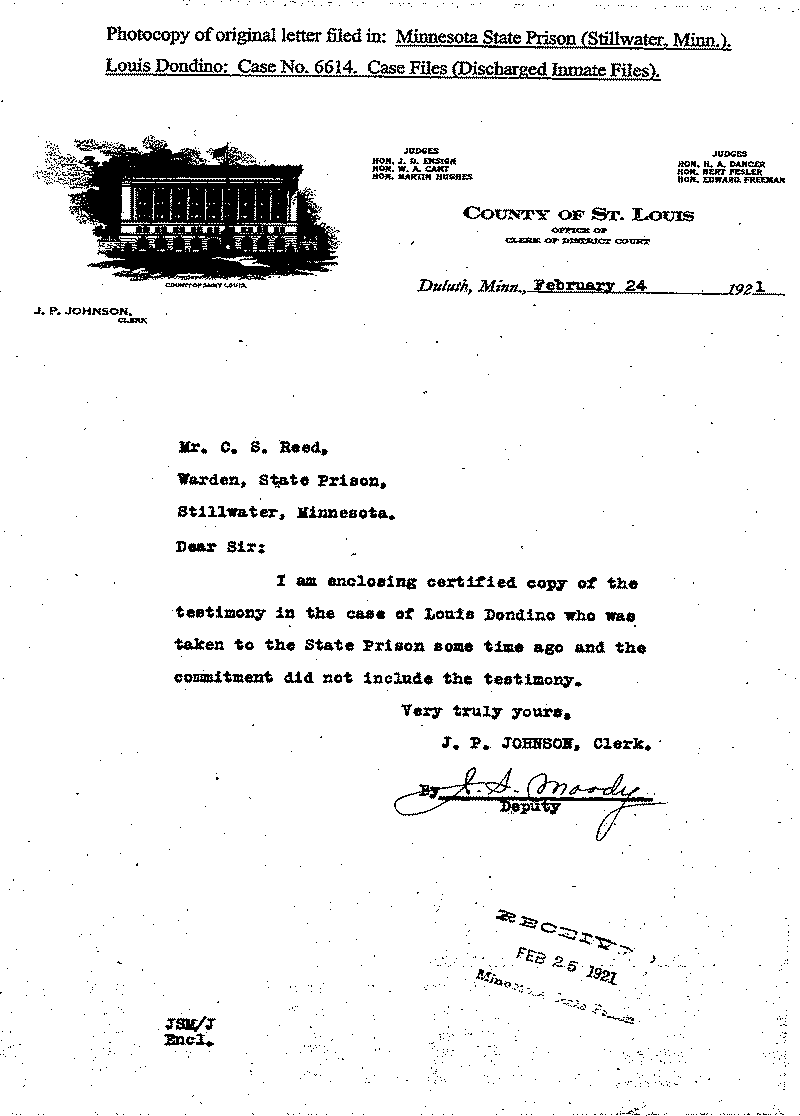
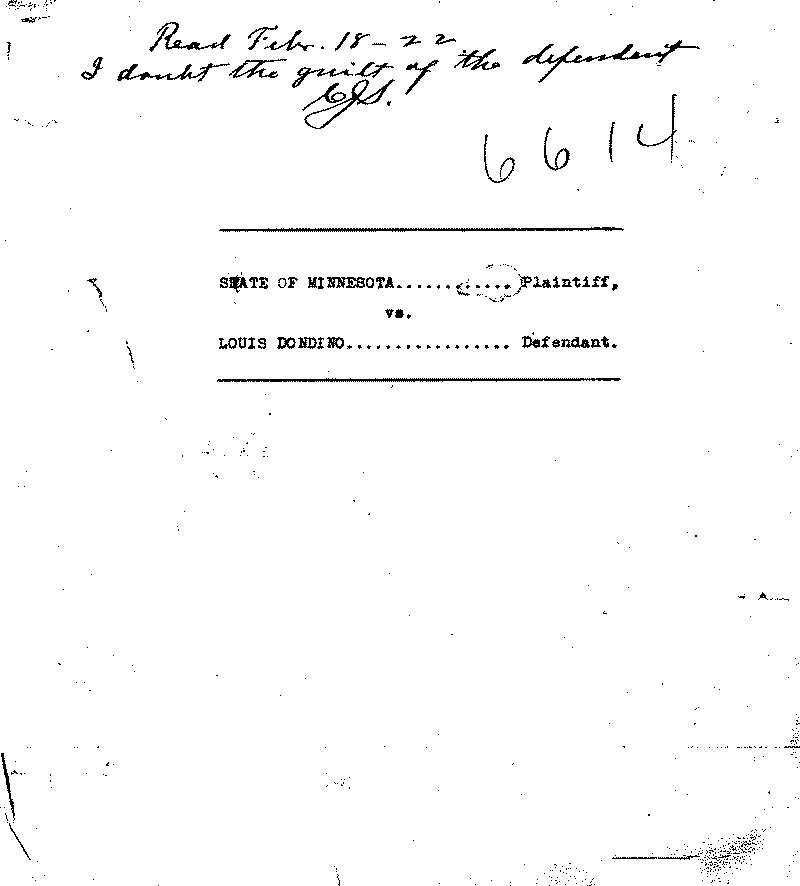
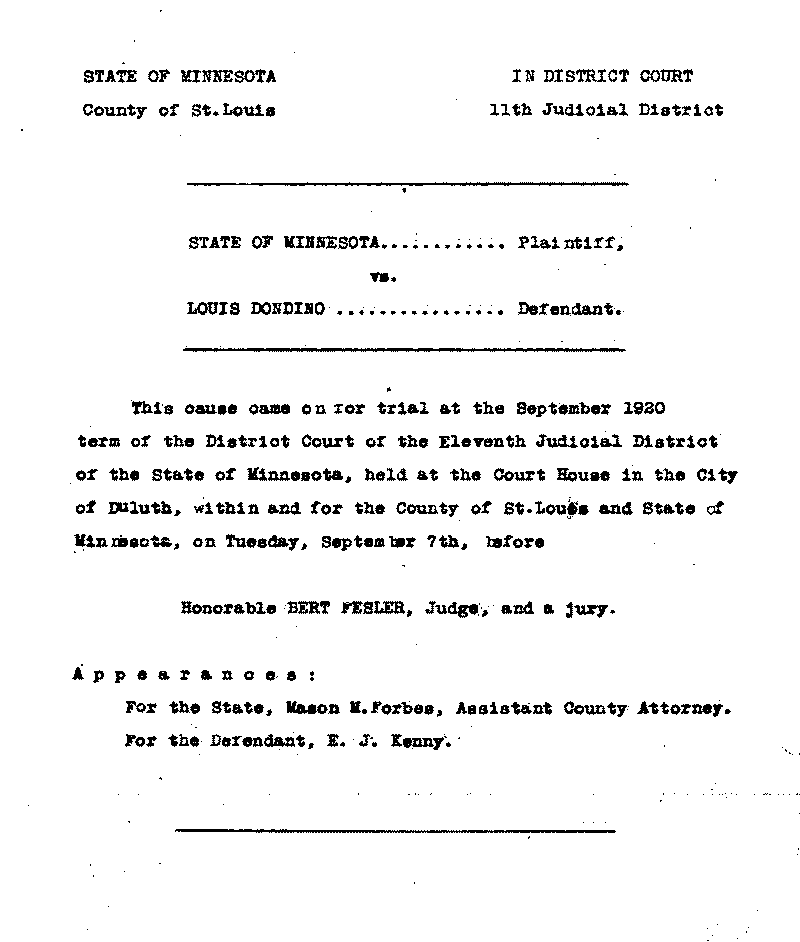
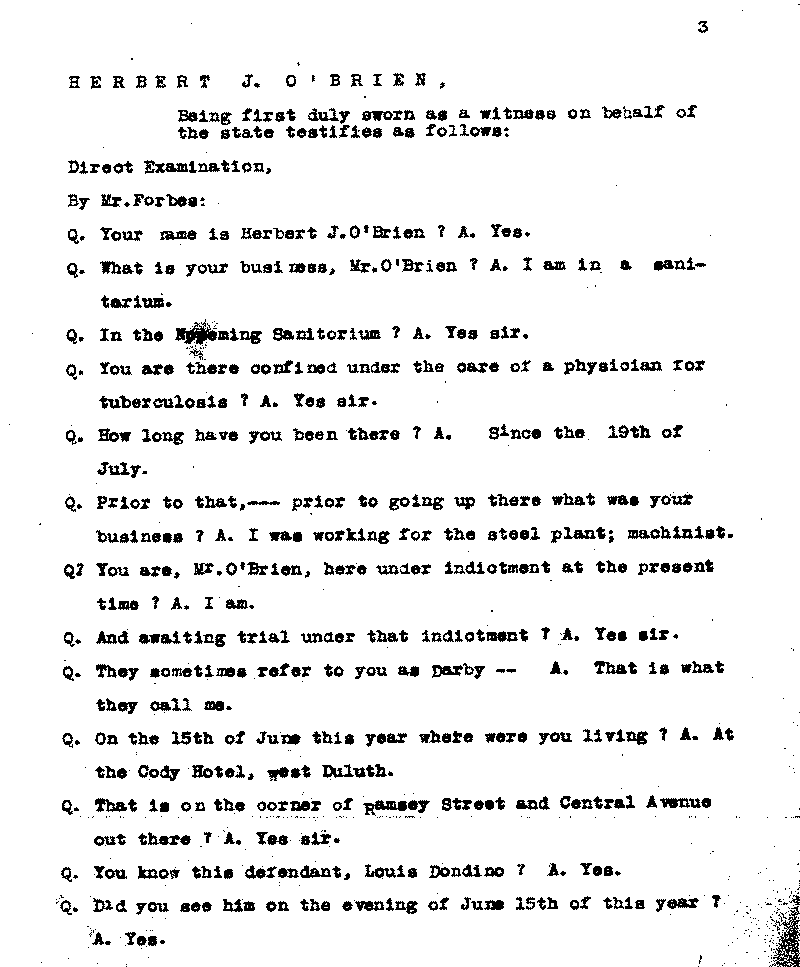
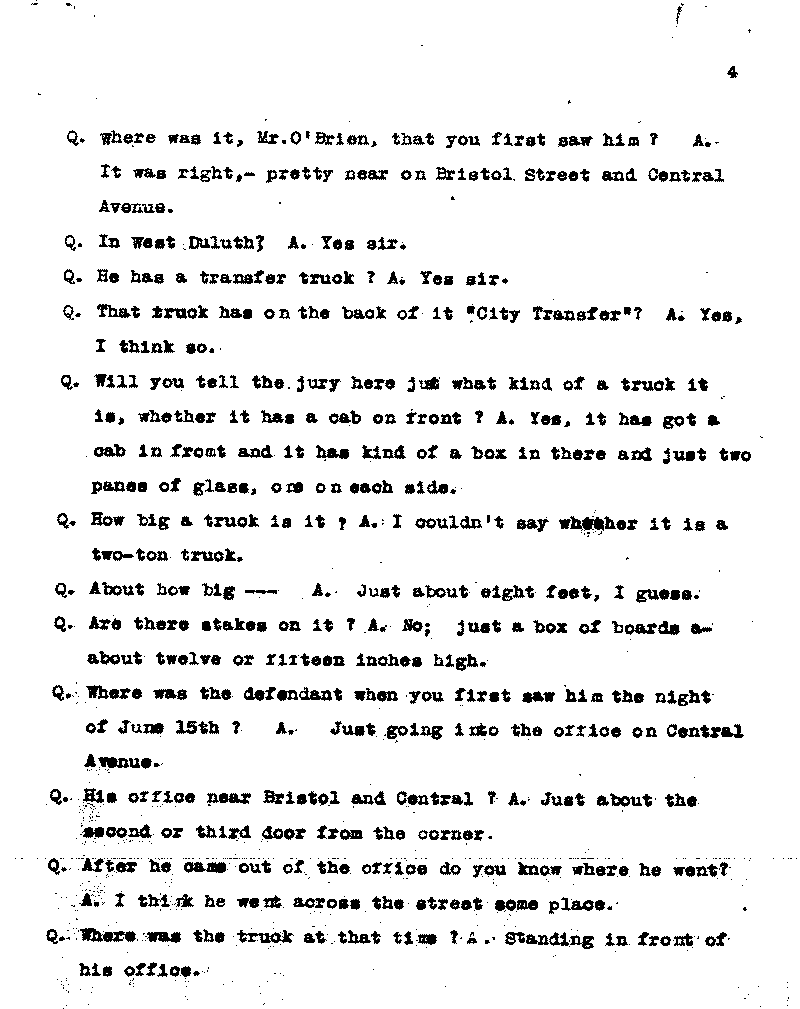
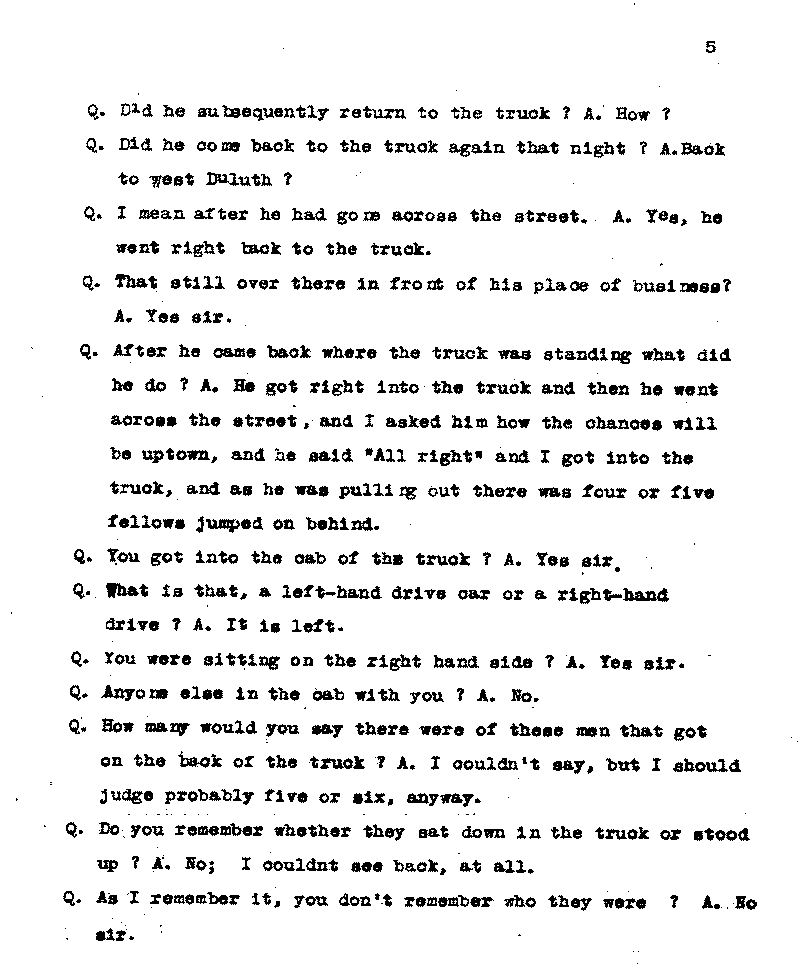
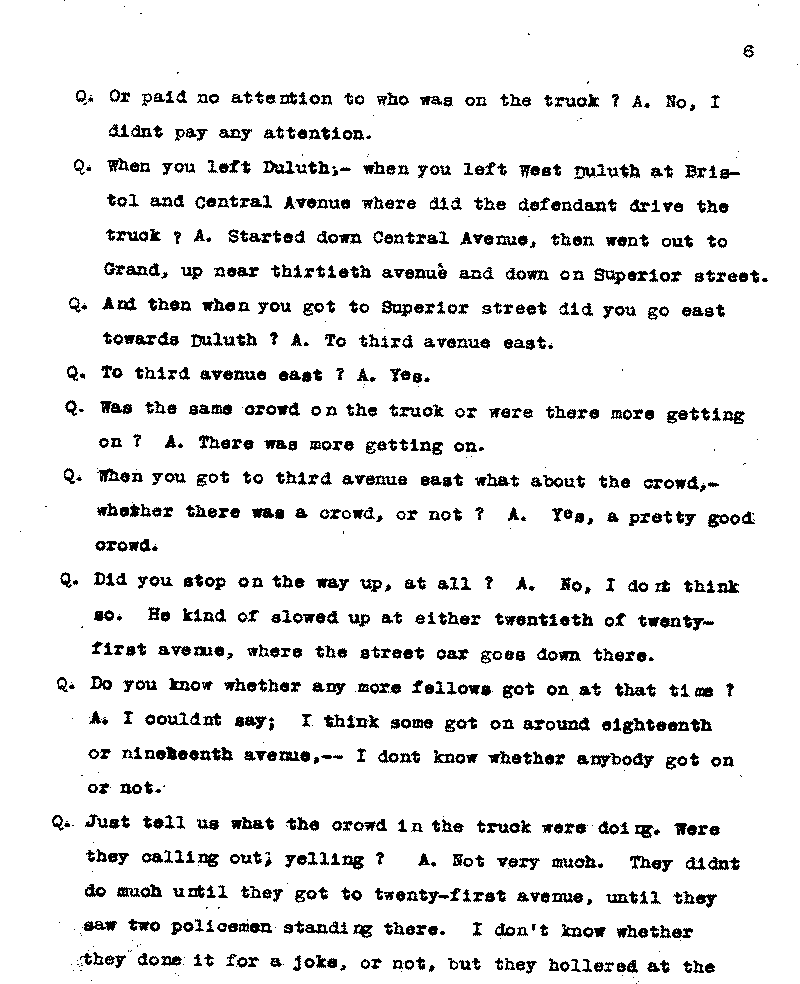
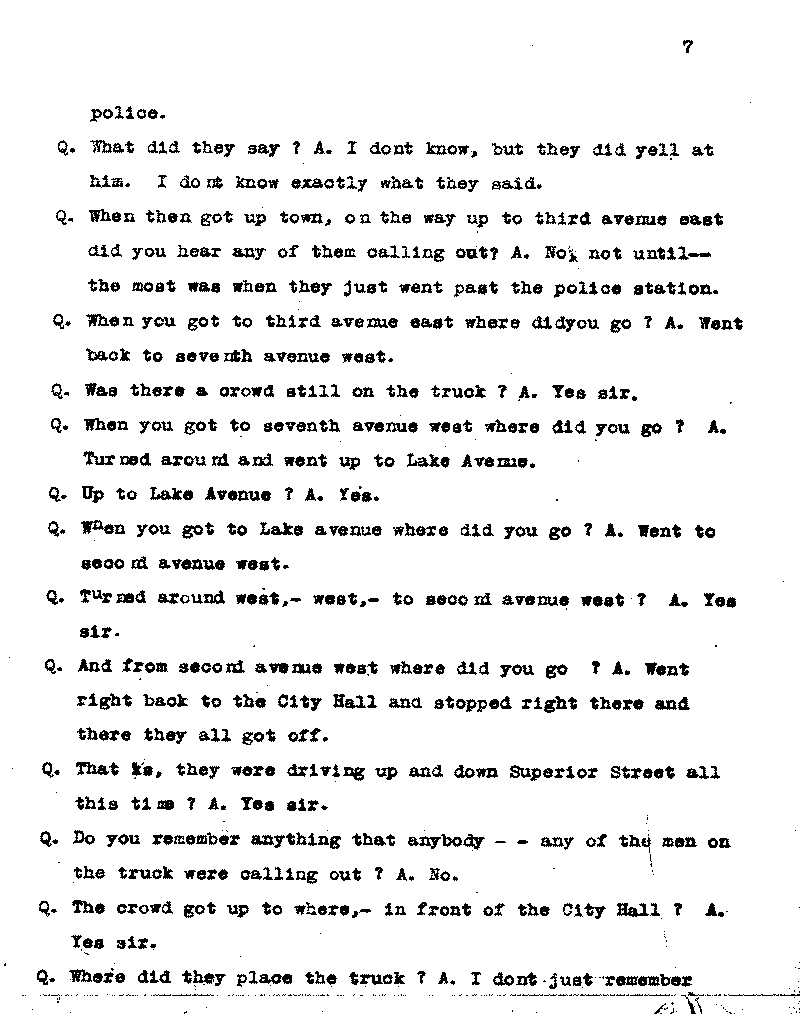
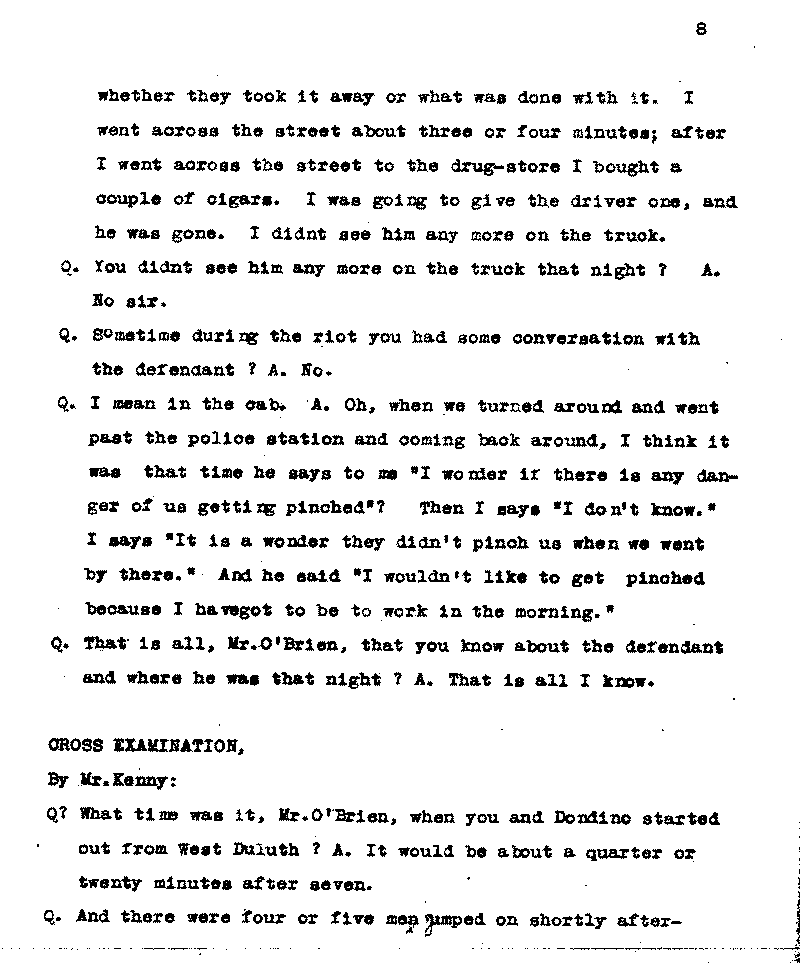
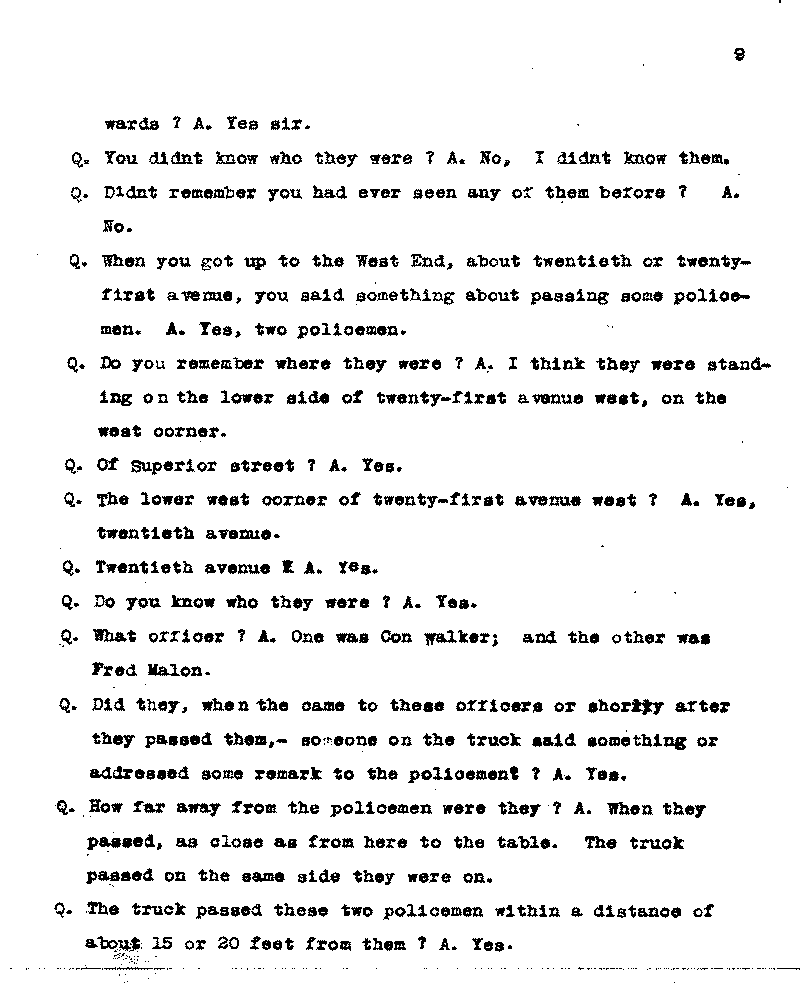
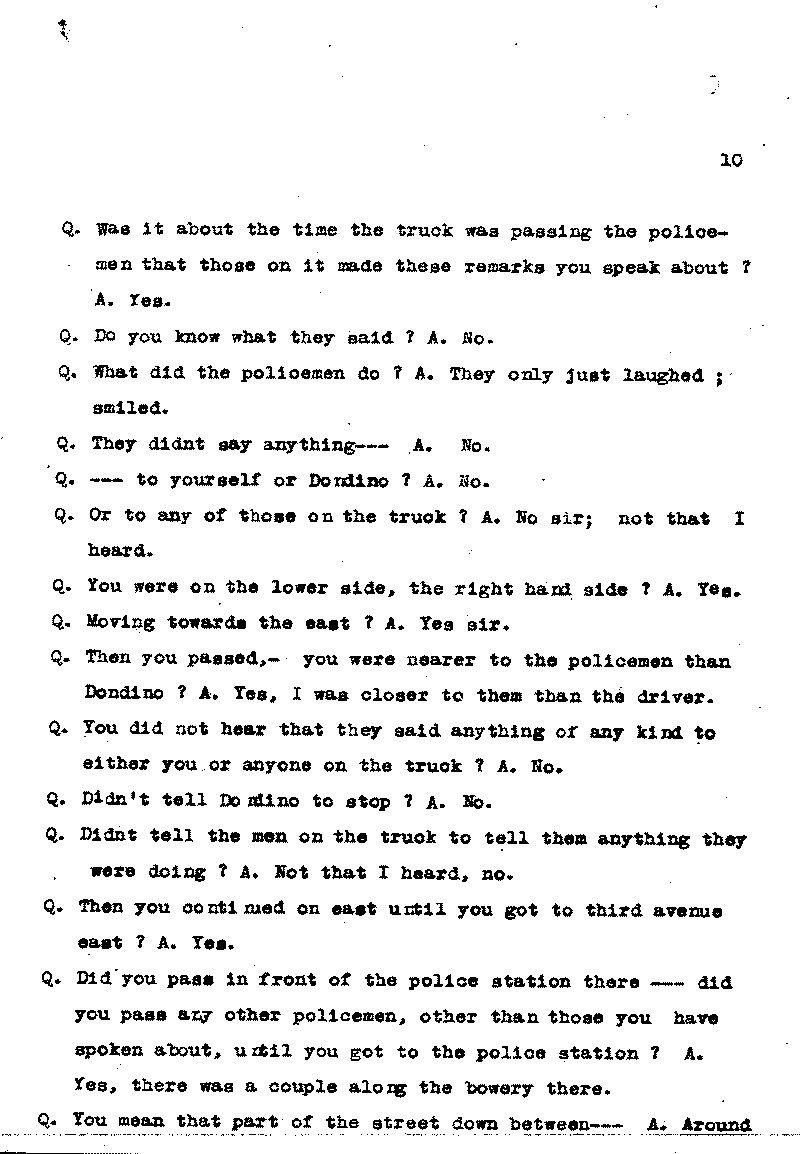
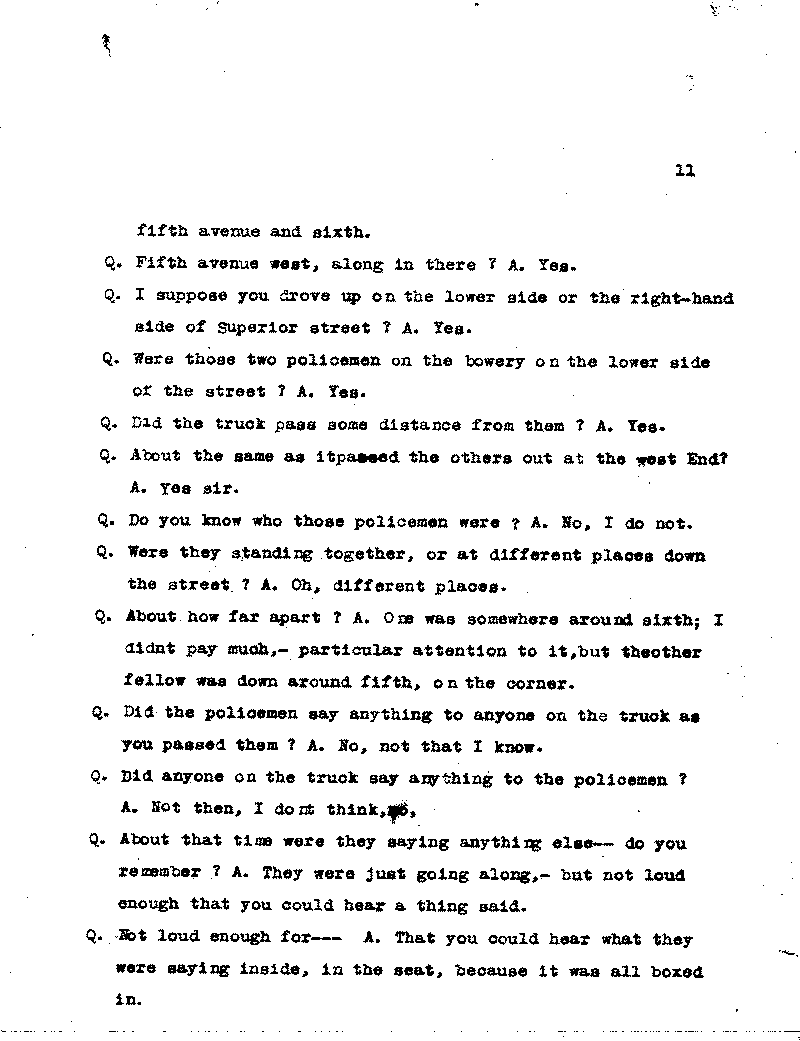
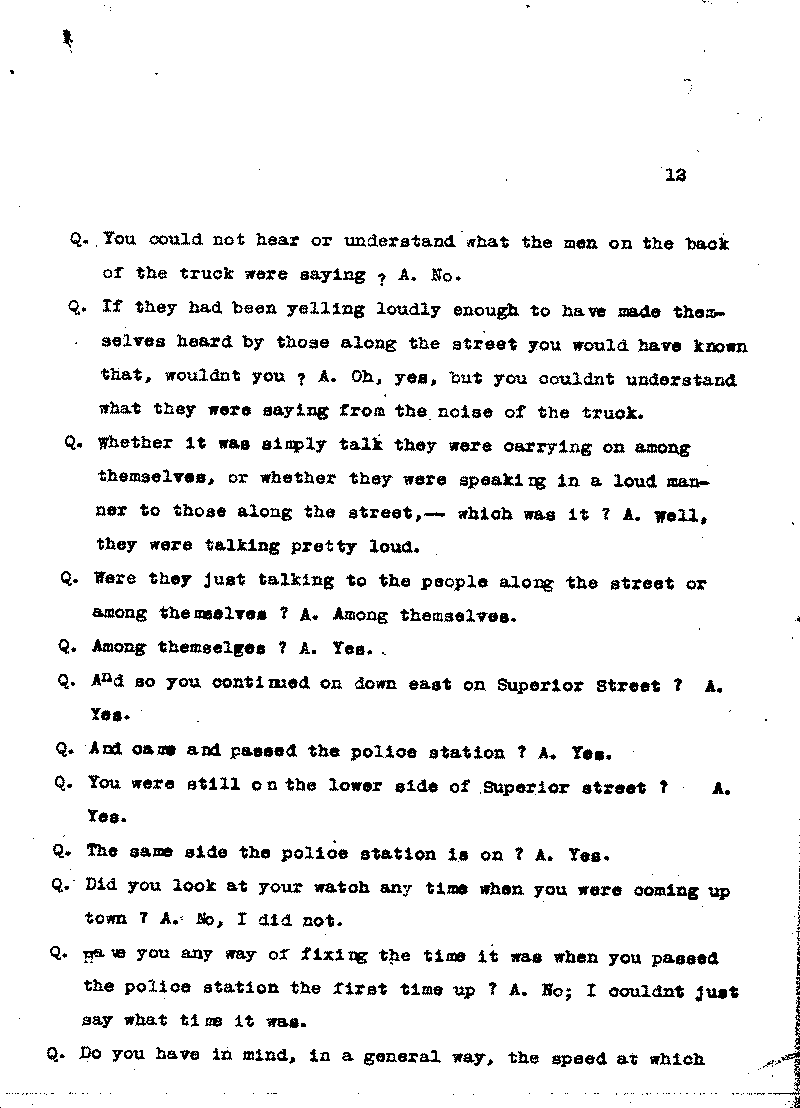
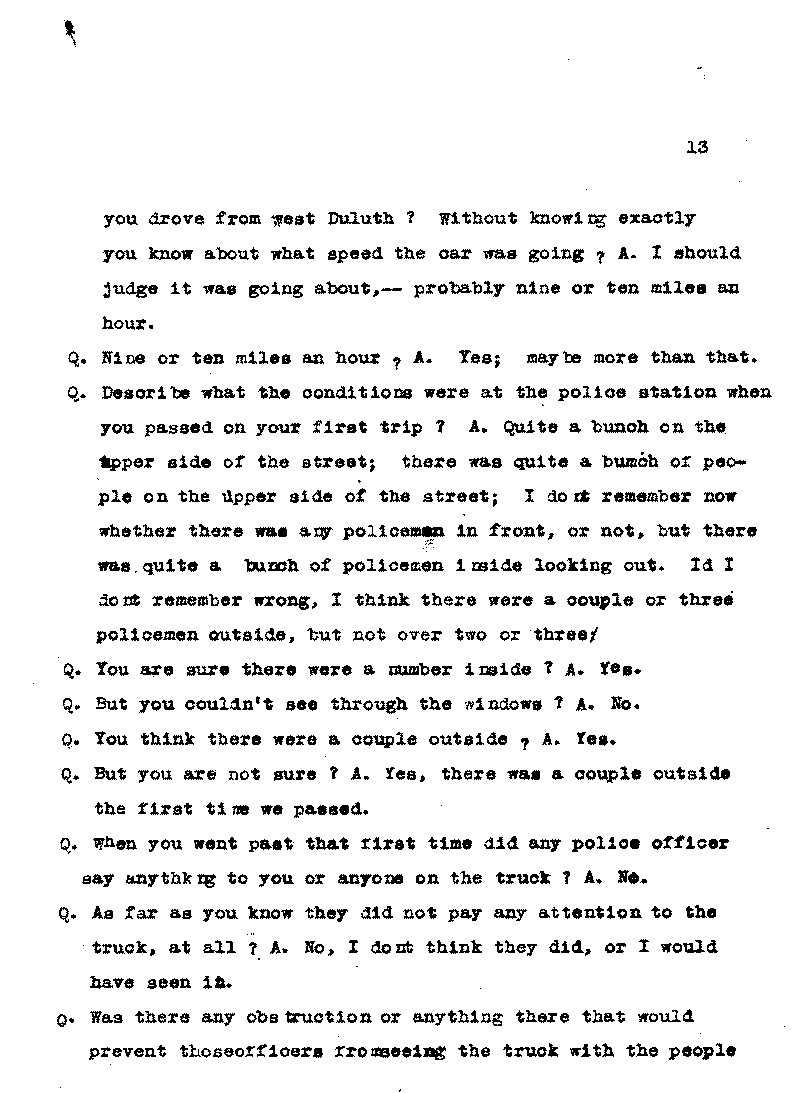
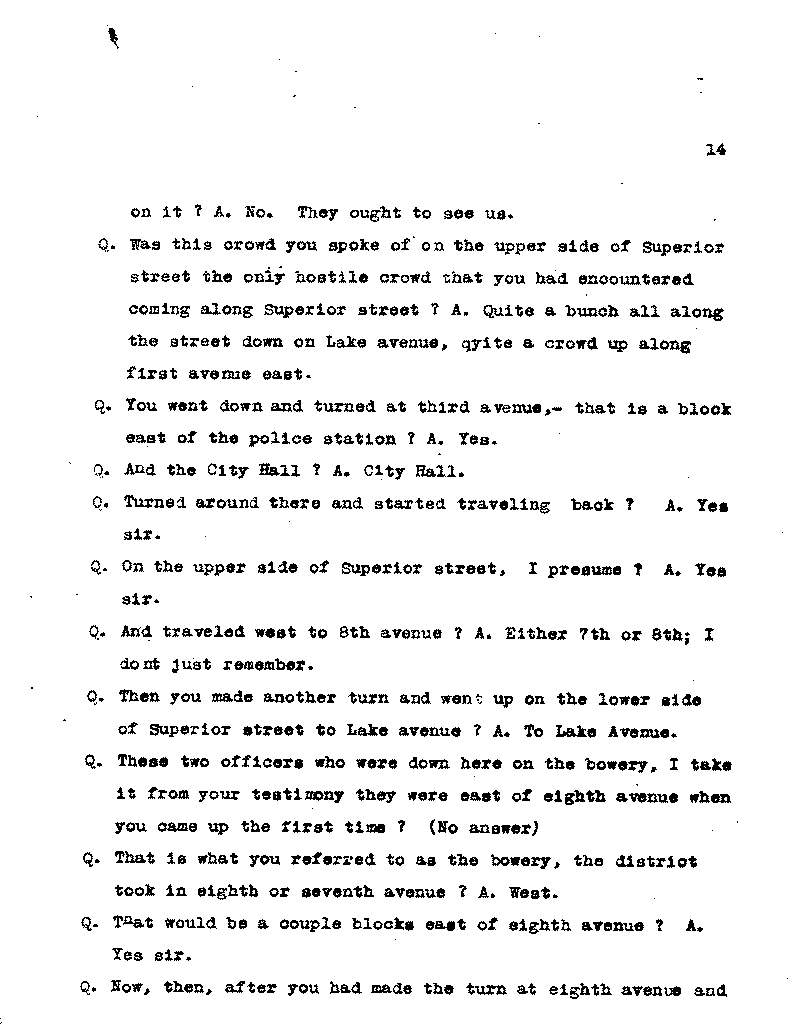
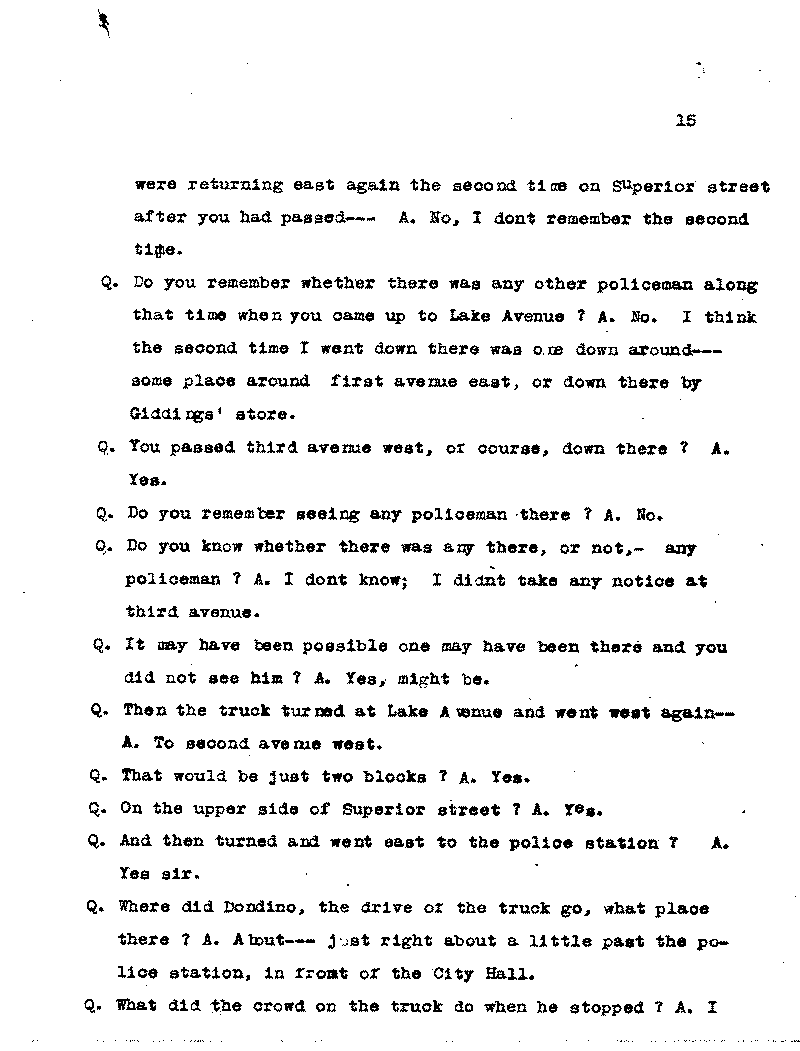
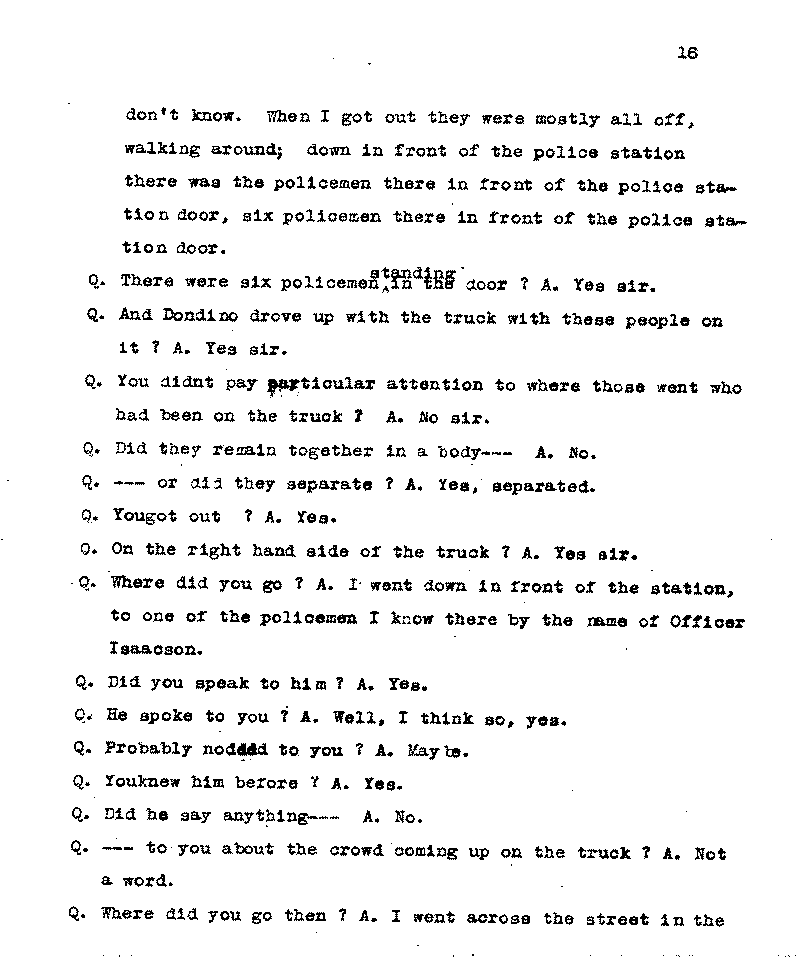
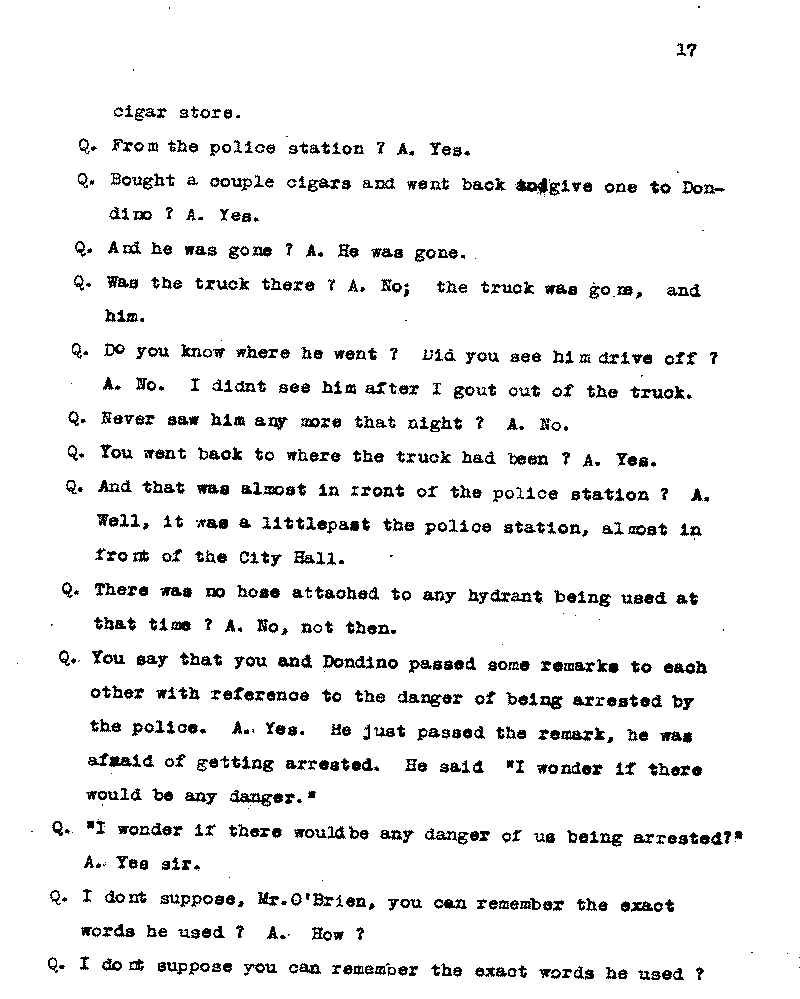
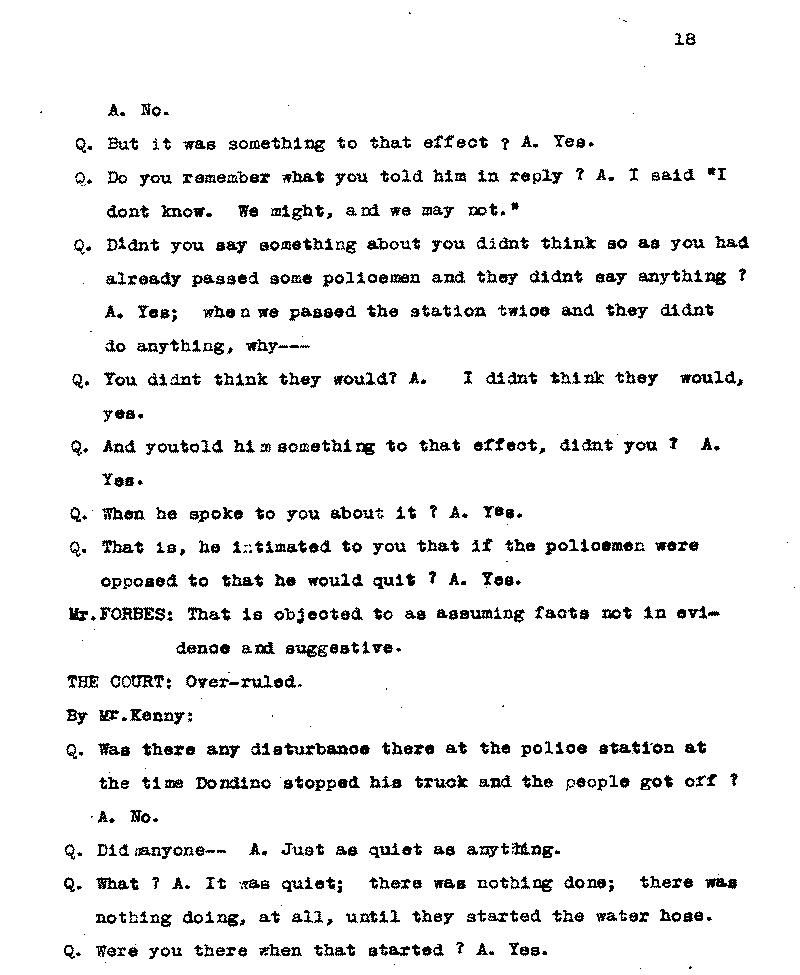
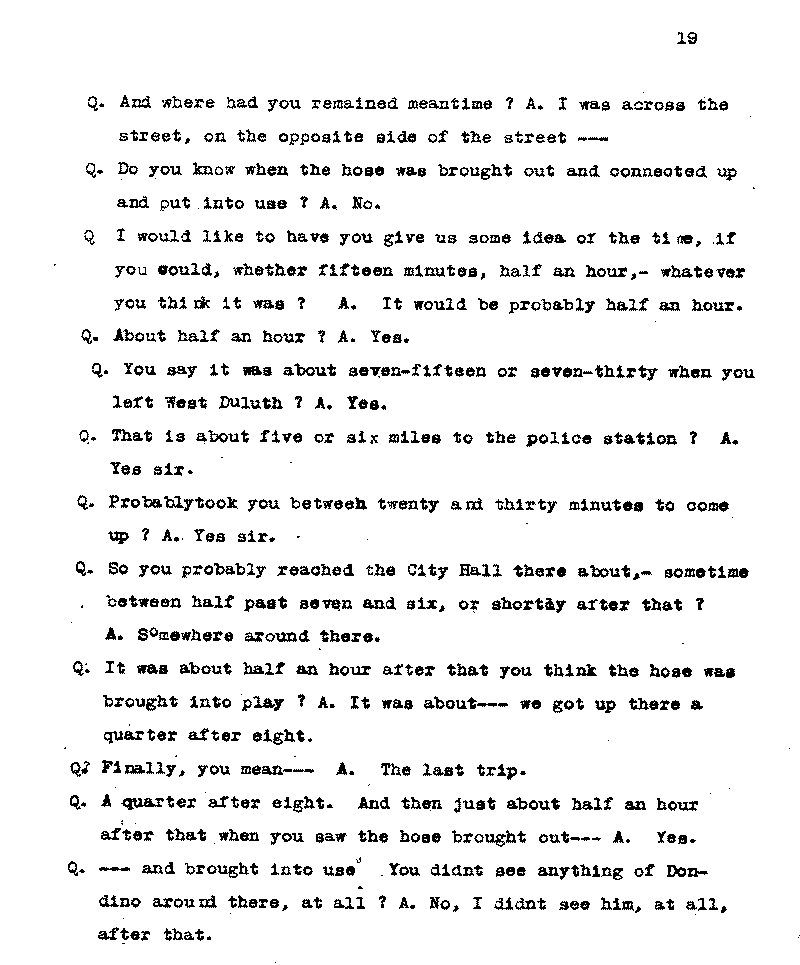
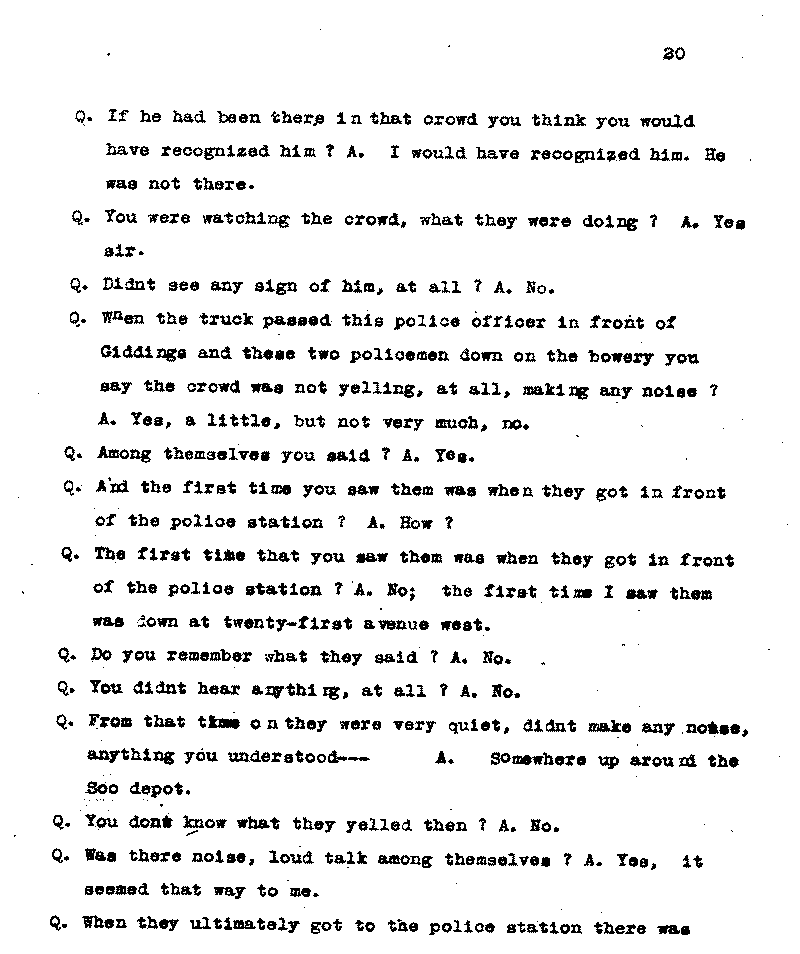
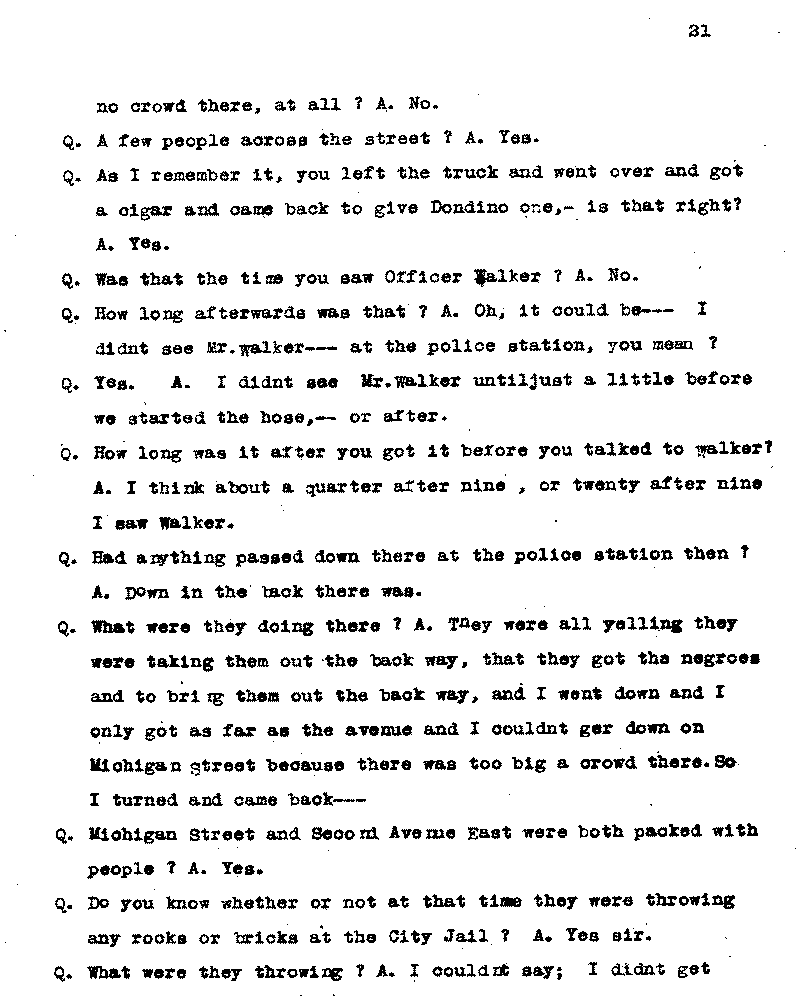
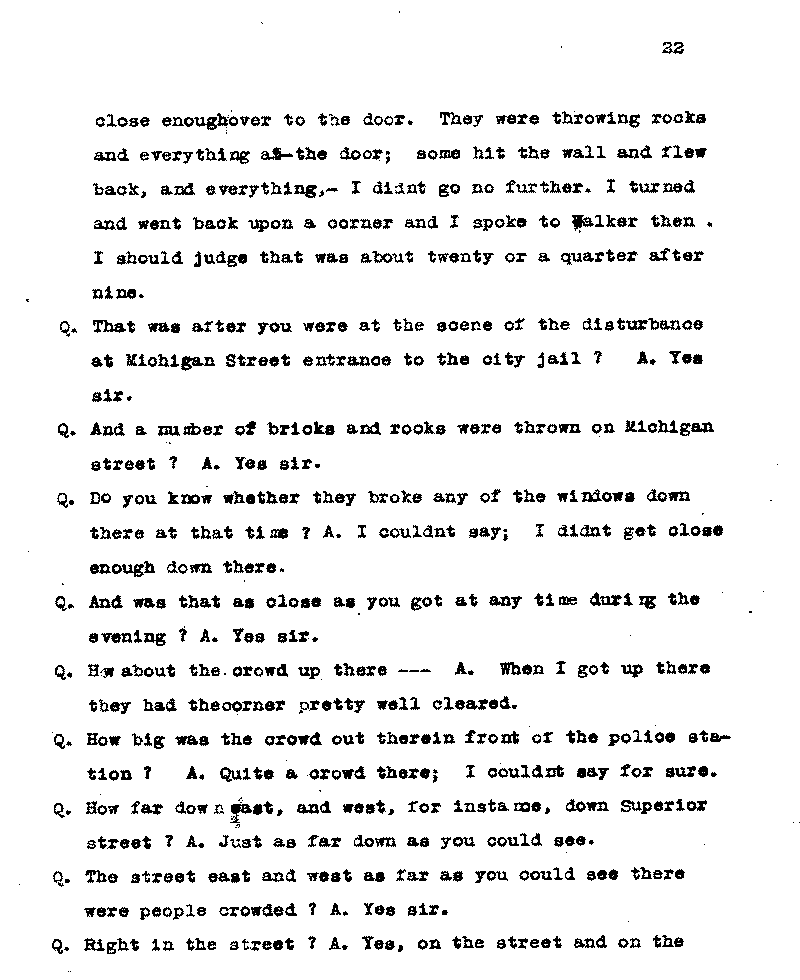
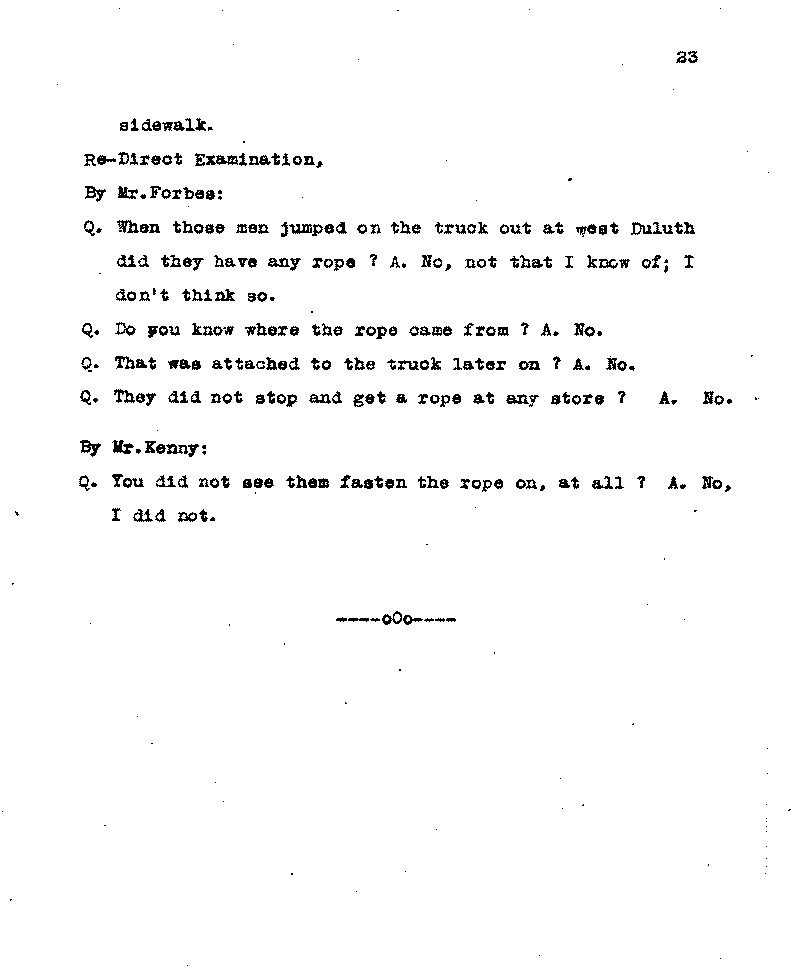
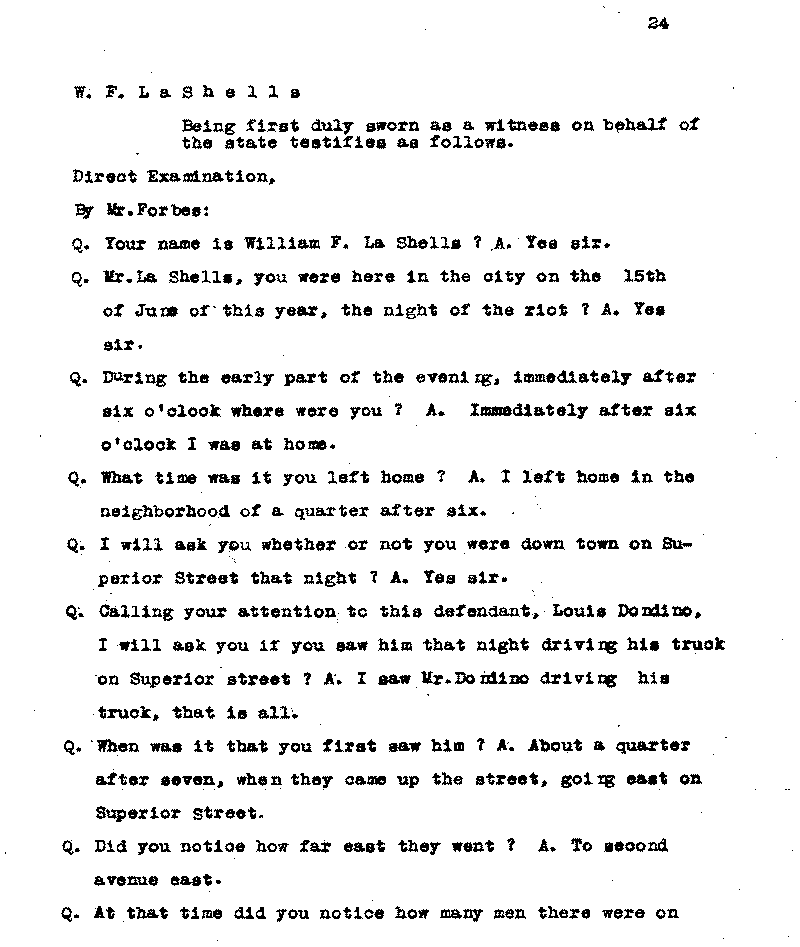
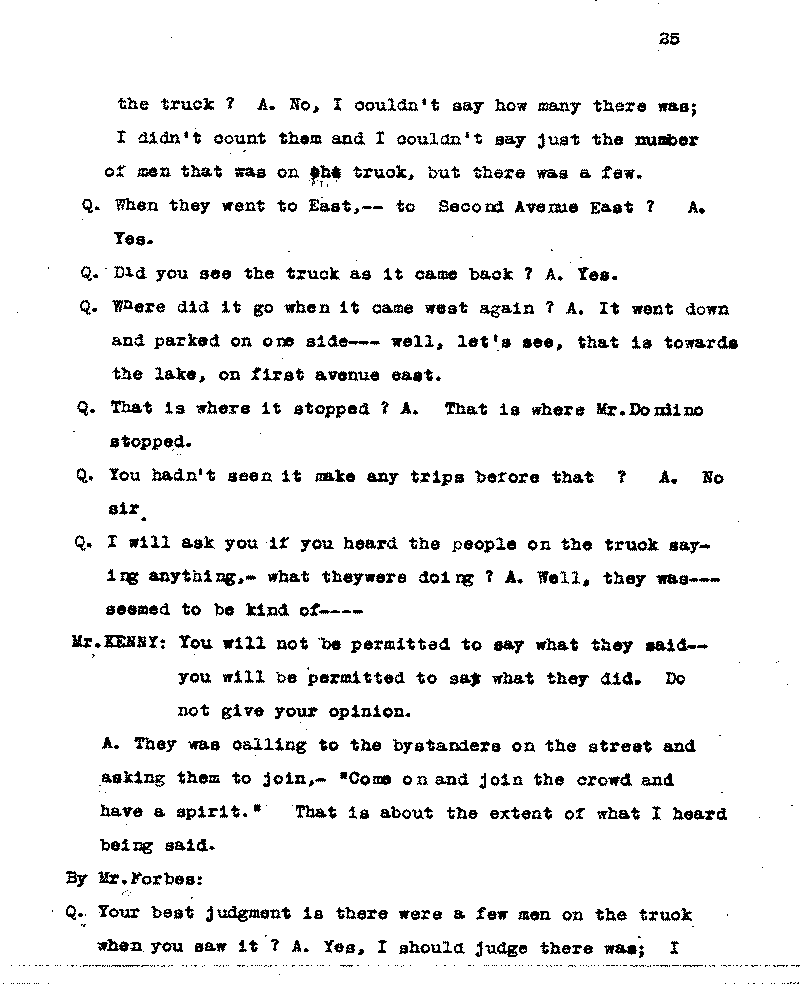
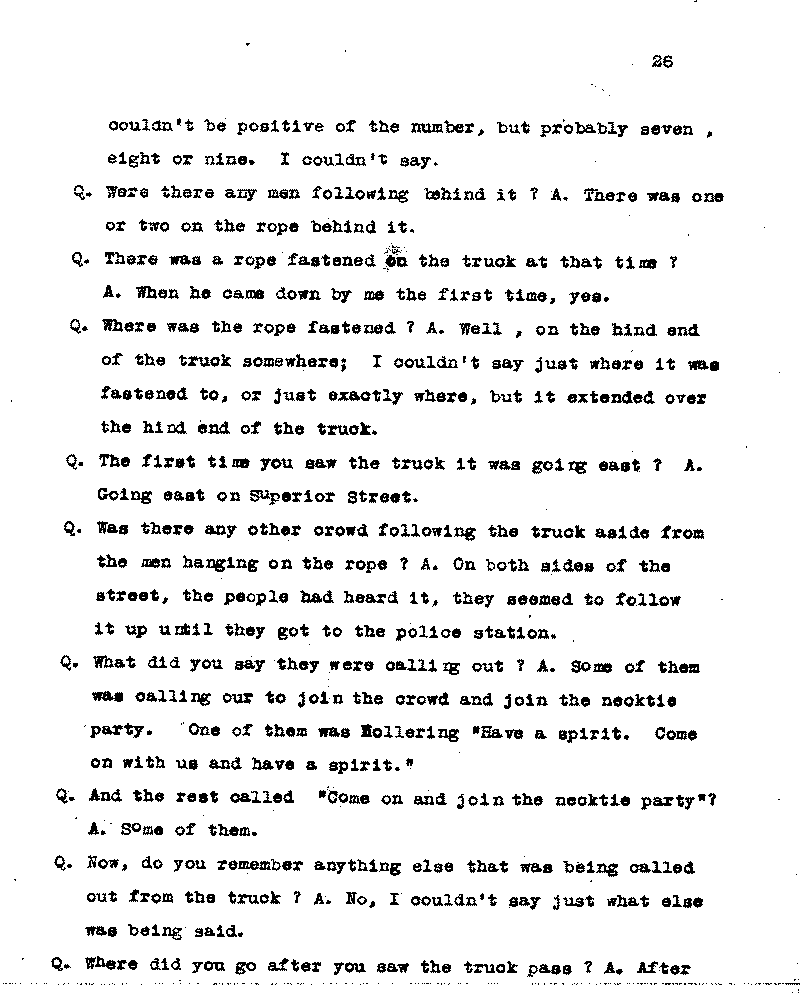
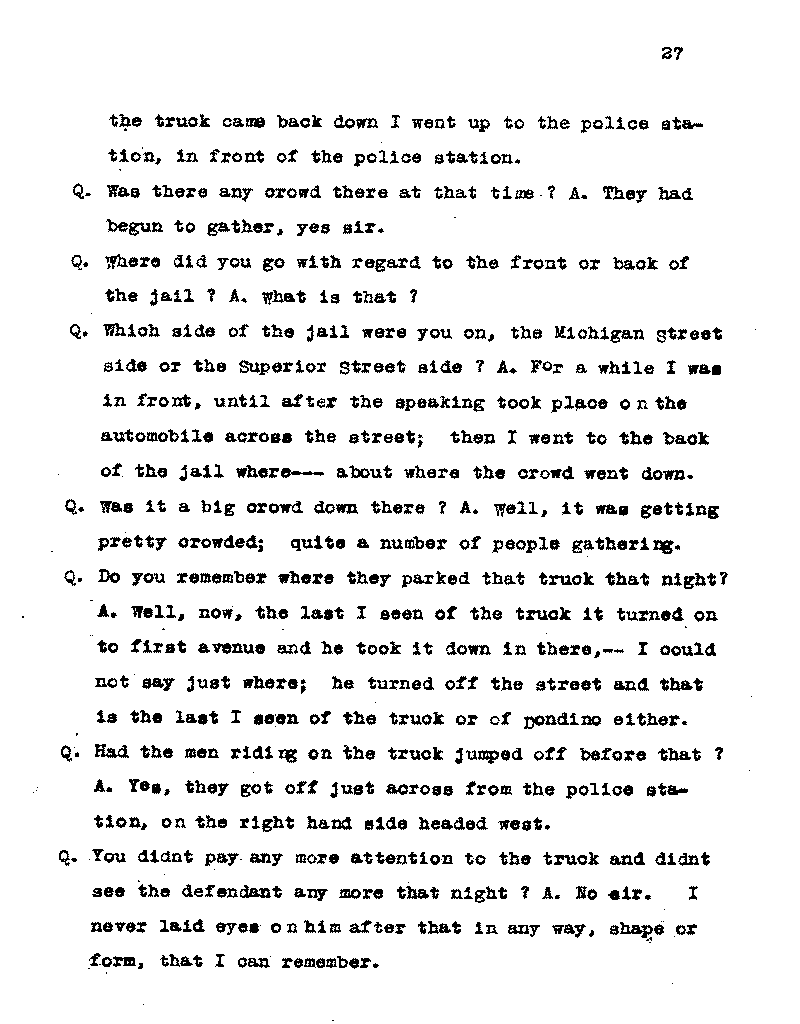
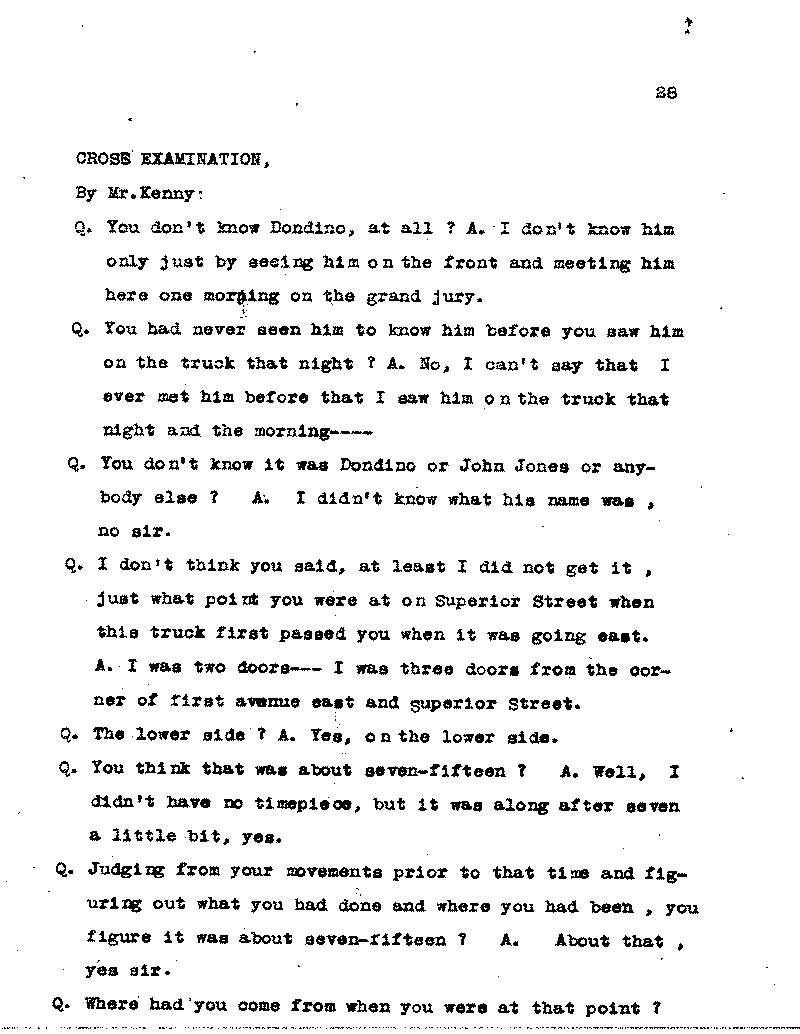
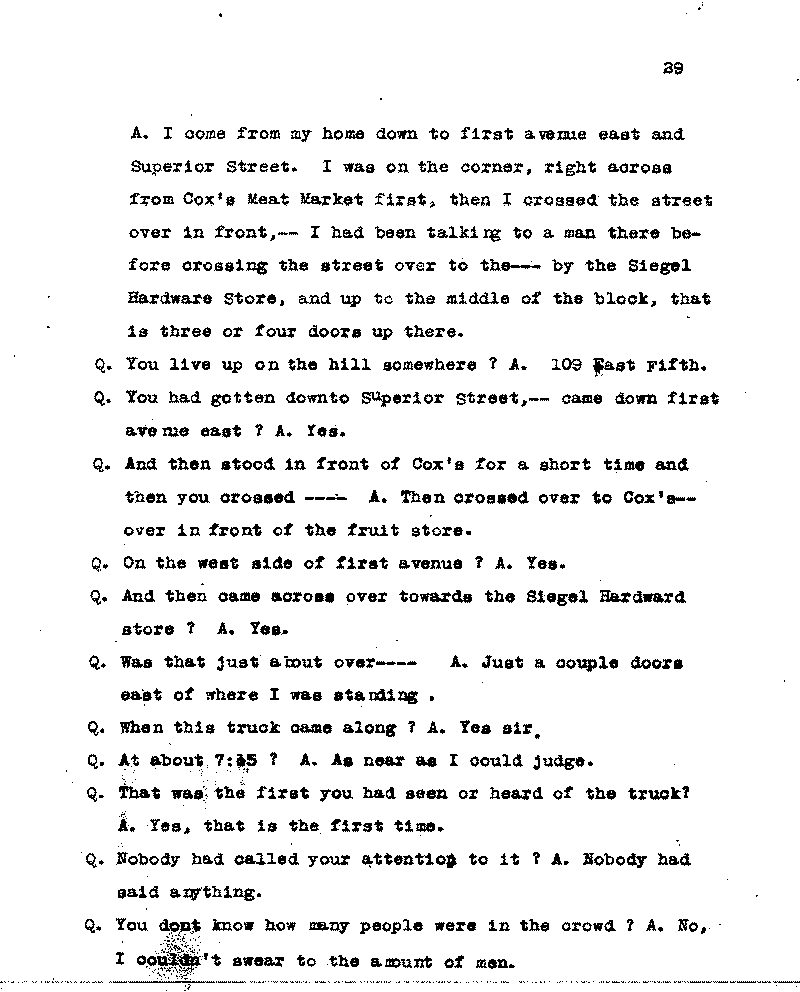
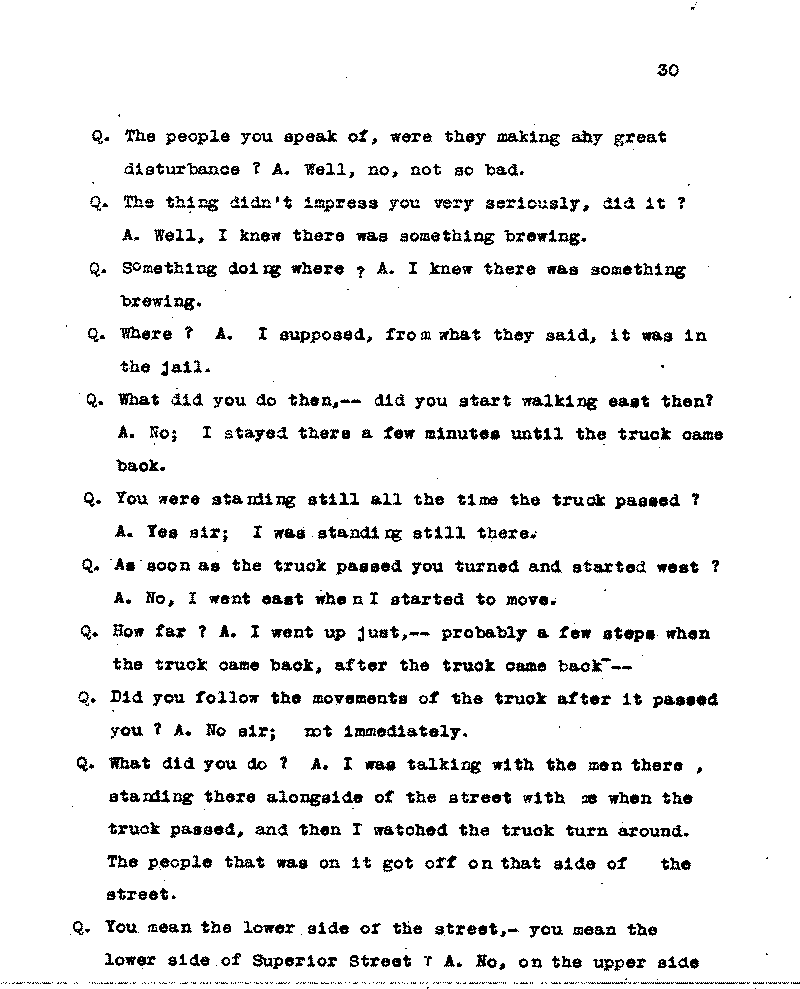
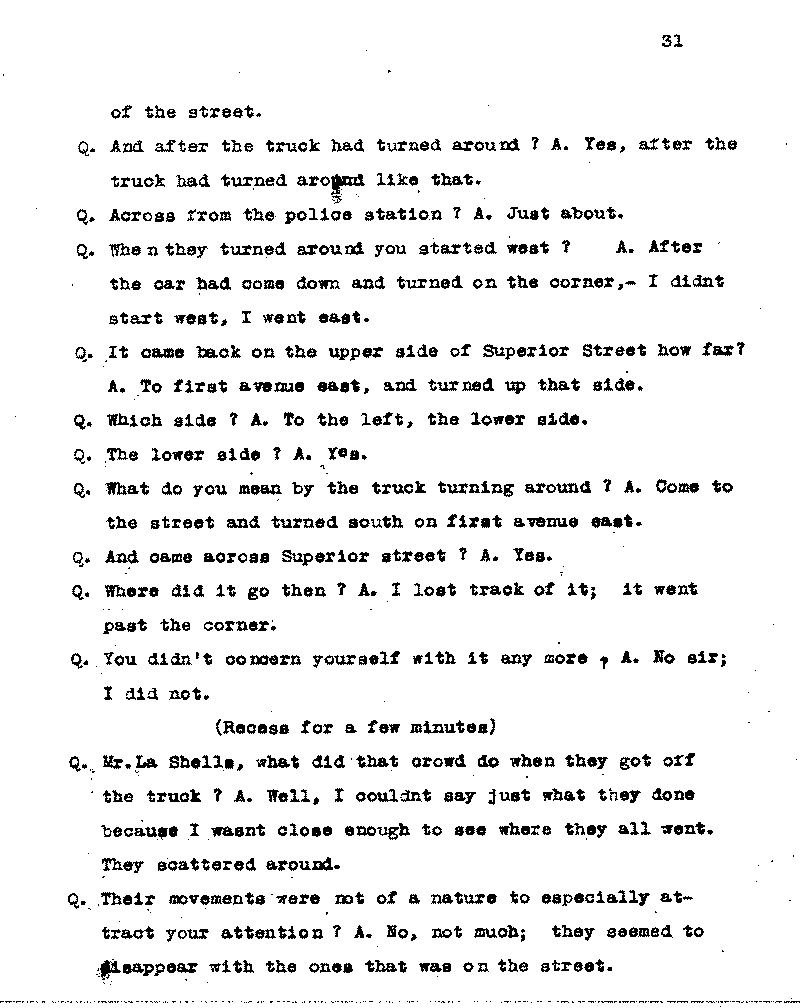
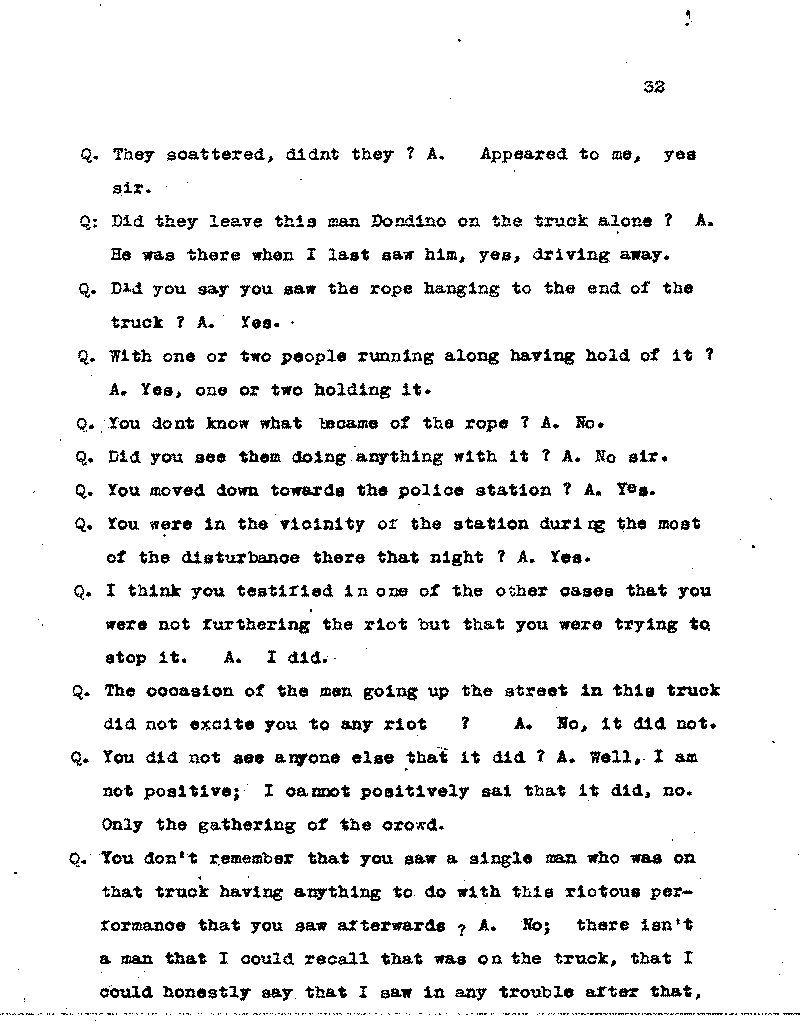
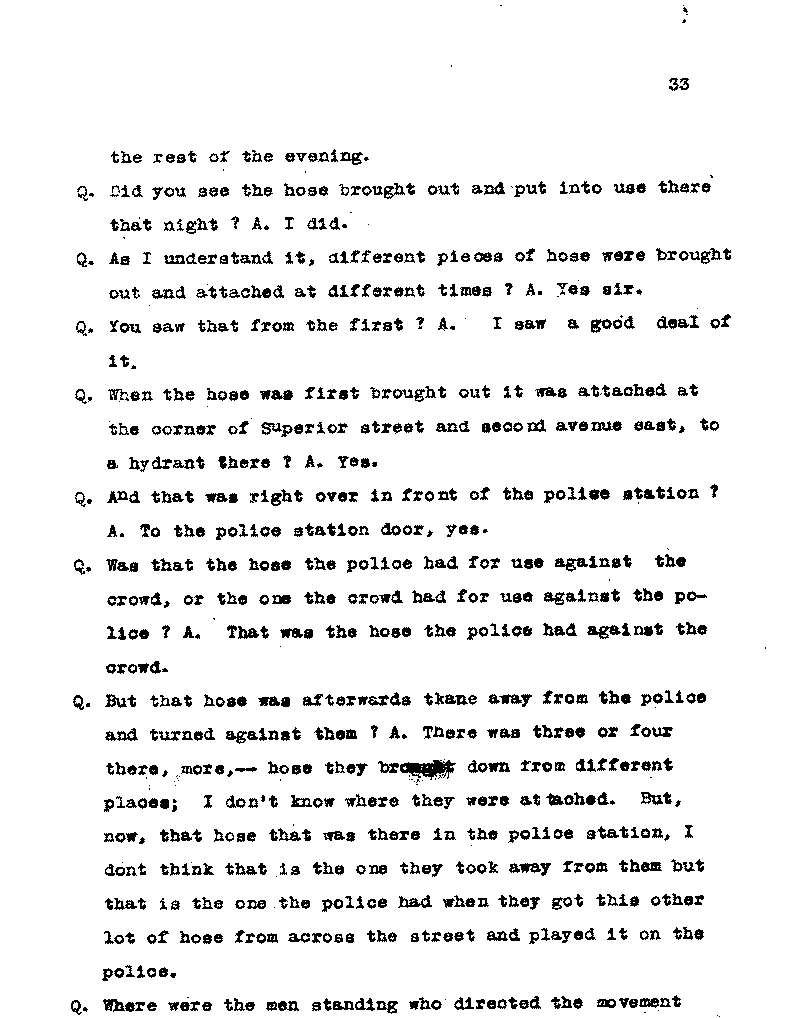
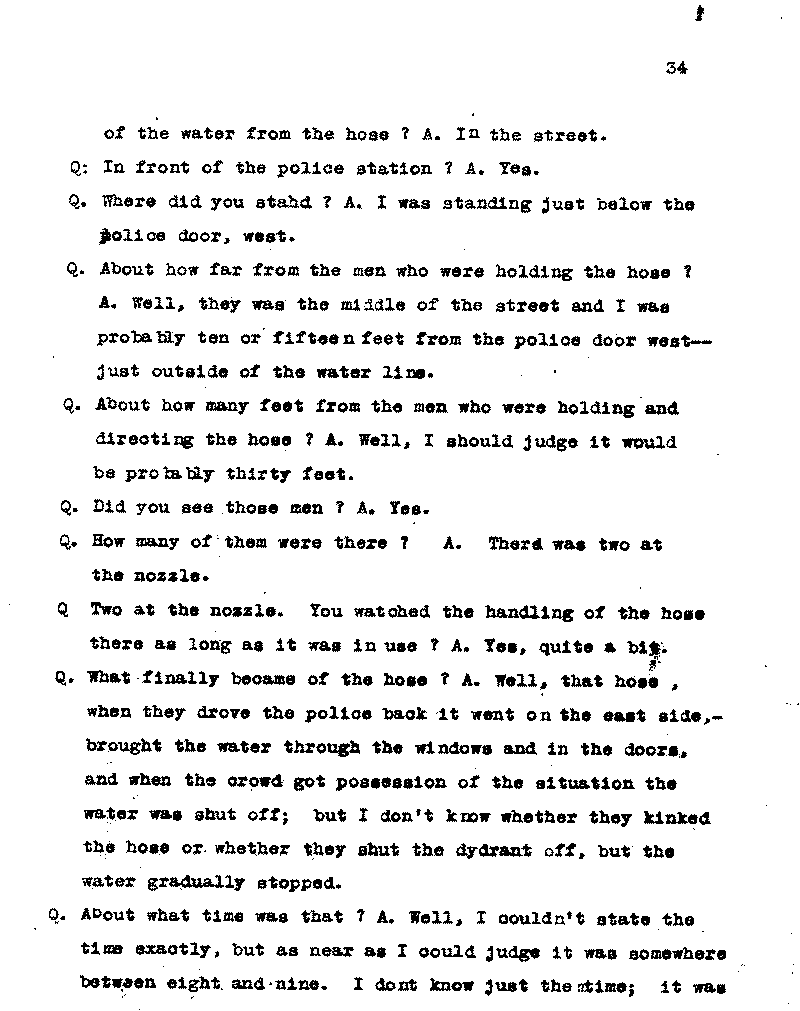
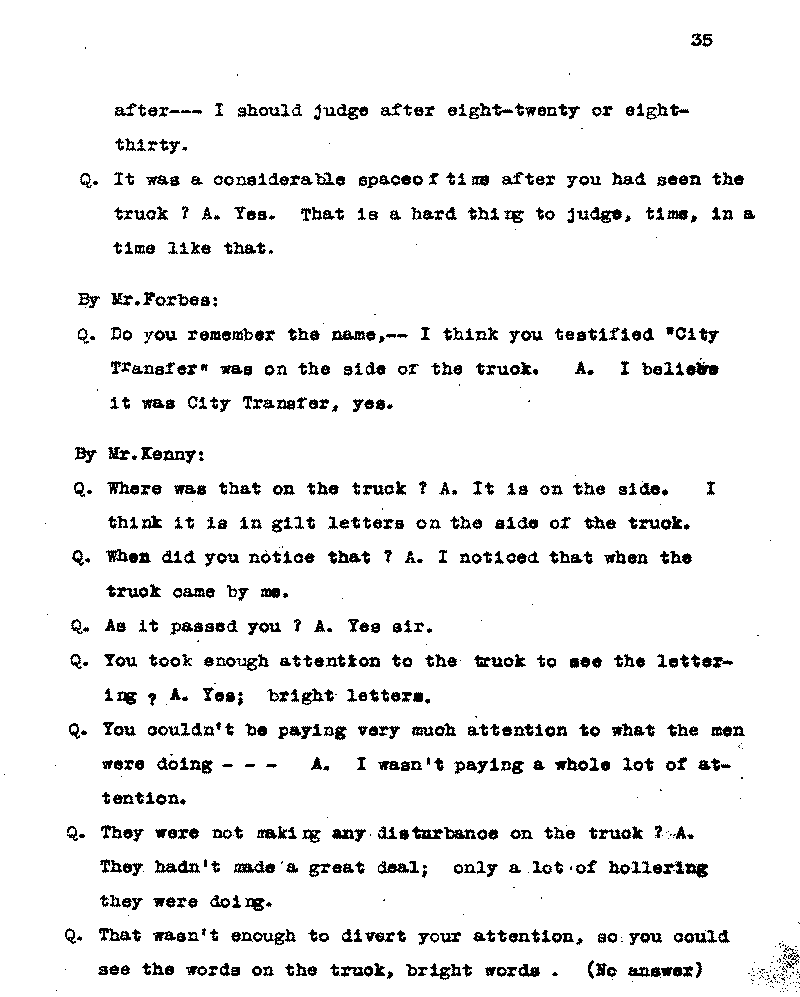
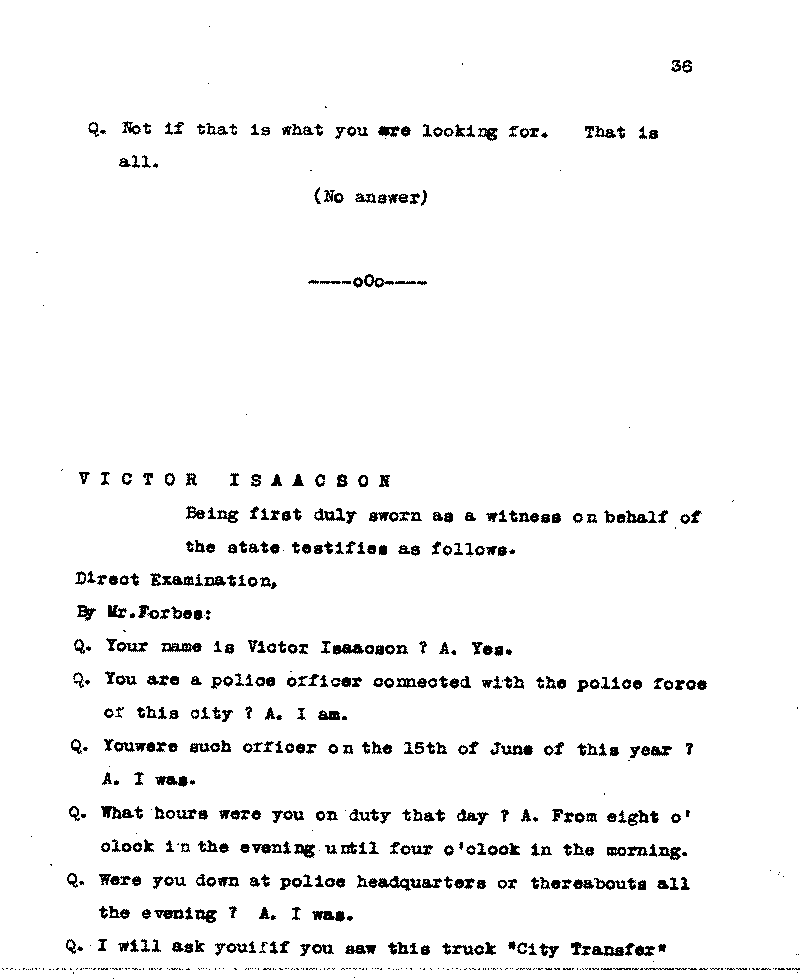
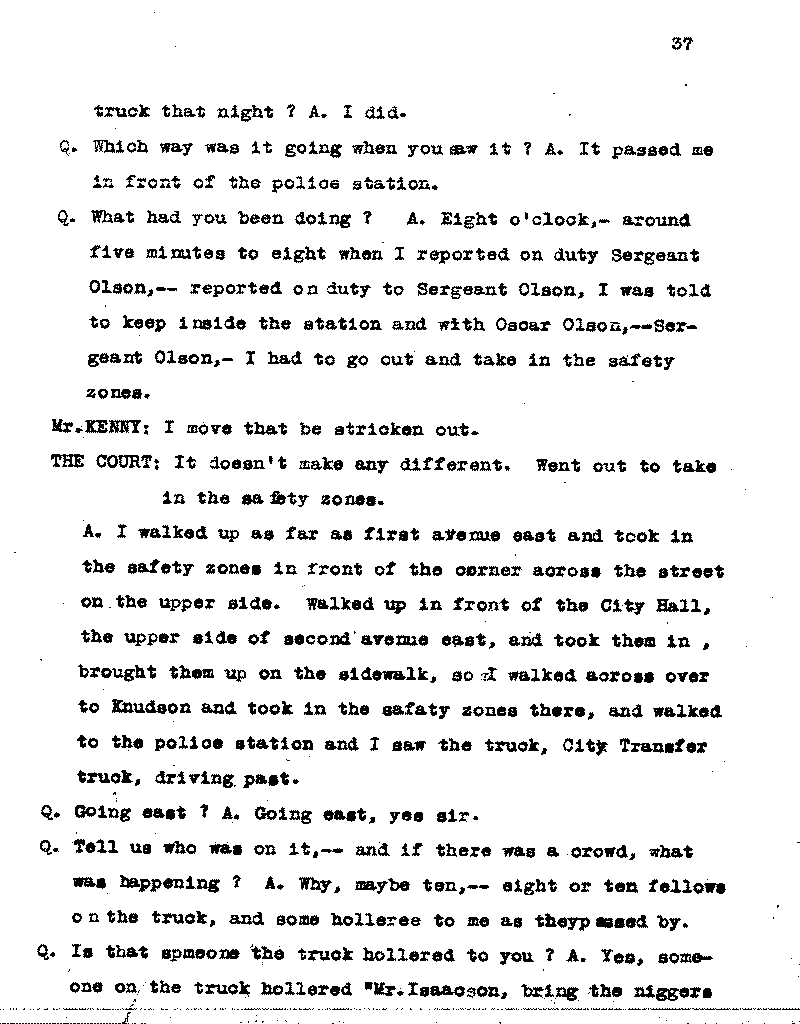
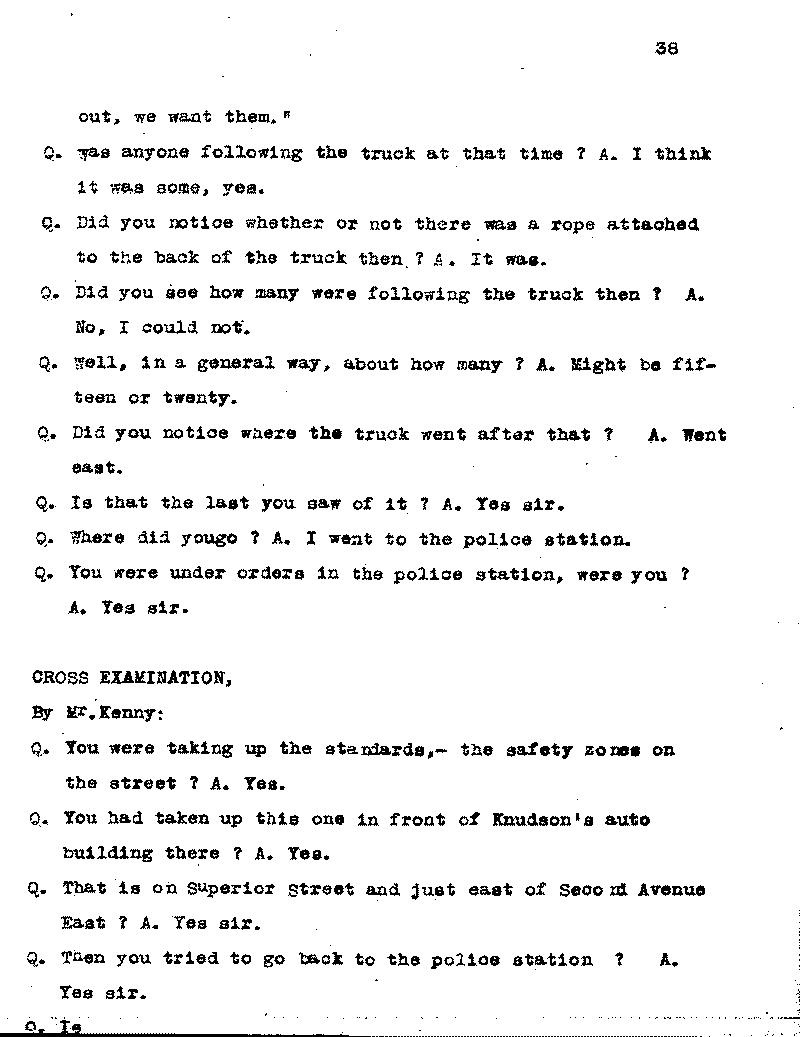
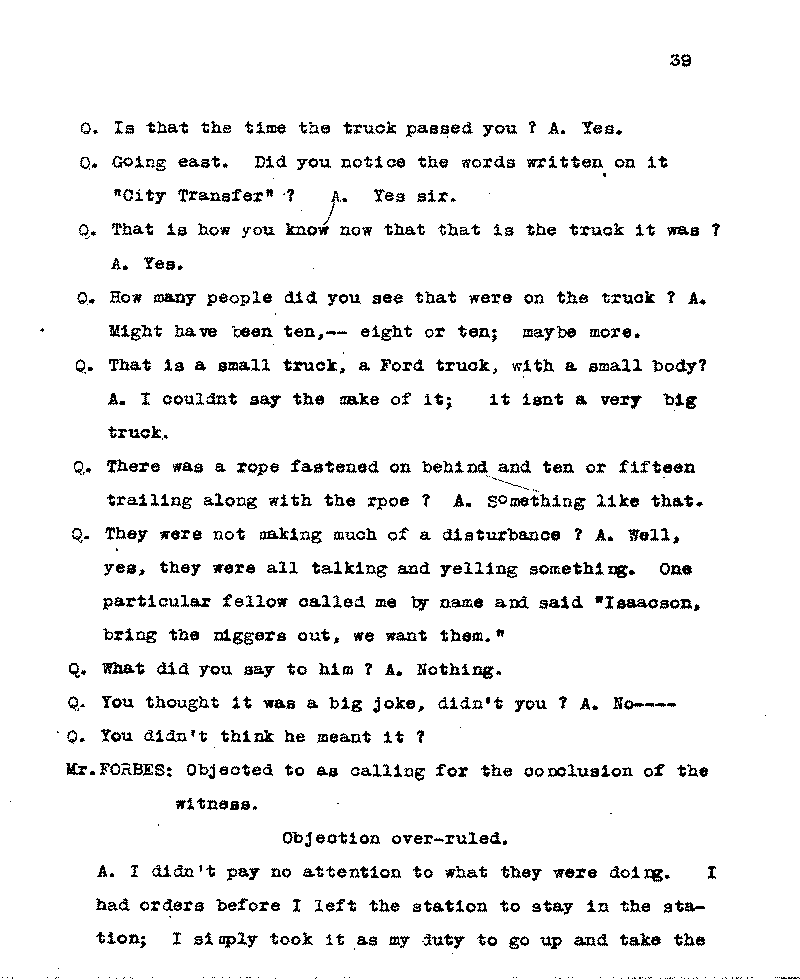
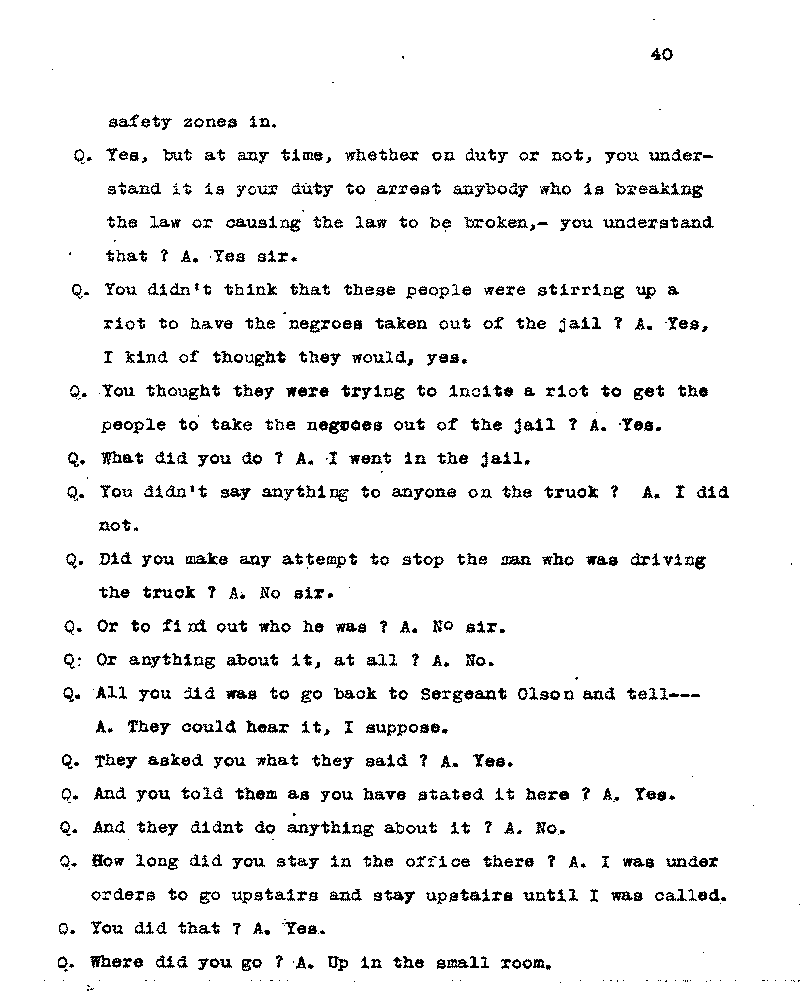
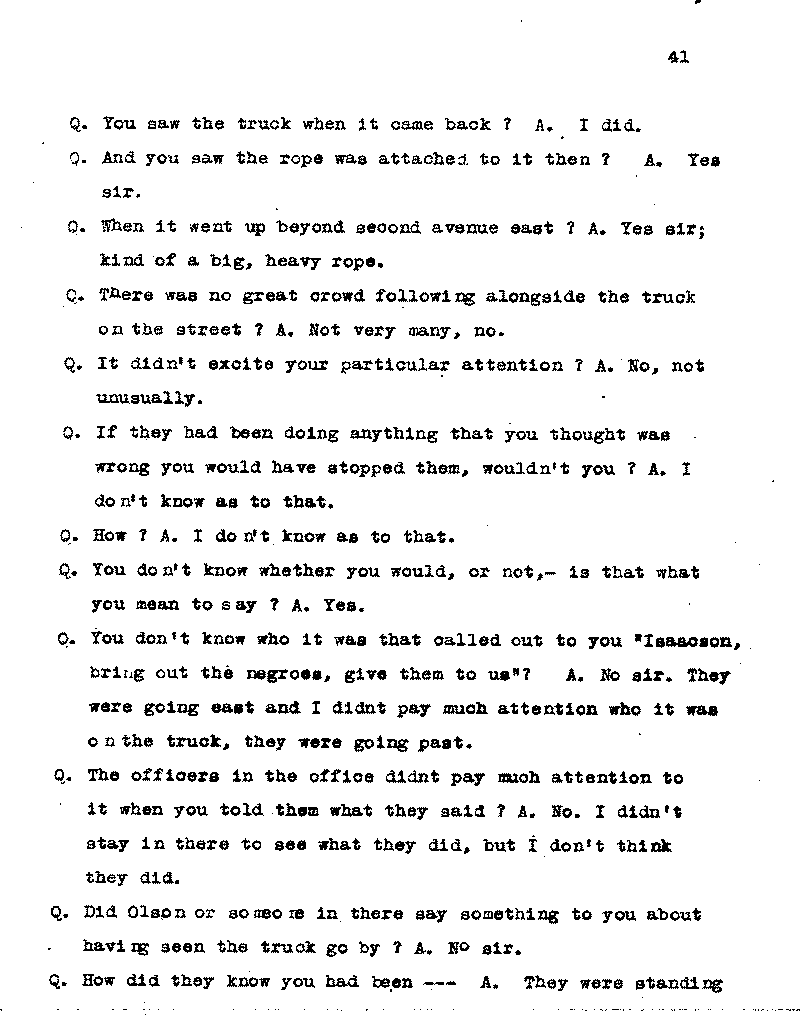
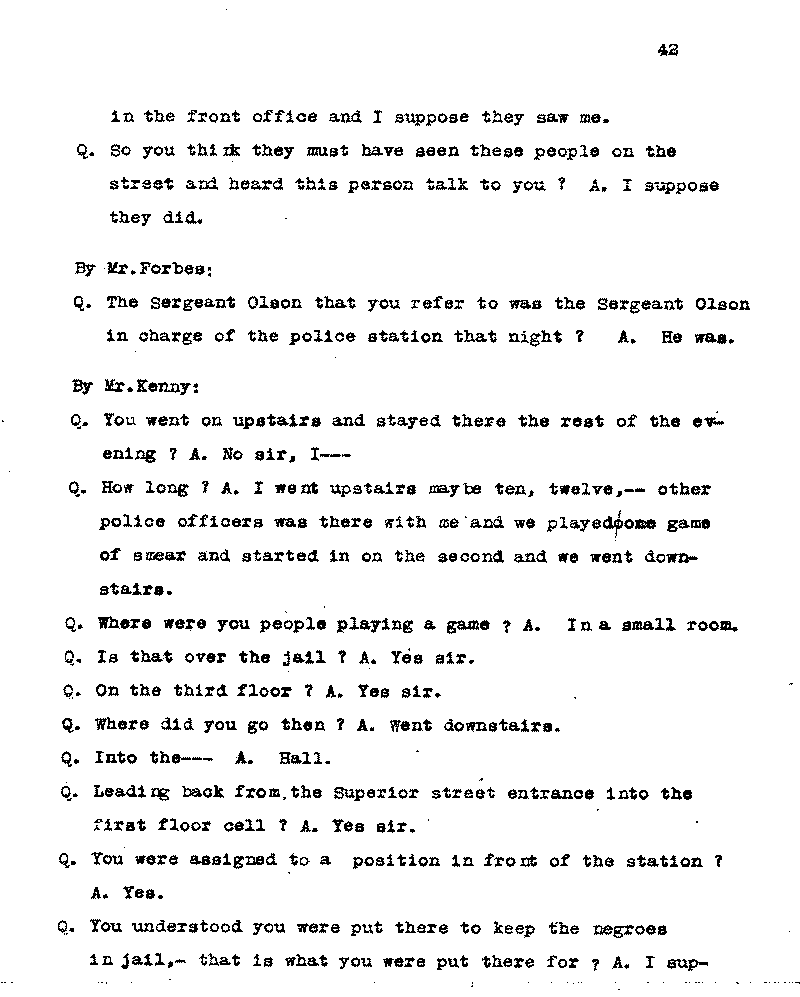
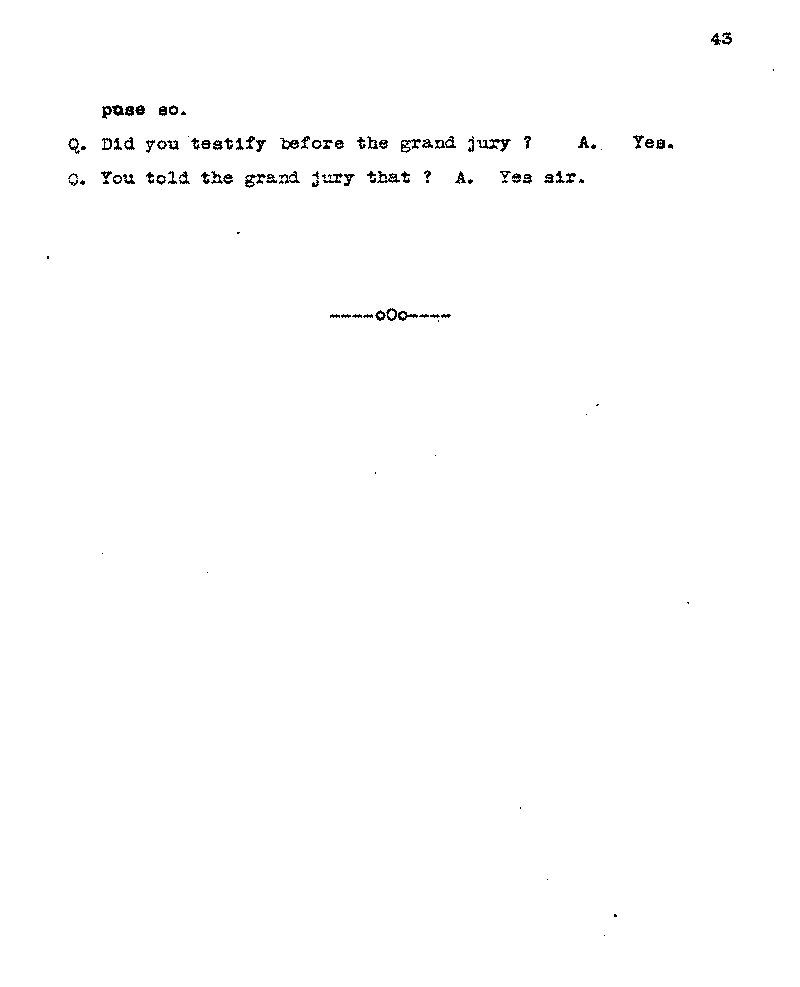
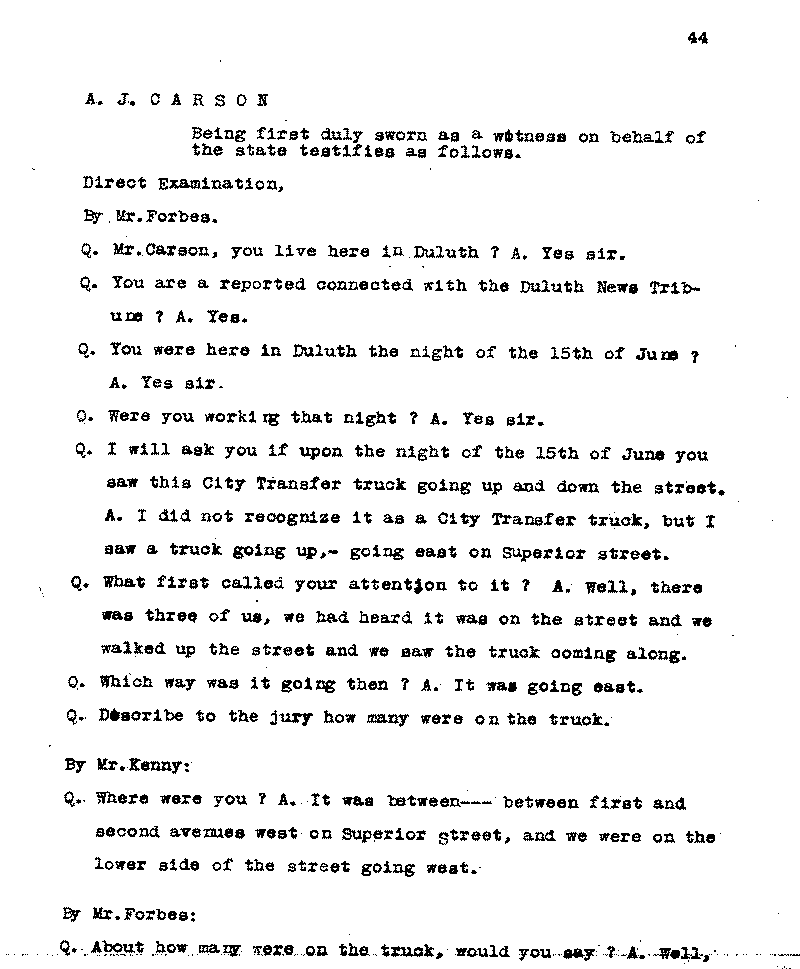
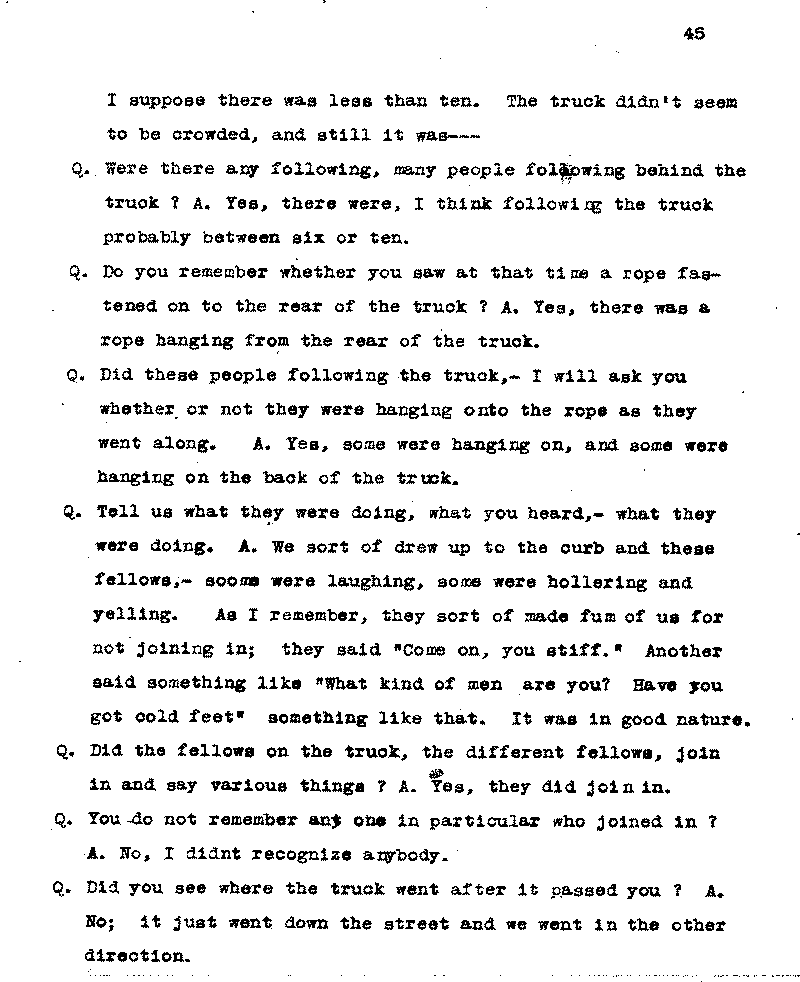
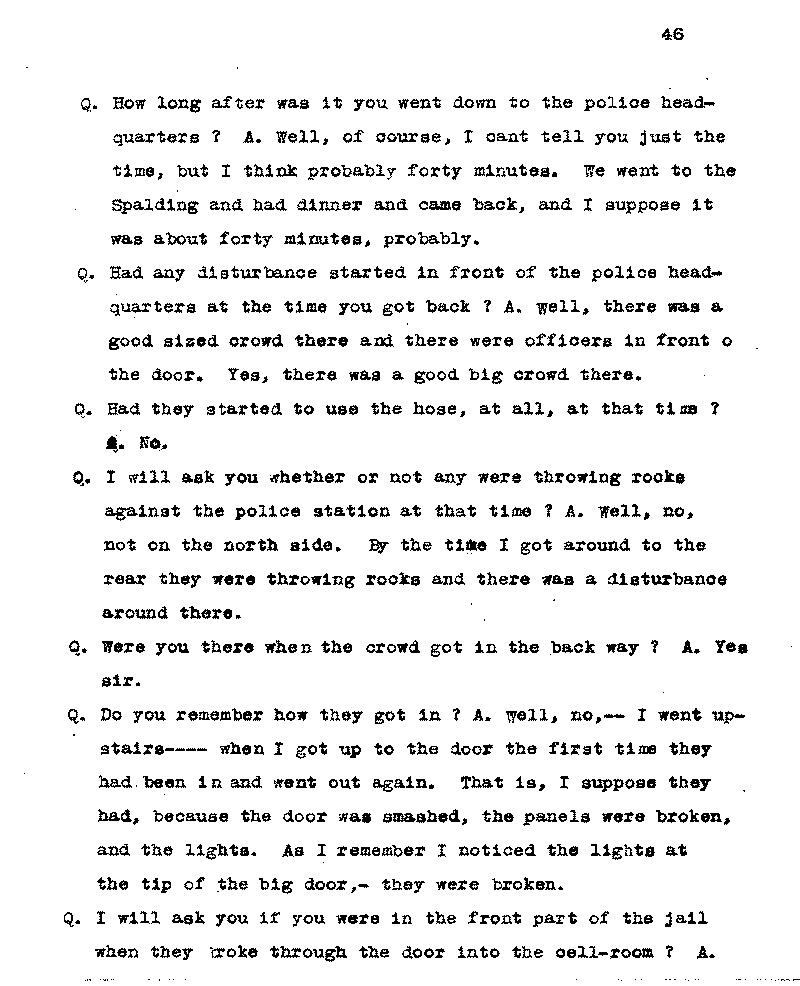
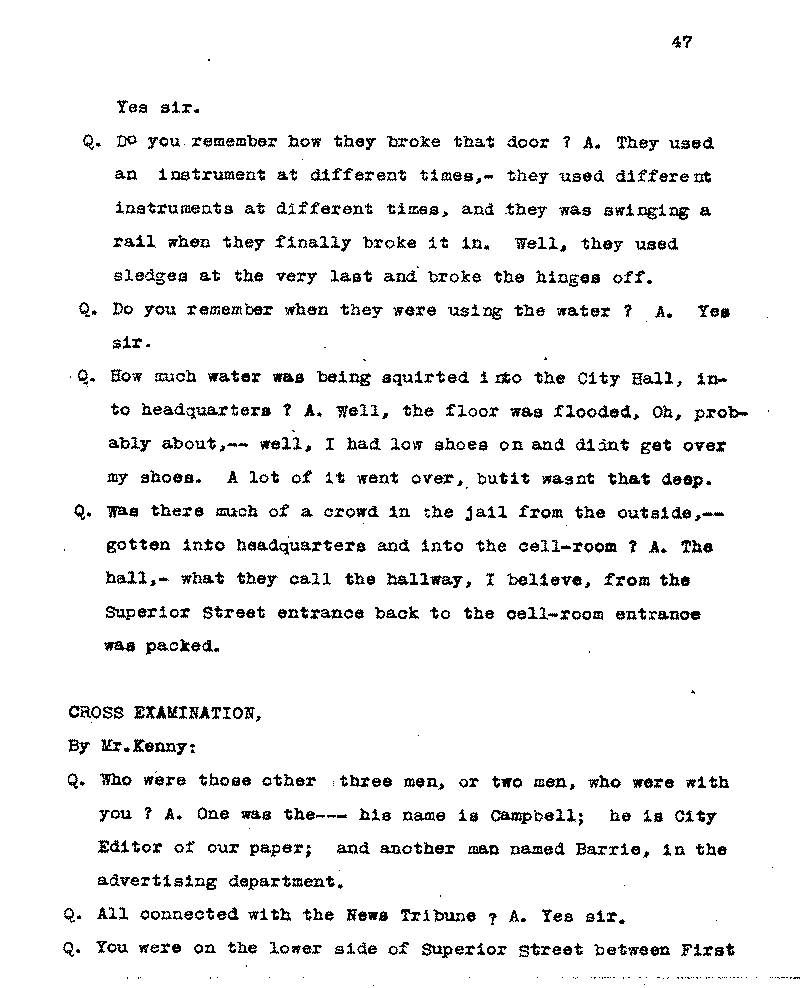
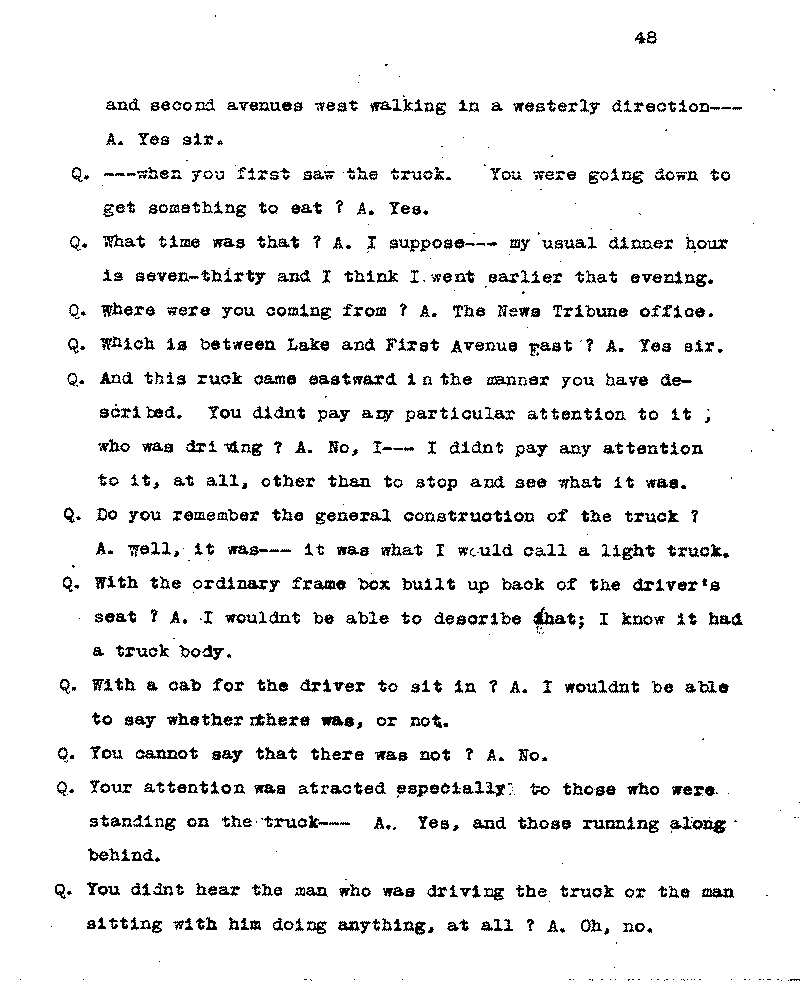
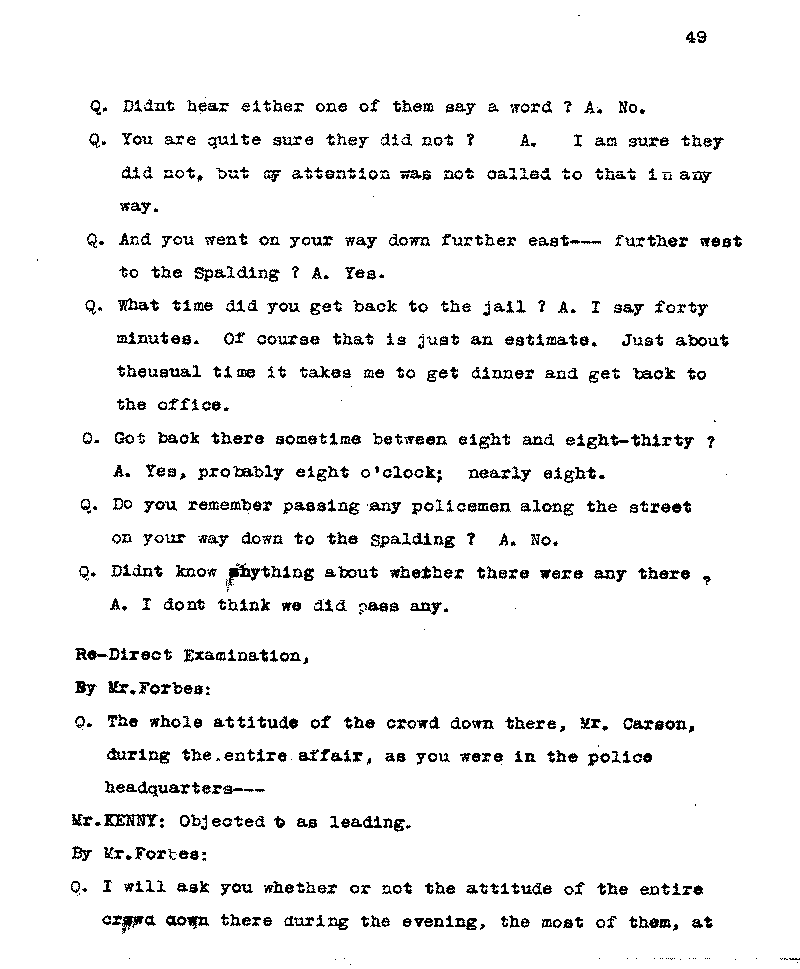
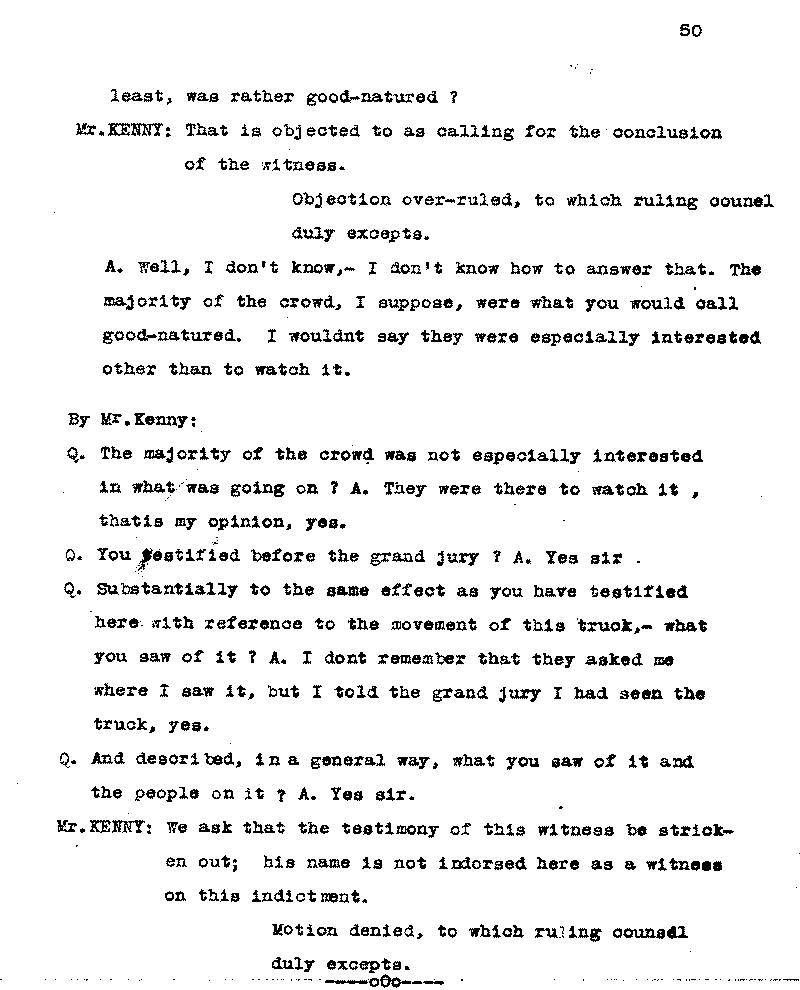
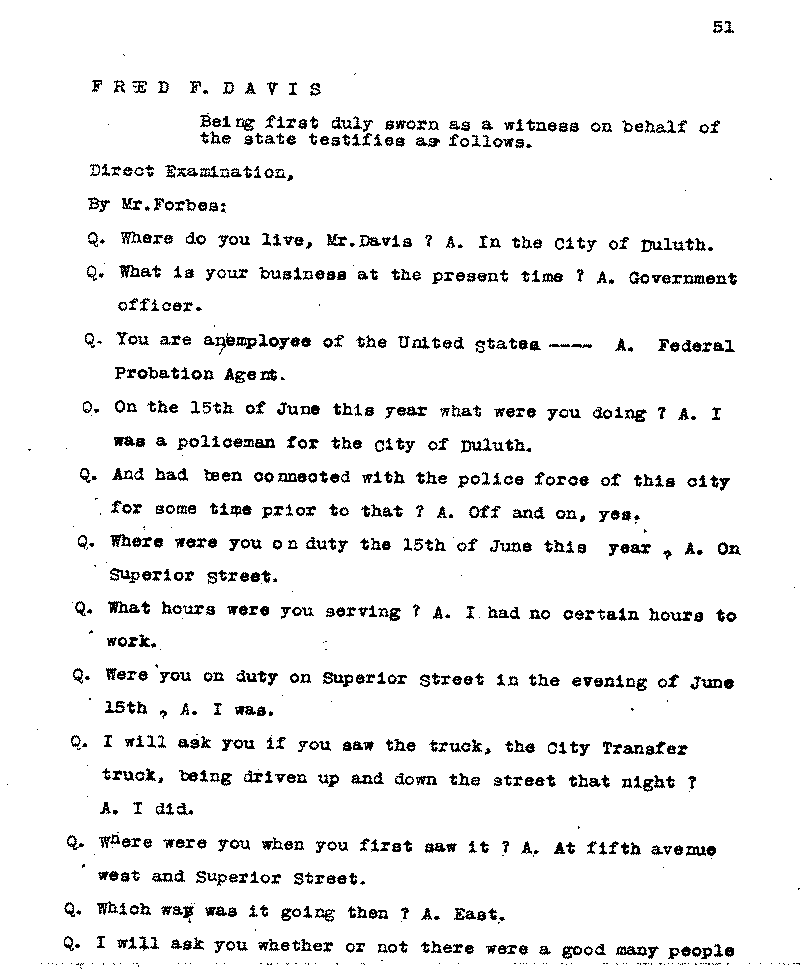
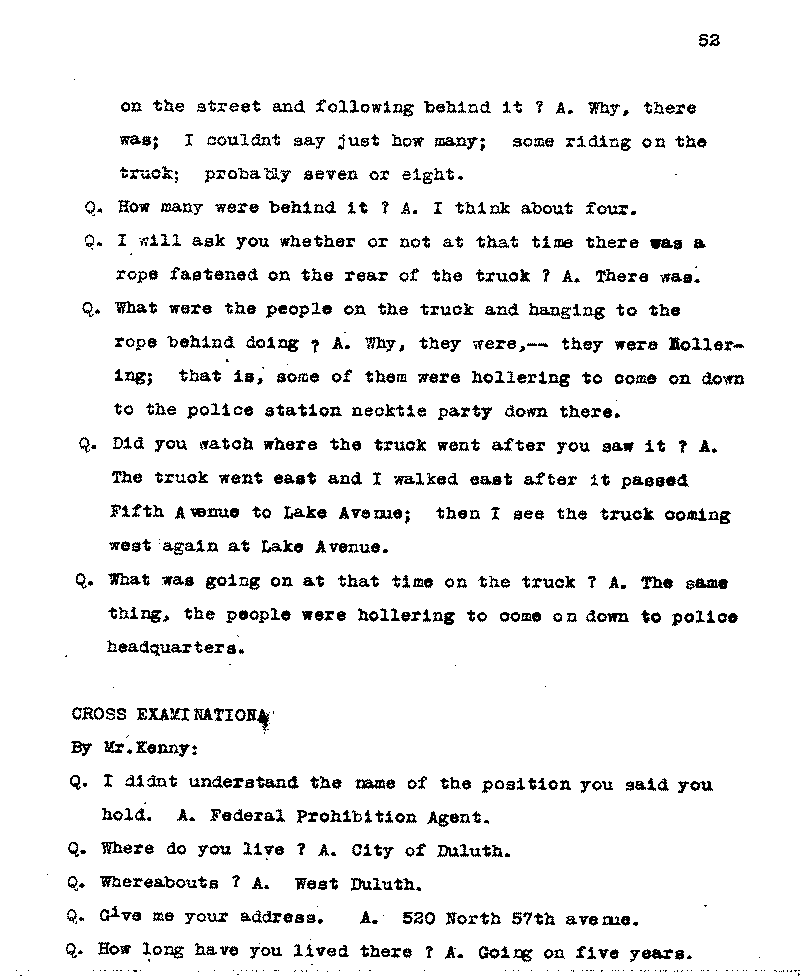
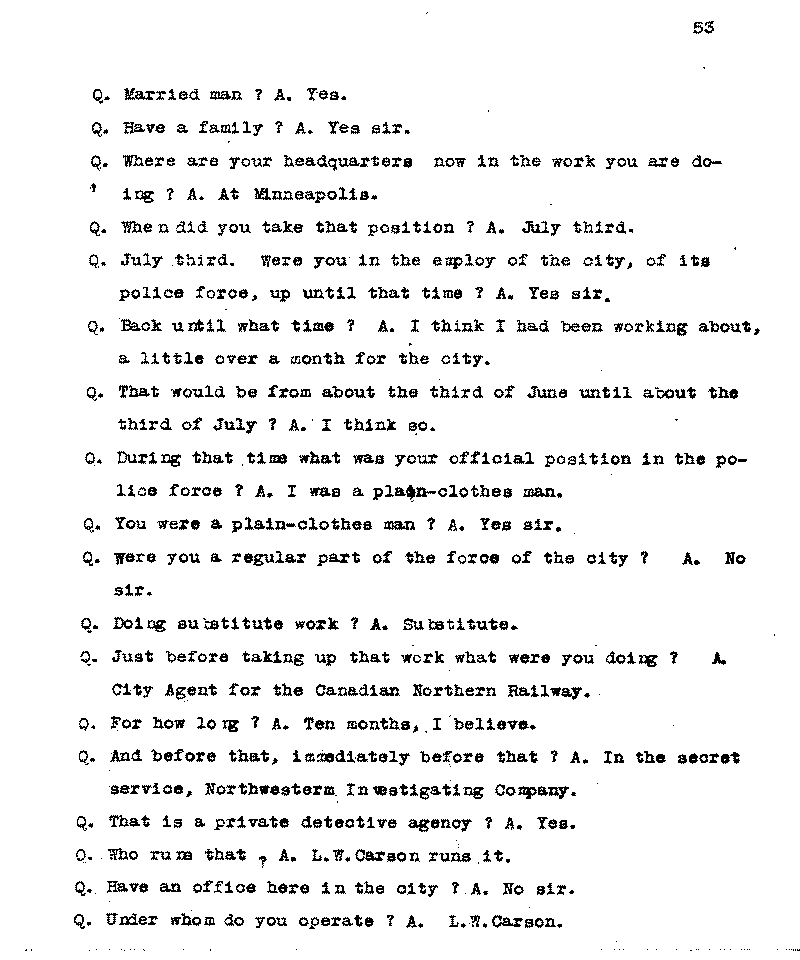
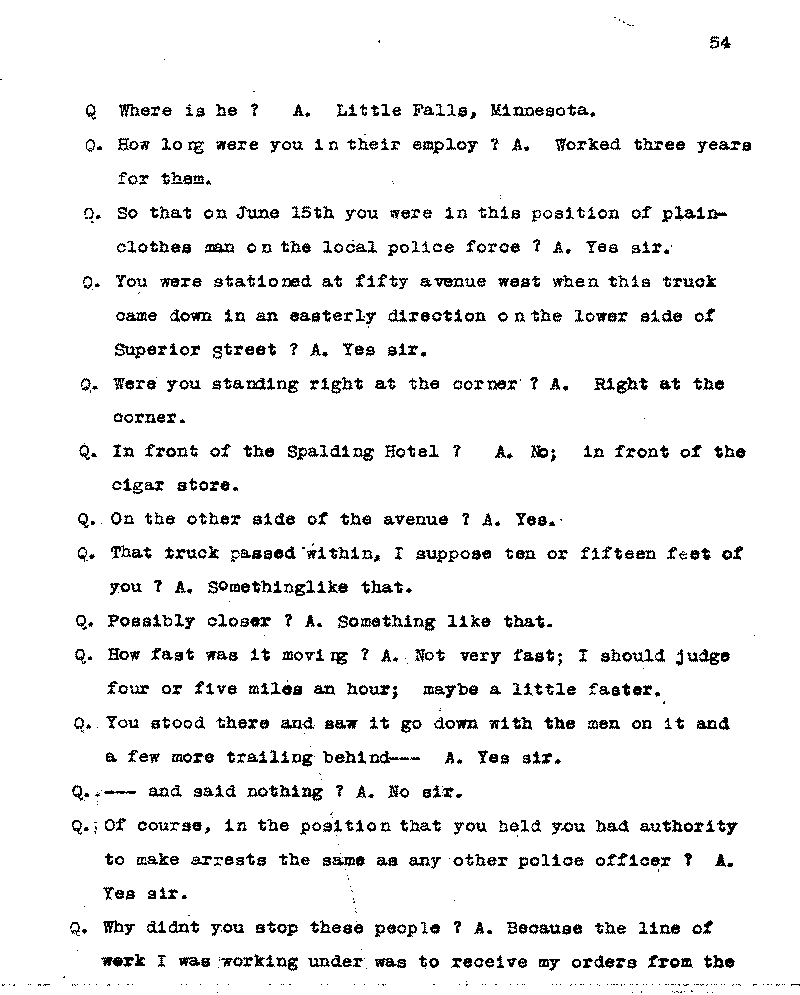
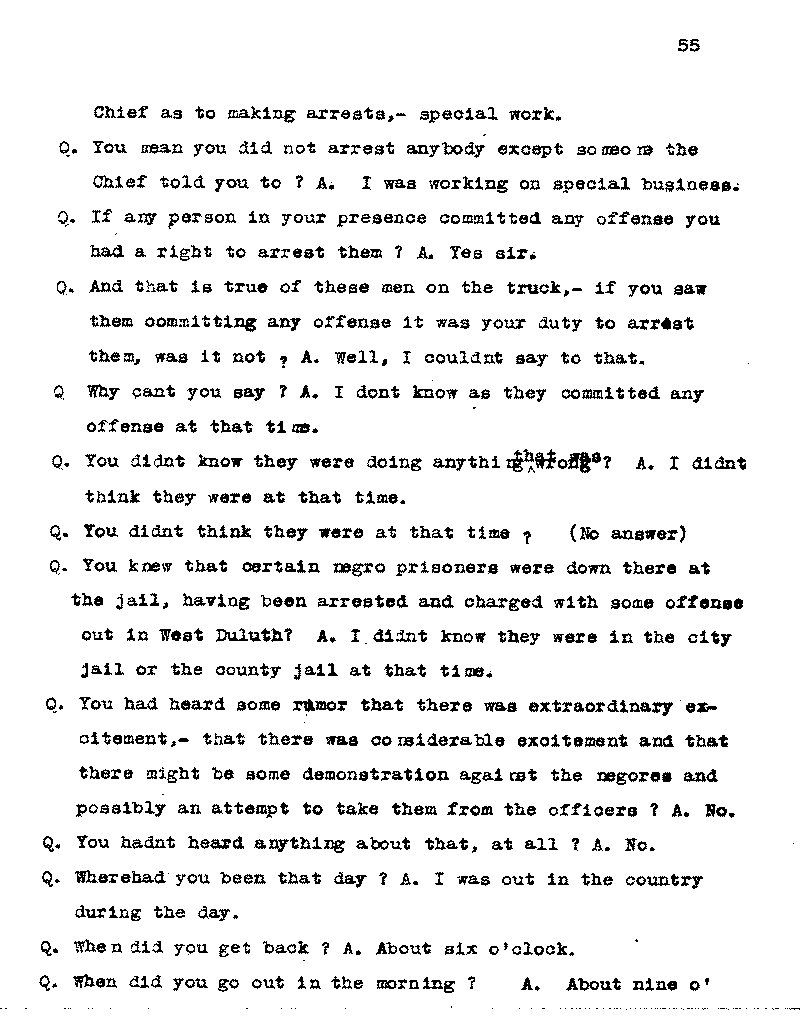
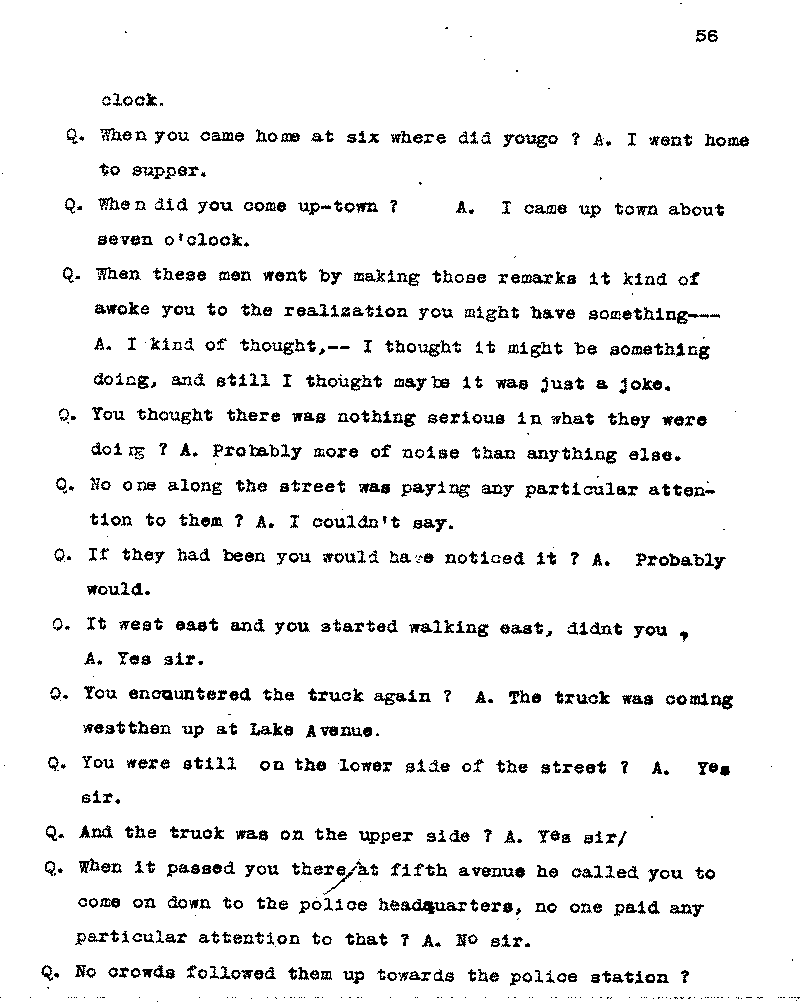
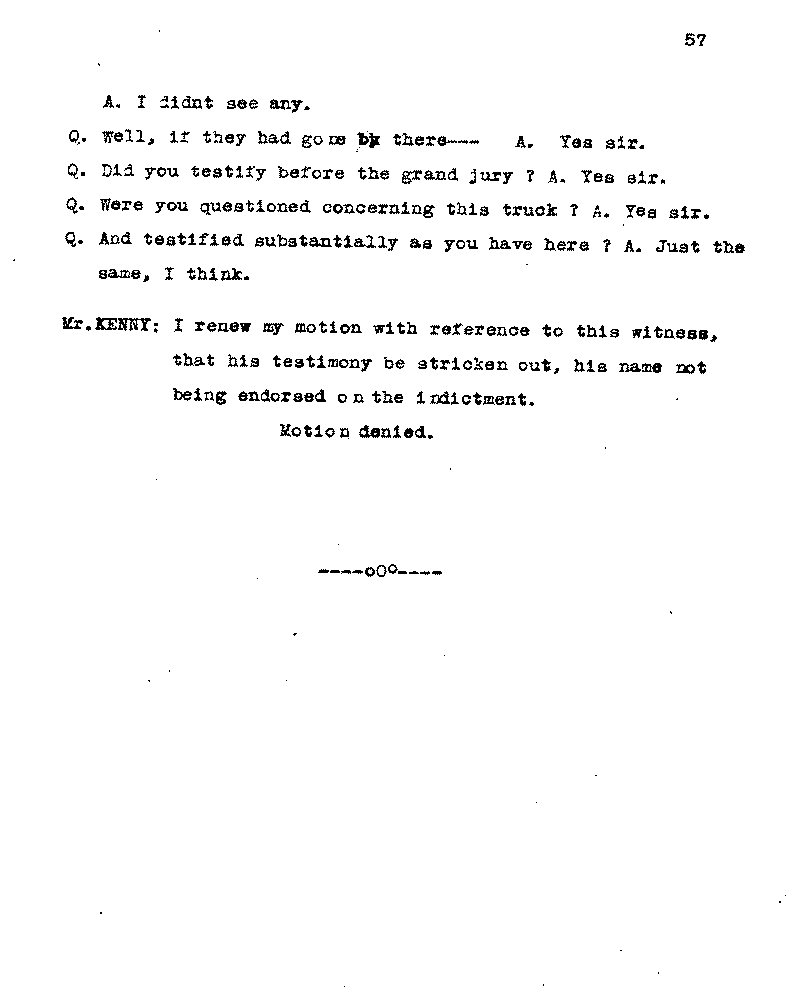
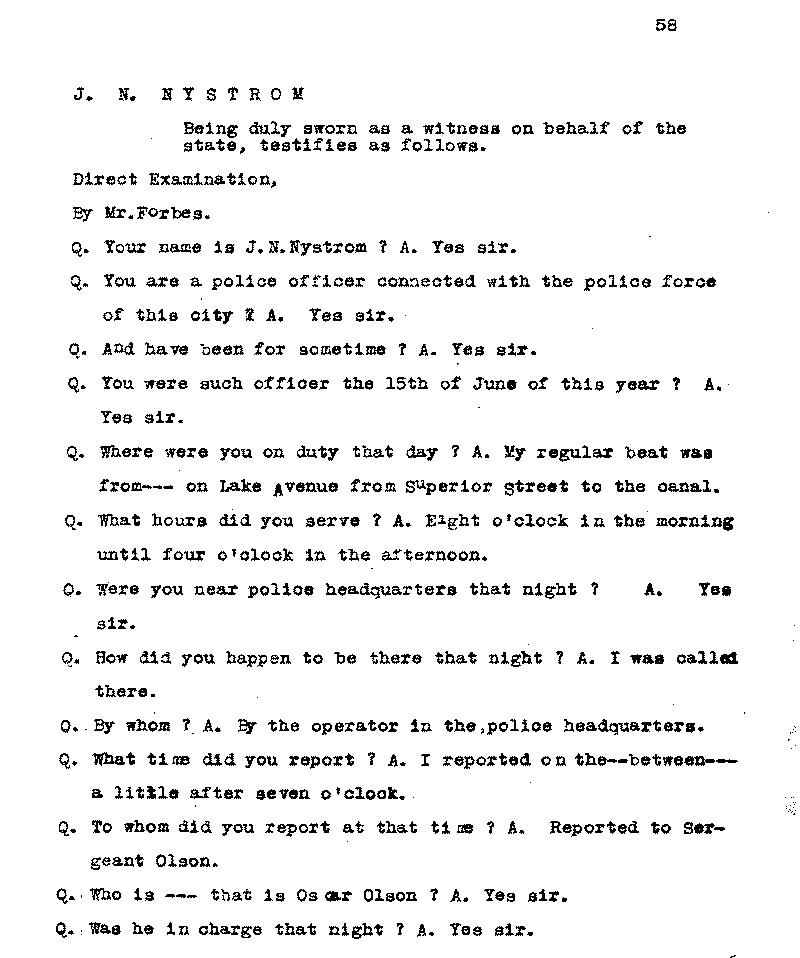
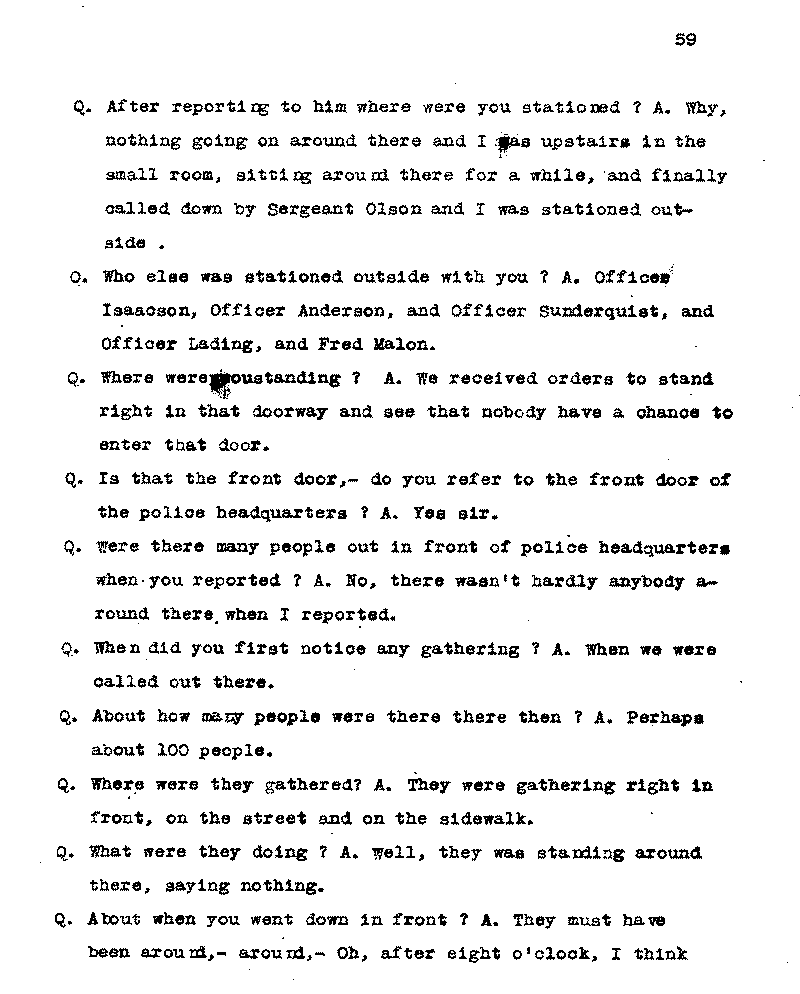
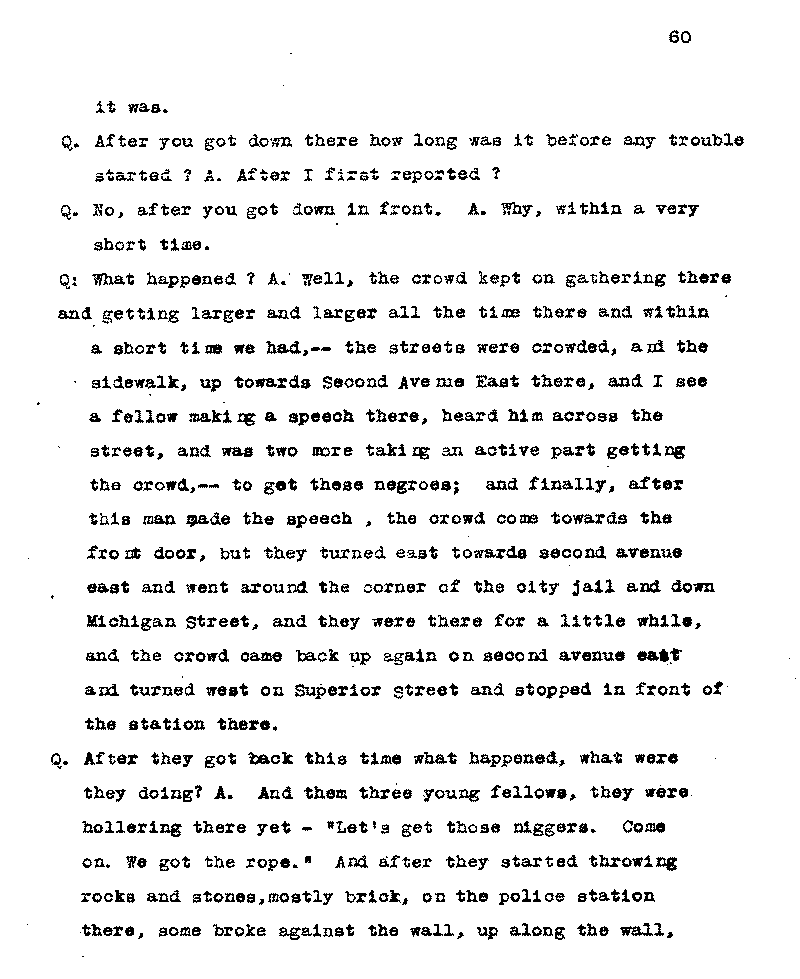
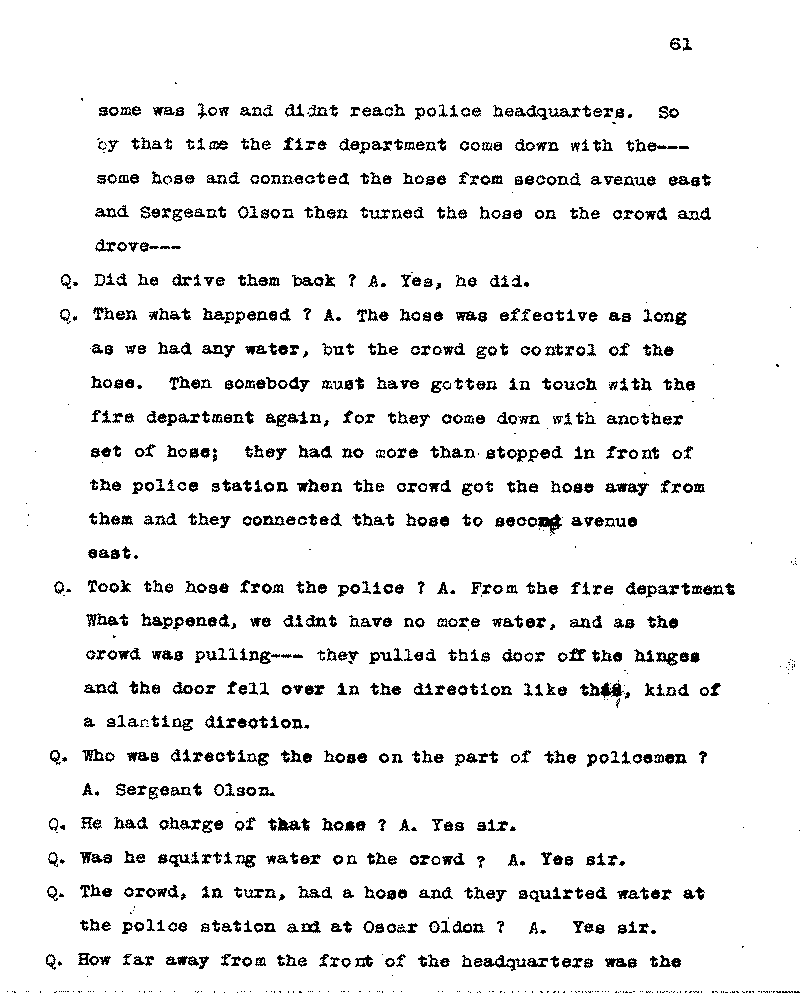
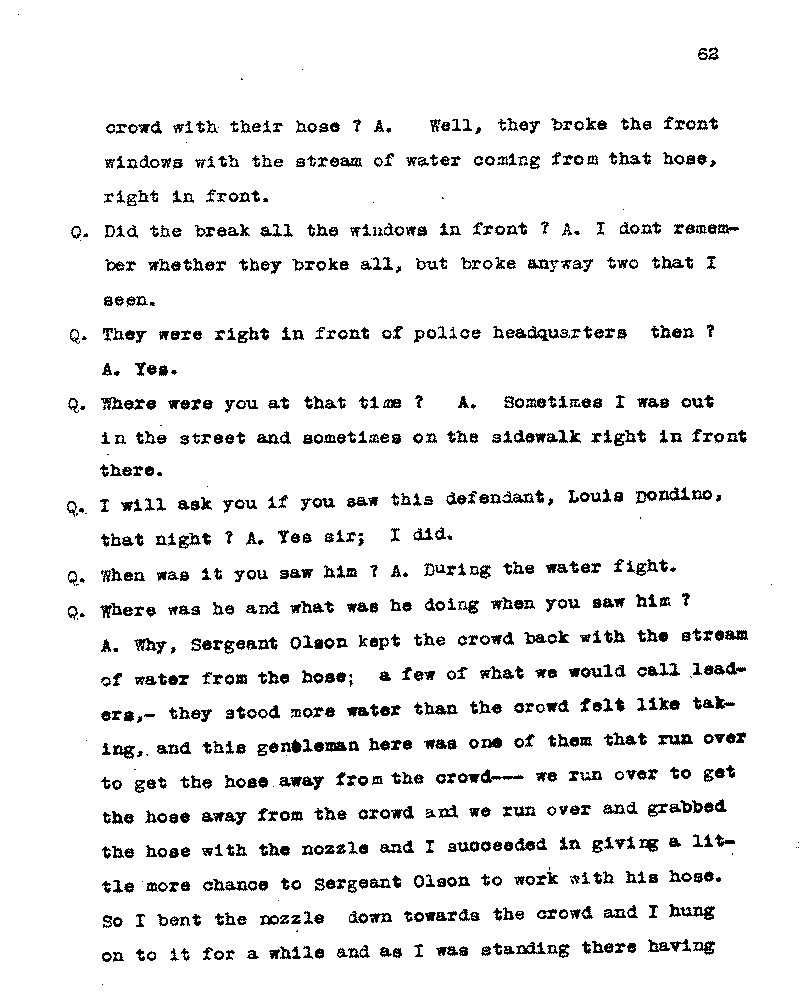
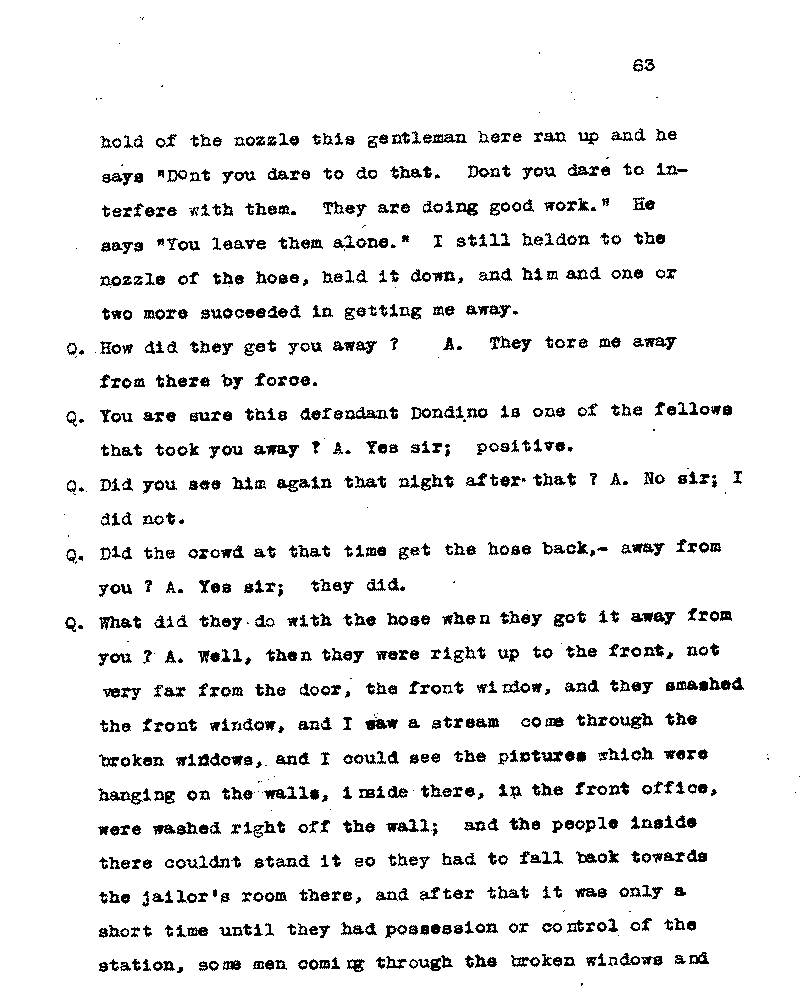
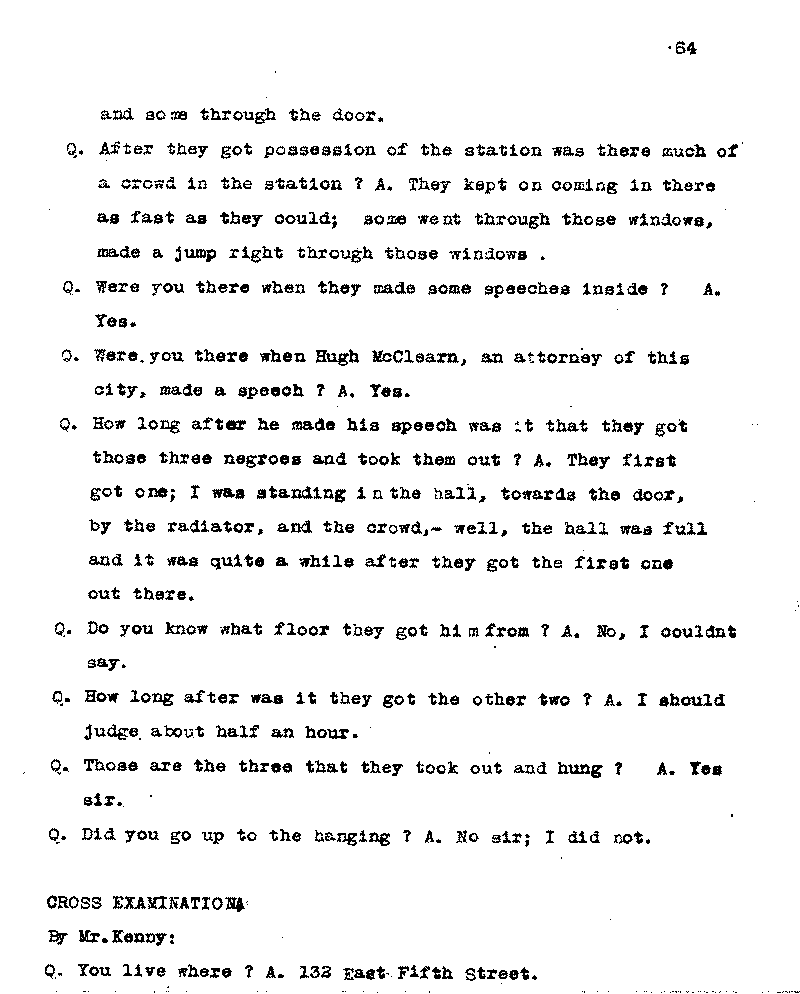
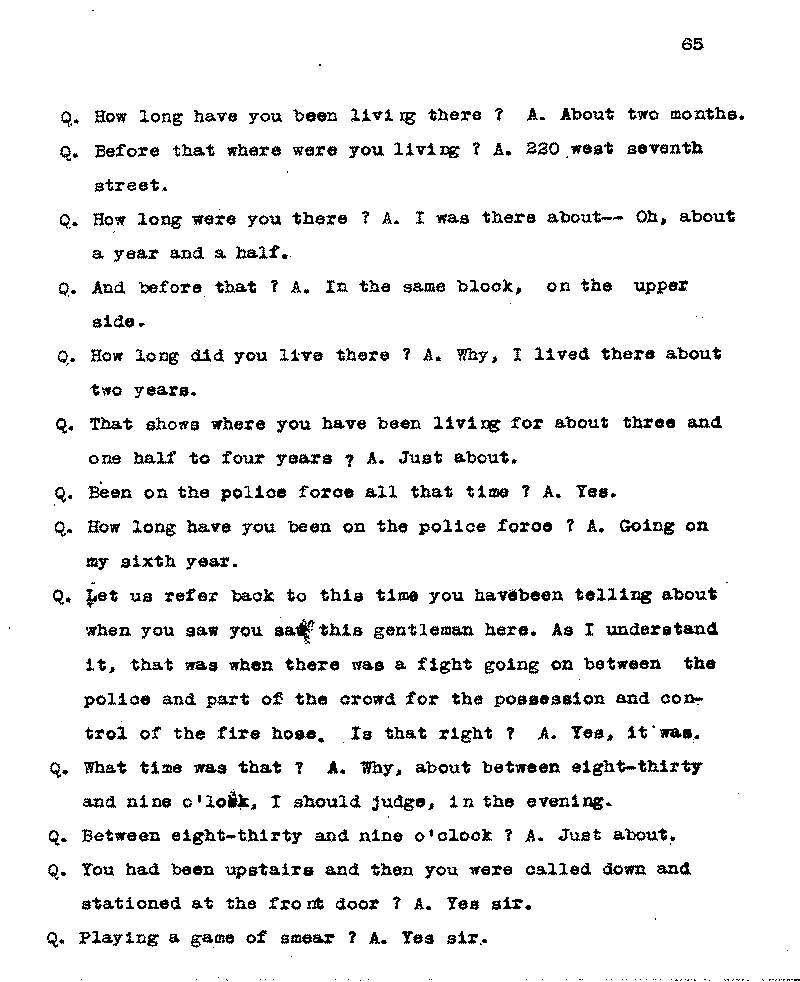
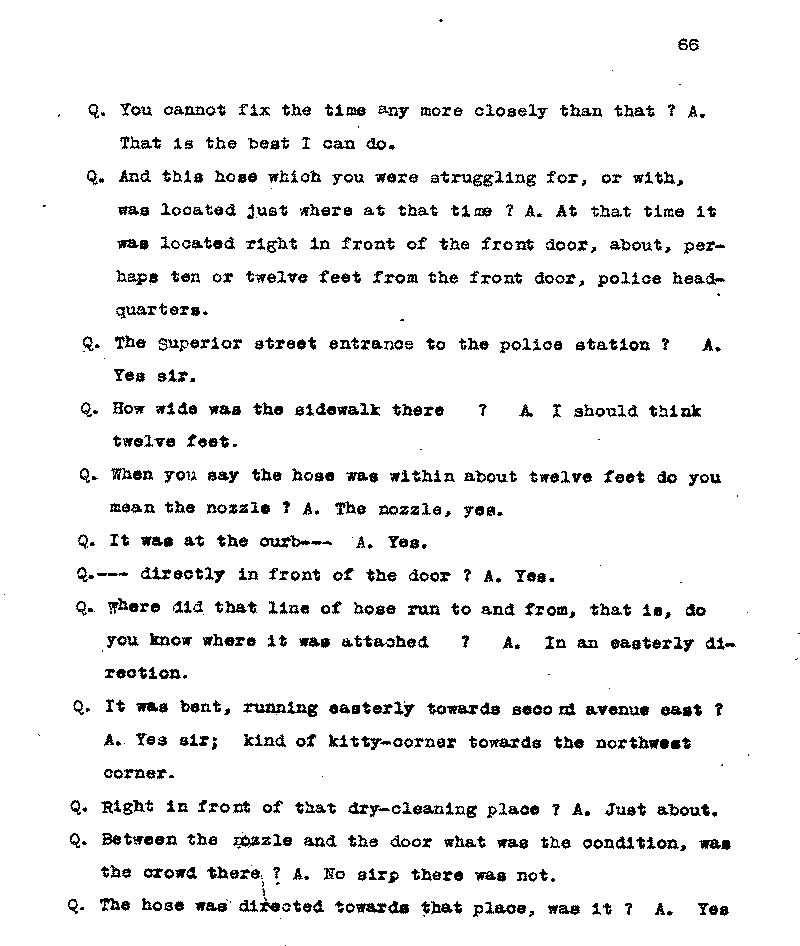
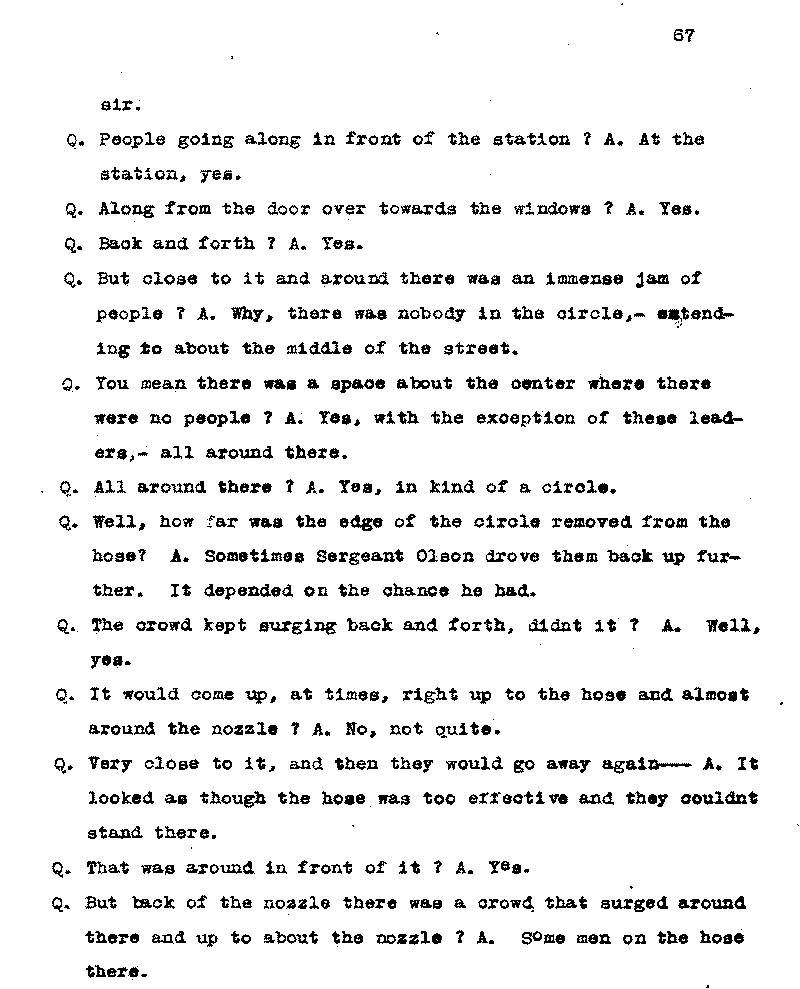
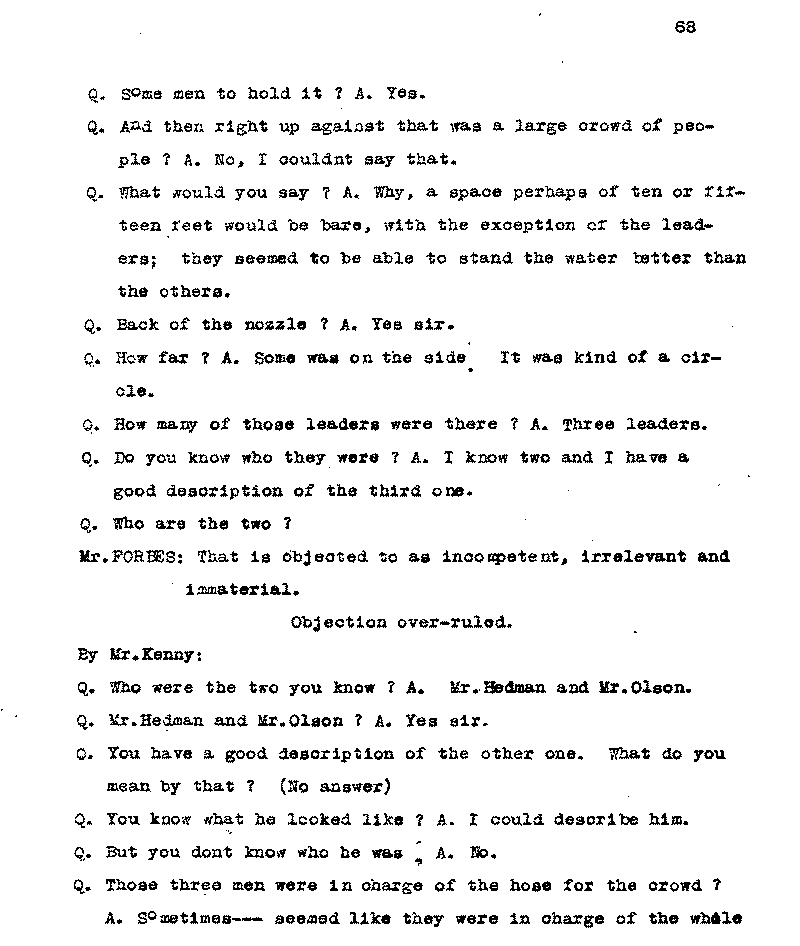
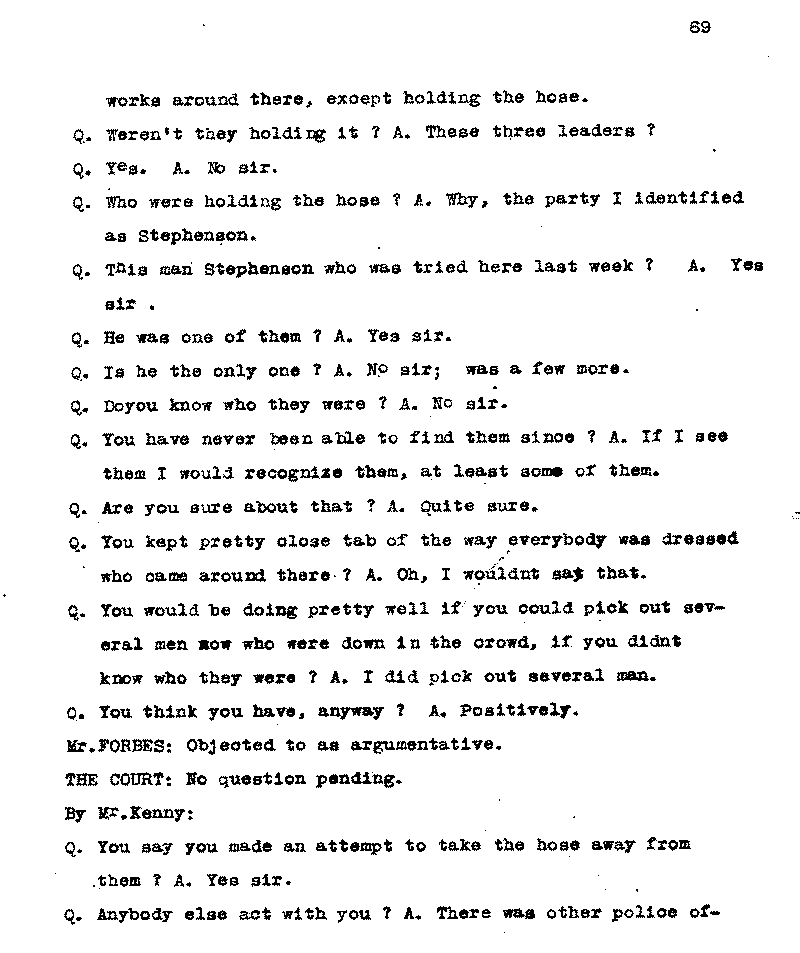
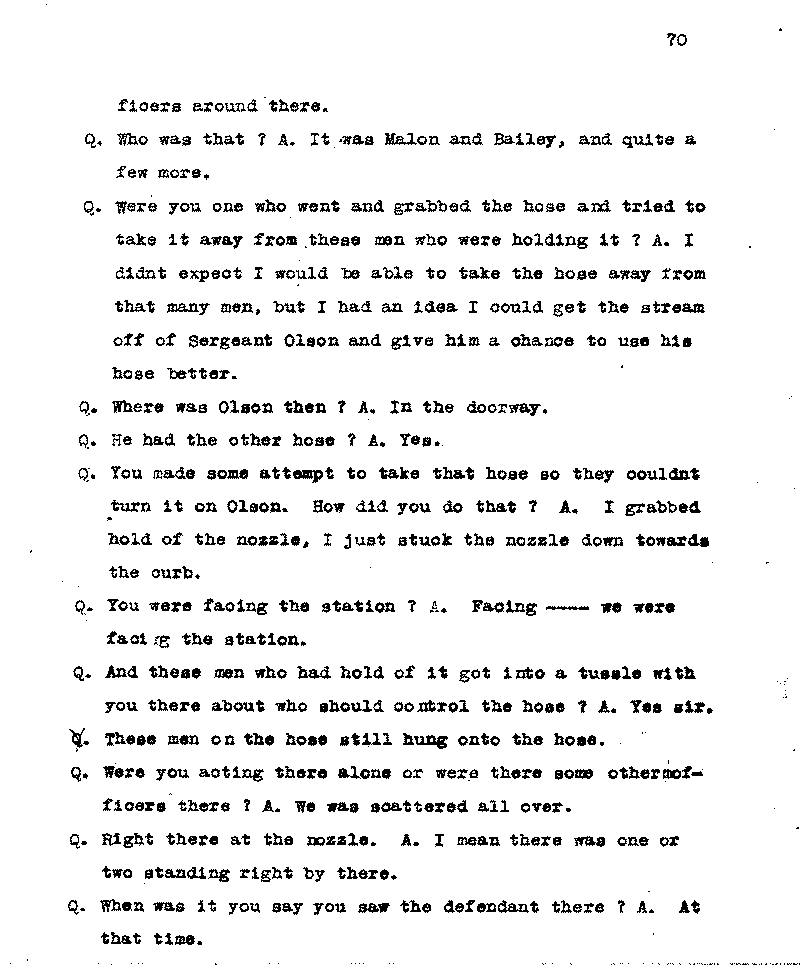
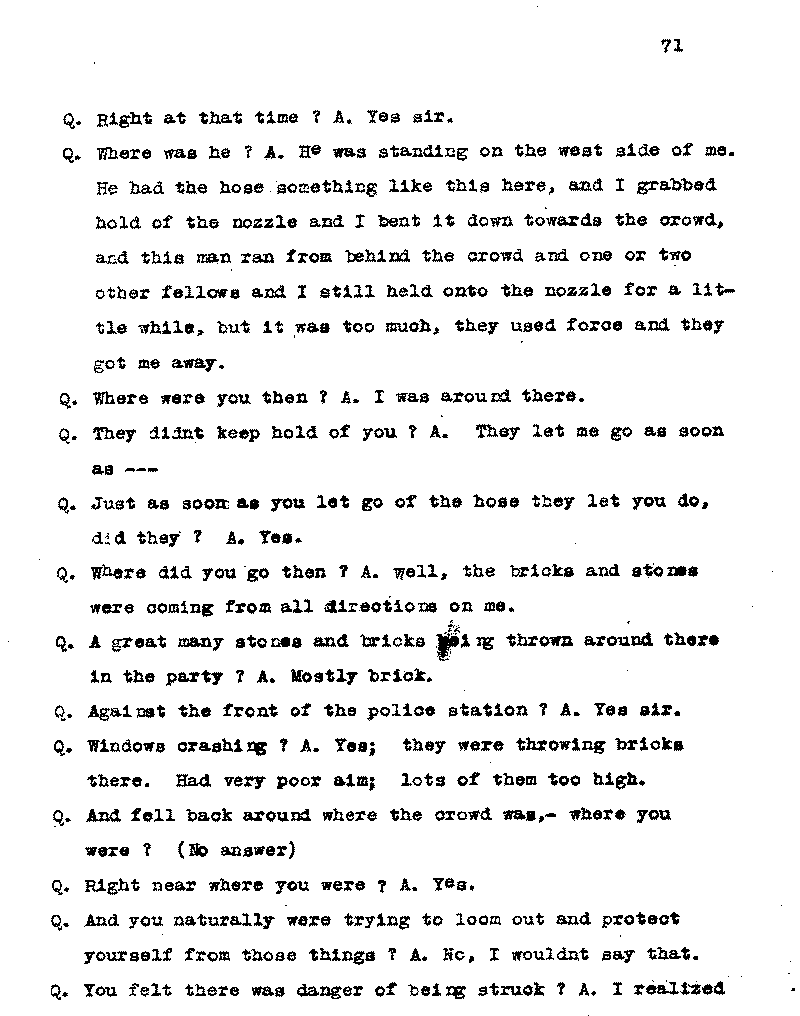
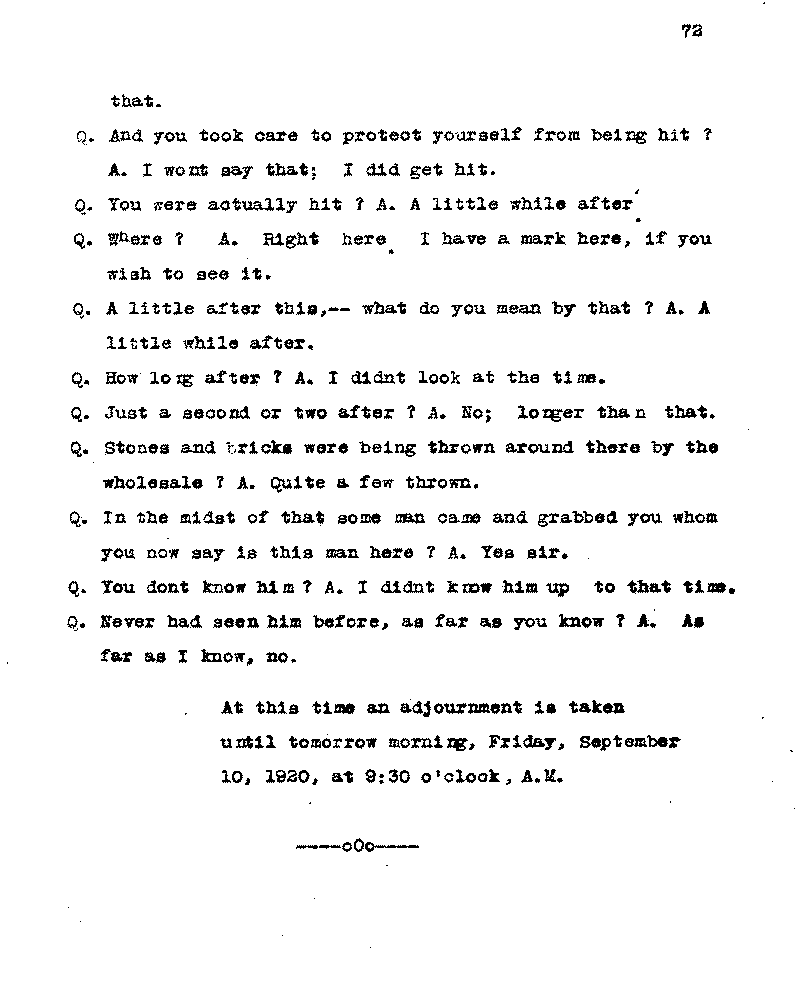
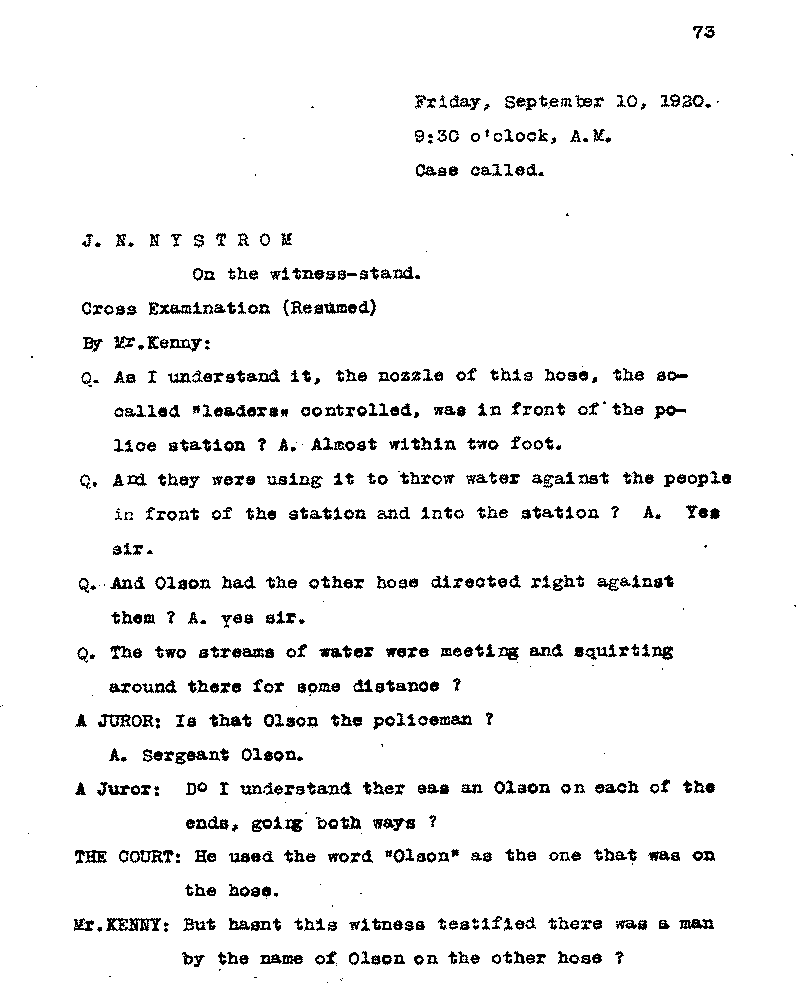
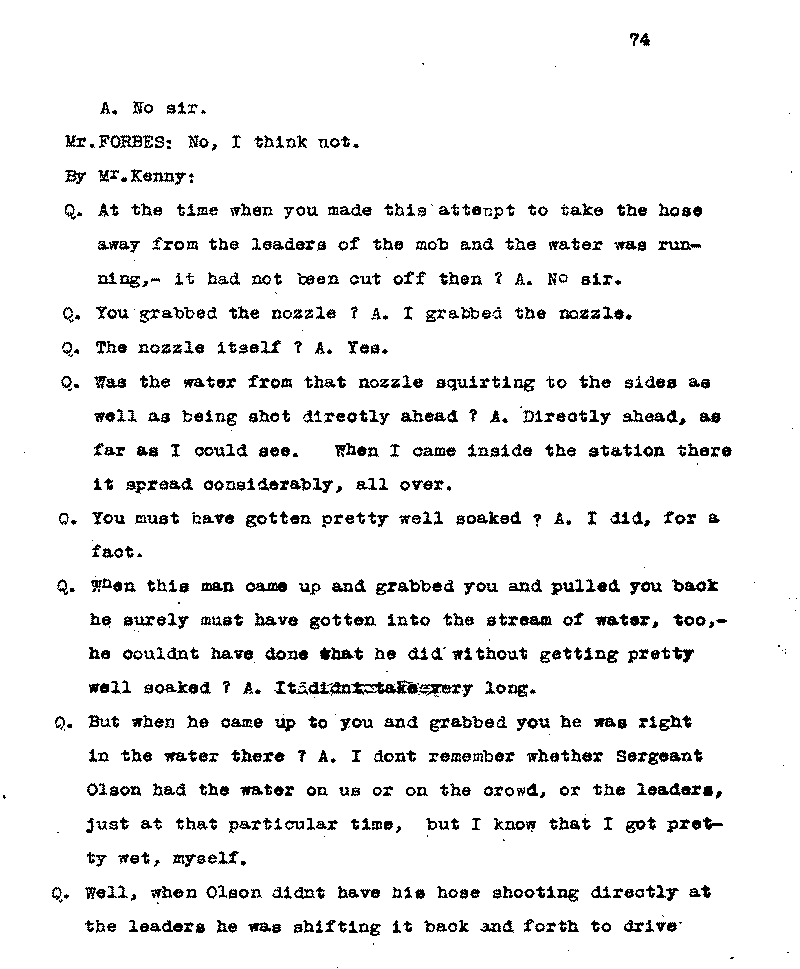
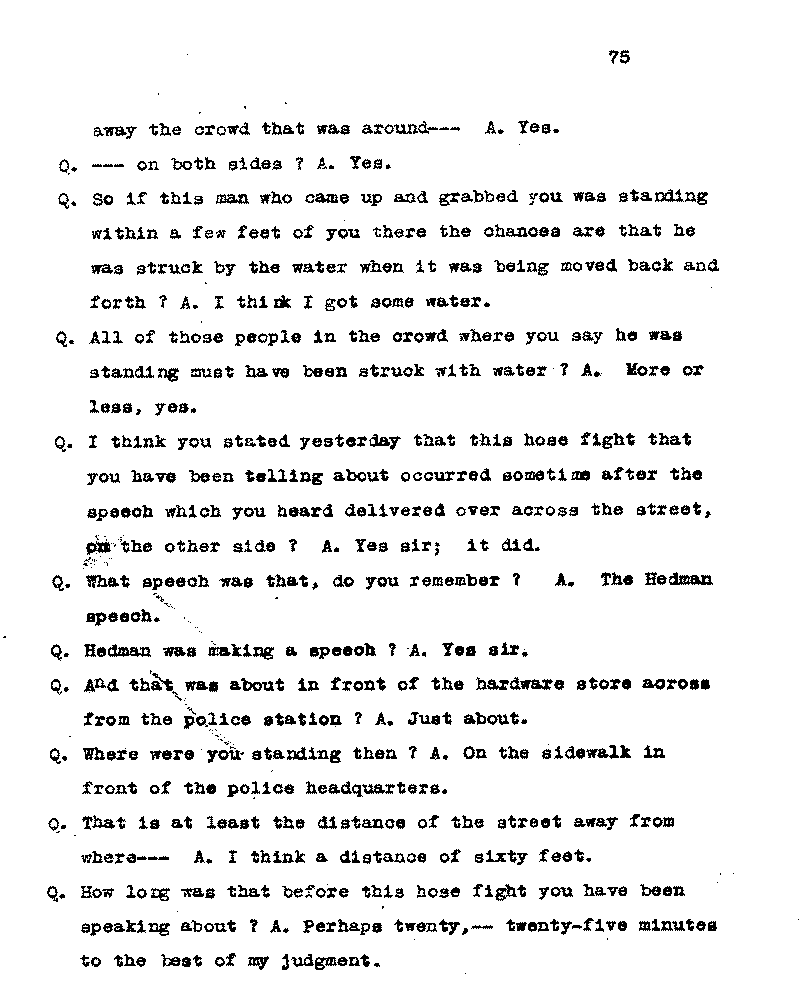
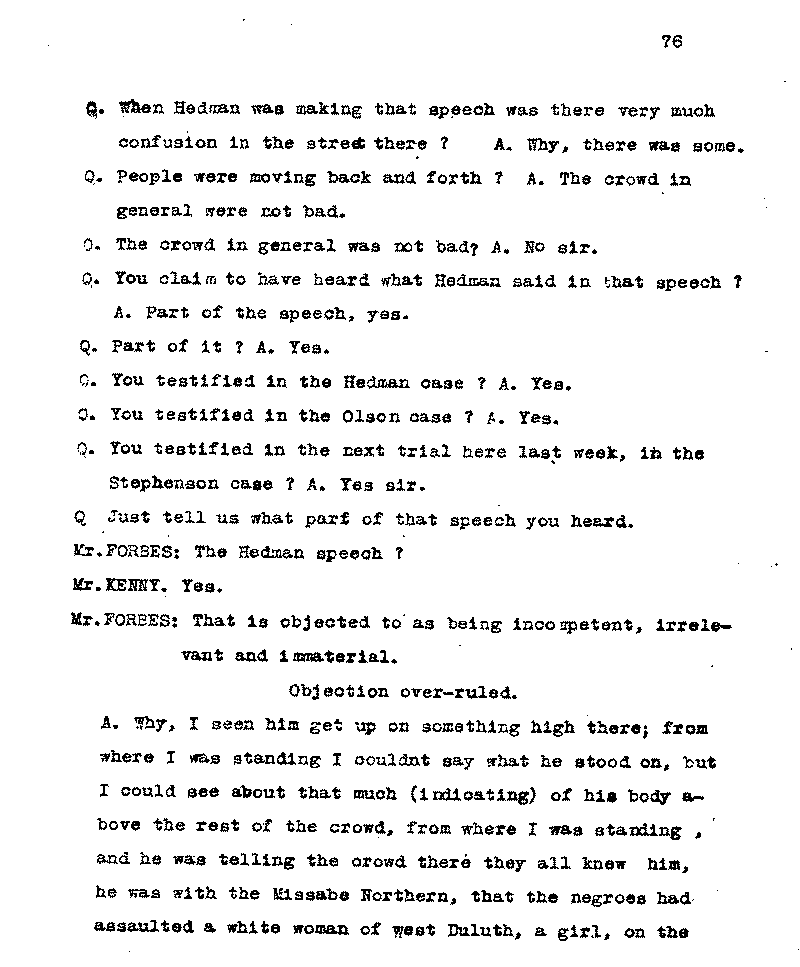
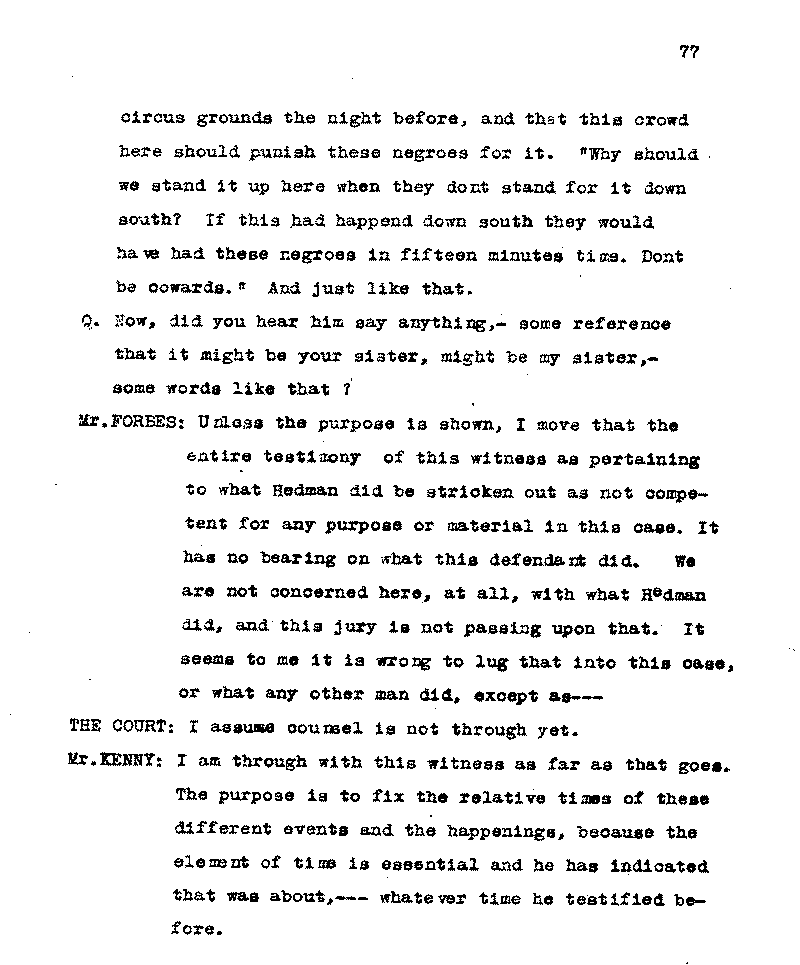
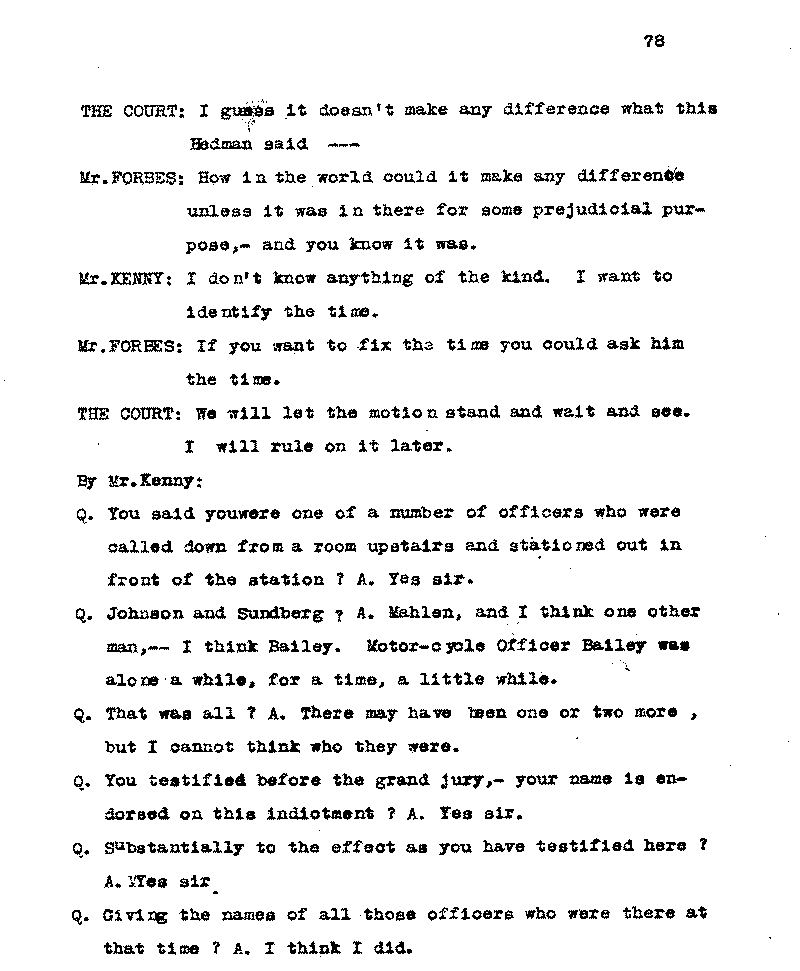
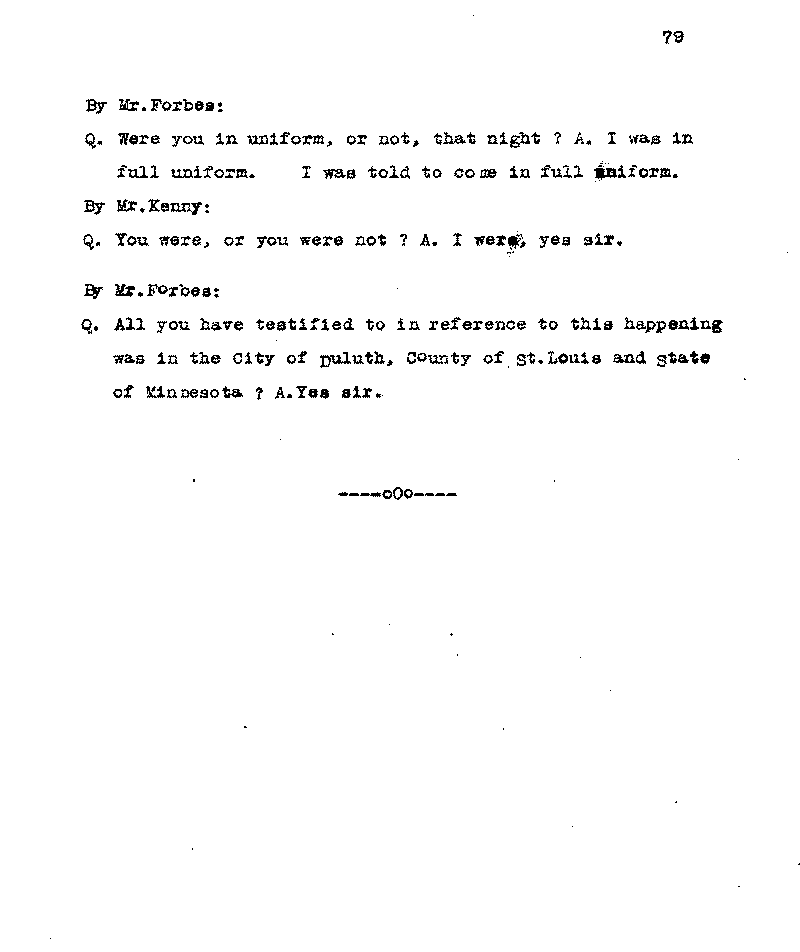
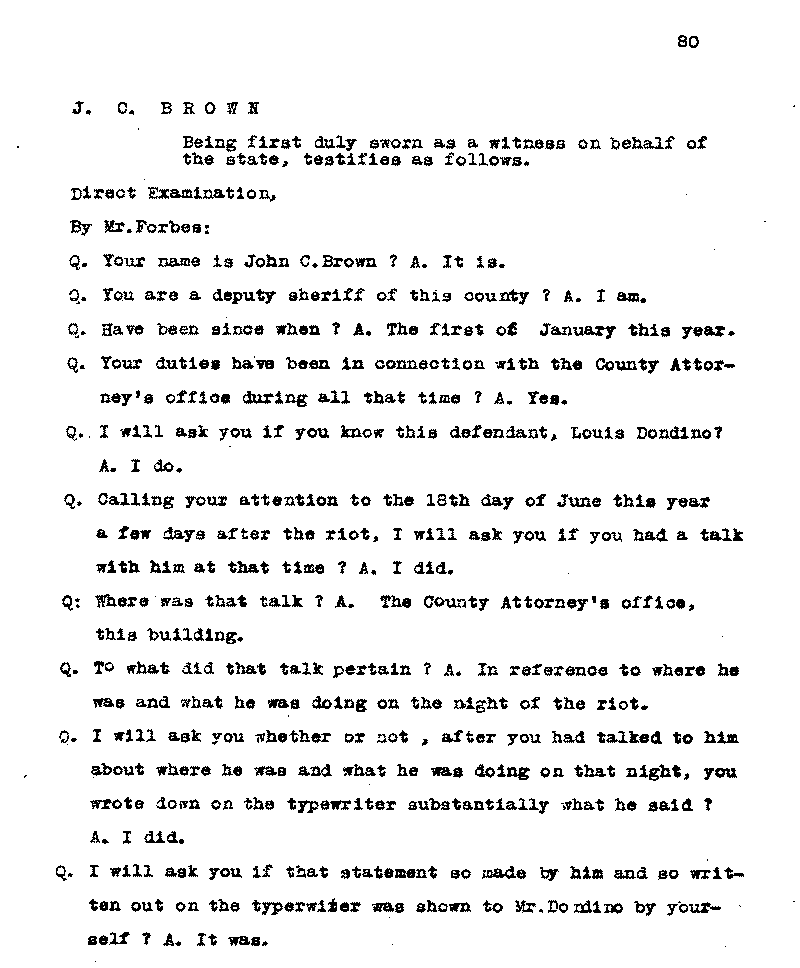
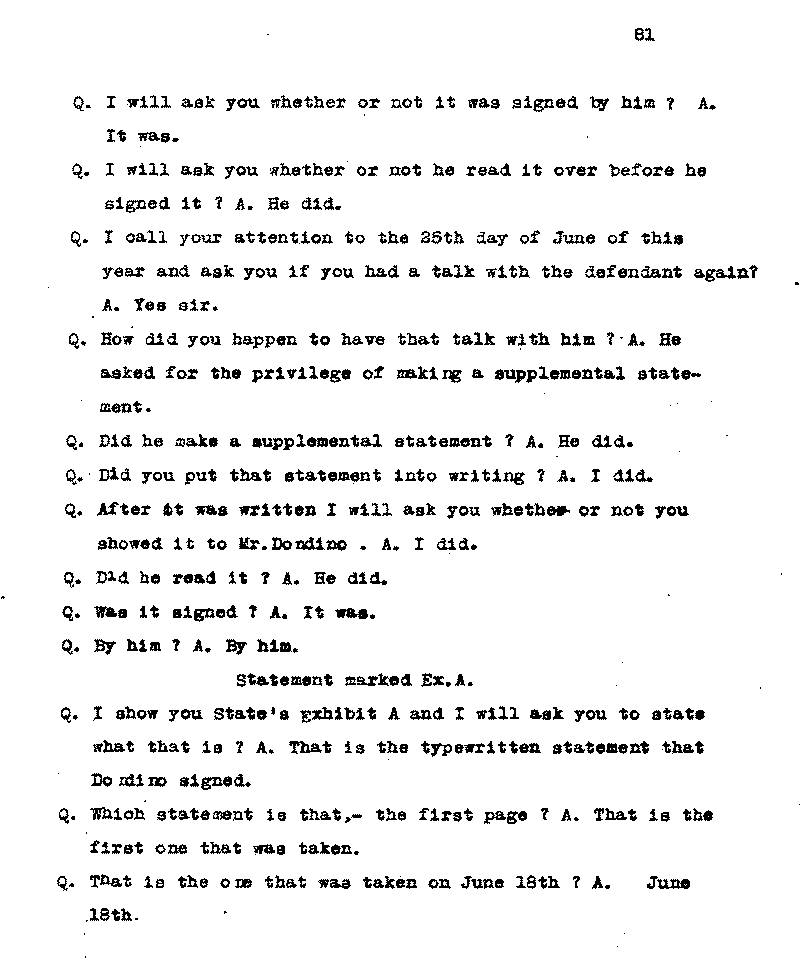
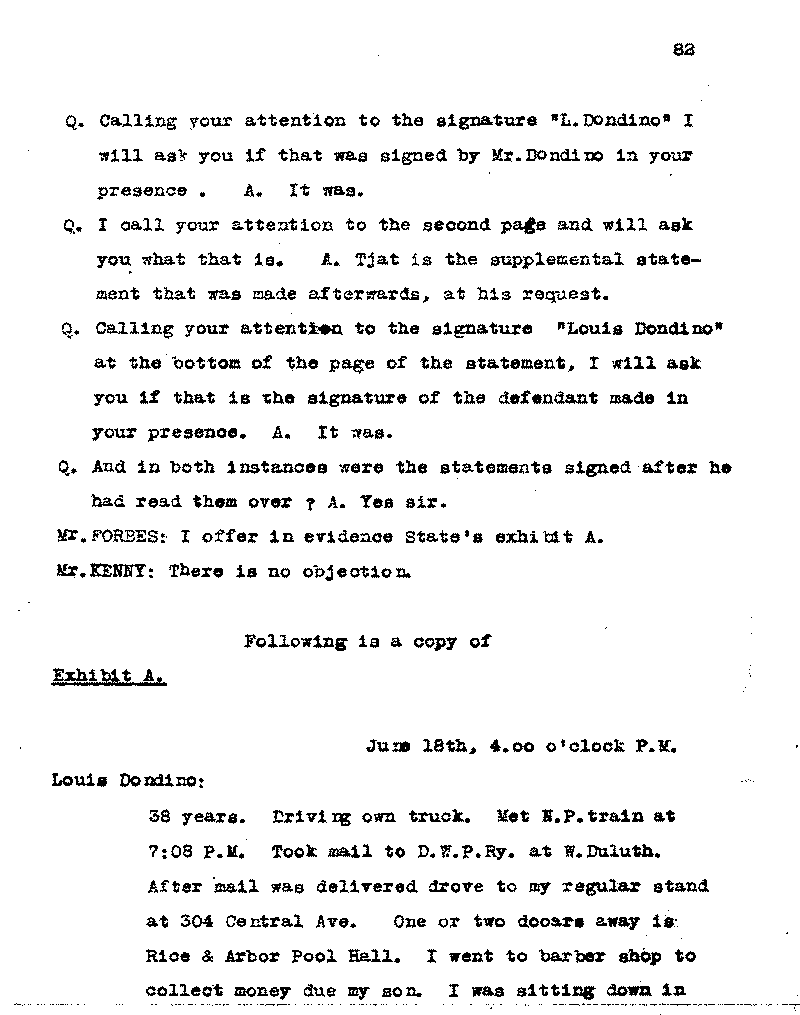
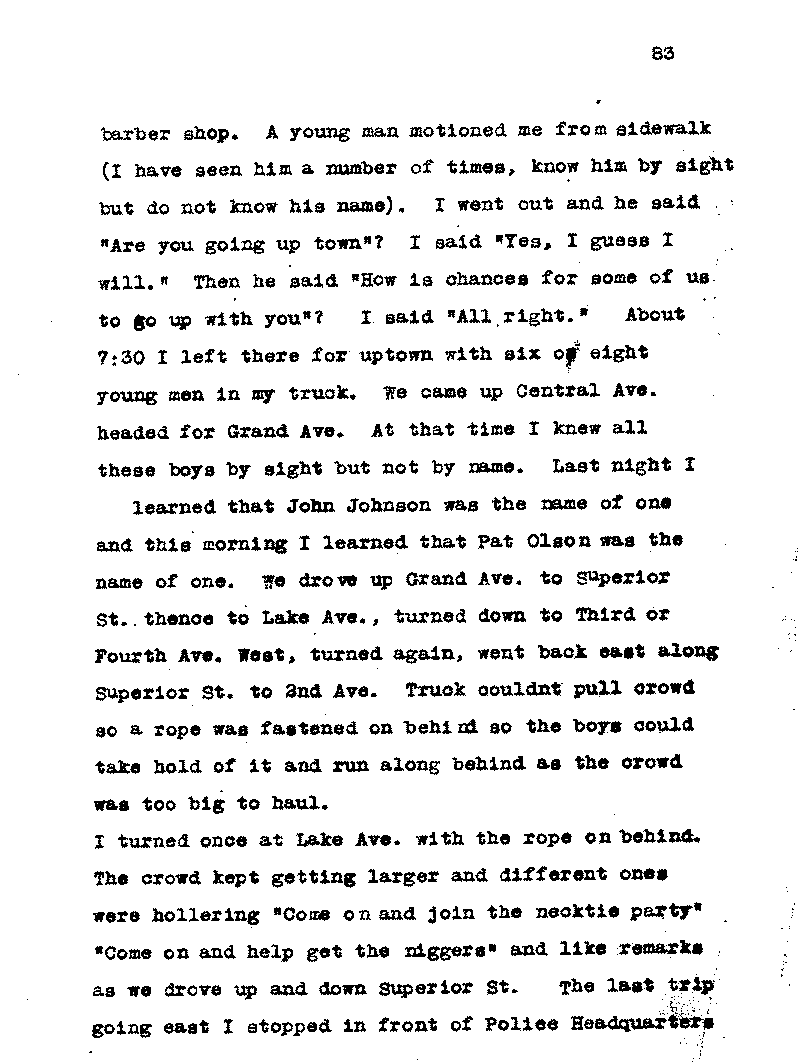
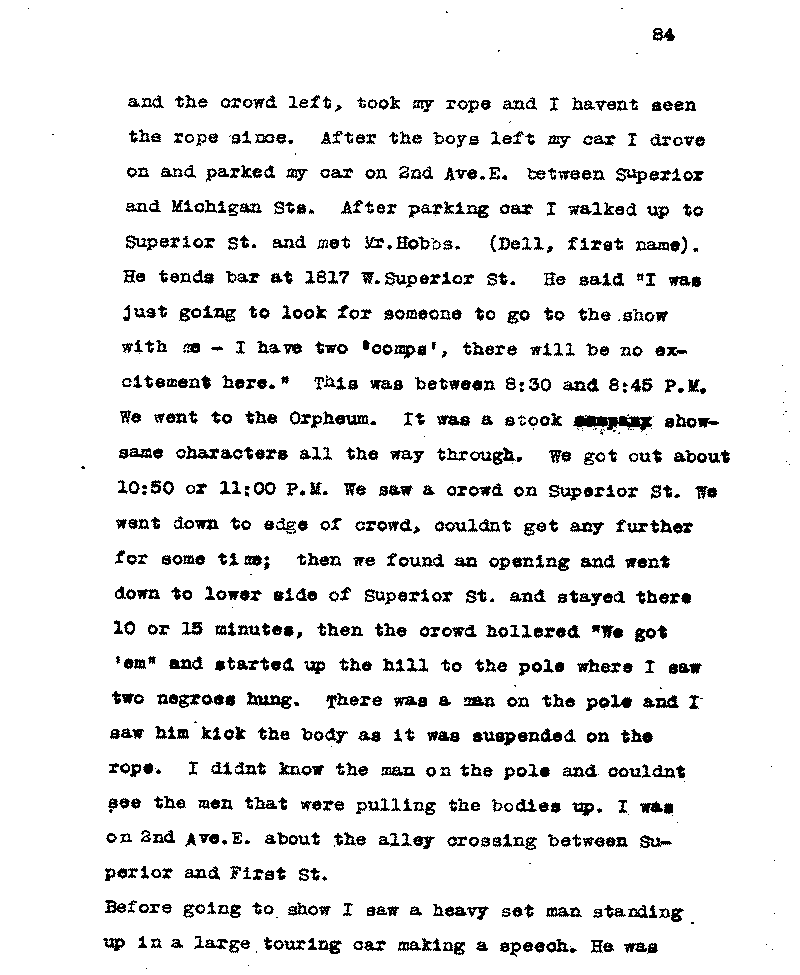
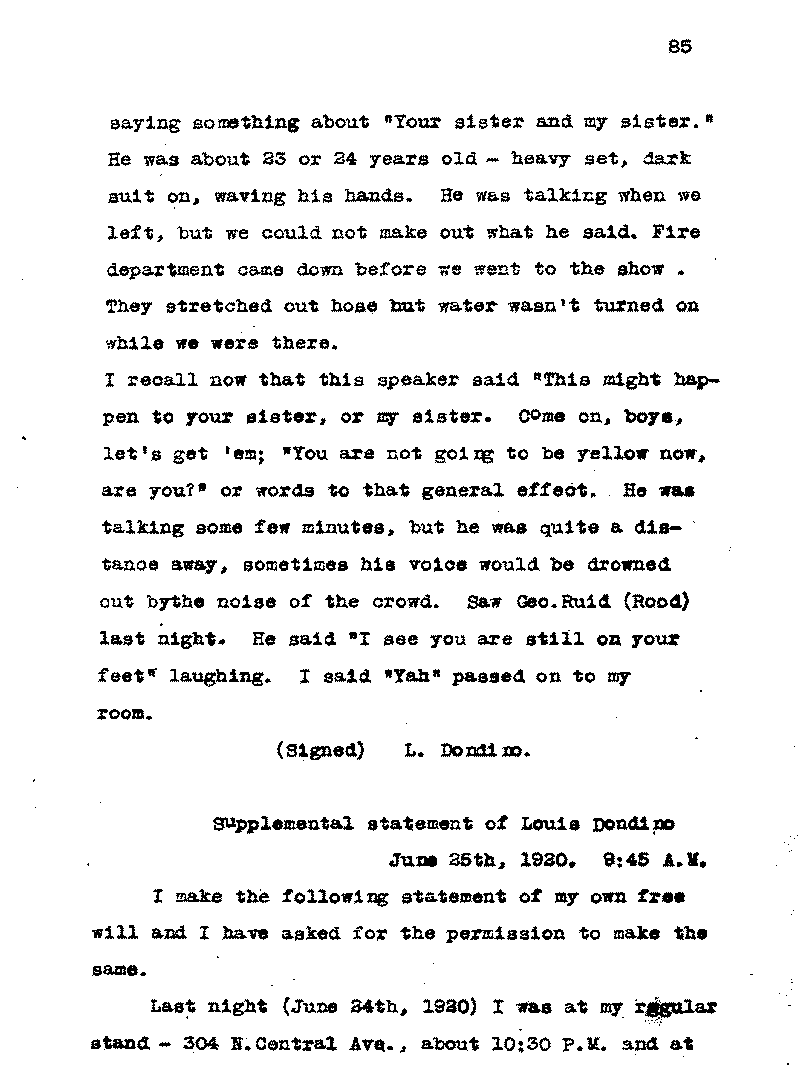
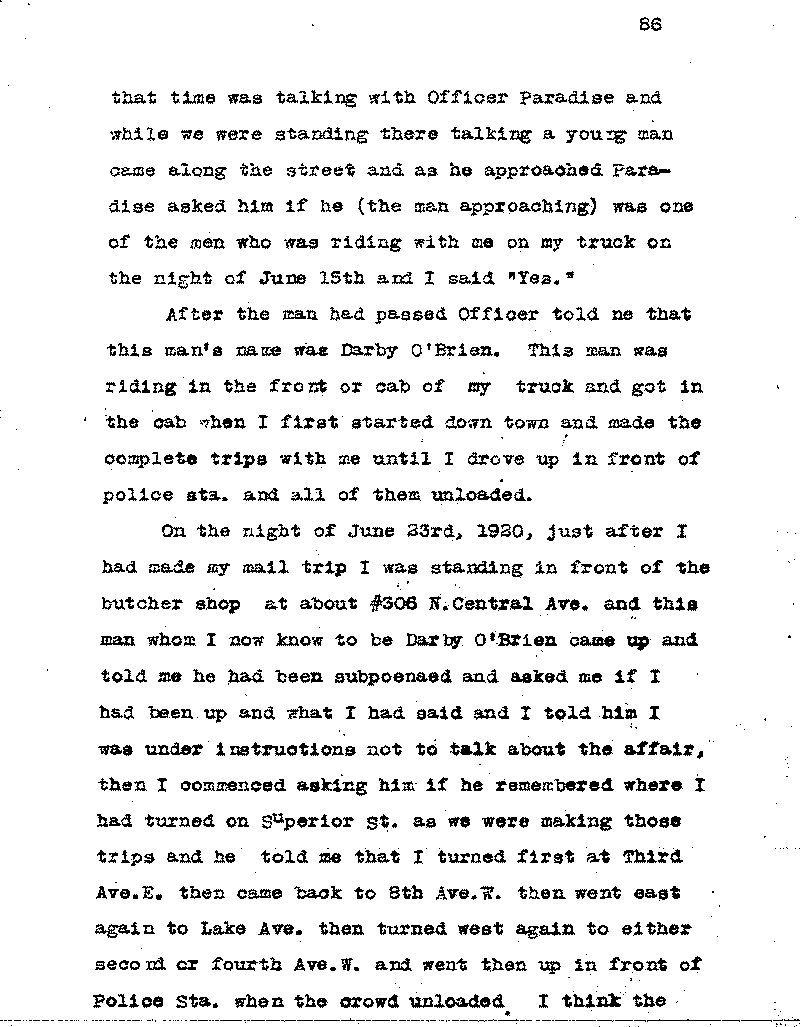
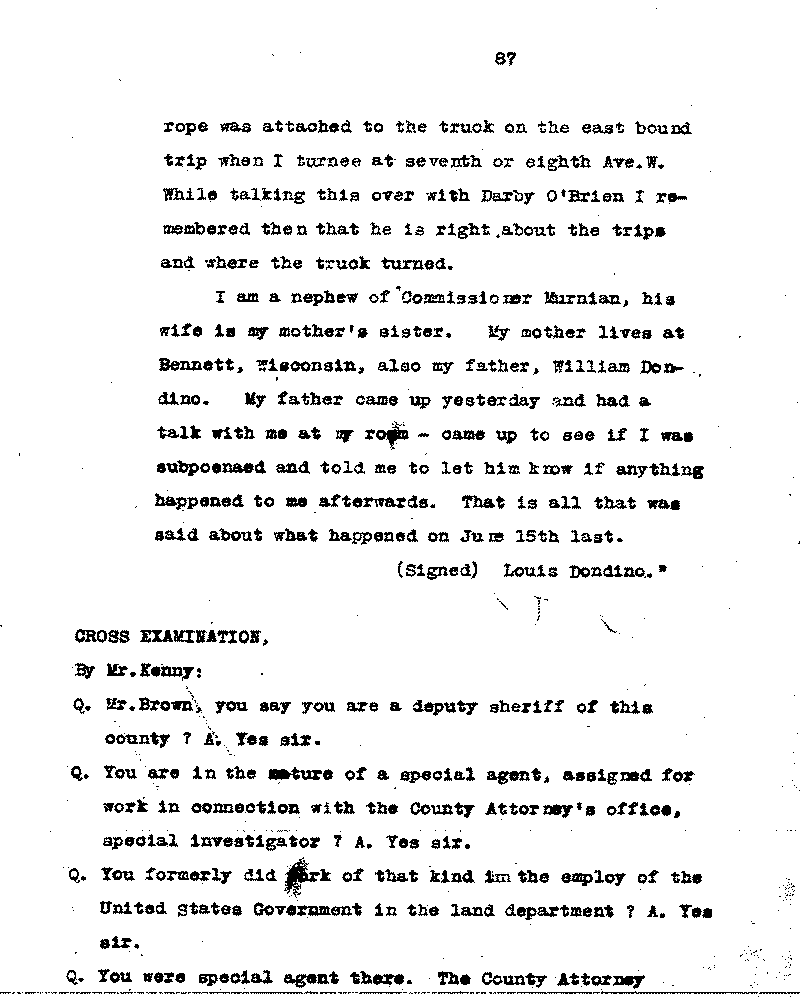
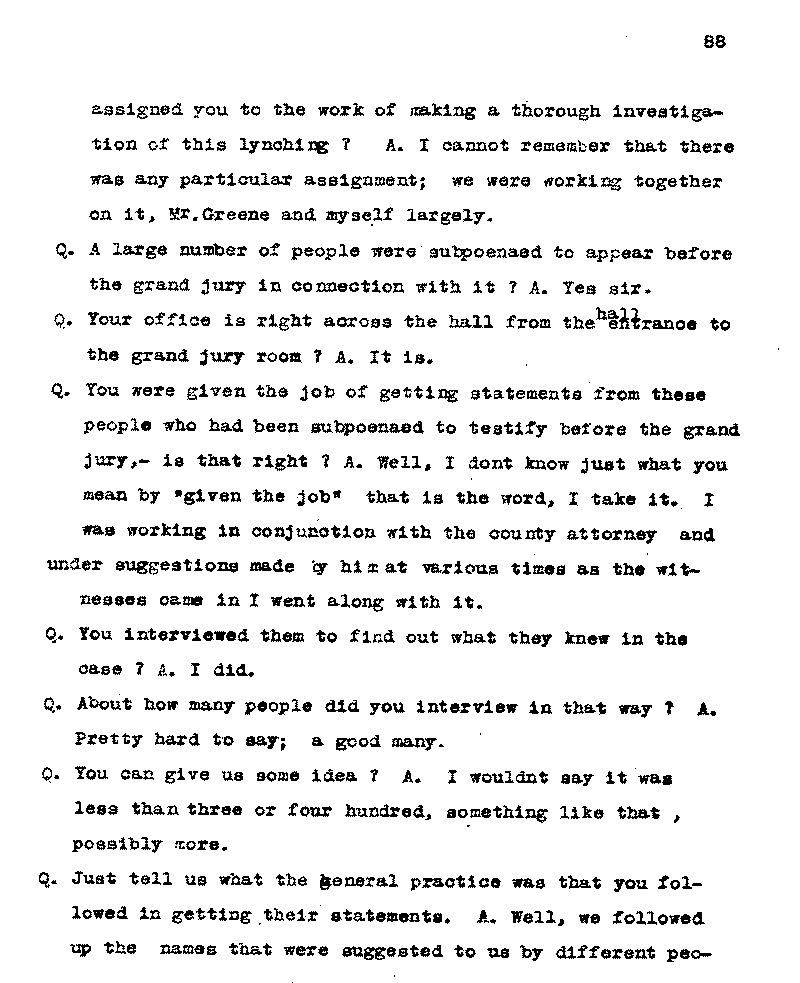
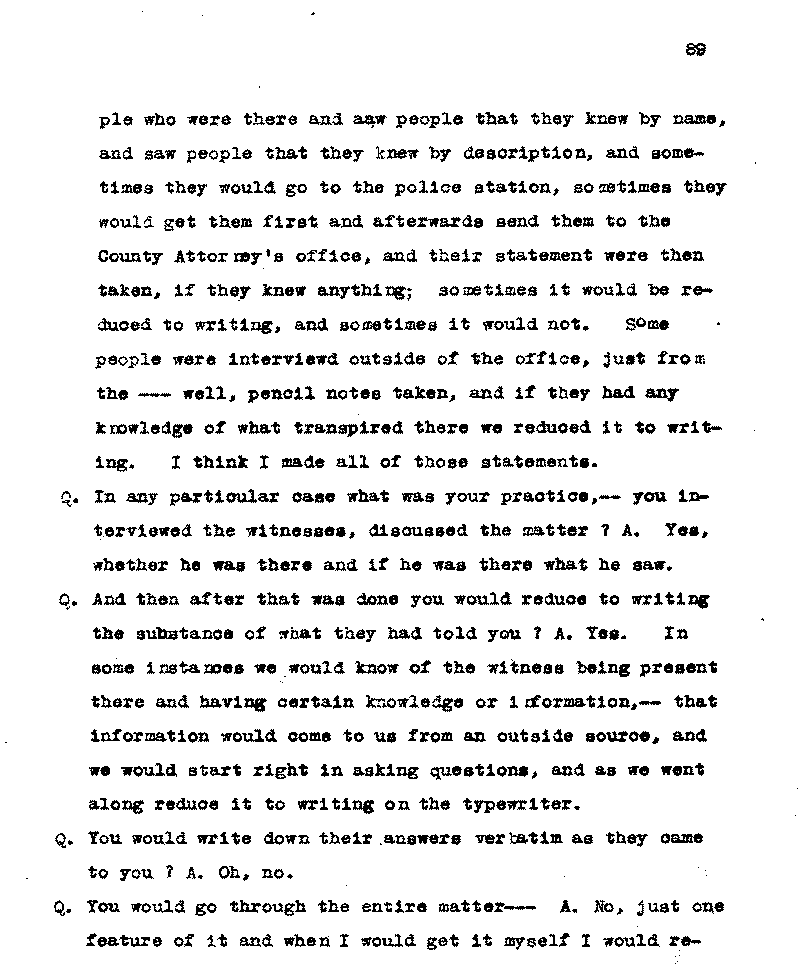
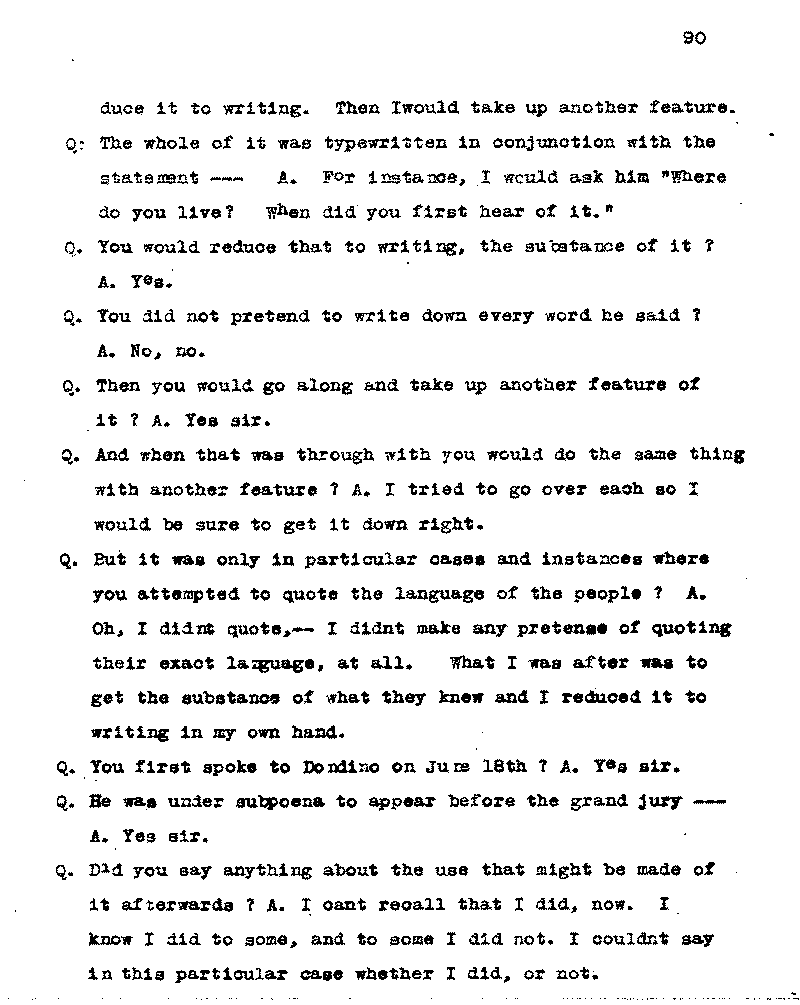
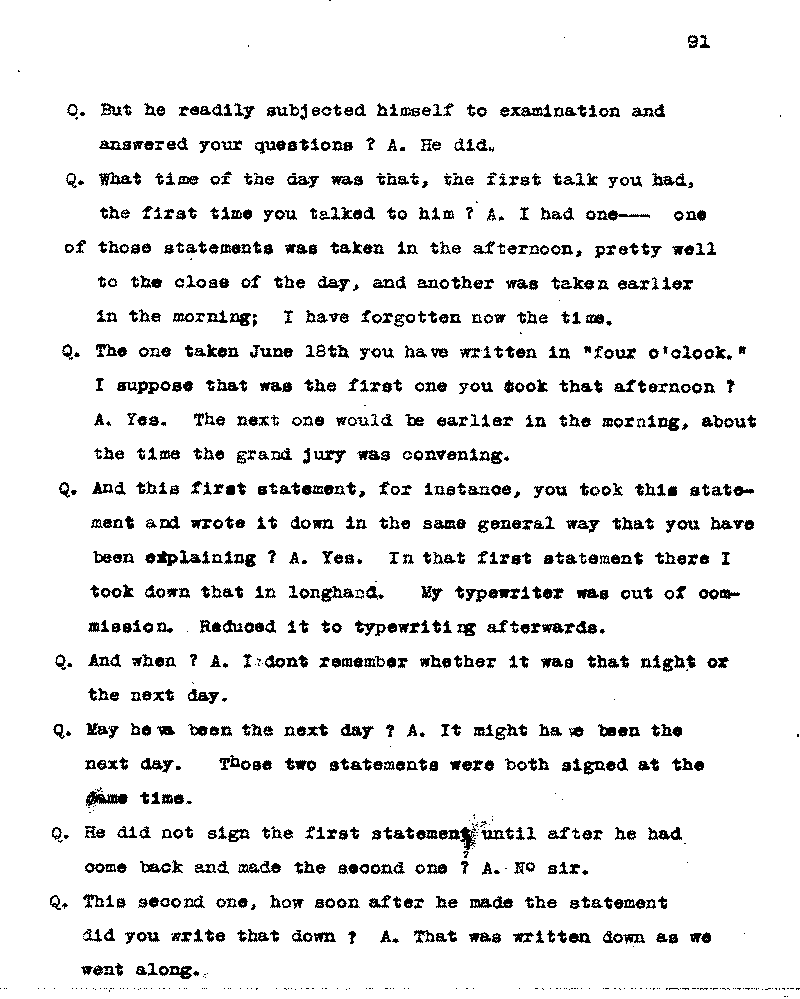
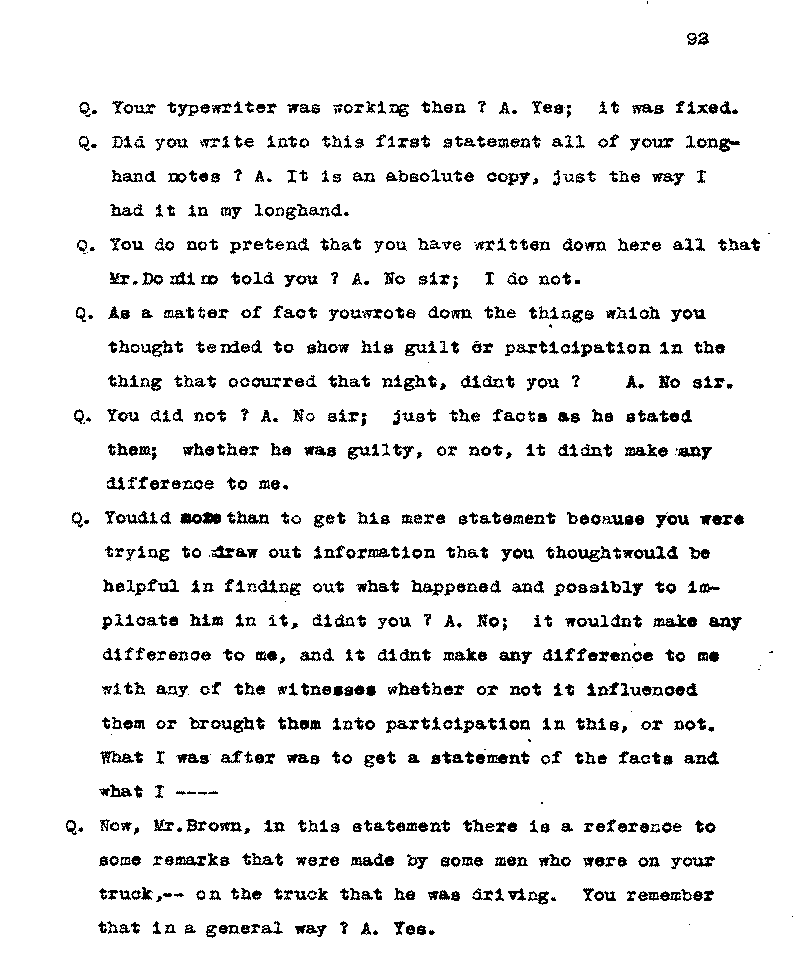
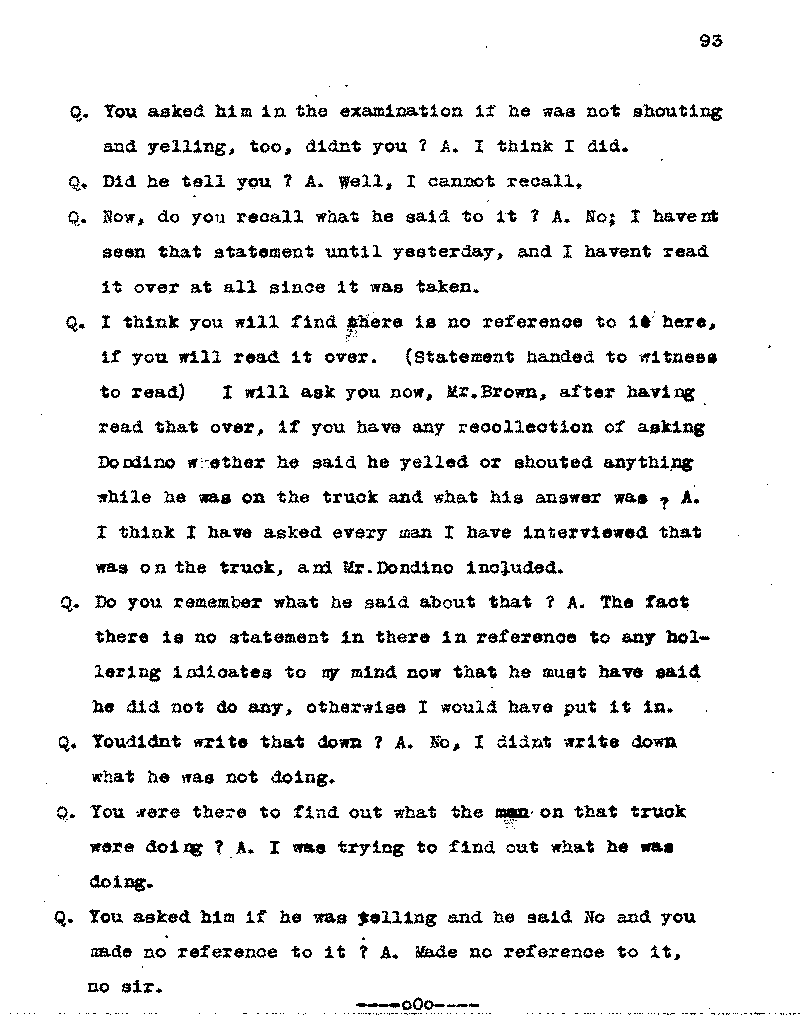
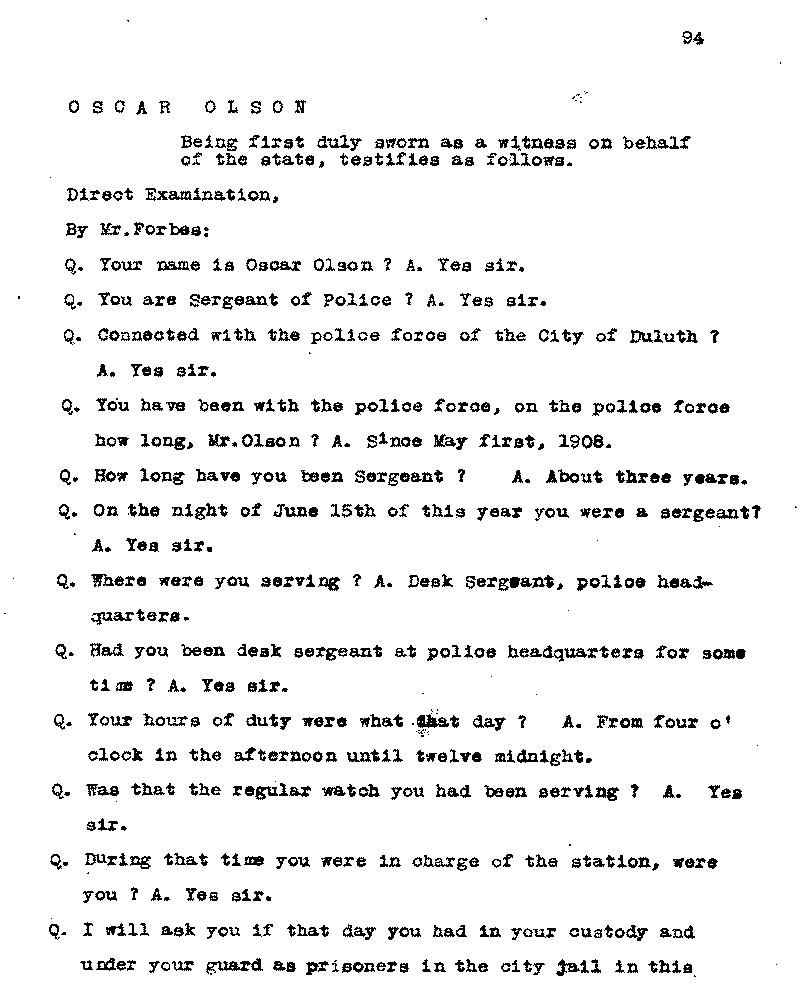
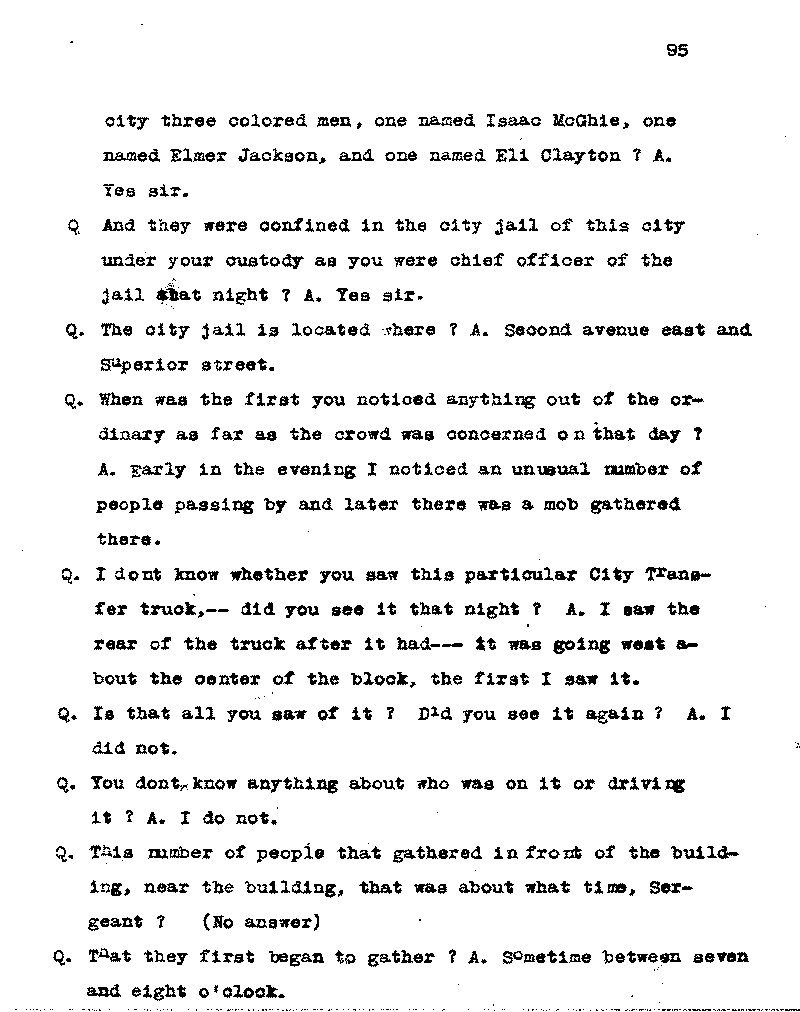
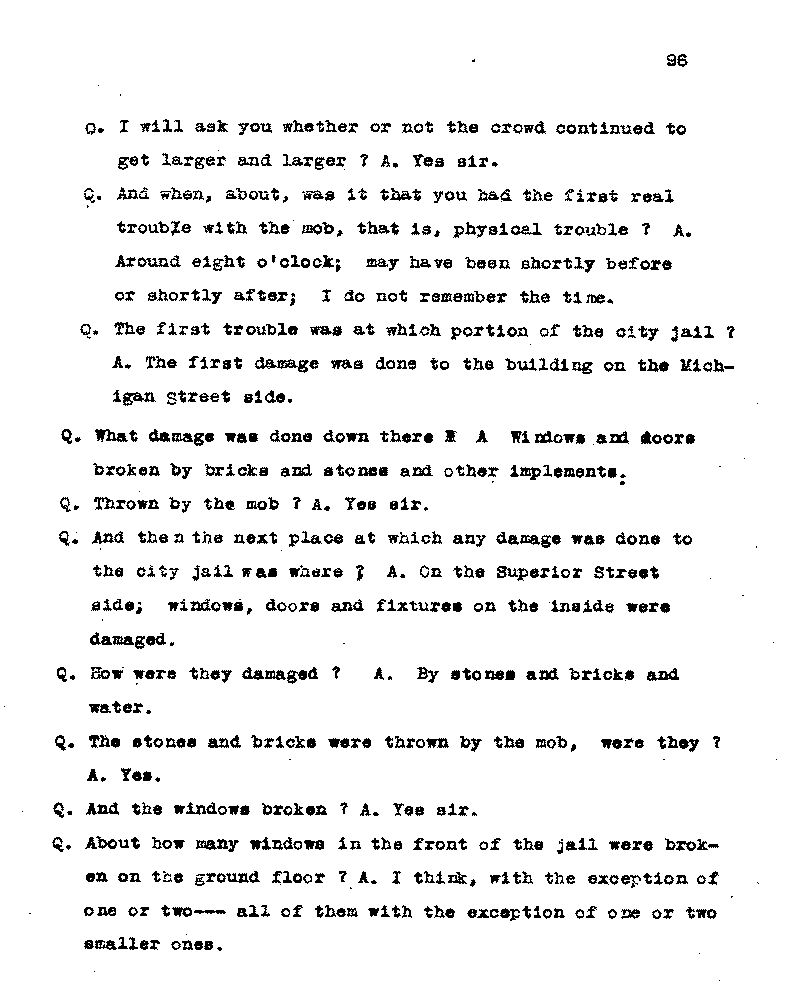
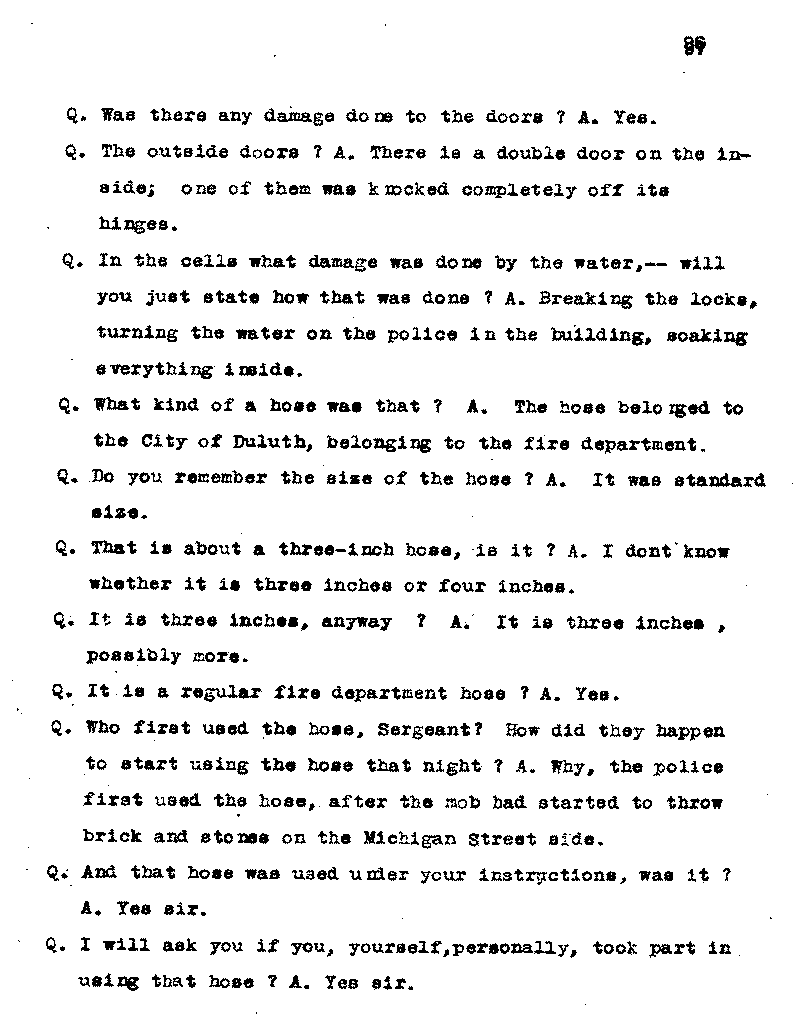
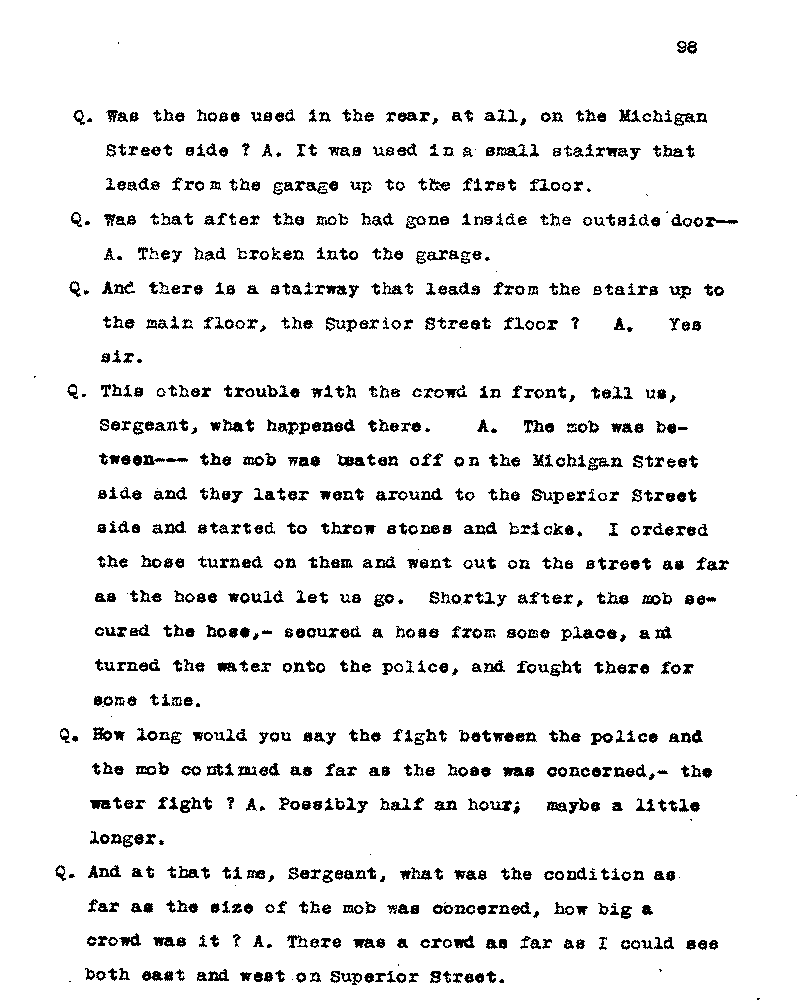
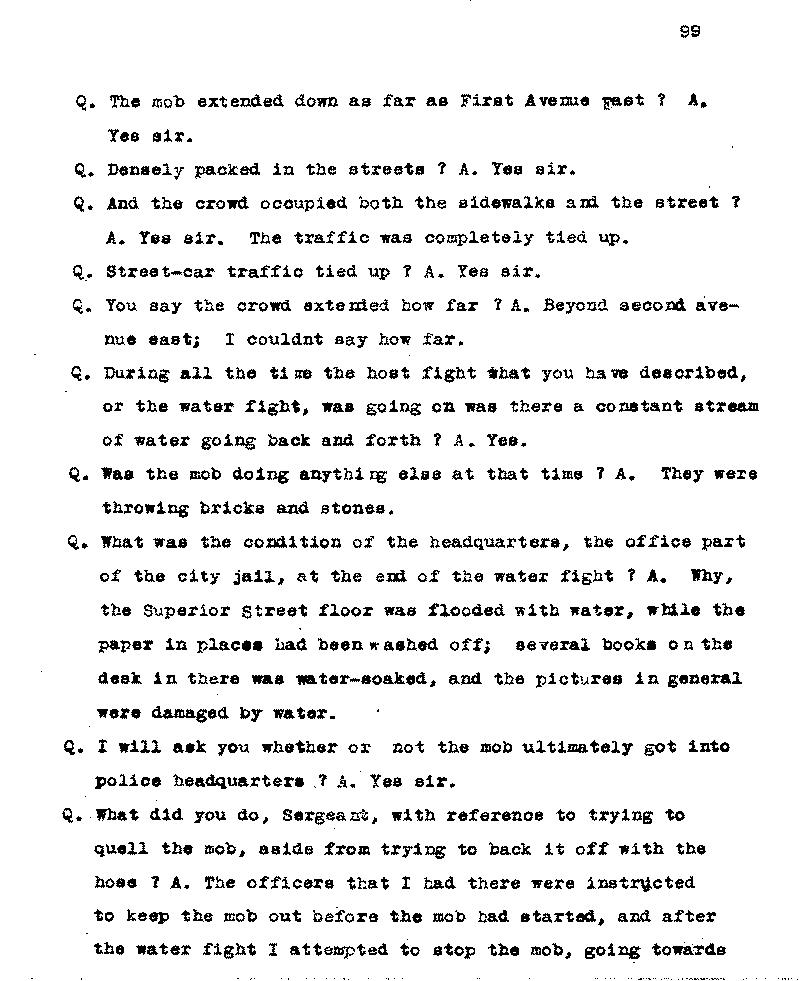
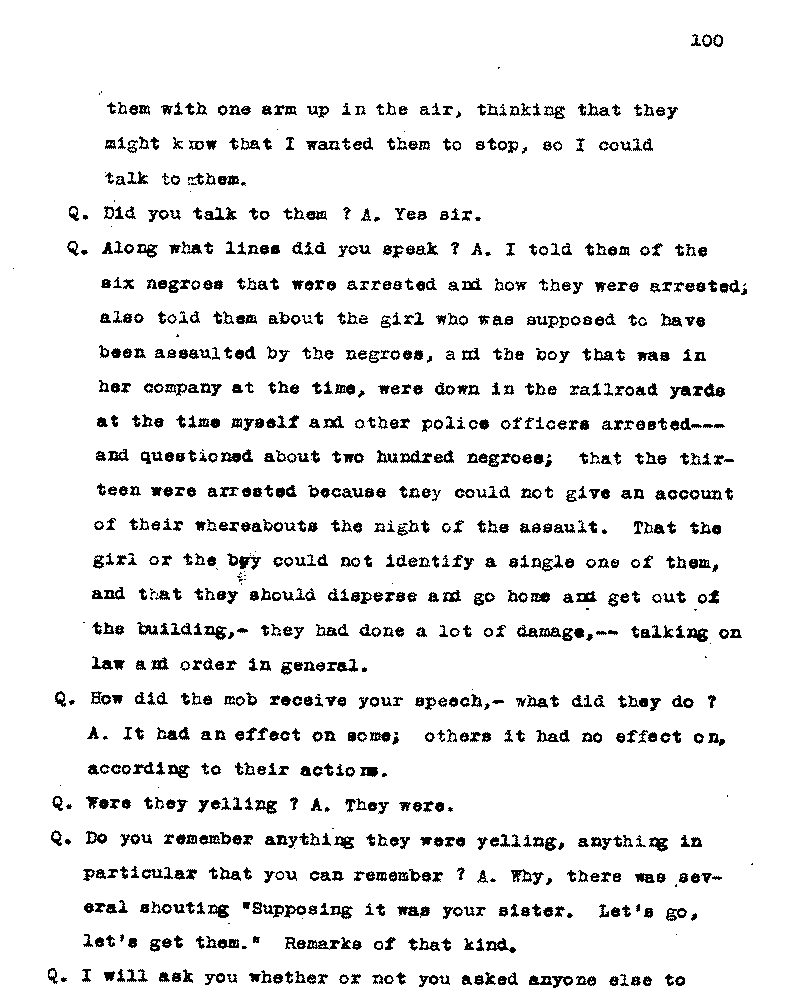
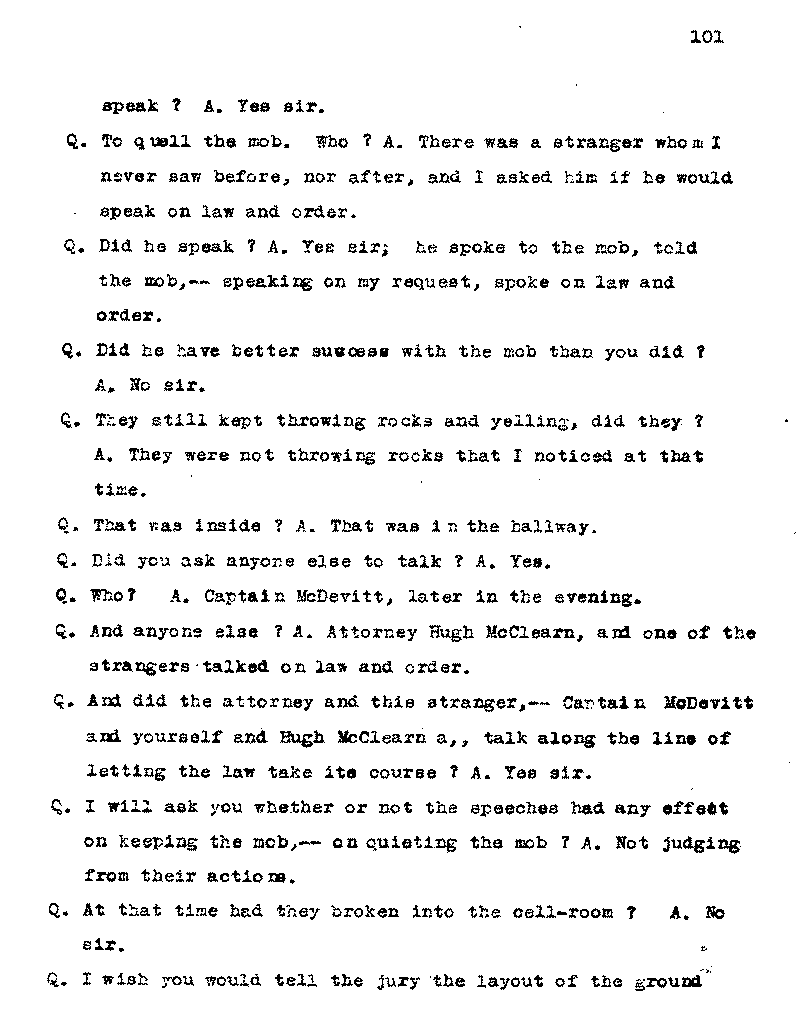
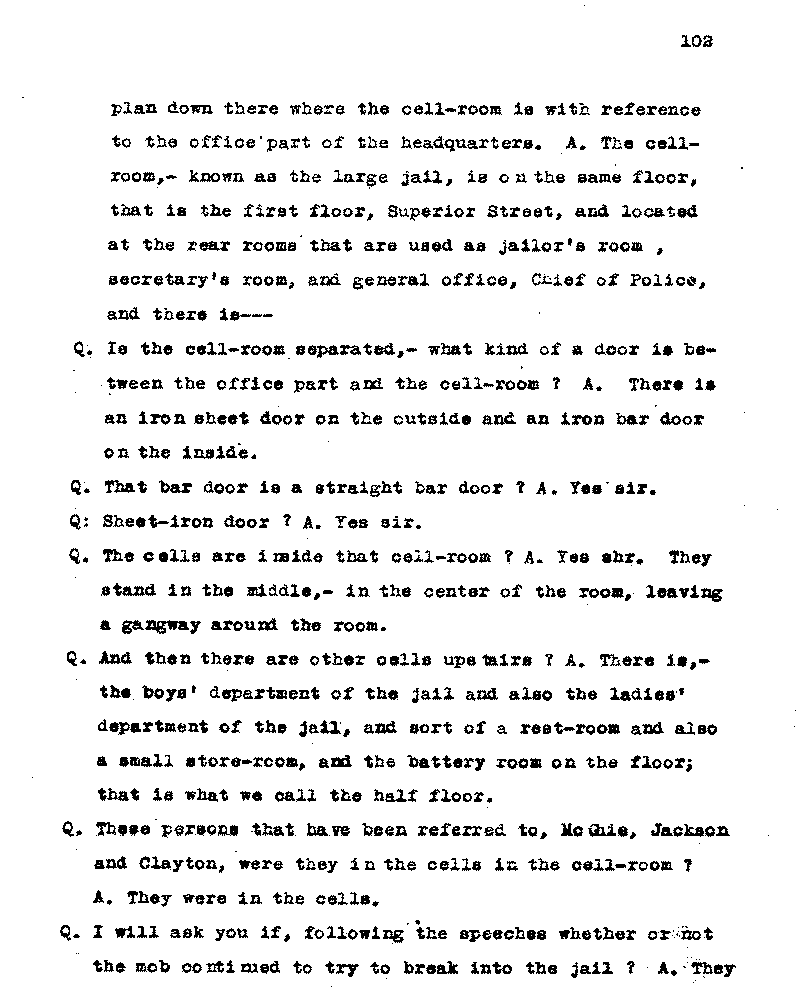
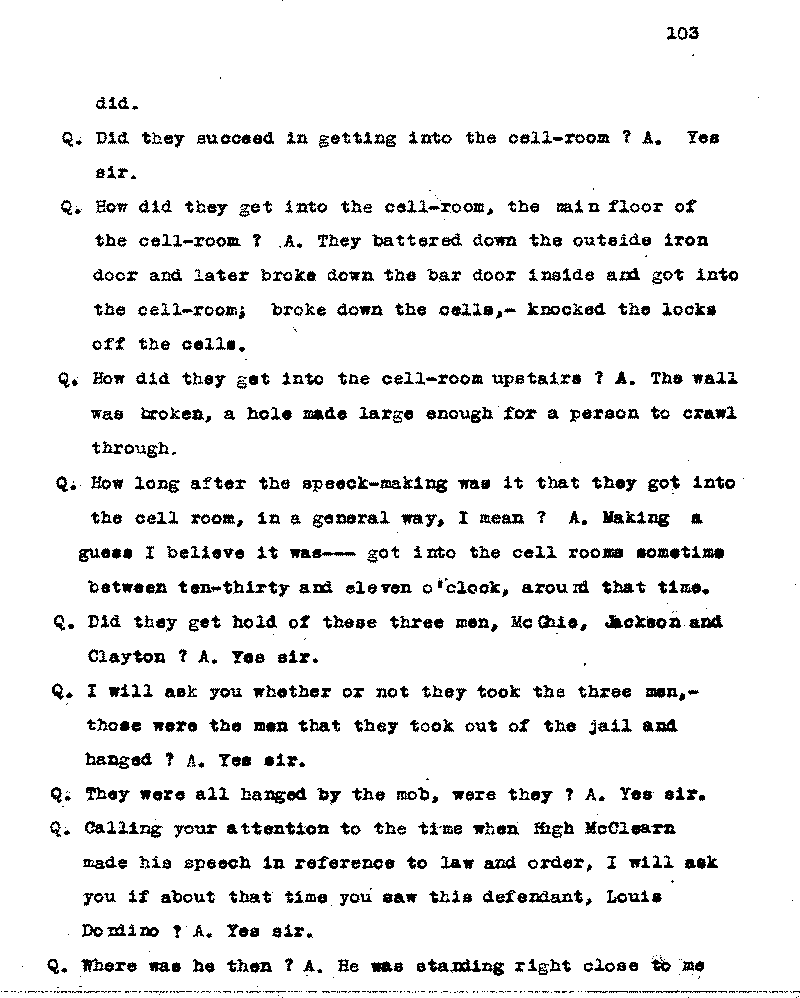
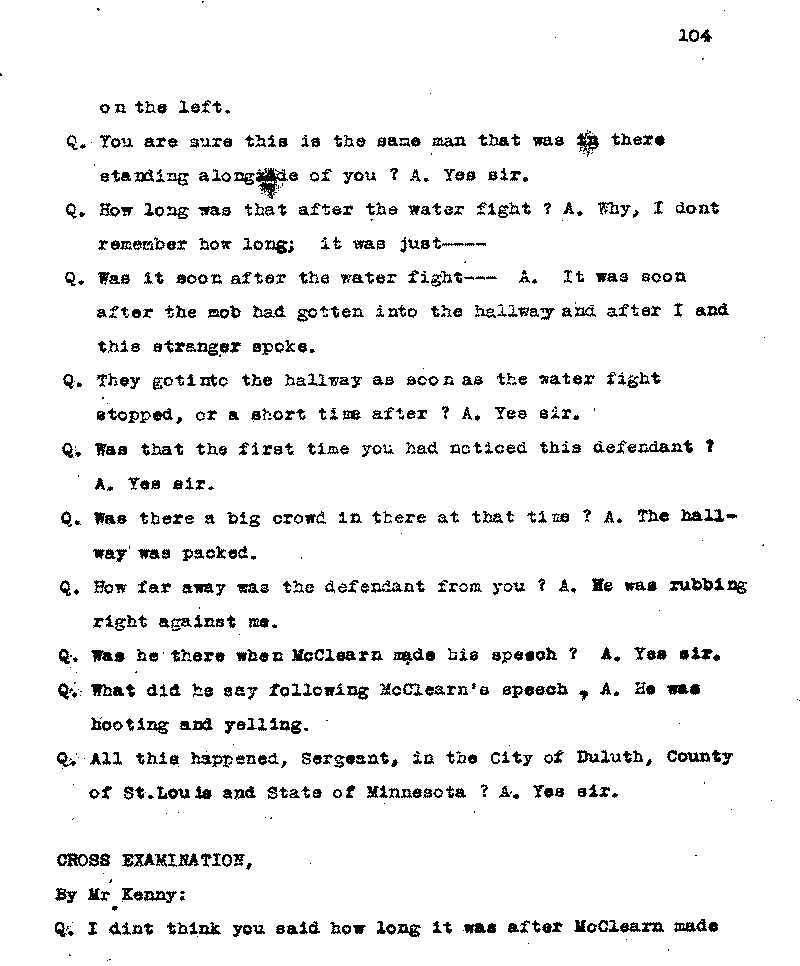
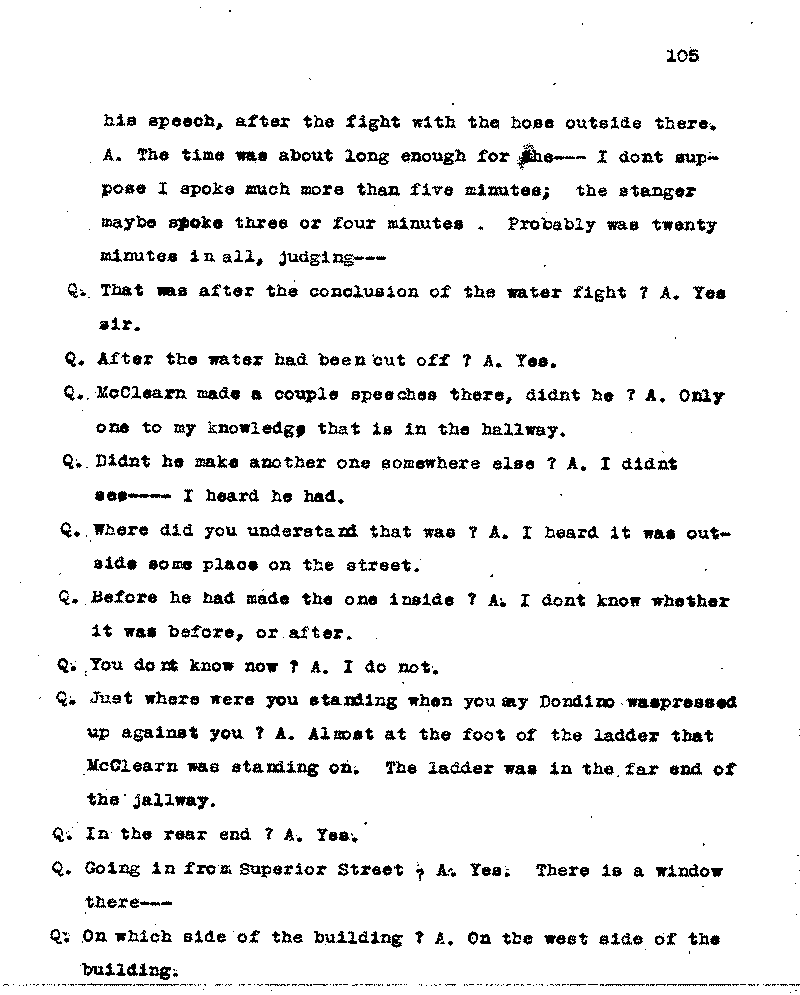
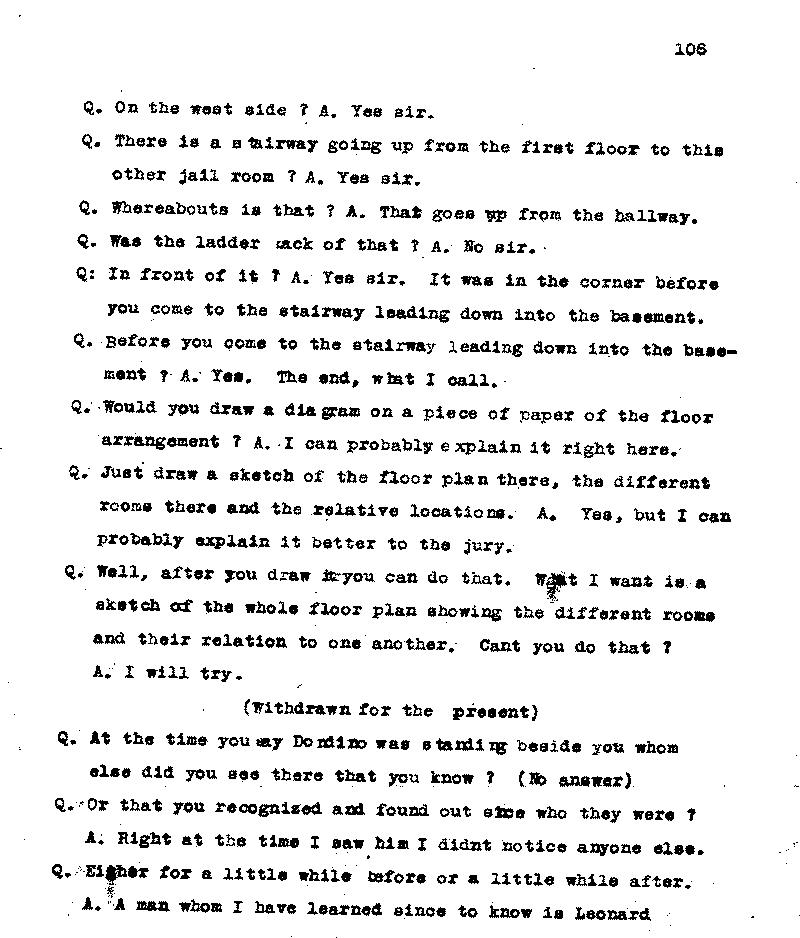
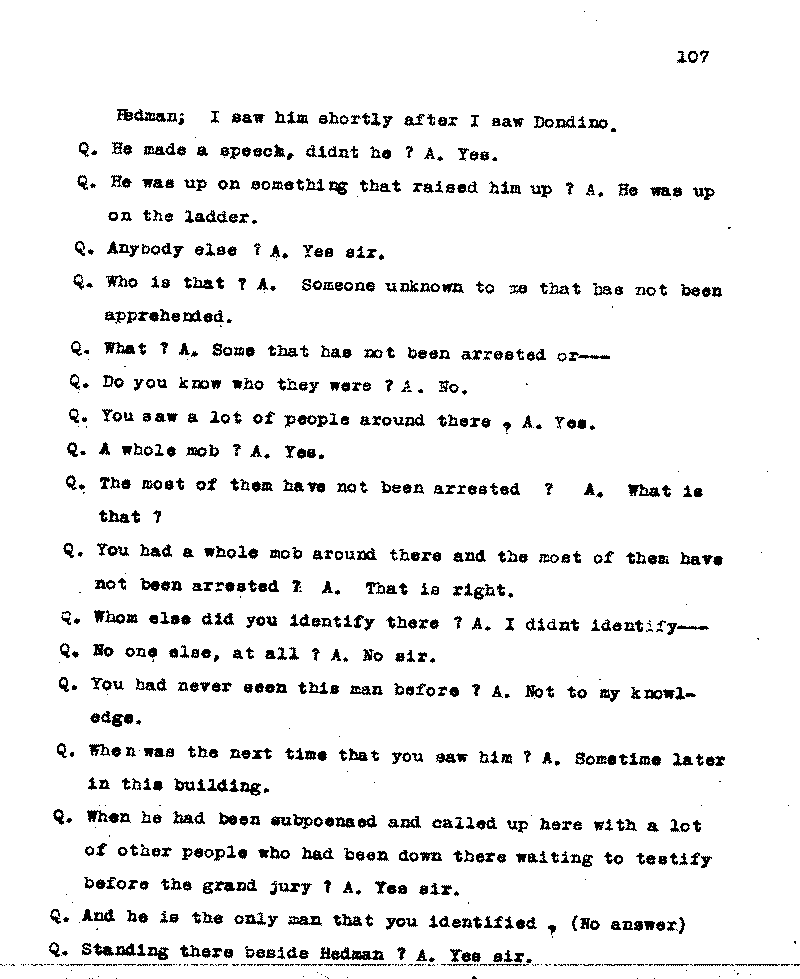
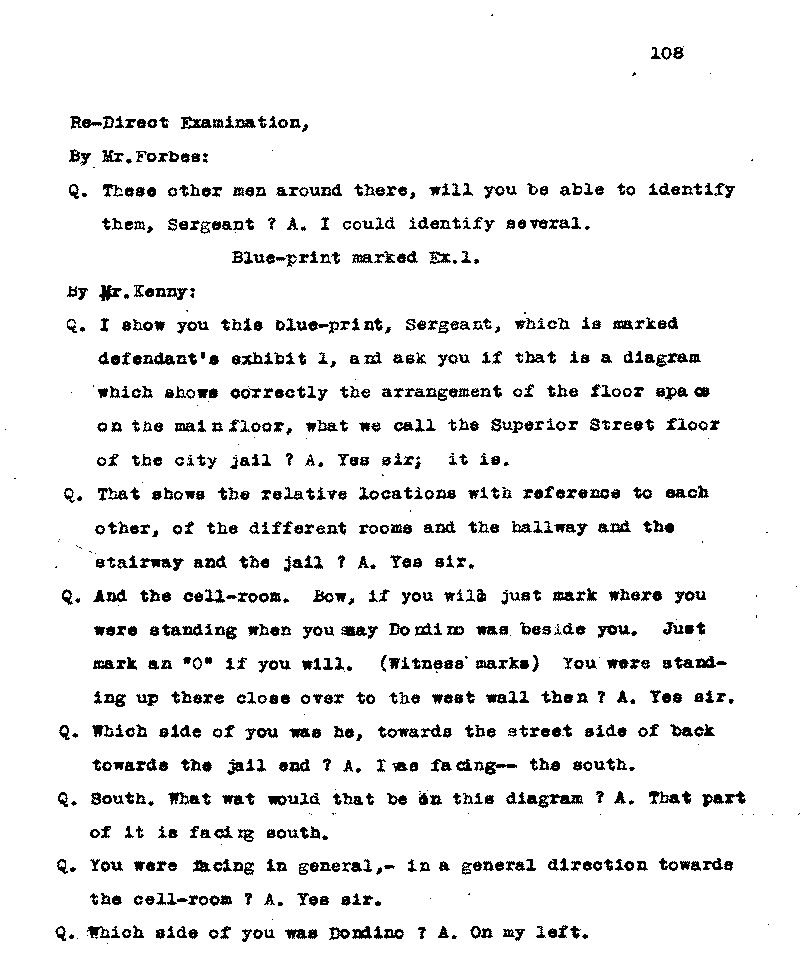
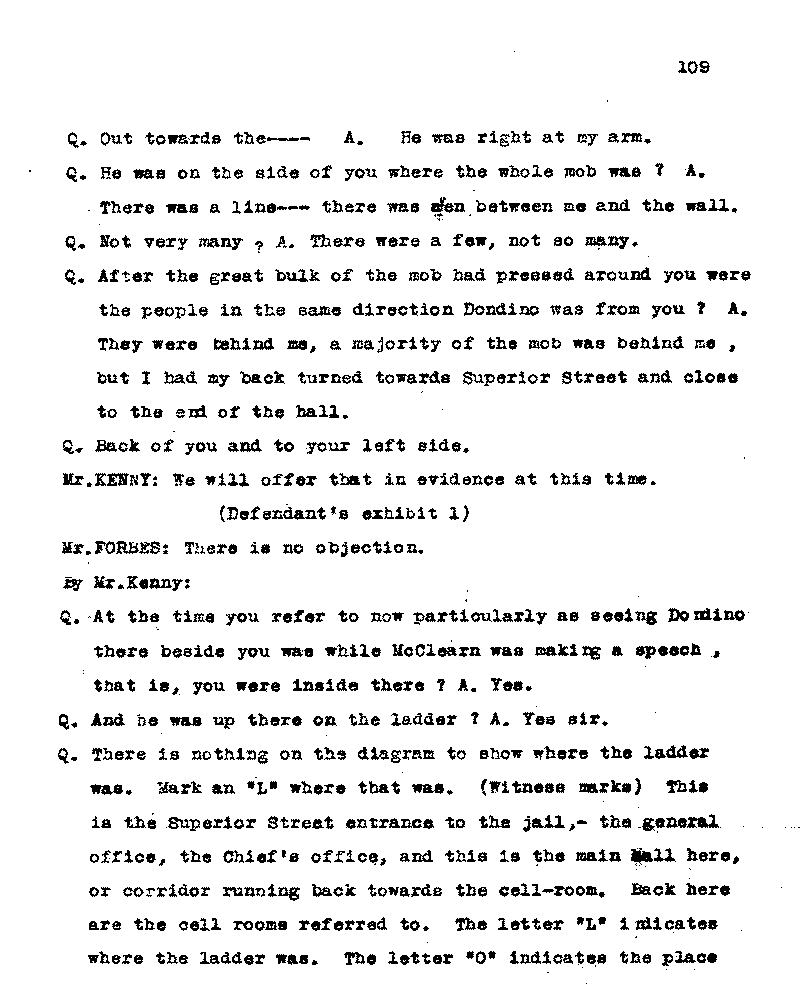
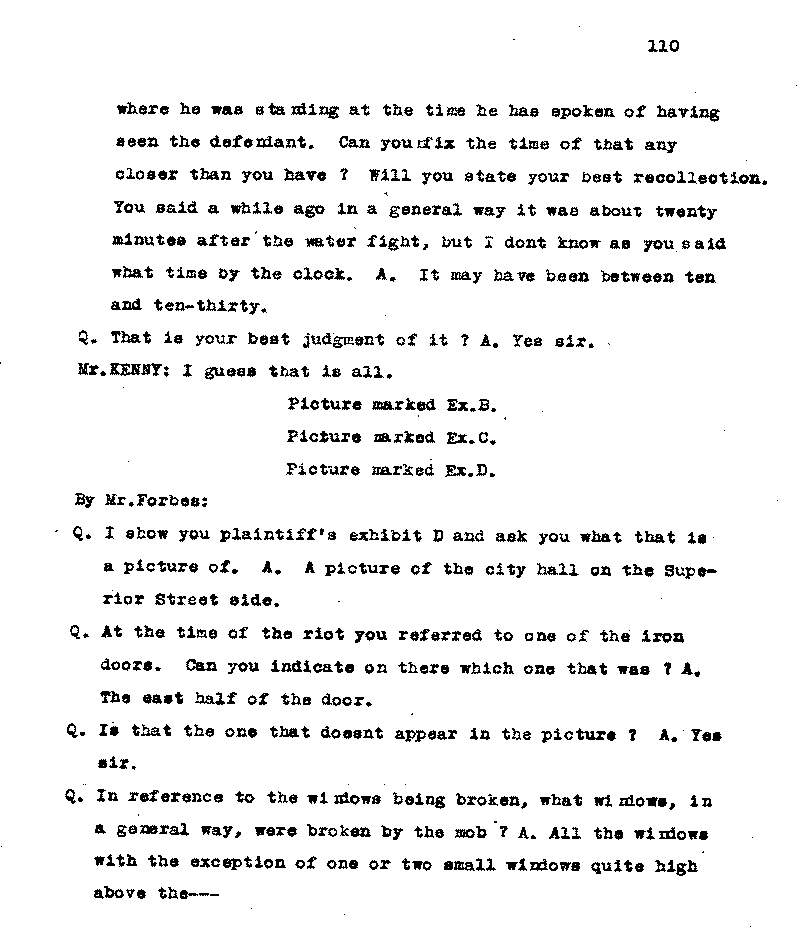
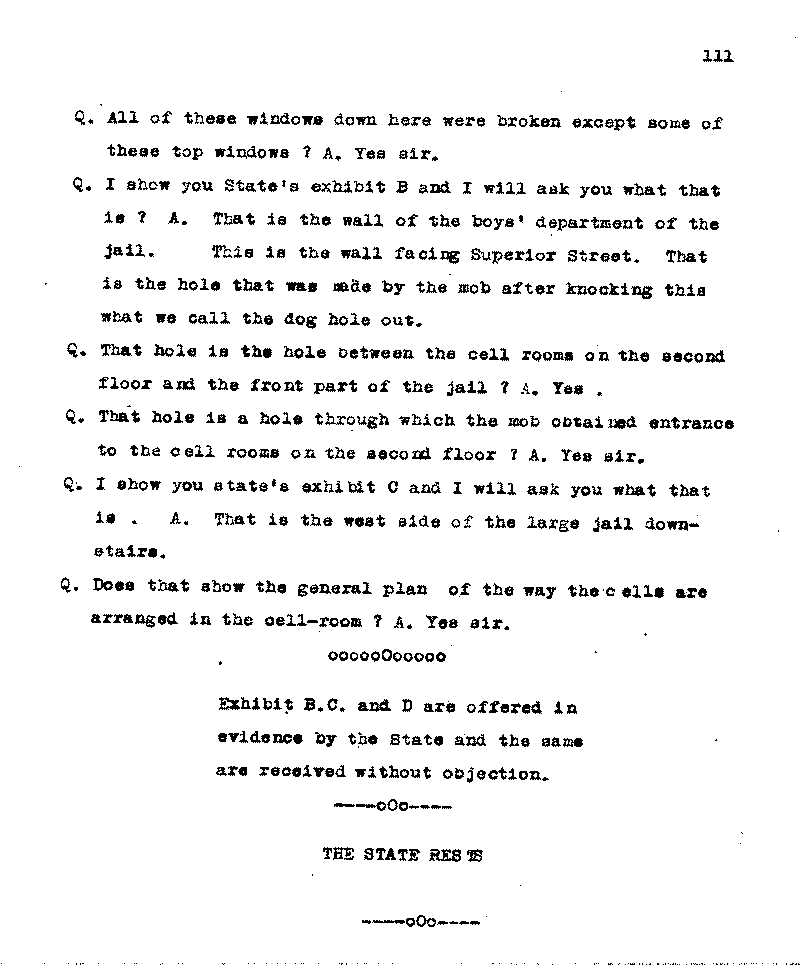
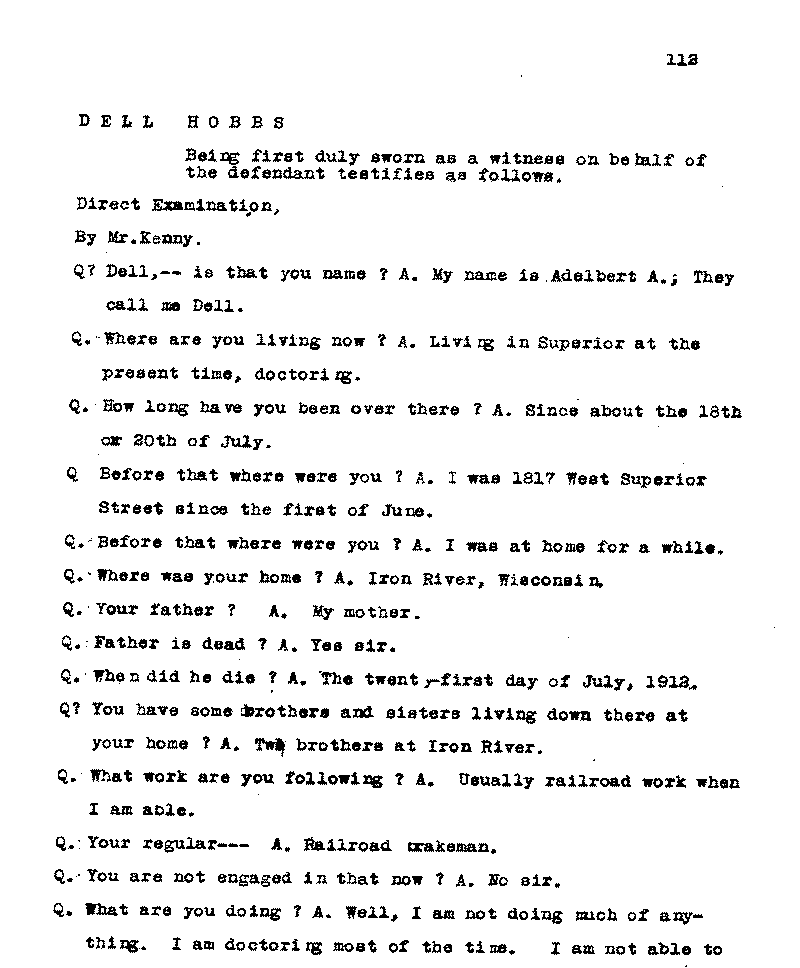
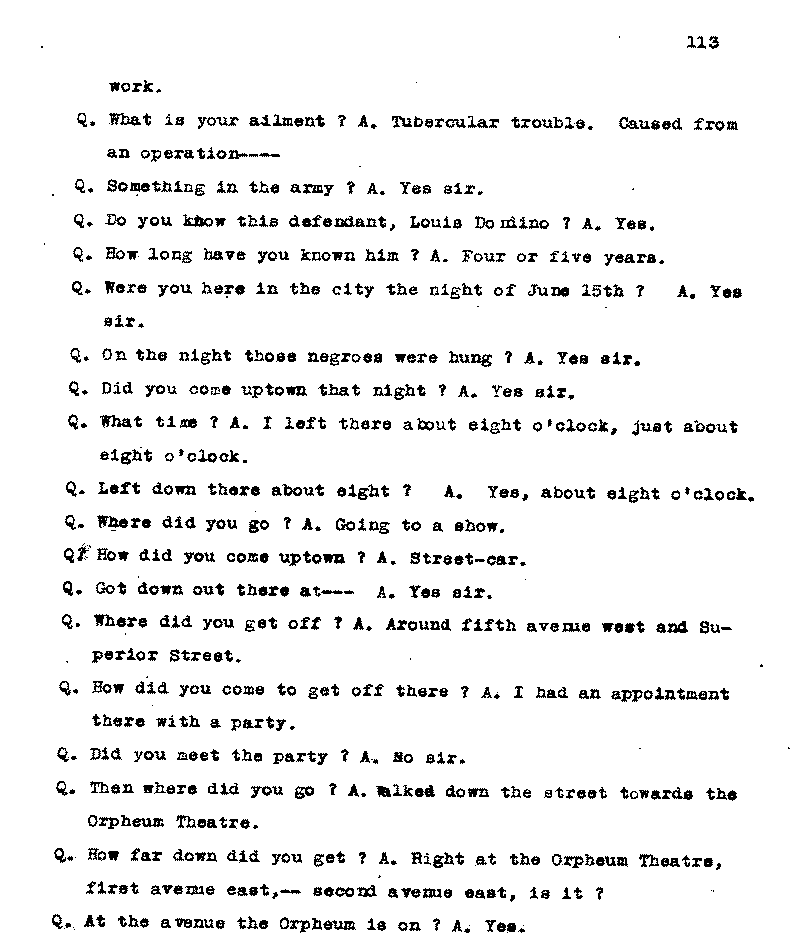
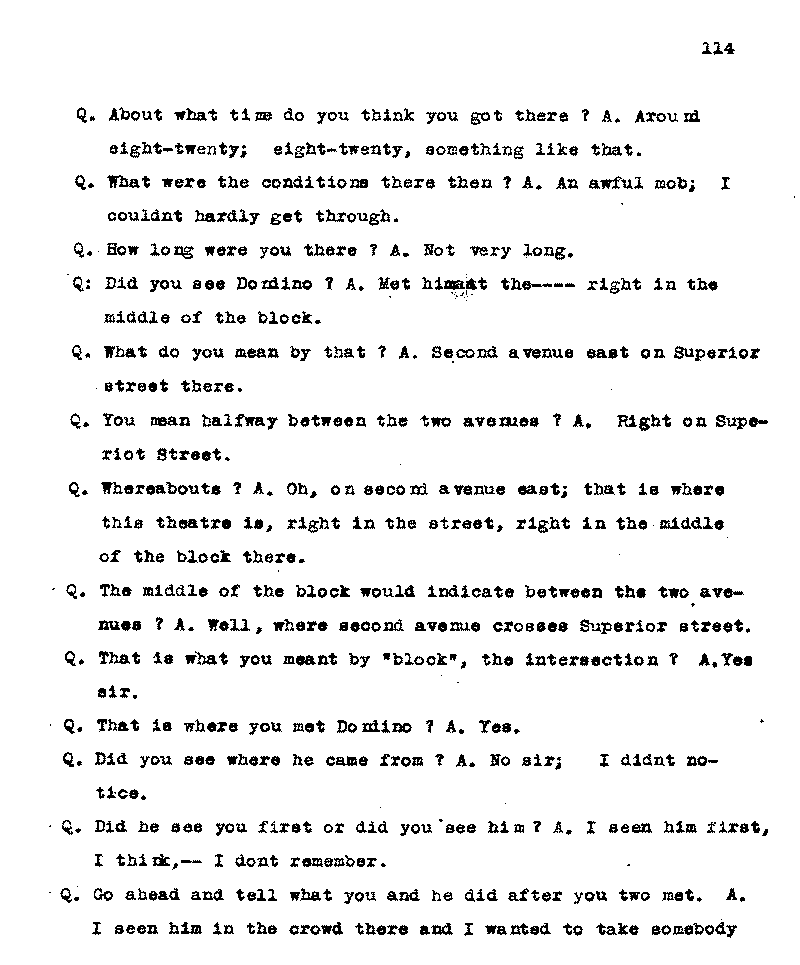
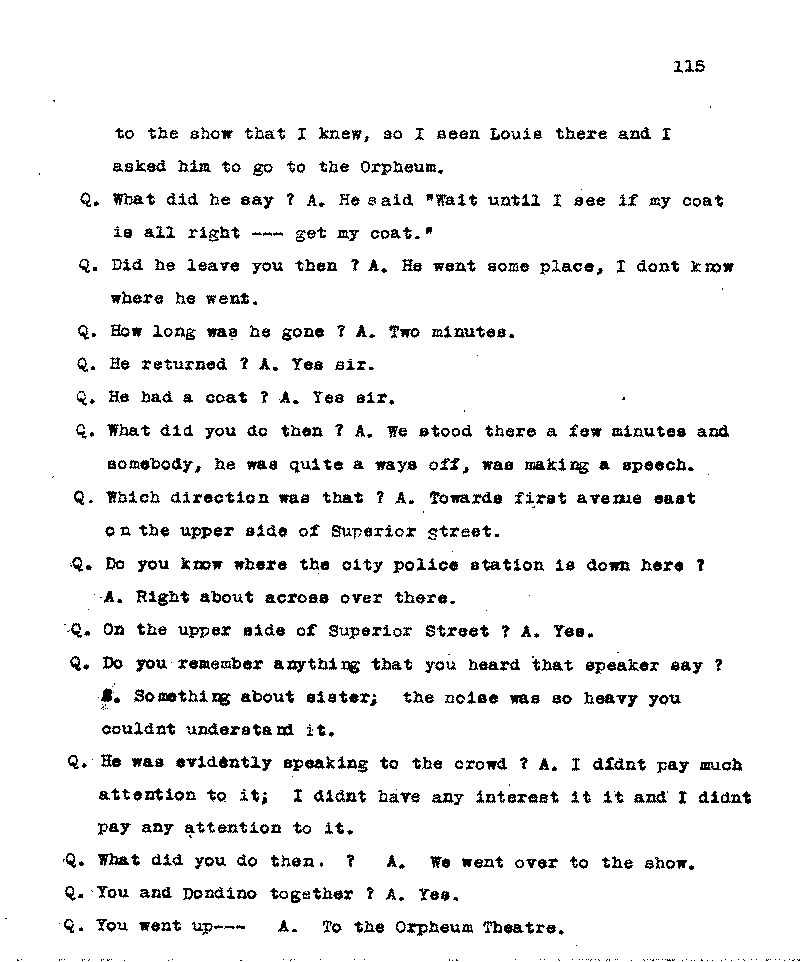
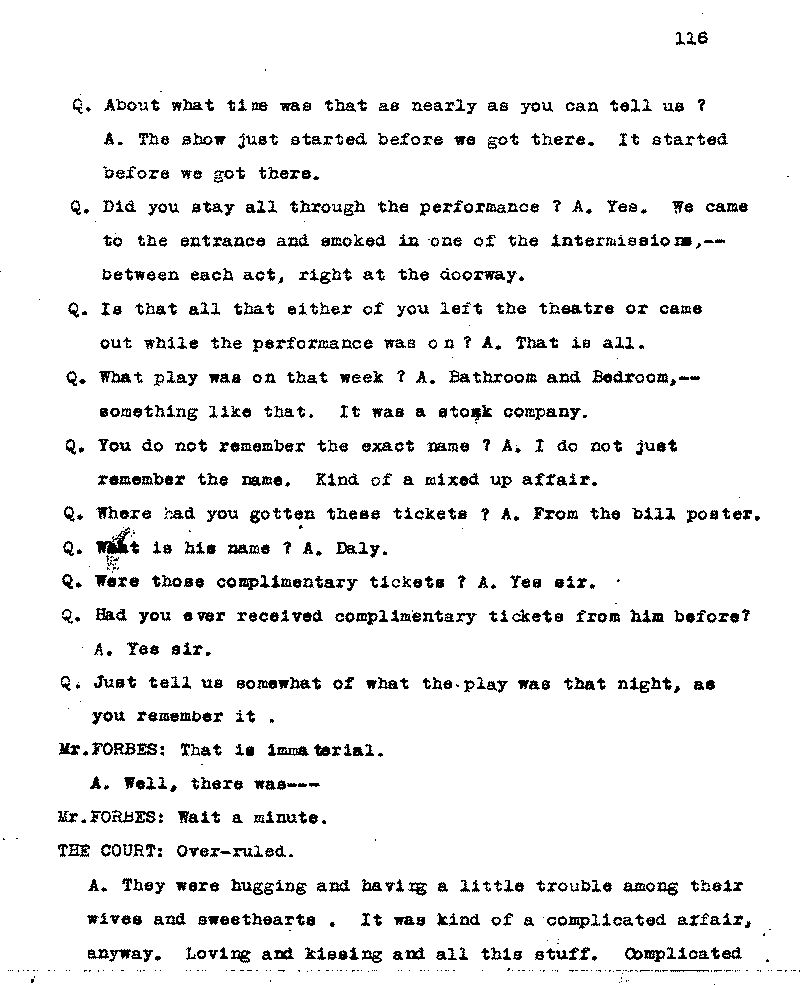
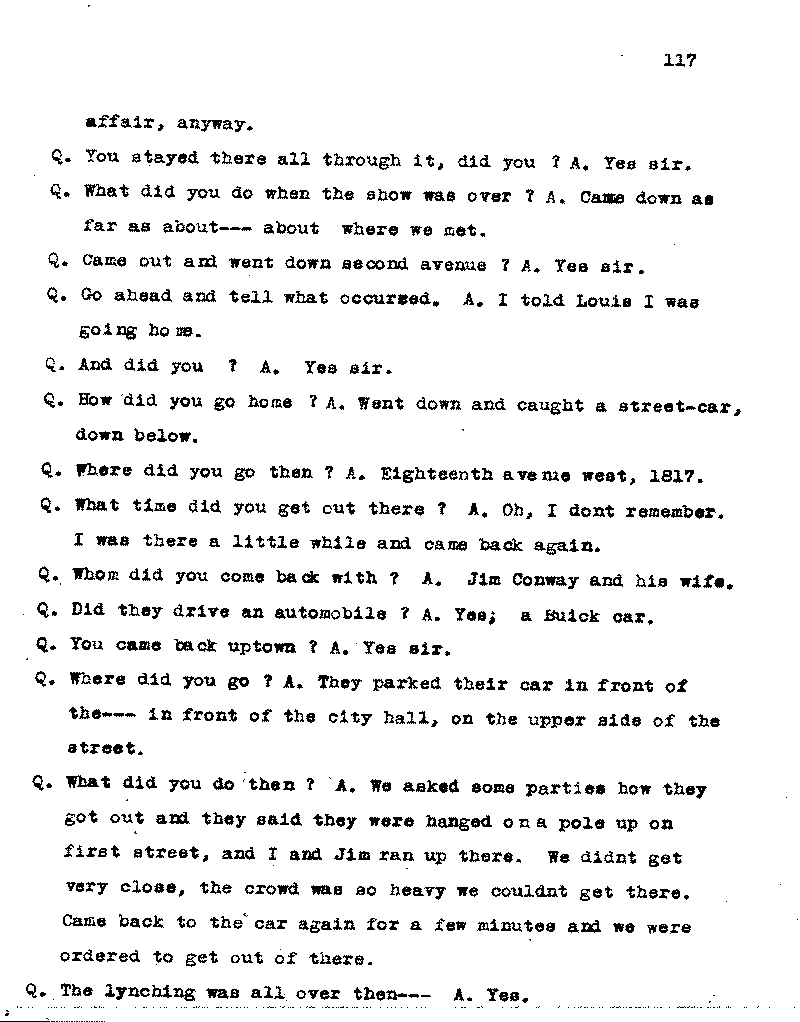
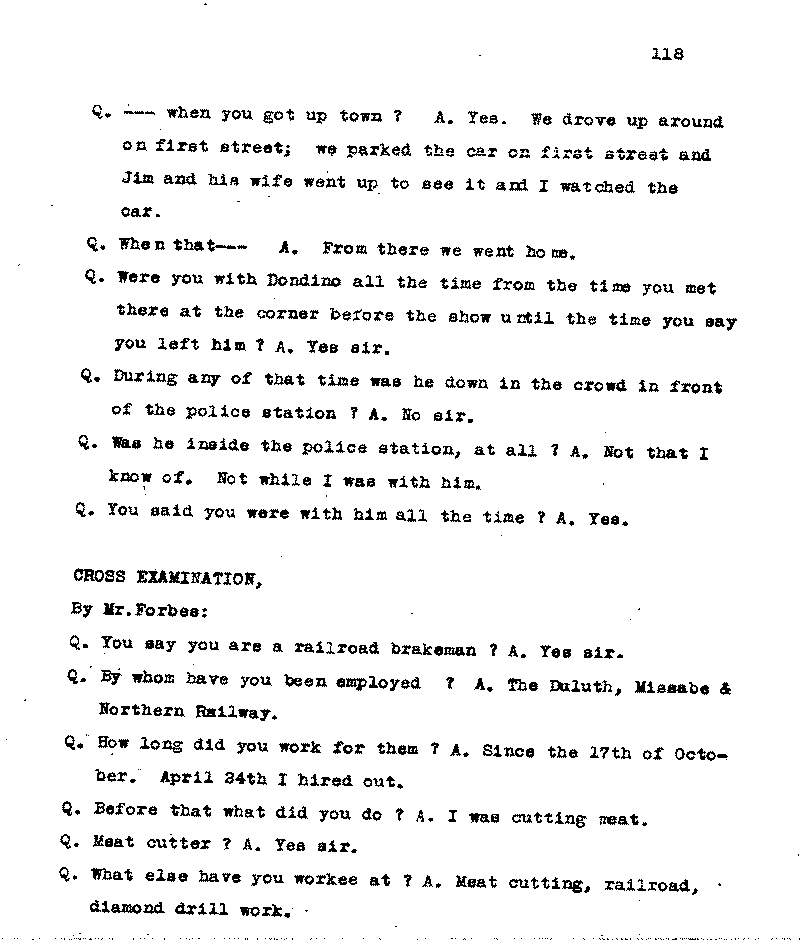
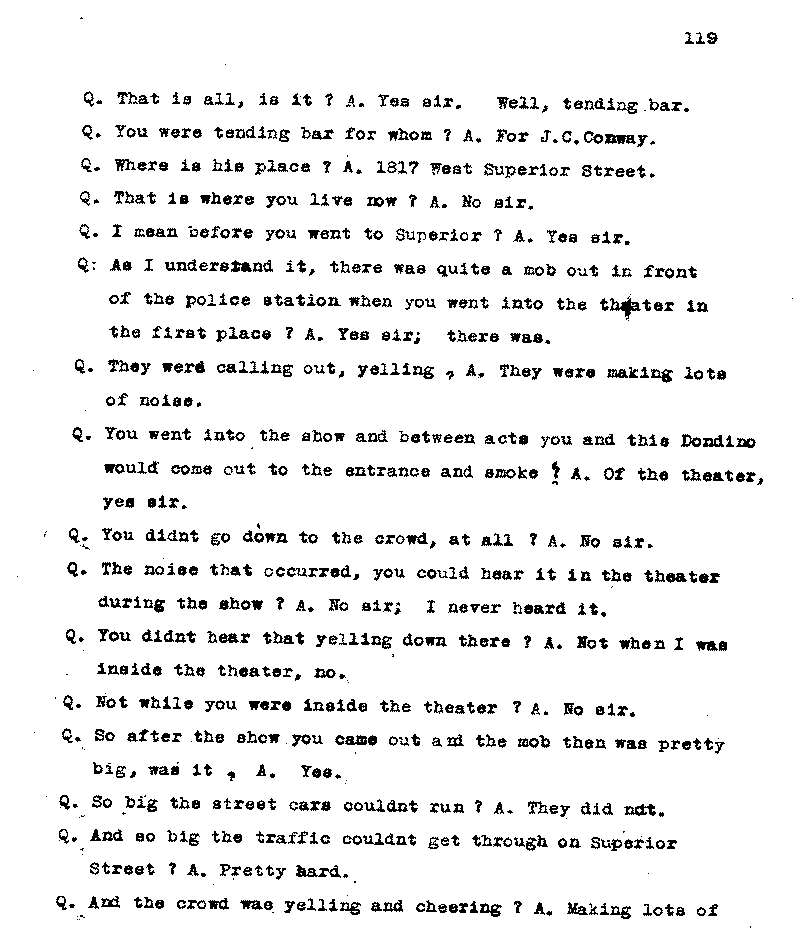
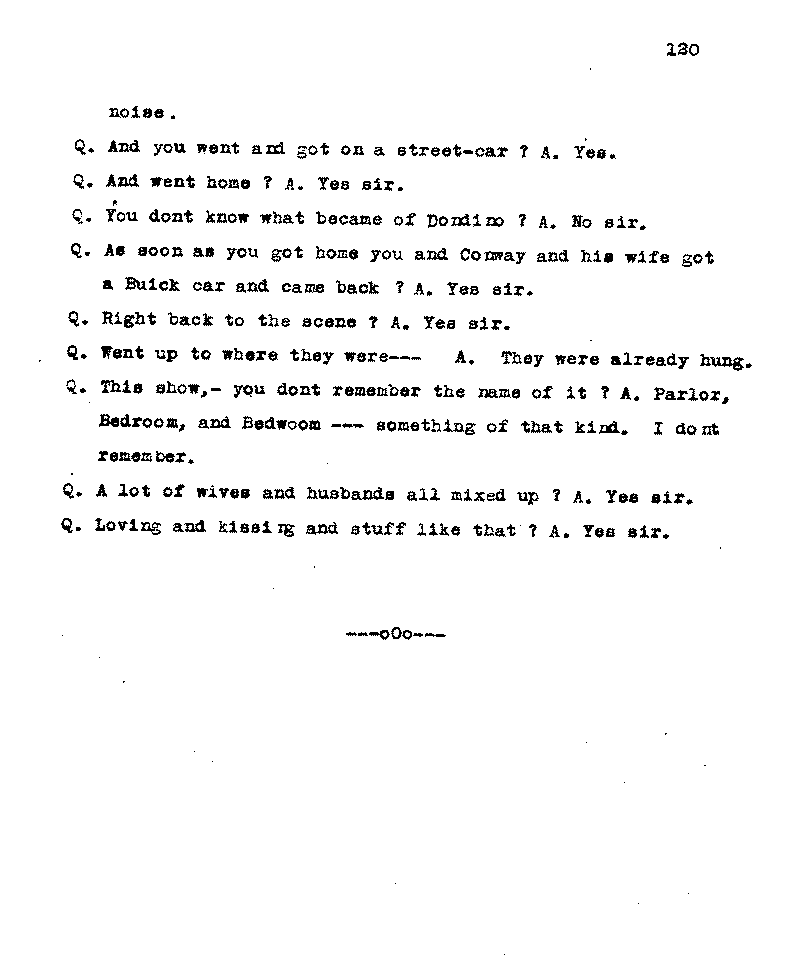
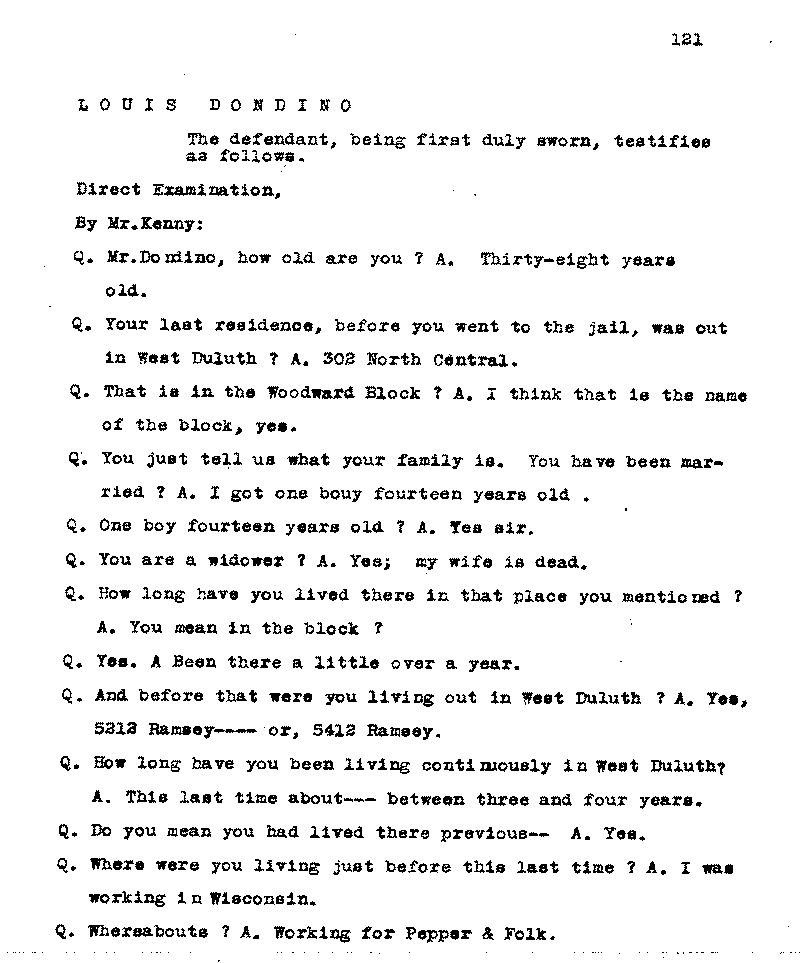
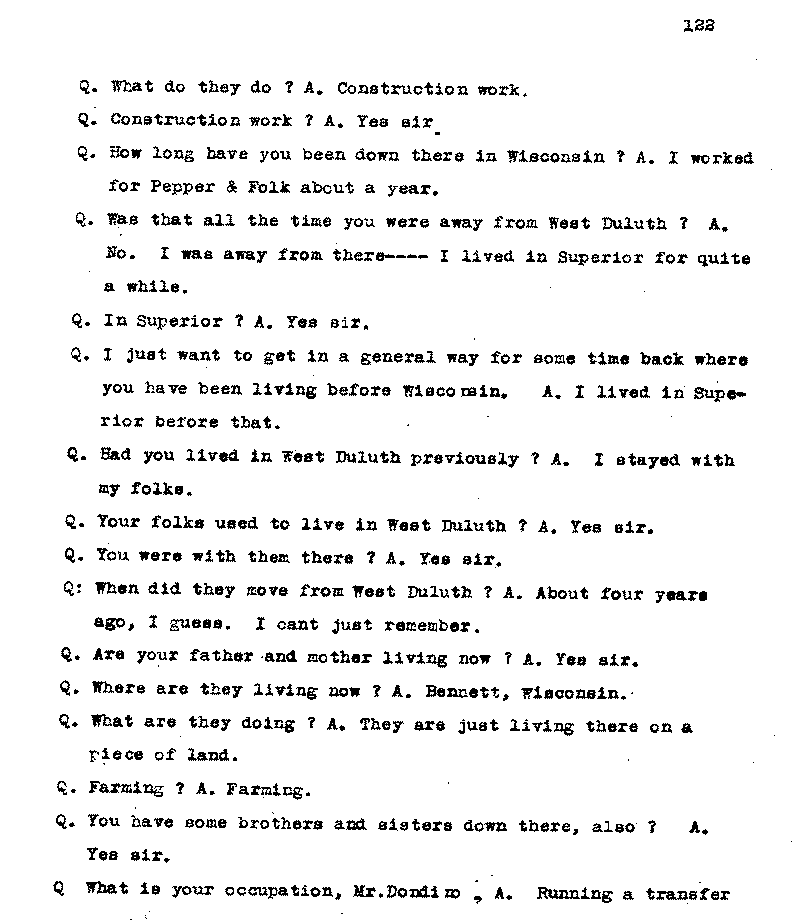
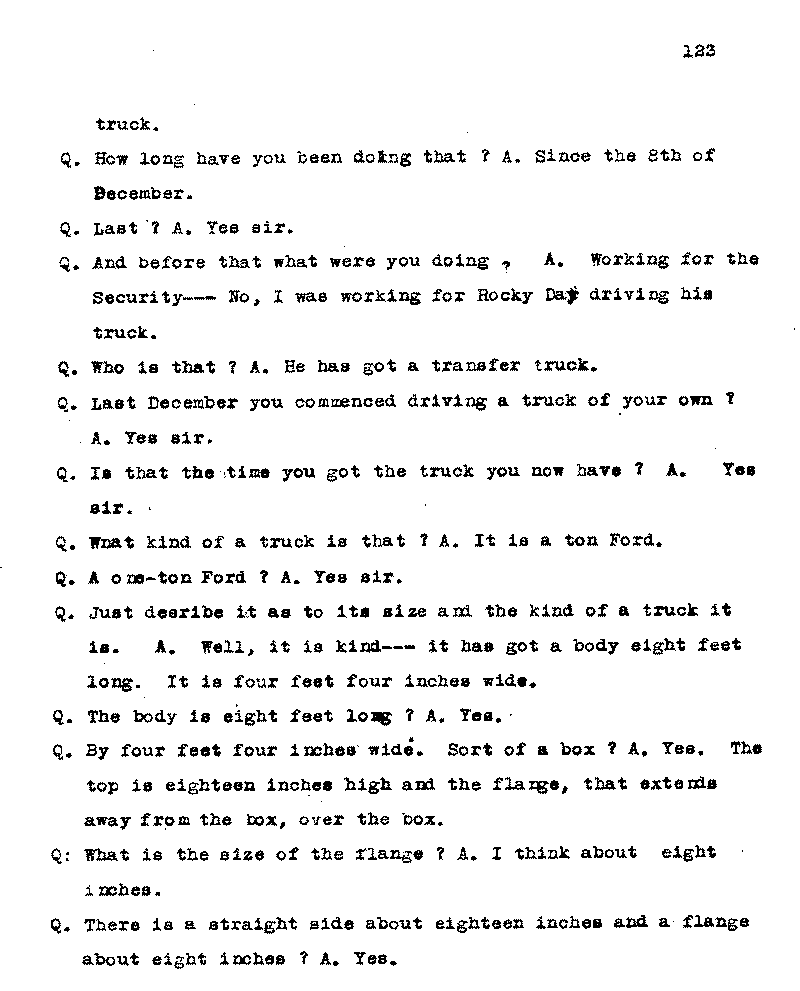
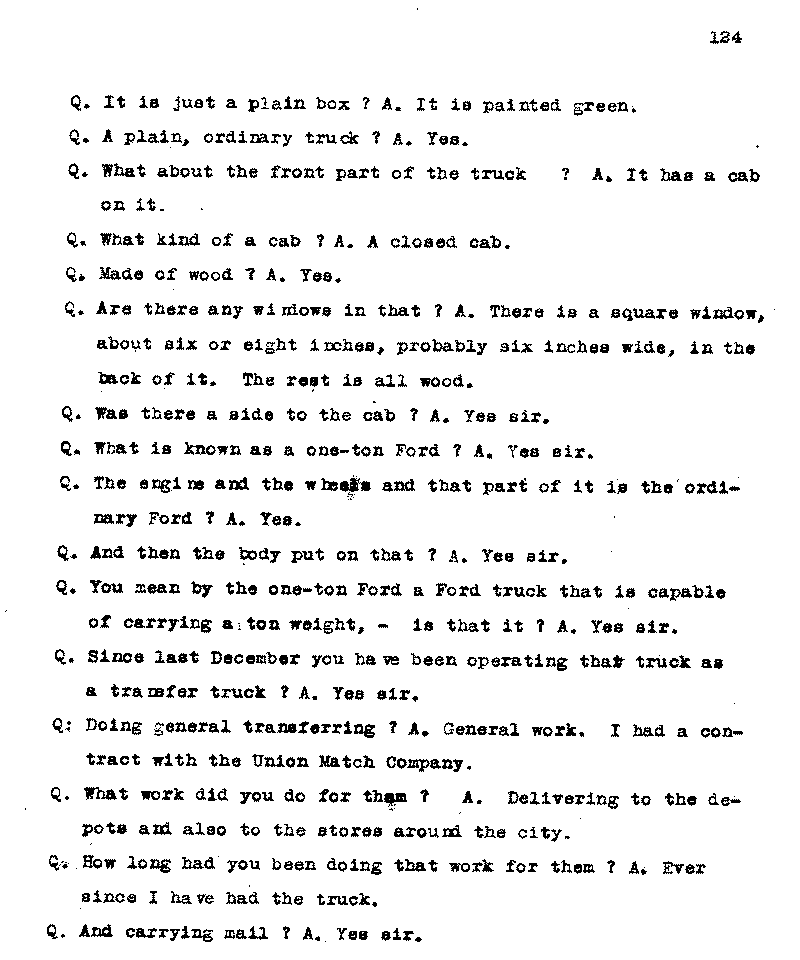
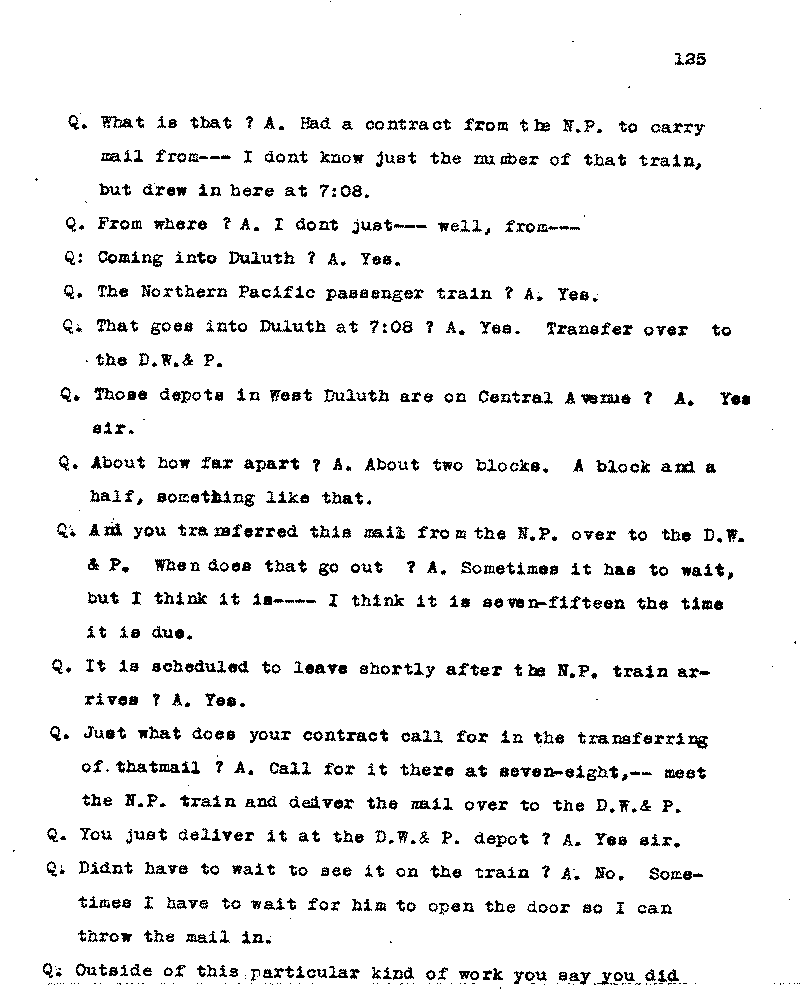
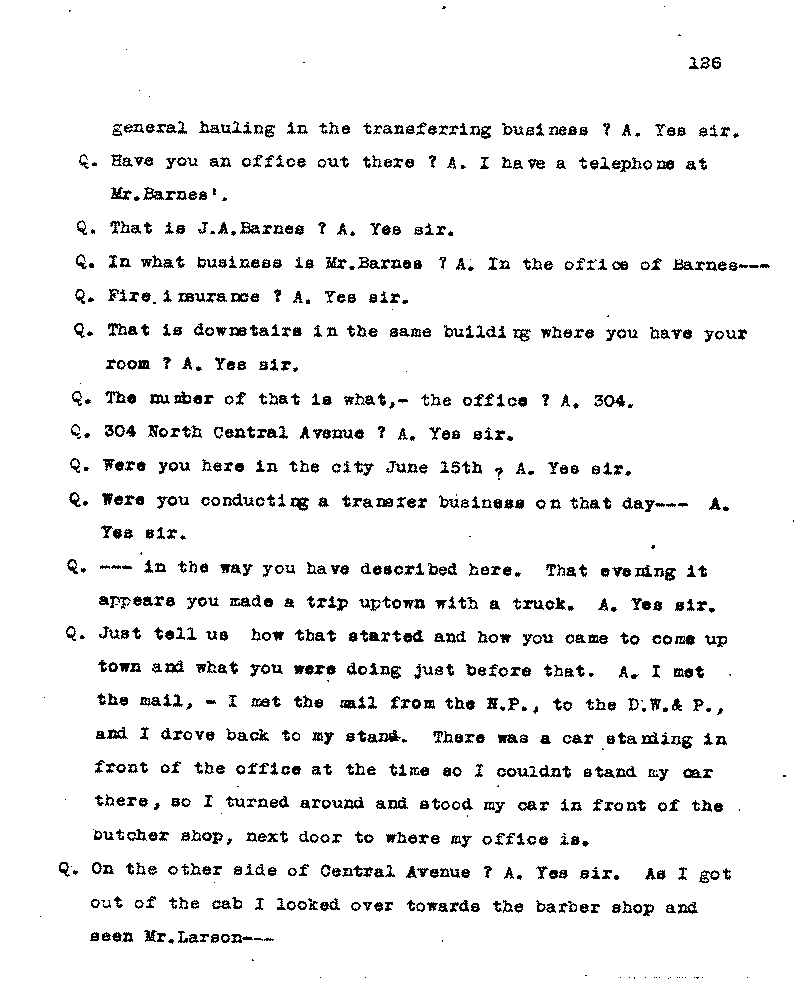
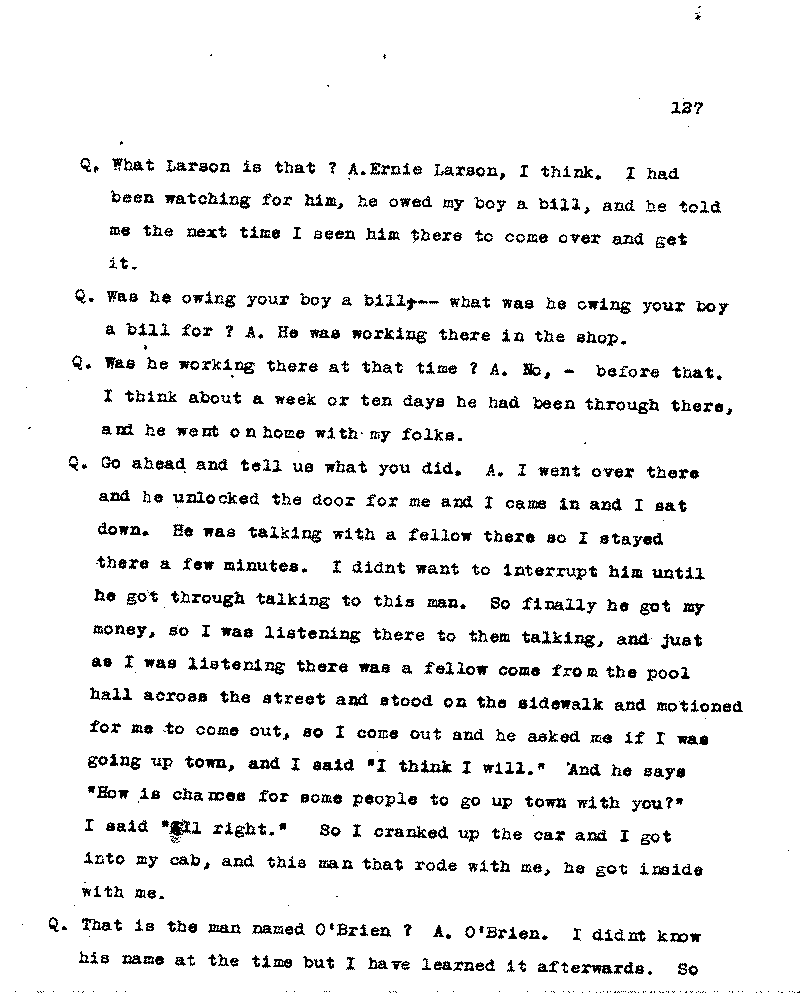
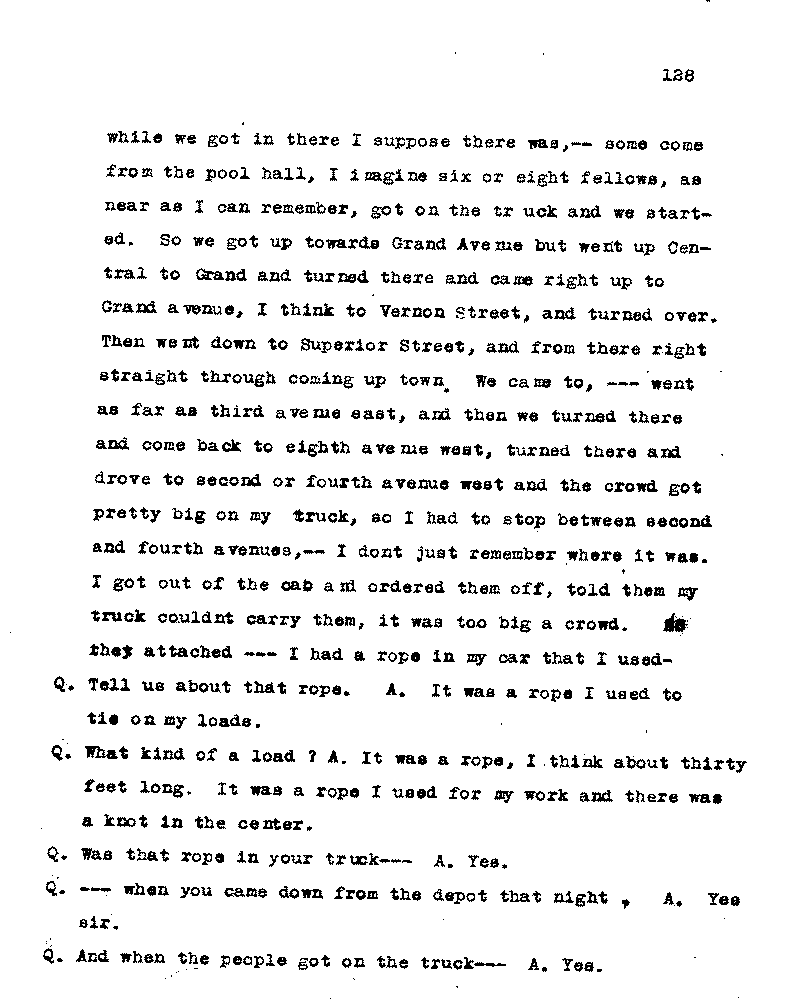
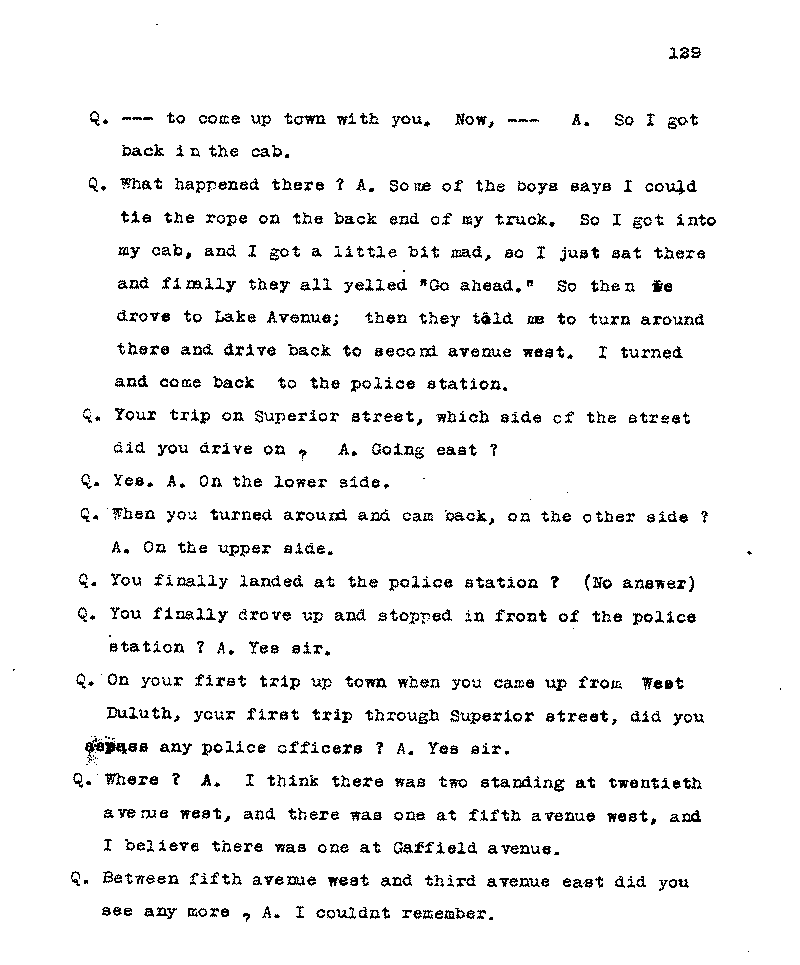
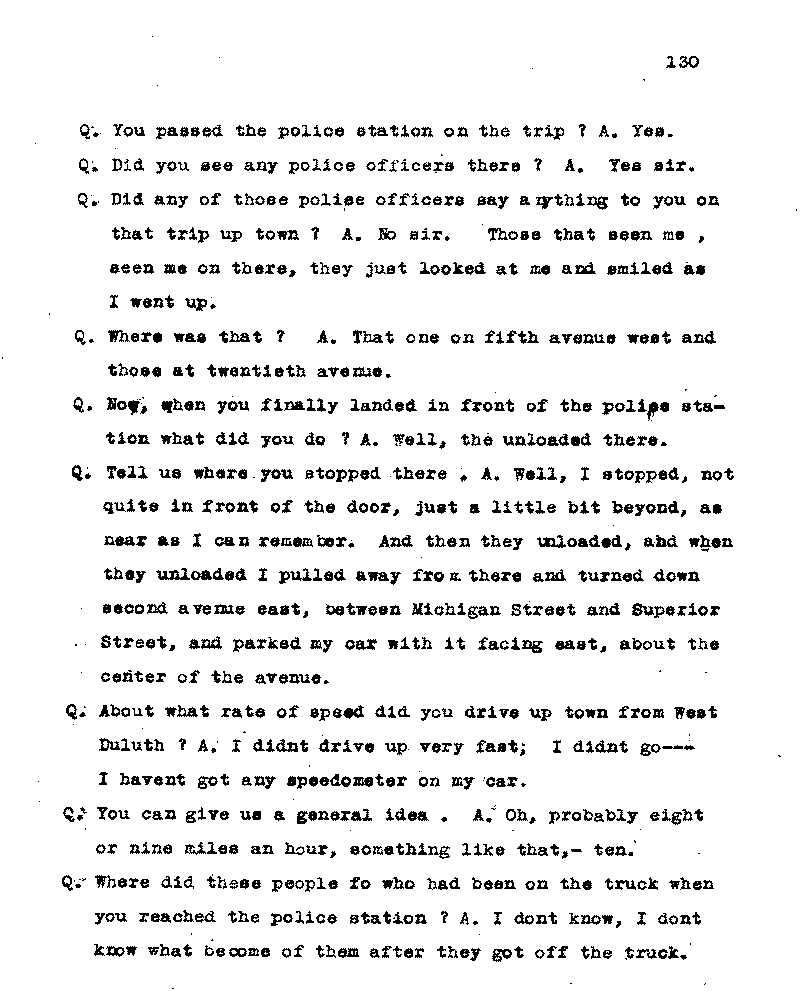
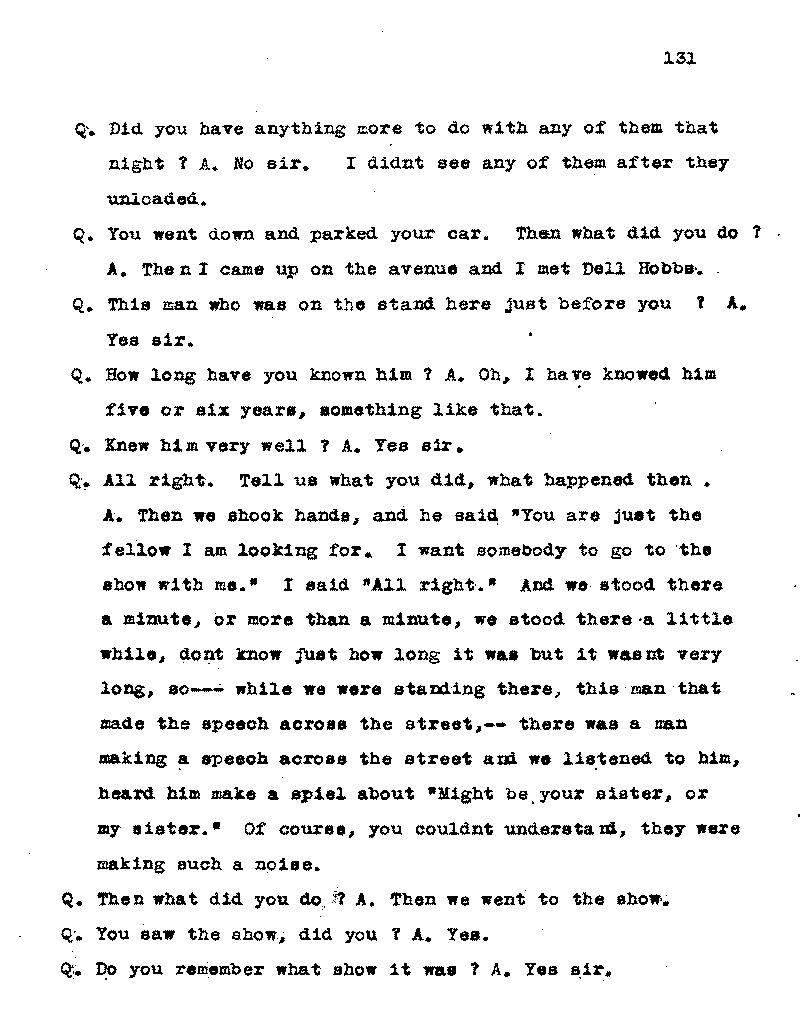
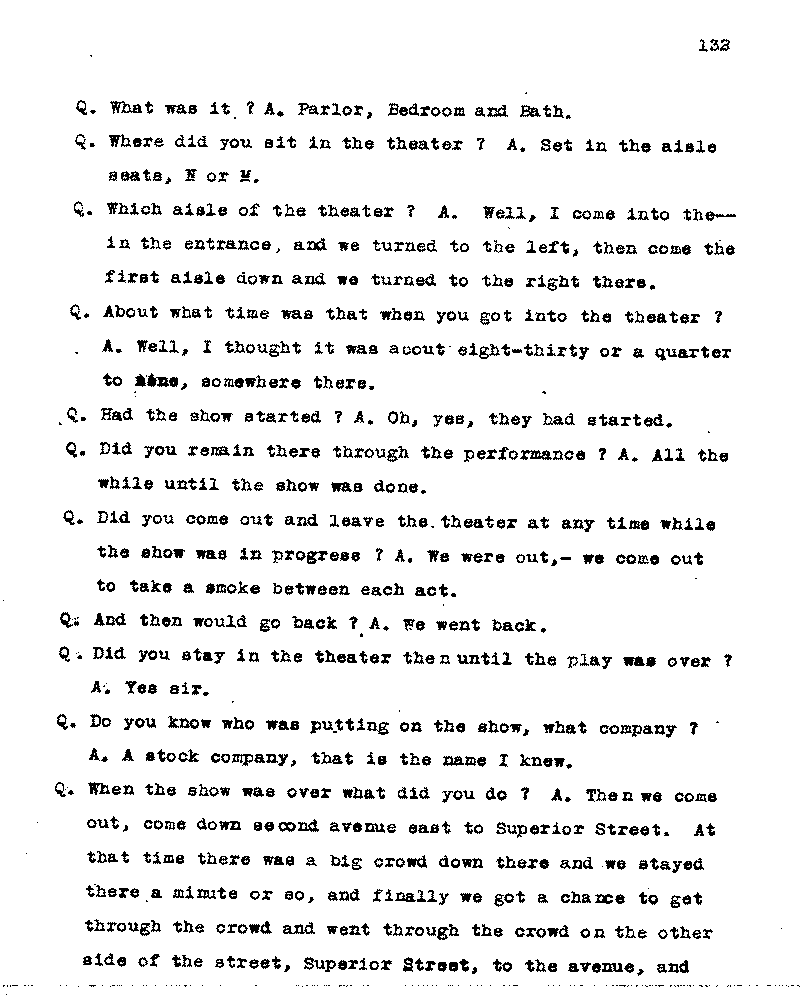
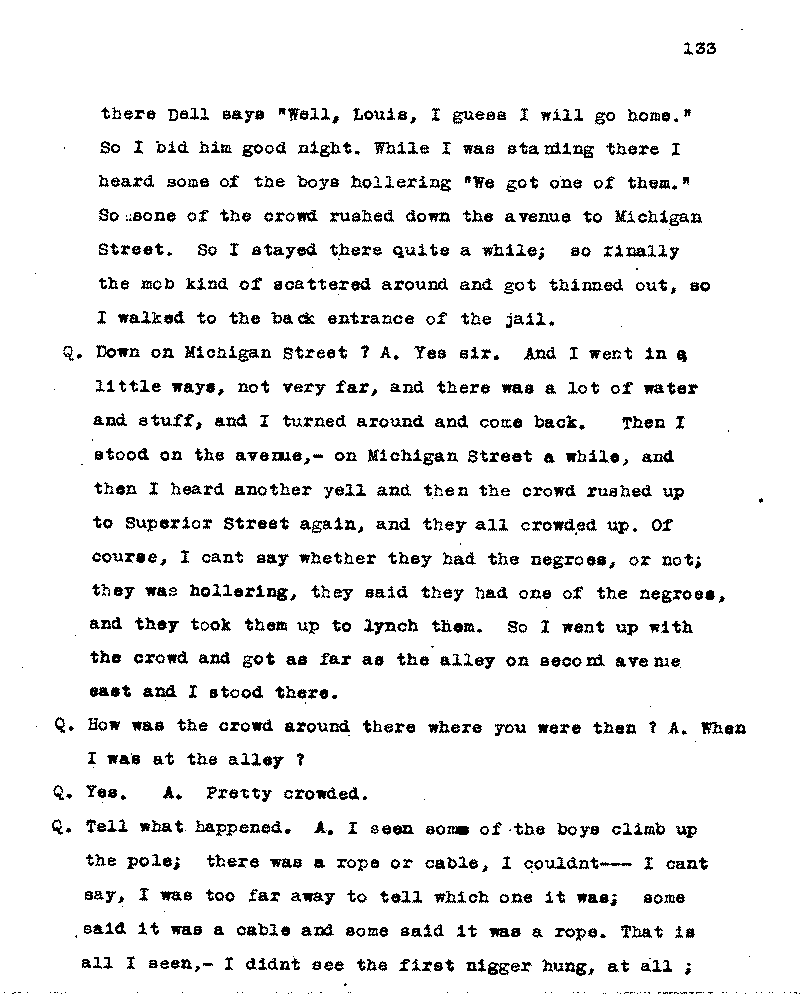
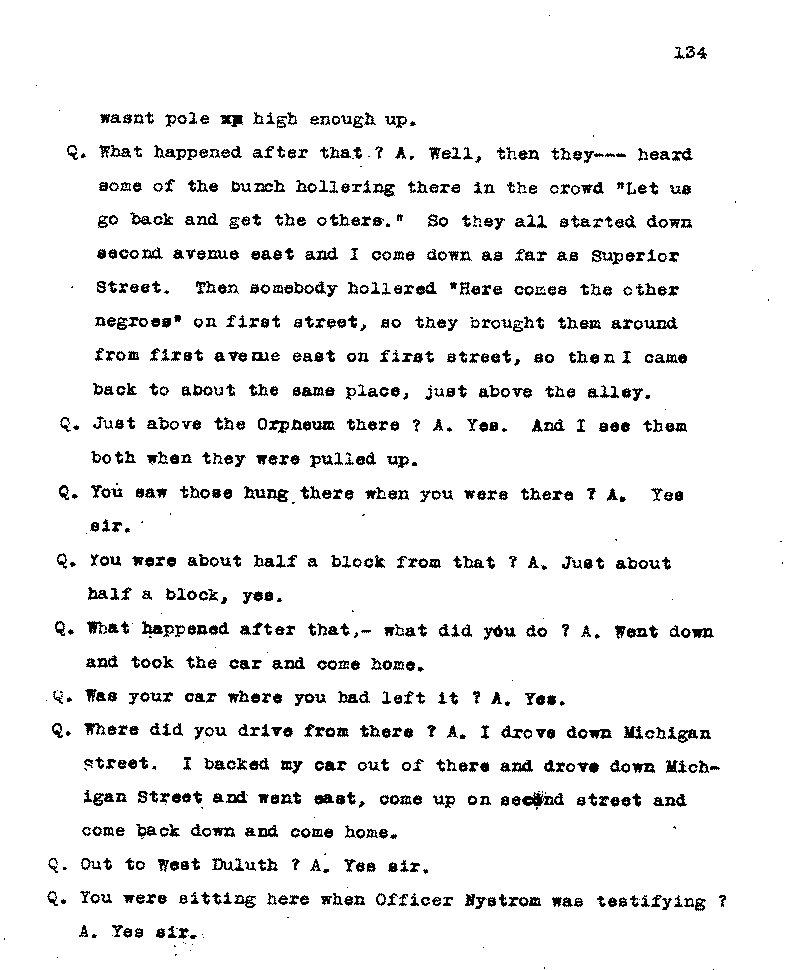
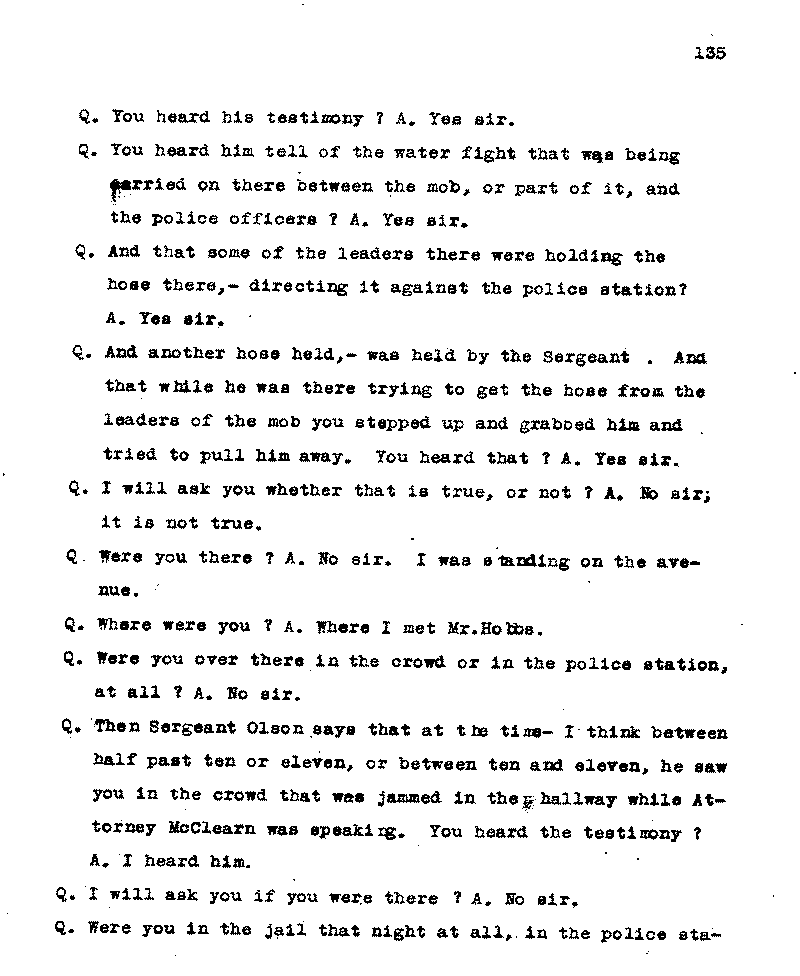
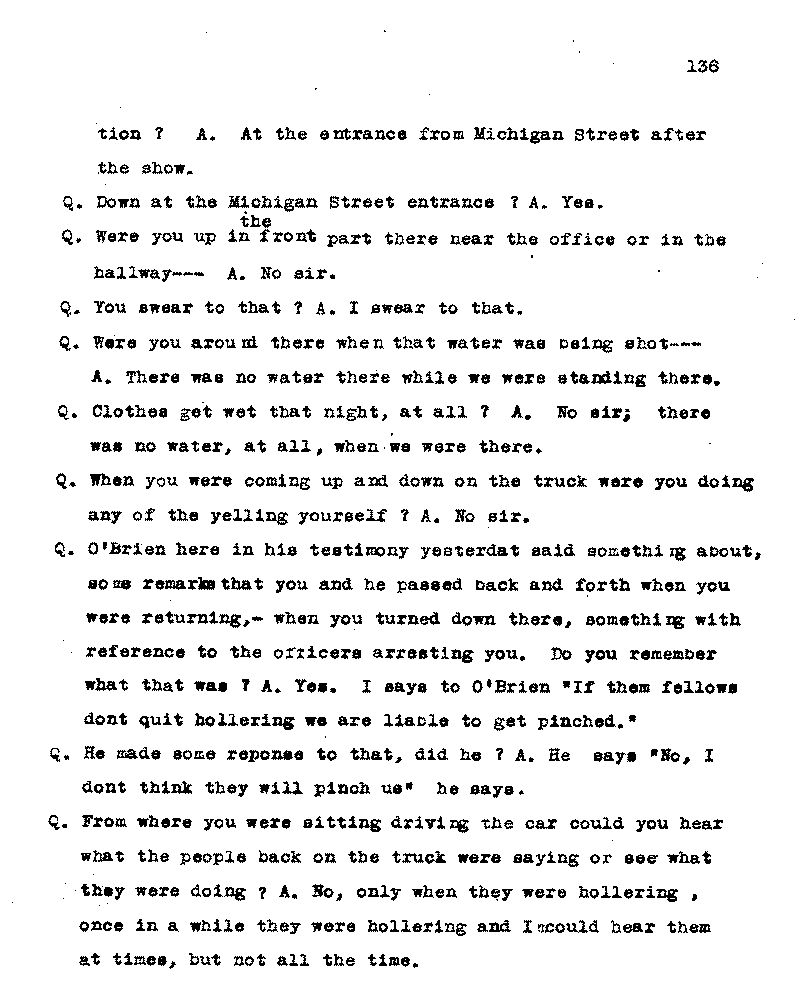
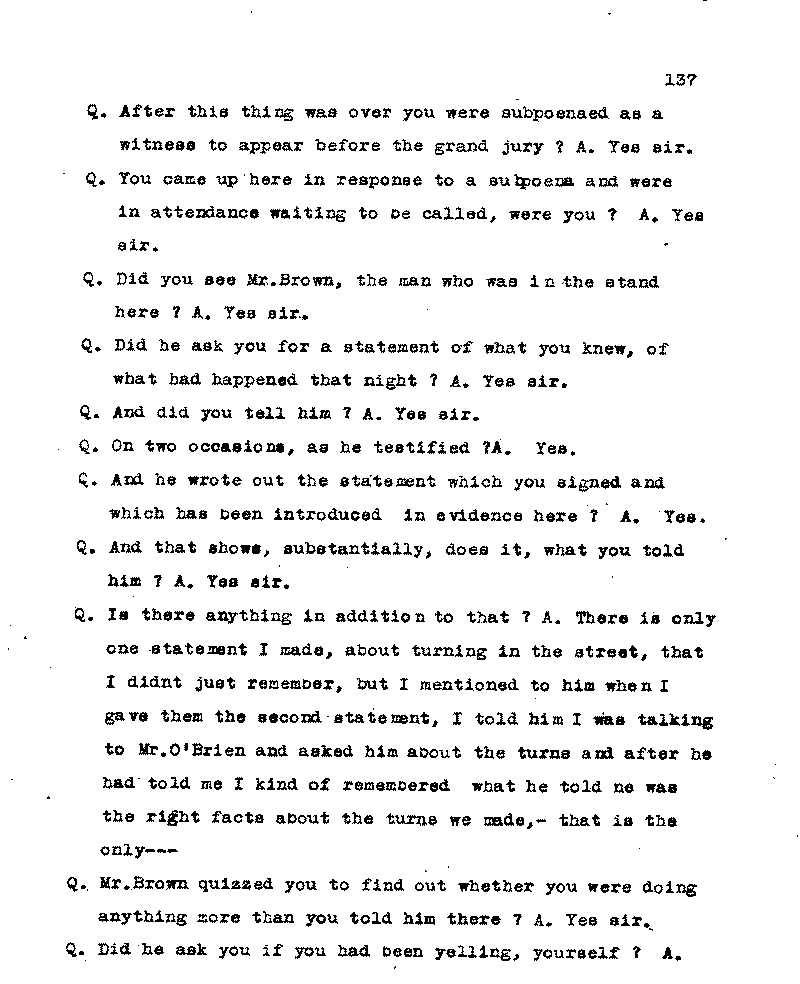
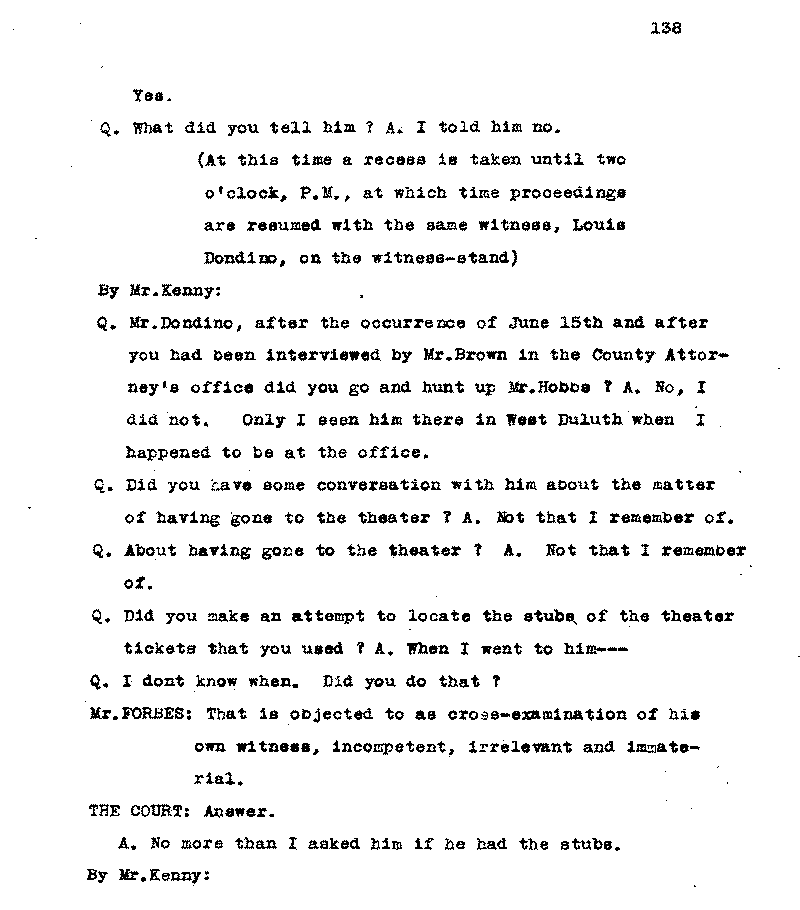
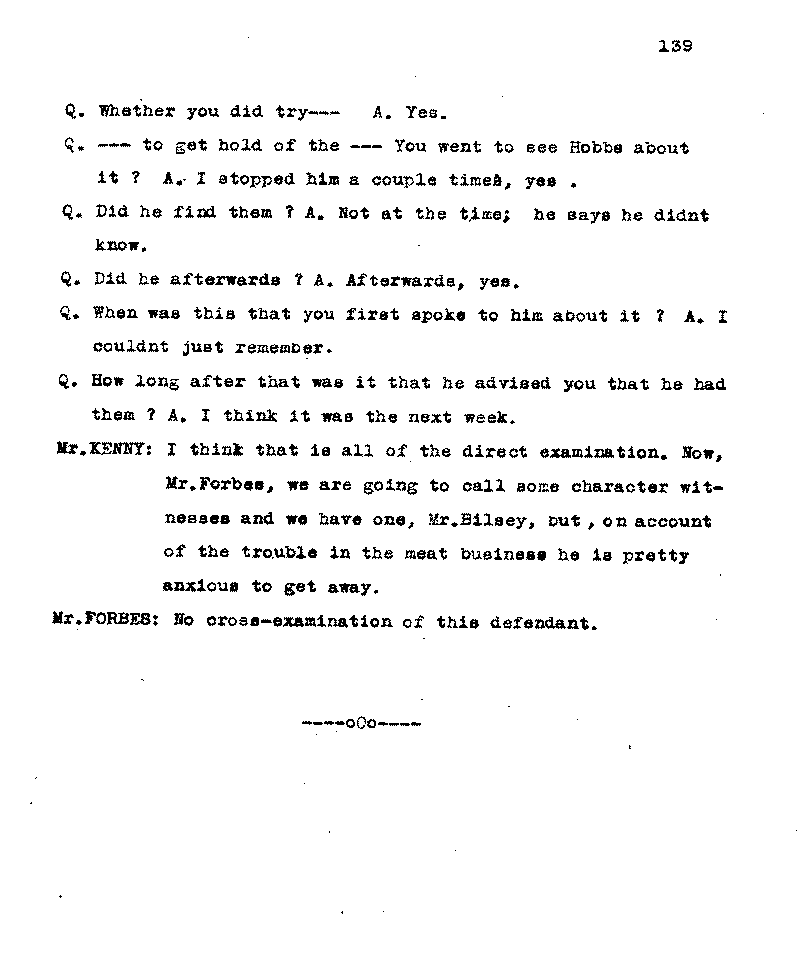
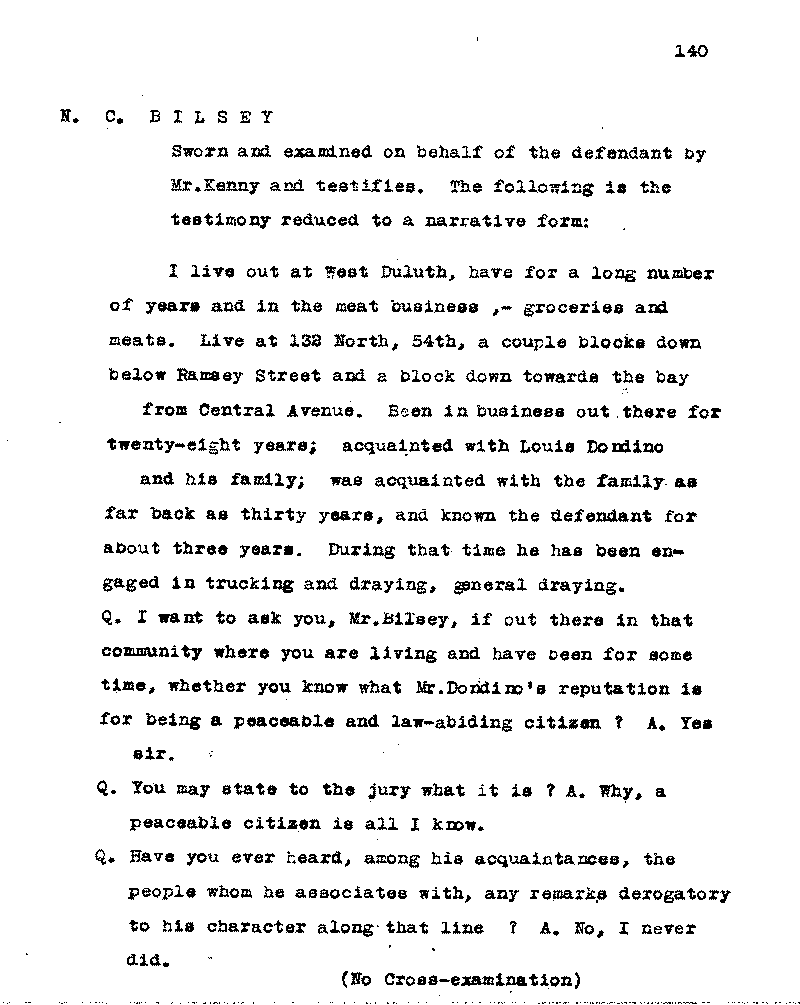
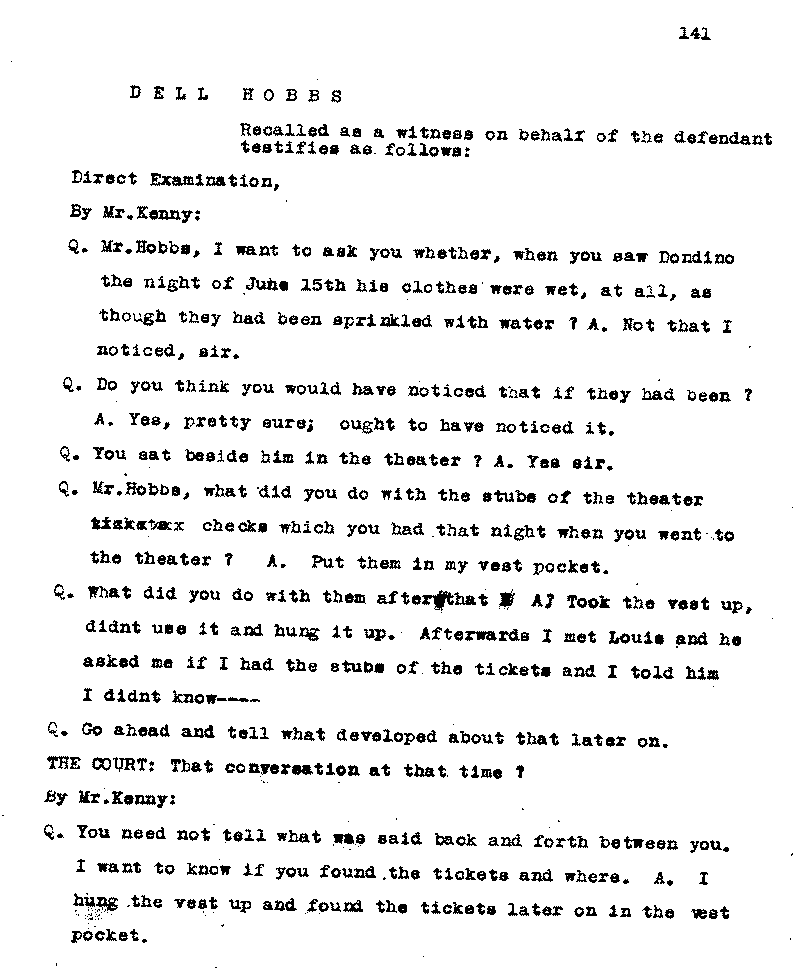
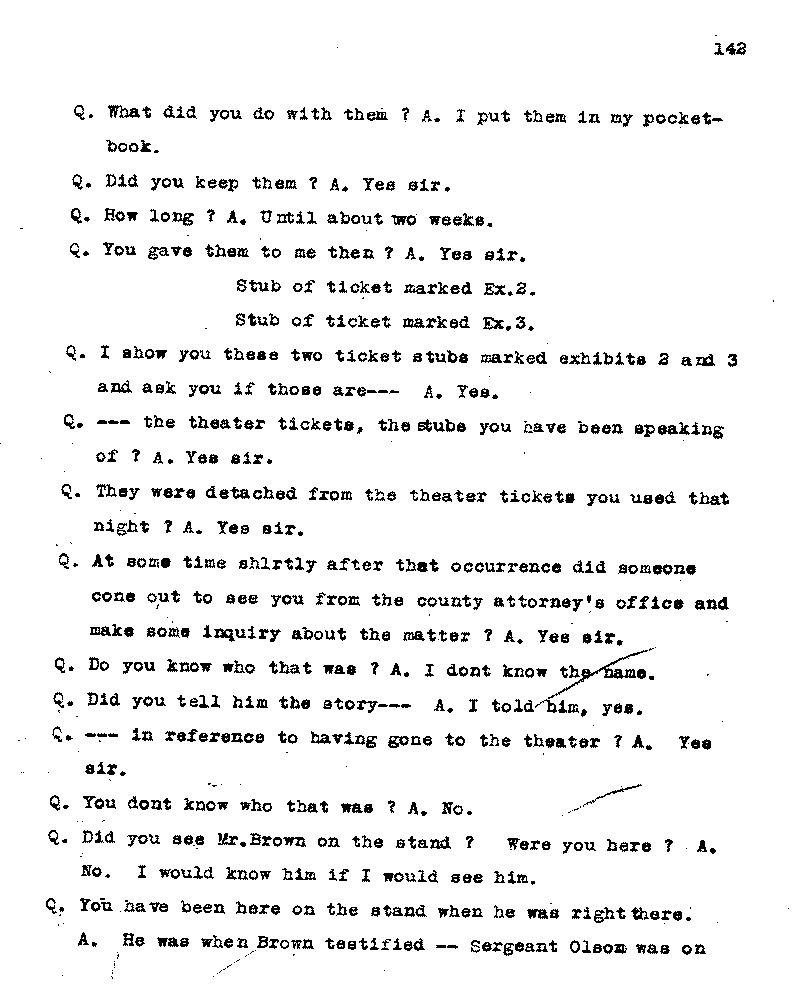
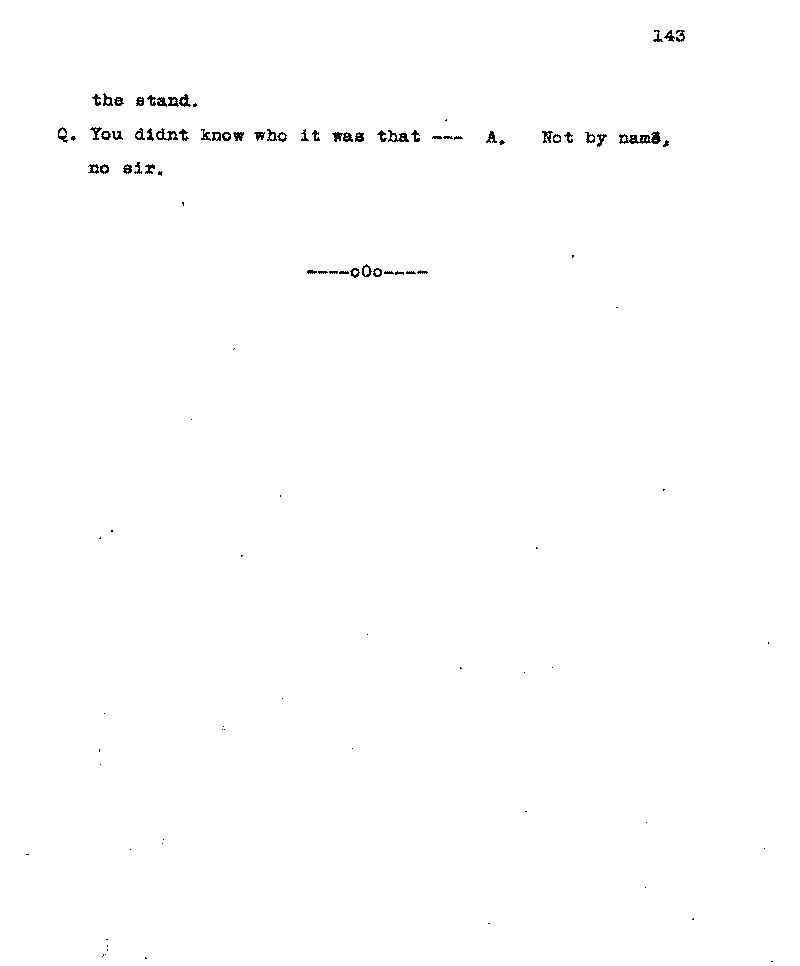
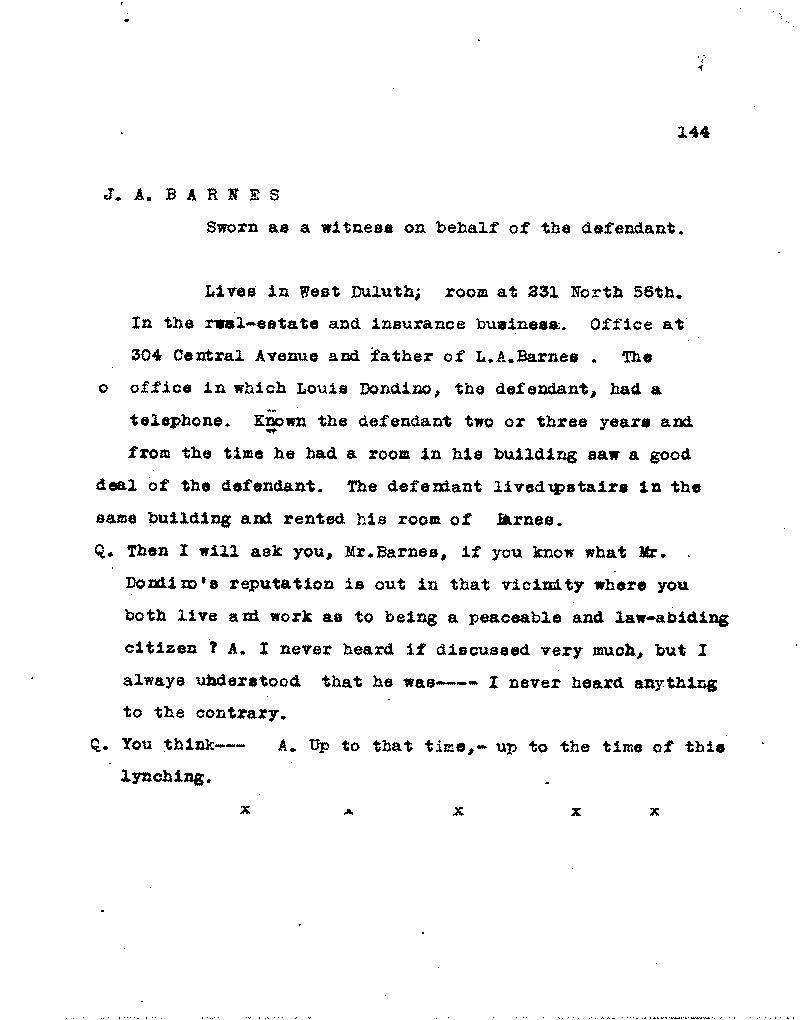
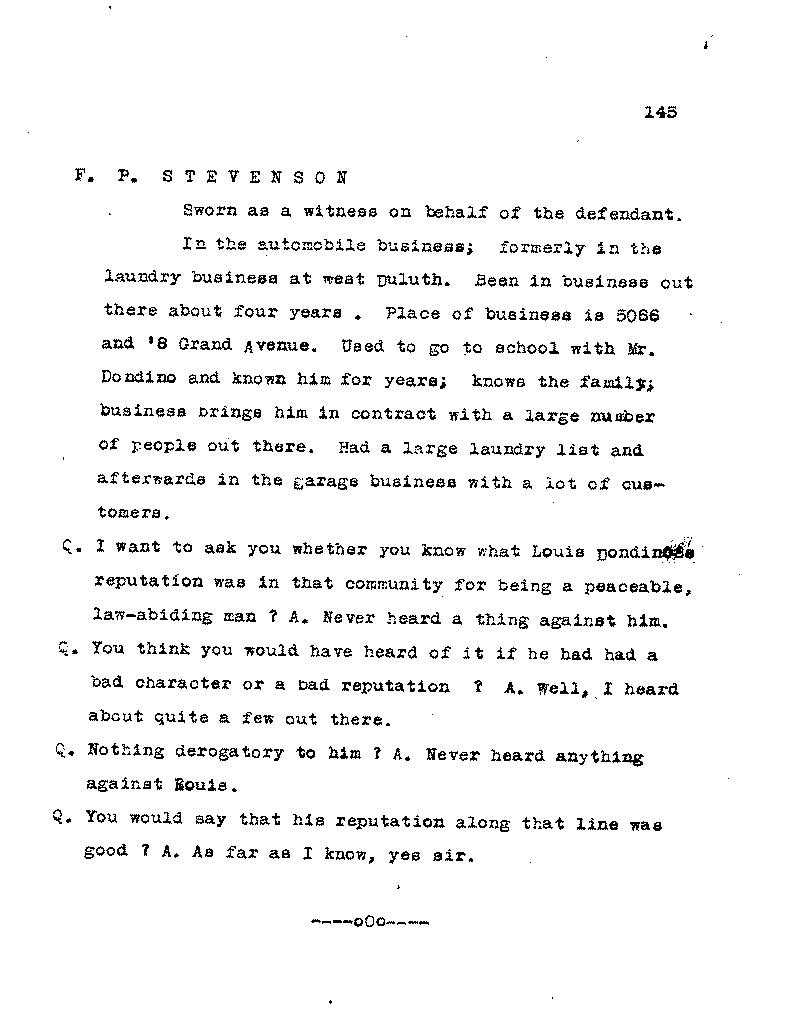
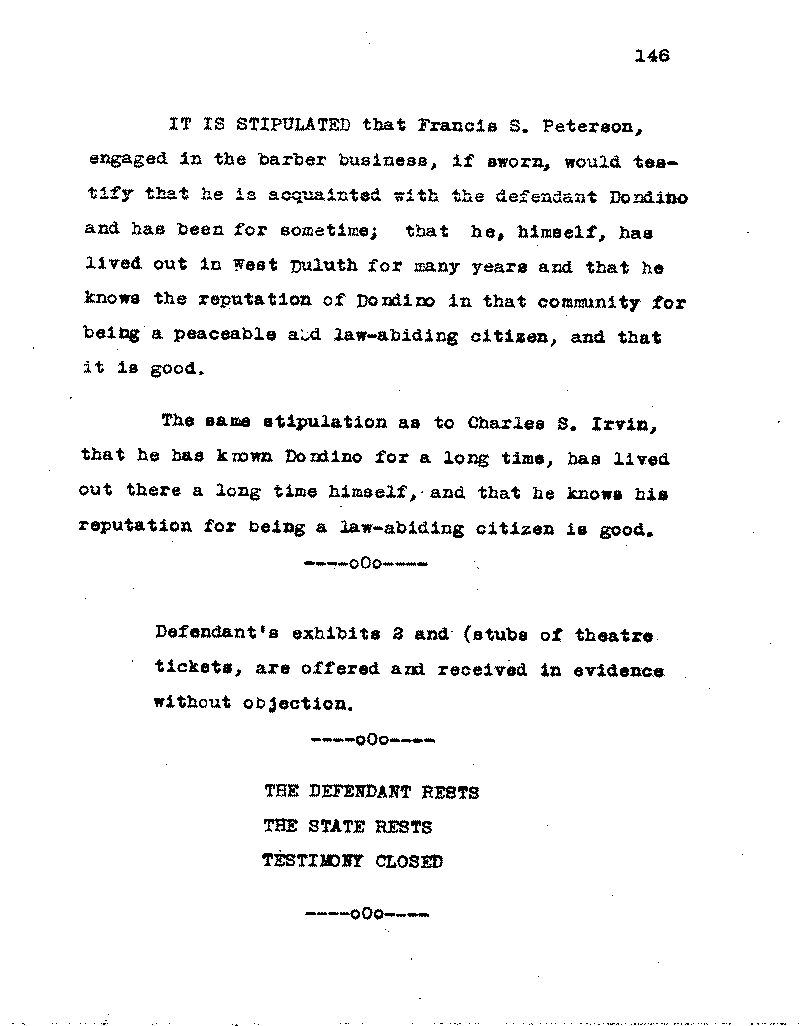
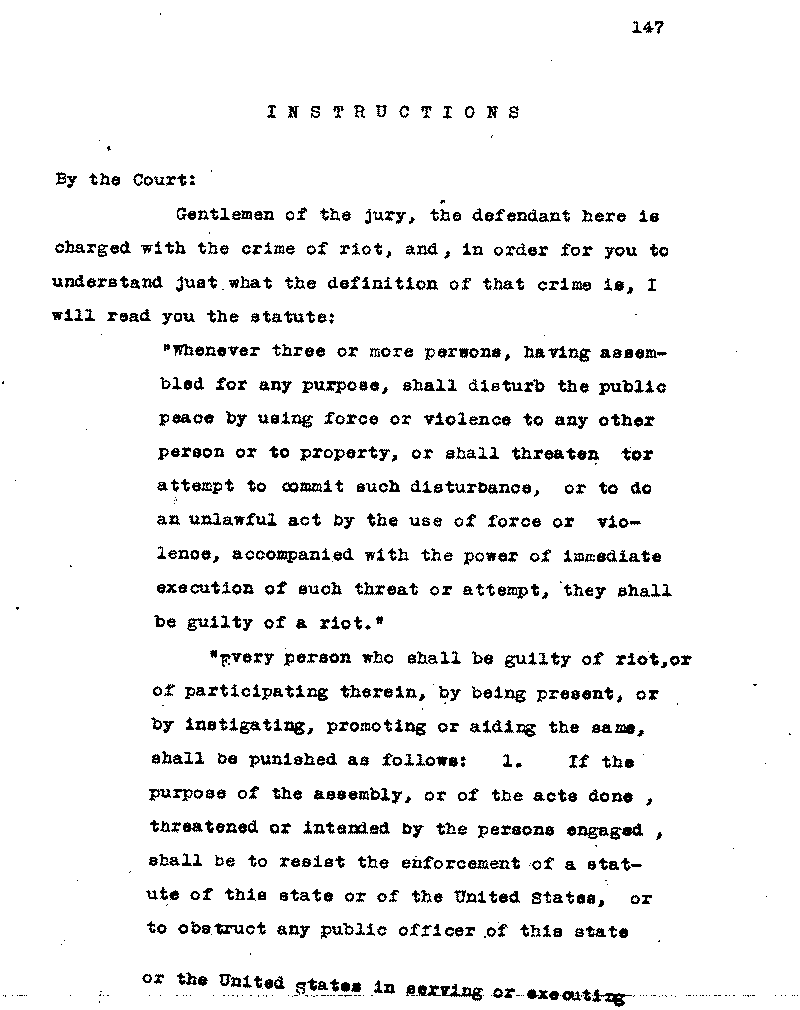
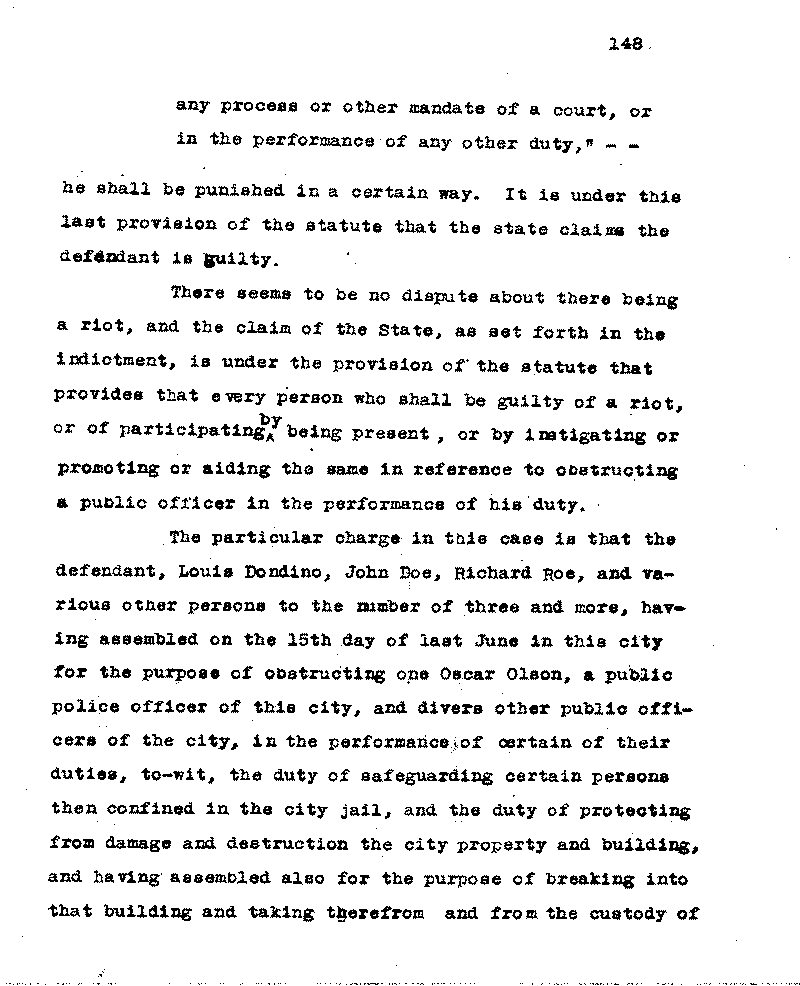
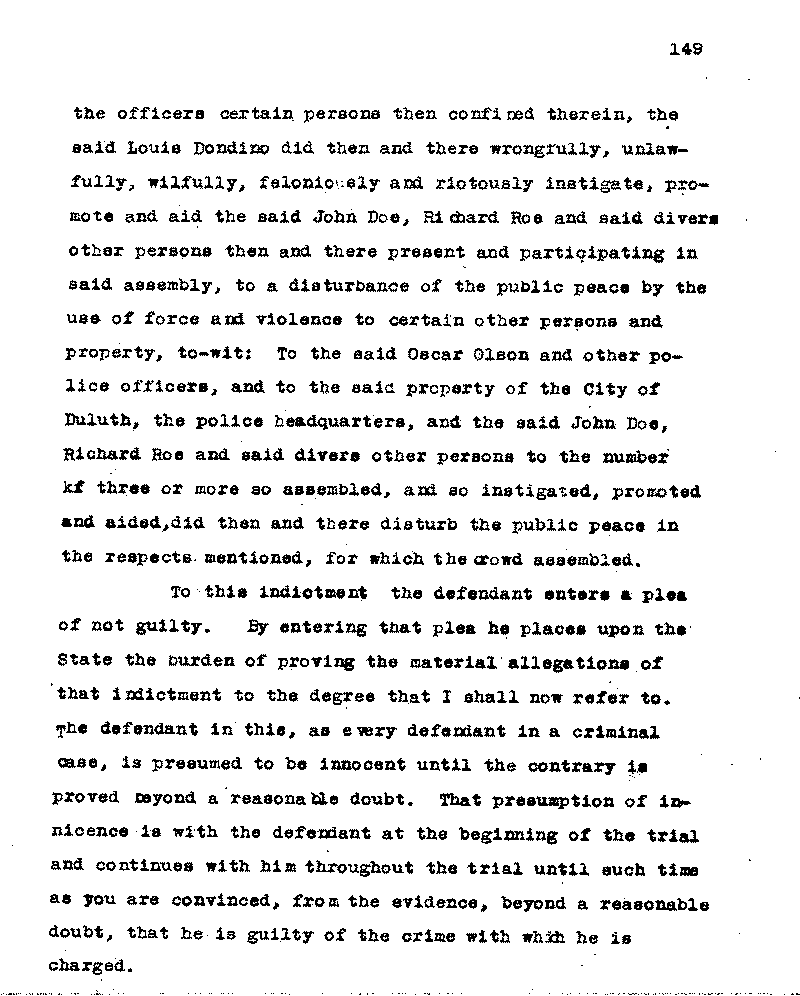
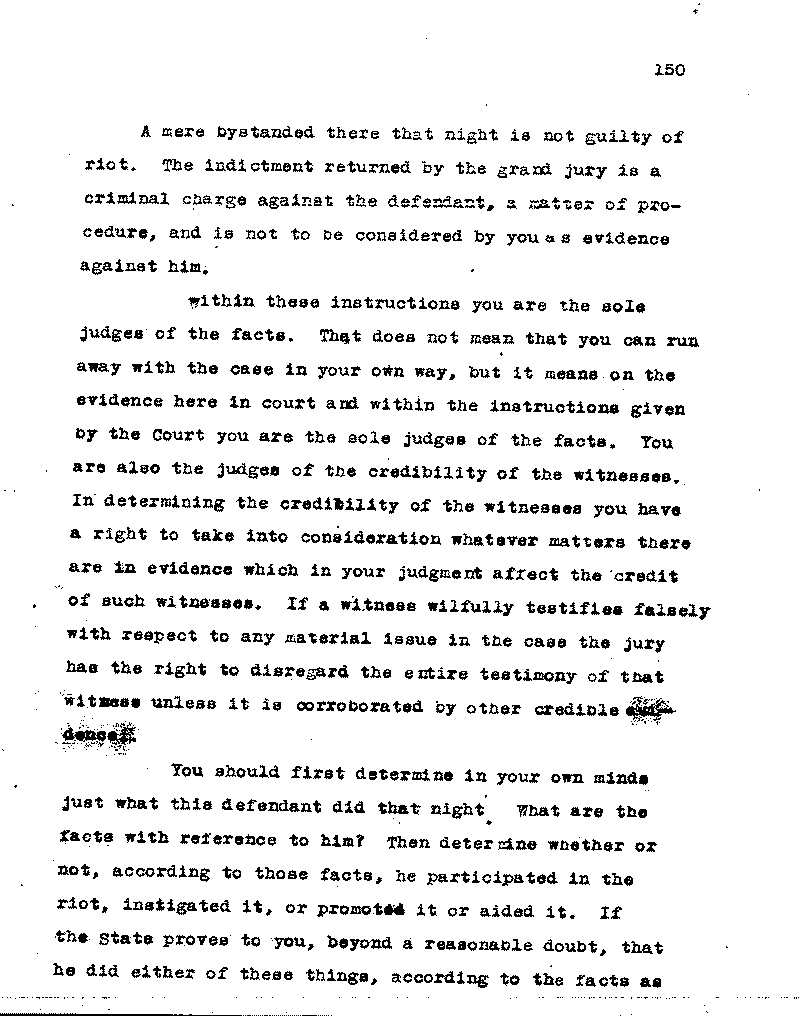
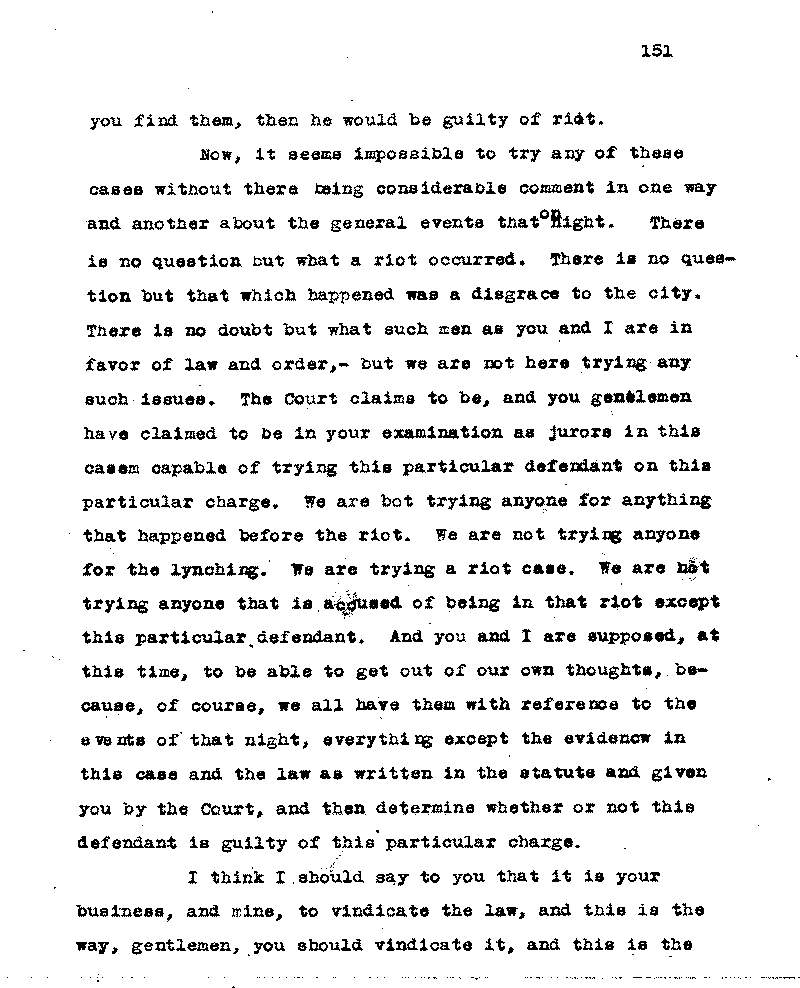
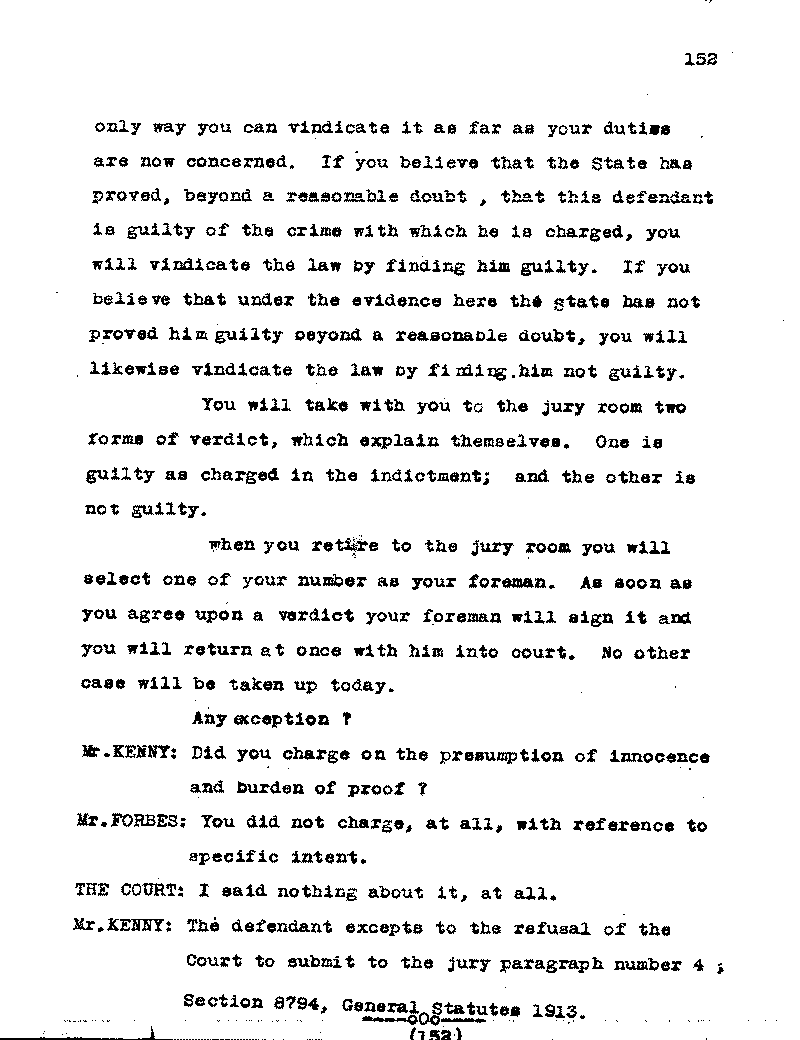
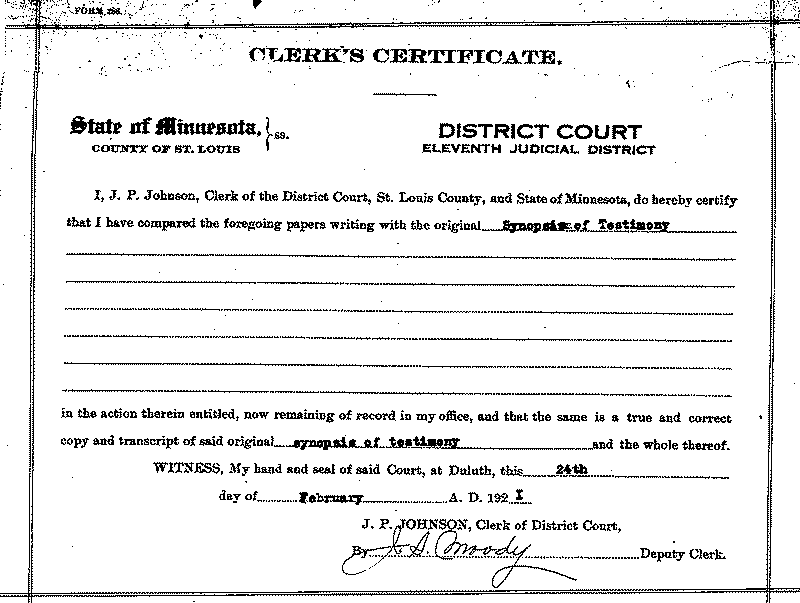
Image text
Mr. C. S. Reed,
Warden, State Prison,
Stillwater,
Minnesota.
Dear Sir:
I am enclosing certified copy of the
testimony in the case of Louis Dondino who was
taken to the State Prison some time ago and the
commitment did not
include the testimony.
Very truly yours,
J. P. JOHNSON,
Clerk
By
___________________
Deputy
JSM/J
Encl.
Read Febr. 18-22
I doubt the guilt of the
defendant
CJS.
STATE OF MINNESOTA
..........................................
Plaintiff,
vs.
LOUIS DONDINO
...................................................
Defendant
______________________________________________________________________
STATE OF MINNESOTA IN DISTRICT COURT
County of St. Louis
11th Judicial District
____________________________________________________
STATE OF MINNESOTA ...........................................
Plaintiff,
vs.
LOUIS DONDINO ....................................................
Defendant.
_______________________________________________________
This cause came
on for trial at the September 1920
term of the District Court of the Eleventh
Judicial District
of the State of Minnesota, held at the Court House in the
City of Duluth, within and for the County of St. Louis and State of Minnesota,
on Tuesday, September 7th, before
Honorable BERT FESLER,
Judge, and a jury.
A p p e a r a n c e s :
For the State, Mason M.
Forbes, Assistant County Attorney.
For the Defendant, E. J. Kenny.
____________________________________________________
H E R B E R T J. O ‘ B R I E N ,
Being first duly sworn
as a witness on behalf of
the state testifies as follows:
Direct
Examination,
By Mr.Forbes:
Q. Your name is Herbert J.O’Brien ? A.
Yes.
Q. What is your business, Mr.O’Brien ? A. I am in a
sanitarium.
Q. In the Npeming Sanitorium ? A. Yes sir.
Q. You are
there confined under the care of a physician for tuberculosis ? A. Yes
sir.
Q. How long have you been there ? A. Since the 19th of
July.
Q. Prior to that, ---- prior to going up there what was your business ? A.
I was working for the steel plant; machinist.
Q. You are,
Mr.O’Brien, here under indictment at the present time ? A. I am.
Q.
And awaiting trial under that indictment ? A. Yes sir.
Q. They sometimes
refer to you as Darby -- A. That is what they call me.
Q. On the 15th of June this year where were you living ? A. At
the Cody Hotel, west Duluth.
Q. That is on the corner of Ramsey Street and
Central Avenue out there ? A. Yes sir.
Q. You know this defendant, Louis
Dondino ? A. Yes.
Q. Did you see him on the evening of June
15th of this year ? A. Yes.
3
Q. Where was it, Mr.O’Brien, that you first saw him ? A. It was right, - pretty near on Bristol Street and Central Avenue.
- In West Duluth? A. Yes sir.
- He has a transfer truck ? A. Yes sir.
- That truck has on the back of it “City Transfer”? A. Yes, I think so.
- Will you tell the jury here just what kind of a truck it is, whether it has a cab on front ? A. Yes, it has got a cab in fromt and it has kind of a box in there and just two panes of glass, one on each side.
Q. How big a truck is it ? A. I couldn’t say whether it is a two-ton truck.
Q. About how big --- A. Just about eight feet, I guess.
Q. Are there stakes on it ? A. No; just a box of boards a- about twelve or fifteen inches high.
Q. Where was the defendant when you first saw him the night of June 15th ? A. Just going into the office on Central Avenue.
Q. His office near Bristol and Central ? A. Just about the second or third door from the corner.
Q. After he came out of the office do you know where he went? A. I think he went across the street some place.
Q. Where was the truck at that time ? A. Standing in front of his office.
4
Q. Did he subsequently return to the truck ? A. How ?
Q. Did he come
back to the truck again that night ? A.Back to west Duluth ?
Q. I mean after
he had gone across the street. A. Yes, he went right back to the truck.
Q.
That still over there in front of his place of business? A. Yes sir.
Q. After he came back where the truck was standing what did he do ? A. He
got right into the truck and then he went across the street, and I asked him how
the chances will be uptown, and he said “All right” and I got into
the truck, and as he was pulling out there was four or five fellows jumped on
behind.
Q. You got into the cab of the truck ? A. Yes sir.
Q. What is
that, a left-hand drive car or a right-hand drive ? A. It is left.
Q. You
were sitting on the right hand side ? A. Yes sir.
Q. Anyone else in the cab
with you ? A. No.
Q. How many would you say there were of these men that got on the back of the truck ? A. I couldn’t say, but I should judge probably five or six, anyway.
Q. Do you remember whether they sat down in the truck or stood up ? A. No;
I couldn’t see back, at all.
Q. As I remember it, you don’t
remember who they were ? A. No
sir.
5
Q. Or paid no attention to who was on the truck ? A. No, I didnt pay any attention.
Q. When you left Duluth, - when you left West Duluth at Bristol and Central Avenue where did the defendant drive the truck ? A. Started down Central Avenue, then went out to Grand, up near thirtieth avenue and down on Superior street.
Q. And then when you got to Superior street did you go east towards Duluth ?
A. To third avenue east.
Q. To third avenue east ? A. Yes.
Q. Was the same crowd on the truck or were there more getting on ? A. There was more getting on.
Q. When you got to third avenue east what about the crowd,- whether there was a crowd, or not ? A. Yes, a pretty good crowd.
Q. Did you stop on the way up, at all ? A. No, I dont think so. He kind of slowed up at either twentieth of twenty-first avenue, where the street car goes down there.
Q. Do you know whether any more fellows got on at that time ? A. I couldnt say; I think some got on around eighteenth or nineteenth avenue,-- I dont know whether anybody got on or not.
Q. Just tell us what the crowd in the truck were doing. Were they calling
out, yelling ? A. Not very much. They didnt do much until they got to
twenty-first avenue, until they saw two policemen standing there. I don’t
know whether they done it for a joke, or not, but they hollered at
the
6
police.
Q. What did they say ? A. I dont know, but they did yell at him. I dont know exactly what they said.
Q. When then got up town, on the way up to third avenue east did you hear any of them calling out? A. No, not until—the most was when they just went past the police station.
Q. When you got to third avenue east where did you go ? A. Went back to seventh avenue west.
Q. Was there a crowd still on the truck ? A. Yes sir.
Q. When you got to seventh avenue west where did you go ? A. Turned around and went up to Lake Avenue.
Q. Up to Lake Avenue ? A. Yes.
Q. When you got to Lake avenue where did you go ? A. Went to second avenue west.
Q. Turned around west,- west,- to second avenue west ? A. Yes sir.
Q. And from second avenue west where did you go ? A. Went right back to the City Hall and stopped right there and there they all got off.
Q. That is, they were driving up and down Superior Street all this time ? A. Yes sir.
Q. Do you remember anything that anybody - - any of the men on the truck were calling out ? A. No.
Q. The crowd got up to where,- in front of the City Hall ? A. Yes sir.
Q. Where did they place the truck ? A. I dont just remember
7
whether they took it away or what was done with it. I went across the street about three or four minutes; after I went across the street to the drug-store I bought a couple of cigars. I was going to give the driver one, and he was gone. I didnt see him any more on the truck.
- You didnt see him any more on the truck that night ? A. No sir.
Q. Sometime during the riot you had some conversation with the defendant ? A. No.
Q. I mean in the cab. A. Oh, when we turned around and went past the police station and coming back around, I think it was that time he says to me “I wonder if there is any danger of us getting pinched”? Then I says “I don’t know.” I says “It is a wonder they didn’t pinch us when we went by there.” And he said “I wouldn’t like to get pinched because I havegot to be to work in the morning.”
Q. That is all, Mr.O”Brien, that you know about the defendant and
where he was that night ? A. That is all I know.
CROSS EXAMINATION,
By
Mr. Kenny:
Q: What time was it, Mr.O'Brien, when you and Dondino started out from West
Duluth ? A. It would be about a quarter or twenty minutes after seven.
Q.
And there were four or five men jumped on shortly
after-
8
wards ? A. Yes sir.
Q. You didnt know who they were ? A. No, I didnt know them.
Q. Didnt remember you had ever seen any of them before ? A. No.
Q. When you got up to the West End, about twentieth or twenty-first avenue, you said something about passing some policemen. A. Yes, two policemen.
Q. Do you remember where they were ? A. I think they were standing on the lower side of twenty-first avenue west, on the west corner.
Q. Of Superior street ? A. Yes.
Q. The lower west corner of twenty-first avenue west ? A. Yes, twentieth avenue.
Q. Twentieth avenue ? A. Yes.
Q. Do you know who they were ? A. Yes.
Q. What officer ? A. One was Con Walker; and the other was Fred Malon.
Q. Did they, when the came to these officers or shortly after they passed them,- someone on the truck said something or addressed some remark to the policemen ? A. Yes.
Q. How far away from the policemen were they ? A. When they passed, as close as from here to the table. The truck passed on the same side they were on.
Q. The truck passed these two policemen within a distance of about 15 or 20 feet from them ? A. Yes.
9
Q. Was it about the time the truck was passing the policemen that those on it made these remarks you speak about ? A. Yes.
Q. Do you know what they said ? A. No.
Q. What did the policemen do ? A. They only just laughed ; smiled.
Q. They didnt say anything--- A. No.
Q. --- to yourself or Dondino A? A. No.
Q. Or to any of those on the truck ? A. No sir; not that I heard.
Q. You were on the lower side, the right hand side ? A. Yes.
Q. Moving towards the east ? A. Yes sir.
Q. Then you passed,- you were nearer to the policemen than Dondino ? A. Yes, I was closer to them than the driver.
Q. You did not hear that they said anything of any kind to either you or anyone on the truck ? A. No.
Q. Didnt tell the men on the truck to tell them anything they were doing ? A. Not that I heard, no.
Q. Then you continued on east until you got to third avenue east ? A. Yes.
Q. Did you pass in front of the police station there --- did you pass any other policemen, other than those you have spoken about, until you got to the police station ? A. Yes, there was a couple along the bowery there.
Q. You mean that part of the street down between--- A. Around
10
fifth avenue and sixth.
Q. Fifth avenue west, along in there ? A. Yes.
Q. I suppose you drove up on the lower side or the right-hand side of Superior street ? A. Yes.
Q. Were those two policemen on the bowery on the lower side of the street ? A. Yes.
Q. Did the truck pass some distance from them ? A. Yes.
Q. About the same as itpassed the others out at the west End? A. Yes sir.
Q. Do you know who those policemen were ? A. No, I do not.
Q. Were they standing together, or at different places down the street ? A. Oh, different places.
Q. About how far apart ? A. One was somewhere around sixth; I didnt pay much,- particular attention to it,but theother fellow was down around fifth, on the corner.
Q. Did the policemen say anything to anyone on the truck as you passed them ? A. No, not that I know.
Q. Did anyone on the truck say anything to the policemen ? A. Not then, I dont think, no,
Q. About that time were they saying anything else—do you remember ? A. They were just going along,- but not loud enough that you could hear a thing said.
Q. Not loud enough for--- A. That you could hear what they were saying inside, in the seat, because it was all boxed in.
11
- You could not hear or understand what the men on the back of the truck were saying ? A. No.
Q. If they had been yelling loudly enough to have made themselves heard by those along the street you would have known that, wouldnt you ? A. Oh, yes, but you couldnt understand what they were saying from the noise of the truck.
Q. Whether it was simply talk they were carrying on among themselves, or whether they were speaking in a loud manner to those along the street,-- which was it ?
A. Well, they were talking pretty loud.
Q. Were they just talking to the people along the street or among themselves ? A. Among themselves.
Q. Among themselves ? A. Yes.
Q. And so you continued on down east on Superior Street ? A. Yes.
Q. And came and passed the police station ? A. Yes.
Q. You were still on the lower side of Superior street ? A. Yes.
Q. The same side the police station is on ? A. Yes.
Q. Did you look at your watch any time when you were coming up town ? A. No, I did not.
Q. Have you any way of fixing the time it was when you passed the police station the first time up ? A. No; I couldnt just say what time it was.
Q. Do you have in mind, in a general way, the speed at which
12
you drove from west Duluth ? Without knowing exactly you know about what speed the car was going ? A. I should judge it was going about,-- probably nine or ten miles an hour.
Q. Nine or ten miles an hour ? A. Yes; may be more than that.
Q. Describe what the conditions were at the police station when you passed on your first trip ? A. Quite a bunch on the upper side of the street; there was quite a bumch of people on the upper side of the street; I dont remember now whether there was any policemen in front, or not, but there was quite a bunch of policemen inside looking out. Id I dont remember wrong, I think there were a couple or three policement outside, but not over two or three.
Q. You are sure there were a number inside ? A. Yes.
Q. But you couldn’t see through the windows ? A. No.
Q. You think there were a couple outside ? A. Yes.
Q. But you are not sure ? A. Yes, there was a couple outside the first time we passed.
Q. When you went past that first time did any police officer say anythkng to you or anyone on the truck ? A. No.
Q. As far as you know they did not pay any attention to the truck, at all ? A. No, I dont
think they did, or I would have seen it.
Q. Was there any obstruction or anything there that would prevent thoseofficers fromseeing the truck with the people
13
on it ? A. No. They ought to see us.
Q. Was this crowd you spoke of on the upper side of Superior street the only hostile crowd that you had encountered coming along Superior street ? A. Quite a bunch all along the street down on Lake avenue, qyite a crowd up along first avenue east.
Q. You went down and turned at third avenue,- that is a block east of the police station ? A. Yes.
Q. And the City Hall ? A. City Hall.
Q. Turned around there and started traveling back ? A. Yes sir.
Q. On the upper side of Superior street, I presume ? A. Yes sir.
Q. And traveled west to 8th avenue ? A. Either 7th or 8th; I dont just remember.
Q. Then you made another turn and went up on the lower side of Superior street to Lake avenue ? A. To Lake Avenue.
Q. These two officers who were down here on the bowery, I take it from your testimony they were east of eighth avenue when you came up the first time ? (No answer)
Q. That is what you referred to as the bowery, the district took in eighth or seventh avenue ? A. West.
Q. That would be a couple blocks east of eighth avenue ? A. Yes sir.
Q. Now, then, after you had made the turn at eighth avenue and
14
were returning east again the second time on Superior street after you had passed--- A. No, I dont remember the second time.
Q. Do you remember whether there was any other policeman along that time when you came up to Lake Avenue ? A. No. I think the second time I went down there was one down around--- some place around first avenue east, or down there by Giddings’ store.
Q. You passed third avenue west, of course, down there ? A. Yes.
Q. Do you remember seeing any policeman there ? A. No.
Q. Do you know whether there was any there, or not,- any policeman ? A. I dont know; I didnt take any notice at third avenue.
Q. It may have been possible one may have been there and you did not see him ? A. Yes, might be.
Q. Then the truck turned at Lake Avenue and went west again-- A. To second avenue west.
Q. That would be just two blocks ? A. Yes.
Q. On the upper side of Superior street ? A. Yes.
Q. And then turned and went east to the police station ? A. Yes sir.
Q. Where did Dondino, the drive of the truck go, what place there ? A. About--- just right about a little past the police station, in front of the City Hall.
Q. What did the crowd on the truck do when he stopped ? A. I
15
don’t know. When I got out they were mostly all off, walking around; down in front of the police station there was the policemen there in front of the police station door, six policemen there in front of the police station door.
Q. There were six policemen standing in the door ? A. Yes sir.
Q. And
Dondino drove up with the truck with these people on it ? A. Yes sir.
Q. You didnt pay particular attention to where those went who had been on the truck ? A. No sir.
Q. Did they remain together in a body--- A. No.
Q. --- or did they separate ? A. Yes, separated.
Q. Yougot out ? A. Yes.
Q. On the right hand side of the truck ? A. Yes sir.
Q. Where did you go ? A. I went down in front of the station, to one of the policemen I know there by the name of Officer Isaacson.
Q. Did you speak to him ? A. Yes.
Q. He spoke to you ? A. Well, I think so, yes.
Q. Probably nodded to you ? A. Maybe.
Q. Youknew him before ? A. Yes.
Q. Did he say anything--- A. No.
Q. ---to you about the crowd coming up on the truck ? A. Not a word.
Q. Where did you go then ? A. I went across the street in the
16
cigar store.
Q. From the police station ? A. Yes.
Q. Bought a couple cigars and went back and give one to Dondino ? A. Yes.
Q. And he was gone ? A. He was gone.
Q. Was the truck there ? A. No; the truck was gone, and him.
Q. Do you know where he went ? Did you see him drive off ? A. No. I didnt see him after I gout out of the truck.
Q. Never saw him any more that night ? A. No.
Q. You went back to where the truck had been ? A. Yes.
Q. And that was almost in front of the police station ? A. Well, it was a littlepast the police station , almost in front of the City Hall.
Q. There was no hose attached to any hydrant being used at that time ? A. No, not then.
Q. You say that you and Dondino passed some remarks to each other with reference to the danger of being arrested by the police. A. Yes. He just passed the remark, he was afraid of getting arrested. He said "I wonder if there would be any danger."
Q. "I wonder if there wouldbe any danger of us being arrested?": A. Yes sir.
Q. I dont suppose, Mr.O'Brien, you can remember the exact words he used ?
A. How ?
Q. I dont suppose you can remember the exact words he used ?
17
A. No.
Q. But it was something to that effect ? A. Yes.
Q. Do you remember what you told him in reply ? A. I said "I dont know. We might, and we may not."
Q. Didnt you say something about you didnt think so as you had already passd some policemen and they didnt say anything ? A. Yes; when we passed the station twice and they didnt do anything, why---
Q. You didnt think they would? A. I didnt think they would, yes.
Q. And youtold him something to that effect, didnt you ? A. Yes.
Q. When he spoke to you about it ? A. Yes.
Q. That is, he intimated to you that if the policemen were opposed to that he would
quit ? A. Yes.
Mr.FORBES: That is objected to as assuming facts not in evidence and suggestive.
THE COURT: Over-ruled.
By Mr. Kenny:
Q. Was there any disturbance there at the police station at the time Dondino stopped his truck and the people got off ? A. No.
Q. Did anyone-- A. Just as quiet as anything.
Q. What ? A. It was quiet; there was nothing done; there was nothing doing, at all, until they started the water hose.
Q. Were you there when that started ? A. Yes.
18
Q. And where had you remained meantime ? A. I was across the street, on the opposite side of the street ---
Q. Do you know when the hose was brought out and connected up and put into use ?
A. No.
Q. I would like to have you give us some idea of the time, if you could, whether fifteen minutes, half an hour,- whatever you think it was ? A. It would be probably half an hour.
Q. About half an hour ? A. Yes.
Q. You say it was about seven-fifteen or seven-thirty when you left West Duluth ?
A. Yes.
Q. That is about five or six miles to the police station ? A. Yes sir.
Q. Probablytook you between twenty and thirty minues to come up ? A. Yes sir.
Q. So you probably reached the City Hall there about,- sometime between half past seven and six, or shortly after that ? A. Somewhere around there.
Q. It was about half an hour after that you think the hose was brought into play ? A. It was about--- we got up there a quarter after eight.
Q. Finally, you mean--- A. The last trip.
Q. A quarter after eight. And then just about half an hour after that when you saw the hose brought out--- A. Yes.
Q. --- and brought into use You didnt see anything of Dondino around there, at all ?
A. No, I didnt see him, at all, after that.
19
Q. If he had been there in that crowd you think you would have recognized him ? A. I would have recognized him. He was not there.
Q. You were watching the crowd, what they were doing ? A. Yes sir.
Q. Didnt see any sign of him, at all ? A. No.
Q. When the truck passed this police officer in front of Giddings and these two policemen down on the bowery you say the crowd was not yelling, at all, making any noise ? A. Yes, a little, but not very much, no.
Q. Among themselves you said ? A. Yes.
Q. And the first time you saw them was when they got in front of the police station ?
A. How ?
Q. The first time that you saw them was when they got in front of the police station ? A. No; the first time I saw them was down at twenty-first avenue west.
Q. Do you remember what they said ? A. No.
Q. You didnt hear anything, at all ? A. No.
Q. From that time on they were very quiet, didnt make any noise, anything you understood--- A. Somewhere up around the Soo depot.
Q. You dont know what they yelled then ? A. No.
Q. Was there noise, loud talk among themselves ? A. Yes, it seemed that way to me.
Q. When they ultimately got to the police station there was
20
no crowd there, at all ? A. No.
Q. A few people across the street ? A. Yes.
Q. As I remember it, you left the truck and went over and got a cigar and came back to give Dondino one,- is that right? A. Yes.
Q. Was that the time you saw Officer Walker ? A. No.
Q. How long afterwards was that ? A. Oh, it could be--- I didnt see Mr.Walker--- at the police station, you mean ?
Q. Yes. A. I didnt see Mr.Walker untiljust a little before we started the hose,-- or after.
Q. How long was it after you got it before you talked to Walker? A. I think about a quarter after nine , or twenty after nine I saw Walker.
Q. Had anything passed down there at the police station then ? A. Down in the back there was.
Q. What were they doing there ? A. They were all yelling they were taking them out the back way, that they got the negroes and to bring them out the back way, and I went down and I only got as far as the avenue and I couldnt ger down on Michigan Street because there was too big a crowd there.So I turned and came back---
Q. Michigan Street and Second Avenue East were both packed with people ? A. Yes.
Q. Do you know whether or not at that time they were throwing any rocks or bricks at the City Jail ? A. Yes sir.
Q. What were they throwing ? A. I couldnt say; I didnt get
21
close enoughover to the door. They were throwing rocks and everything at- the door; some hit the wall and flew back, and everything,- I didnt go no further. I turned and went back upon a corner and I spoke to Walker then . I should judge that was about twenty or a quarter after nine.
Q. That was after you were at the scene of the disturbance at Michigan Street entrance to the city jail ? A. Yes sir.
Q. And a number of bricks and rocks were thrown on Michigan street ? A. Yes sir.
Q. Do you know whether they broke any of the windows down there at that time ? A. I couldnt say; I didnt get close enough down there.
Q. And was that as close as you got at any time during the evening ? A. Yes sir.
Q. How about the crowd up there --- A. When I got up there they had thecorner pretty well cleared.
Q. How big was the crowd out therein front of the police station ? A. Quite a crowd there; I couldnt say for sure.
Q. How far down east, and west, for instance, down Superior street ? A. Just as far down as you could see.
Q. The street east and west as far as you could see there were people crowded ?
A. Yes sir.
Q. Right in the street ? A. Yes, on the street and on the
22
sidewalk.
Re-Direct Examination,
By Mr.Forbes:
Q. When those men jumped on the truck out at west Duluth did they have any rope ?
A. No, not that I know of; I don't think so.
Q. Do you know where the rope came from ? A. No.
Q. That was attached to the truck later on ? A. No.
Q. They did not stop and get a rope at any store ? A. No.
By Mr.Kenny:
Q. You did not see them fasten the rope on, at all ? A. No, I did not.
----oOo----
23
W. F. L a S h e l l s
Being first duly sworn as a witness on behalf of the state testifies as follows:
Direct Examination,
By Mr.Forbes:
Q. Your name is William F. La Shells ? A. Yes sir.
Q. Mr.La Shells, you were here in the city on the 15th of June of this year, the night of the riot ? A. Yes sir.
Q. During the early part of the evening, immediately after six o'clock where were you ? A. Immediately after six o'clock I was at home.
Q. What time was it you left home ? A. I left home in the neighborhood of a quarter after six.
Q. I will ask you whether or not you were down town on Superior Street that night ?
A. Yes sir.
Q. Calling your attention to this defendant, Louis Dondino, I will ask you if you saw him that night driving his truck on Superior street ? A. I saw Mr.Dondino driving his truck, that is all.
Q. When was it that you first saw him ? A. About a quarter after seven, when they came up the street, going east on Superior Street.
Q. Did you notice how far east they went ? A. To second avenue east.
Q. At that time did you notice how many men there were on
24
the truck ? A. No, I couldn't say how many there was; I didn't count them and I couldn't say just the number of men that was on the truck, but there was a few.
Q. When they went to East,-- to Second Avenue East ? A. Yes.
Q. Did you see the truck as it came back ? A. Yes.
Q. Where did it go when it came west again ? A. It went down and parked on one side--- well, let's see, that is towards the lake, on first avenue east.
Q. That is where it stopped ? A. That is where Mr.Dondino stopped.
Q. You hadn't seen it make any trips before that ? A. No sir.
Q. I will ask you if you heard the people on the truck saying anything,- what theywere doing ? A. Well, they was--- seemed to be kind of ----
Mr.KENNY: You will not be permitted to say what they said-- you will be permitted to say what they did. Do not give your opinion.
A. They was calling to the bystanders on the street and asking them to join,- "Come on and join the crowd and have a spirit." That is about the extent of what I heard being said.
By Mr.Forbes:
Q. Your best judgment is there were a few men on the truck when you saw it ? A. Yes, I should judge there was; I
25
couldn't be positive of the number, but probably seven , eight or nine. I couldn't say.
Q. Were there any men following behind it ? A. There was one or two on the rope behind it.
Q. There was a rope fastened on the truck at that time ? A. When he came down by me the first time, yes.
Q. Where was the rope fastened ? A. Well , on the hind end of the truck somewhere; I couldn't say just where it was fastened to, or just exactly where, but it extended over the hind end of the truck.
Q. The first time you saw the truck it was going east ? A. Going east on Superior Street.
Q. Was there any other crowd following the truck aside from the men hanging on the rope ? A. On both sides of the street, the people had heard it, they seemed to follow it up until they got to the police station.
Q. What did you say they were calling out ? A. Some of them was calling out to join the crowd and join the necktie party. One of them was hollering "Have a spirit. Come on with us and have a spirit."
Q. And the rest called "Come on and join the necktie party"? A. Some of them.
Q. Now, do you remember anything else that was being called out from the truck ?
A. No, I couldn't say just what else was being said.
Q. Where did you go after you saw the truck pass ? A.
After
26
the truck came back down I went up to the police station, in front of the police station.
Q. Was there any crowd there at that time ? A. They had begun to gather, yes sir.
Q. Where did you go with regard to the front or back of the jail ? A. What is that ?
Q. Which side of the jail were you on, the Michigan Street side or the Superior Street side ? A. For a while I was in front, until after the speaking took place on the automobile across the street; then I went to the back of the jail where--- about where the crowd went down.
Q. Was it a big crowd down there ? A. Well, it was getting pretty crowded; quite a number of people gathering.
Q. Do you remember where they parked that truck that night? A. Well, now, the last I seen of the truck it turned on to first avenue and he took it down in there, -- I could not say just where; he turned off the street and that is the last I seen of the truck or of Dondino either.
Q. Had the men riding on the truck jumped off before that ? A. Yes, they got off just across from the police station, on the right hand side headed west.
Q. You didnt pay any more attention to the truck and didnt see the defendant any more that night ? A. No sir. I never laid eyes on him after that in any way, shape or form, that I can remember.
27
CROSS EXAMINATION,
By Mr.Kenny:
Q. You don't know Dondino, at all ? A. I don't know him only just by seeing him on the front and meeting him here one morning on the grand jury.
Q. You had never seen him to know him before you saw him on the truck that night ?
A. No, I can't say that I ever met him before that I saw him on the truck that night and the morning----
Q. You don't know it was Dondino or John Jones or anybody else ? A. I didn't know what his name was , no sir.
Q. I don't think you said, at least I did not get it , just what point you were at on Superior Street when this truck first passed you when it was going east. A. I was two doors--- I was three doors from the corner of first avenue east and Superior Street.
Q. The lower side ? A. Yes, on the lower side.
Q. You think that was about seven-fifteen ? A. Well, I didn't have no timepiece, but it was along after seven a little bit, yes.
Q. Judging from your movements prior to that time and figuring out what you had done and where you had been , you figure it was about seven-fifteen ? A. About that, yes sir.
Q. Where had you come from when you were at that point ?
28
A. I come from my home down to first avenue east and Superior Street. I was on the corner, right across from Cox's Meat Market first, then I crossed the street over in front,-- I had been talking to a man there before crossing the street over to the--- by the Siegel Hardware Store, and up to the middle of the block, that is three or four doors up there.
Q. You live up on the hill somewhere ? A. 109 East Fifth.
Q. You had gotten downto Superior Street,-- came down first avenue east ? A. Yes.
Q. And then stood in front of Cox's for a short time and then you crossed ---- A. Then crossed over to Cox's over in front of the fruit store.
Q. On the west side of first avenue ? A. Yes.
Q. And then came across over towards the Siegel Hardward store ? A. Yes.
Q. Was that just about over---- A. Just a couple doors east of where I was standing.
Q. When this truck came along ? A. Yes sir.
Q. At about 7:15 ? A. As near as I could judge.
Q. That was the first you had seen or heard of the truck? A. Yes, that is the first time.
Q. Nobody had called your attention to it ? A. Nobody had said anything.
Q. You dont know how many people were in the crowd ? A. No, I couldn't swear to the amount of men.
29
Q. The people you speak of, were they making any great disturbance ? A. Well, no, not so bad.
Q. The thing didn't impress you very seriously, did it ? A. Well, I knew there was something brewing.
Q. Something doing where ? A. I knew there was something brewing.
Q. Where ? A. I supposed, from what they said, it was in the jail.
Q. What did you do then,-- did you start walking east then? A. No; I stayed there a few minutes until the truck came back.
Q. You were standing still all the time the truck passed ? A. Yes sir; I was standing still there.
Q. As soon as the truck passed you turned and started west ? A. No, I went east when I started to move.
Q. How far ? A. I went up just,-- probably a few steps when the truck came back, after the truck came back --
Q. Did you follow the movements of the truck after it passed you ? A. No sir; not immediately.
Q. What did you do ? A. I was talking with the men there , standing there alongside of the street with me when the truck passed, and then I watched the truck turn around. The people that was on it got off on that side of the street.
Q. You mean the lower side of the street,- you mean the lower side of Superior Street ? A. No, on the upper side
30
of the street.
Q. And after the truck had turned around ? A. Yes, after the truck had turned around like that.
Q. Across from the police station ? A. Just about.
Q. When they turned around you started west ? A. After the car had come down and turned on the corner,- I didnt start west, I went east.
Q. It came back on the upper side of Superior Street how far? A. To first avenue east, and turned up that side.
Q. Which side ? A. To the left, the lower side.
Q. The lower side ? A. Yes.
Q. What do you mean by the truck turning around ? A. Come to the street and turned south on first avenue east.
Q. And came across Superior street ? A. Yes.
Q. Where did it go then ? A. I lost track of it; it went past the corner.
Q. You didn't concern yourself with it any more ? A. No sir; I did not.
(Recess for a few minutes)
Q. Mr. La Shells, what did that crowd do when they got off the truck ? A. Well, I couldnt say just what they done because I wasnt close enough to see where they all went. They scattered around.
Q. Their movements were not of a nature to especially attract your attention ? A. No, not much; they seemed to disappear with the ones that was on the street.
31
Q. They scattered, didnt they ? A. Appeared to me, yes sir.
Q. Did they leave this man Dondino on the truck alone ? A. He was there when I last saw him, yes, driving away.
Q. Did you say you saw the rope hanging to the end of the truck ? A. Yes.
Q. With one or two people running along having hold of it ? A. Yes, one or two holding it.
Q. You dont know what became of the rope ? A. No.
Q. Did you see them doing anything with it ? A. No sir.
Q. You moved down towards the police station ? A. Yes.
Q. You were in the vicinity of the station during the most of the disturbance there that night ? A. Yes.
Q. I think you testified in one of the other cases that you were not furthering the riot but that you were trying to stop it. A. I did.
Q. The occasion of the men going up the street in this truck did not excite you to any
riot ? A. No, it did not.
Q. You did not see anyone else that it did ? A. Well, I am not positive; I cannot positively sai that it did, no. Only the gathering of the crowd.
Q. You don't remember that you saw a single man who was on that truck having anything to do with this riotous performance that you saw afterwards ? A. No; there isn't a man that I could recall that was on the truck, that I could honestly say that I saw in any trouble after that,
32
the rest of the evening.
Q. Did you see the hose brought out and put into use there that night ? A. I did.
Q. As I understand it, different pieces of hose were brought out and attached at different times ? A. Yes sir.
Q. You saw that from the first ? A. I saw a good deal of it.
Q. When the hose was first brought out it was attached at the corner of Superior street and second avenue east, to a hydrant there ? A. Yes.
Q. And that was right over in front of the police station ? A. To the police station door, yes.
Q. Was that the hose the police had for use against the crowd, or the one the crowd had for use against the police ? A. That was the hose the police had against the crowd.
Q. But that hose was afterwards tkane away from the police and turned against them ? A. There was three or four there, more,-- hose they brought down from different places; I don't know where they were attached. But, now, that hose that was there in the police station, I dont think that is the one they took away from them but that is the one the police had when they got this other lot of hose from across the street and played it on the police.
Q. Where were the men standing who directed the movement
33
of the water from the hose ? A. In the street.
Q. In front of the police station ? A. Yes.
Q. Where did you stand ? A. I was standing just below the police door, west.
Q. About how far from the men who were holding the hose ? A. Well, they was the middle of the street and I was probably ten or fifteen feet from the police door west-- just outside of the water line.
Q. About how many feet from the men who were holding and directing the hose ?
A. Well, I should judge it would be probably thirty feet.
Q. Did you see those men ? A. Yes.
Q. How many of them were there ? A. There was two at the nozzle.
Q. Two at the nozzle. You watched the handling of the hose there as long as it was in use ? A. Yes, quite a bit.
Q. What finally became of the hose ? A. Well, that hose , when they drove the police back it went on the east side,- brought the water through the windows and in the doors, and when the crowd got possession of the situation the water was shut off; but I don't know whether they kinked the hose or whether they shut the dydrant off, but the water gradually stopped.
Q. About what time was that ? A. Well, I couldn't state the time exactly, but as near as I could judge it was somewhere between eight and nine. I dont know just the time; it was
34
after--- I should judge after eight-twenty or eight-thirty.
Q. It was a considerable spaceo f time after you had seen the truck ? A. Yes. That is a hard thing to judge, time, in a time like that.
By Mr.Forbes:
A. Do you remember the name,-- I think you testified "City Transfer" was on the side of the truck. A. I believe it was City Transfer, yes.
By Mr.Kenny:
Q. Where was that on the truck ? A. It is on the side. I think it is in gilt letters on the side of the turck.
Q. When did you notice that ? A. I noticed that when the truck came by me.
Q. As it passed you ? A. Yes sir.
Q. You took enough attention to the truck to see the lettering ? A. Yes; bright letters.
Q. You couldn't be paying very much attention to what the men were doing - - - A. I wasn't paying a whole lot of attention.
Q. They were not making any disturbance on the truck ? A. They hadn't made a great deal; only a lot of hollering they were doing.
Q. That wasn't enough to divert your attention, so you could see the words on the truck, bright words . (No answer)
35
Q. Not if that is what you are looking for. That is all.
(No answer)
----oOo----
V I C T O R I S A A C S O N
Being first duly sworn as a witness on behalf of the state testifies as follows.
Direct Examination,
By Mr.Forbes:
Q. Your name is Victor Isaacson ? A. Yes.
Q. You are a police officer connected with the police force of this city ? A. I am.
Q. Youwere such officer on the 15th of June of this year ? A. I was.
Q. What hours were you on duty that day ? A. From eight o'clock in the evening until four o'clock in the morning.
Q. Were you down at police headquarters or thereabouts all the evening ? A. I was.
Q. I will ask you if you saw this truck "City Transfer"
36
truck that night ? A. I did.
Q. Which way was it going when you saw it ? A. It passed me in front of the police station.
Q. What had you been doing ? A. Eight o'clock,- around five minutes to eight when I reported on duty Sergeant Olson,-- reported on duty to Sergeant Olson, I was told to keep inside the station and with Oscar Olson,--Sergeant Olson,- I had to go out and take in the safety zones.
Mr.KENNY: I move that be stricken out.
THE COURT: It doesn't make any different. Went out to take in the safety zones.
A. I walked up as far as first avenue east and took in the safety zones in front of the corner across the street on the upper side. Walked up in front of the City Hall, the upper side of second avenue east, and took them in , brought them up on the sidewalk, so I walked across over to Knudson and took in the safaty zones there, and walked to the police station and I saw the truck, City Transfer truck, driving past.
Q. Going east ? A. Going east, yes sir.
Q. Tell us who was on it,-- and if there was a crowd, what was happening ? A. Why, maybe ten,-- eight or ten fellows on the truck, and some holleree to me as theypassed by.
Q. Is that spmeone the truck hollered to you ? A. Yes, someone on the truck hollered "Mr.Isaacson, bring the niggers
37
out, we want them."
Q. Was anyone following the truck at that time ? A. I think it was some, yes.
Q. Did you notice whether or not there was a rope attached to the back of the truck
then ? A. It was.
Q. Did you see how many were following the truck then ? A. No, I could not.
Q. Well, in a general way, about how many ? A. Might be fifteen or twenty.
Q. Did you notice where the truck went after that ? A. Went east.
Q. Is that the last you saw of it ? A. Yes sir.
Q. Where did yougo ? A. I went to the police station.
Q. You were under orders in the police station, were you ? A. Yes sir.
CROSS EXAMINATION,
By Mr.Kenny:
Q. You were taking up the standards,- the safety zones on the street ? A. Yes.
Q. You had taken up this one in front of Knudson's auto building there ? A. Yes.
Q. That is on Superior Street and just east of Second Avenue East ? A. Yes sir.
Q. Then you tried to go back to the police station ? A. Yes sir.
38
Q. Is that the time the truck passed you ? A. Yes.
Q. Going east. Did you notice the words written on it "City Transfer" ? A. Yes sir.
Q. That is how you know now that that is the truck it was ? A. Yes.
Q. How many people did you see that were on the truck ? A. Might have been ten,-- eight or ten; maybe more.
Q. That is a small truck, a Ford truck, with a small body? A. I couldnt say the make of it; it isnt a very big truck.
Q. There was a rope fastened on behind and ten or fifteen trailing along with the rpoe ? A. Something like that.
Q. They were not making much of a disturbance ? A. Well, yes, they were all talking and yelling something. One particular fellow called me by name and said "Isaacson, bring the niggers out, we want them."
Q. What did you say to him ? A. Nothing.
Q. You thought it was a big joke, didn't you ? A. No----
Q. You didn't think he meant it ?
Mr.FORBES: Objected to as calling for the conclusion of the witness.
Objection over-ruled.
A. I didn't pay no attention to what they were doing. I had orders before I left the station to stay in the station; I simply took it as my duty to go up and take the
39
safety zones in.
Q. Yes, but at any time, whether on duty or not, you understand it is your duty to arrest anybody who is breaking the law or causing the law to be broken,- you understand that ? A. Yes sir.
Q. You didn't think that these people were stirring up a riot to have the negroes taken out of the jail ? A. Yes, I kind of thought they would, yes.
Q. You thought they were trying to incite a riot to get the people to take the negroes out of the jail ? A. Yes.
Q. What did you do : A. I went in the jail.
Q. You didn't say anything to anyone on the truck ? A. I did not.
Q. Did you make any attempt to stop the man who was driving the truck ? A. No sir.
Q. Or to find out who he was ? A. No sir.
Q. Or anything about it, at all ? A. No.
Q. All you did was to go back to Sergeant Olson and tell--- A. They could hear it, I suppose.
Q. They asked you what they said ? A. Yes.
Q. And you told them as you have stated it here ? A. Yes.
Q. And they didnt do anything about it ? A. No.
Q. How long did you stay in the office there ? A. I was under orders to go upstairs and stay upstairs until I was called.
Q. You did that ? A. Yes.
Q. Where did you go ? A. Up in the small room.
40
Q. You saw the truck when it came back ? A. I did.
Q. And you saw the rope was attached to it then ? A. Yes sir.
Q. When it went up beyond second avenue east ? A. Yes sir; kind of a big, heavy rope.
Q. There was no great crowd following alongside the truck on the street ? A. Not very many, no.
Q. It didn't excite your particular attention ? A. No, not unusually.
Q. If they had been doing anything that you thought was wrong you would have stopped them, wouldn't you ? A. I don't know as to that.
Q. How ? A. I don't know as to that.
Q. You dont know whether you would, or not,- is that what you mean to say ? A. Yes.
Q. You don't know who it was that called out to you "Isaacson, bring out the negroes, give them to us"? A. No sir. They were going east and I didnt pay much attention who it was on the truck, they were going past.
Q. The officers in the office didnt pay much attention to it when you told them what they said ? A. No. I didn't stay in there to see what they did, but I don't think they did.
Q. Did Olson or someone in there say something to you about having seen the truck go by ? A. No sir.
Q. How did they know you had been --- A. They were standing
41
in the front office and I suppose they saw me.
Q. So you think they must have seen these people on the street and heard this person talk to you ? A. I suppose they did.
By Mr.Forbes:
Q. The Sergeant Olson that you refer to was the Sergeant Olson in charge of the police station that night ? A. He was.
By Mr.Kenny:
Q. You went on upstairs and stayed there the rest of the evening ? A. No sir, I---
Q. How long ? A. I went upstairs maybe ten, twelve,-- other police officers was there with me and we played one game of smear and started in on the second and we went downstairs.
Q. Where were you people playing a game ? A. In a small room.
Q. Is that over the jail ? A. Yes sir.
Q. On the third floor ? A. Yes sir.
Q. Where did you go then ? A. Went downstairs.
Q. Into the--- A. Hall.
Q. Leading back from the Superior street entrance into the first floor cell ? A. Yes sir.
Q. You were assigned to a position in front of the station ? A. Yes.
Q. You understood you were put there to keep the negroes in jail,- that is what you were put there for: A. I sup-
42
pose so.
Q. Did you testify before the grand jury ? A. Yes.
Q. You told the grand jury that ? A. Yes sir.
----oOo----
43
A. J. C A R S O N
Being first duly sworn as a witness
on behalf of the state testifies as follows:
Direct Examination,
By
Mr.Forbes.
Q. Mr. Carson, you live here in Duluth ? A. Yes sir.
Q. You
are a reported connected with the Duluth News Tribune ? A. Yes.
Q. You were
here in Duluth the night of the 15th of June ? A. Yes sir.
Q. Were you
working that night ? A Yes sir.
Q. I will ask you if upon the night of the 15th of June you saw this City Transfer truck going up and down the street. A. I did not recognize it as a City Transfer truck, but I saw a truck going up,- going east on Superior street.
Q. What first called your attention to it ? A. Well, there was three of us,
we had heard it was on the street and we walked up the street and we saw the
truck coming along.
Q. Which way was it going then ? A. It was going
east.
Q. Describe to the jury how many were on the truck.
By
Mr.Kenny:
A. Where were you ? A. It was between--- between first and second avenues
west on Superior Street, and we were on the lower side of the street going
west.
By Mr.Forbes:
Q. About how many were on the truck, would you
say ? A. Well,
44
I suppose there was less than ten. The truck didn't seem to be crowded, and still it was---
Q. Were there any following, many people following behind the truck ? A. Yes, there were, I think following the truck probably between six or ten.
Q. Do you remember whether you saw at that time a rope fastened on to the rear of the truck ? A. Yes, there was a rope hanging from the rear of the truck.
Q. Did these people following the truck,- I will ask you whether or not they were hanging onto the rope as they went along. A. Yes, some were hanging on, and some were hanging on the back of the truck.
Q. Tell us what they were doing, what you heard,- what they were doing. A. We sort of drew up to the curb and these fellows,- some were laughing, some were hollering and yelling. As I remember, they sort of made fum of us for not joining in; they said "Come on, you stiff." Another said something like "What kind of men are you? Have you got cold feet" something like that. It was in good nature.
Q. Did the fellows on the truck, the different fellows, join in and say various things ? A. Yes, they did join in.
Q. You do not remember any one in particular who joined in ? A. No, I didnt recognize anybody.
Q. Did you see where the truck went after it passed you ? A. No; it just
went down the street and we went in the other
direction.
45
Q. How long after was it you went down to the police headquarters ? A. Well, of course, I cant tell you just the time, but I think probably forty minutes. We went to the Spalding and had dinner and came back, and I suppose it was about forty minutes, probably.
Q. Had any disturbance started in front of the police headquarters at the
time you got back ? A. Well, there was a good sized crowd there and there were
officers in front o the door. Yes, there was a good big crowd there.
Q. Had
they started to use the hose, at all, at that time ? A. No.
Q. I will ask you whether or not any were throwing rocks against the police
station at that time ? A. Well, no, not on the north side. By the time I got
around to the rear they were throwing rocks and there was a disturbance around
there.
Q. Were you there when the crowd got in the back way ? A. Yes
sir.
Q. Do you remember how they got in ? A. Well, no,-- I went upstairs---- When I got up to the door the first time they had been in and went out again. That is, I suppose they had, because the door was smashed, the panels were broken, and the lights. As I remember I noticed the lights at the tip of the big door,- they were broken.
Q. I will ask you if you were in the front part of the jail when they broke through the door into the cell-room ? A.
46
Yes sir.
Q. Do you remember how they broke that door ? A. They used an instrument at different times,- they used different instruments at different times, and they was swinging a rail when they finally broke it in. Well, they used sledges at the very last and broke the hinges off.
Q. Do you remember when they were using the water ? A. Yes sir.
Q. How much water was being squirted into the City Hall, into headquarters ? A. Well, the floor was flooded, Oh, probably about,-- well, I had low shoes on and didn't get over my shoes. A lot of it went over, butit wasnt that deep.
Q. Was there much of a crowd in the jail from the outside,-- gotten into headquarters and into the cell-room ? A. The hall,- what they call the hallway, I believe, from the Superior Street entrance back to the cell-room entrance was packed.
CROSS EXAMINATION,
By Mr.Kenny:
Q. Who were those other three men, or two men, who were with you? A. One was the--- his name is Campbell; he is City Editor of our paper; and another man named Barrie, in the advertising department.
Q. All connected with the News Tribune ? A. Yes sir.
Q. You were on the lower side of Superior Street between First
47
and second avenues west walking in a westerly direction--- A. Yes sir.
Q. ---when you first saw the truck. You were going down to get something to eat ? A. Yes.
Q. What time was that ? A. I suppose--- my usual dinner hour is seven-thirty and I think I went earlier that evening.
Q. Where were you coming from ? A. The News Tribune office.
Q. Which is between Lake and First Avenue East ? A. Yes sir.
Q. and this ruck came eastward in the manner you have described. You didn' pay any particular attention to it , who was driving ? A. No, I--- I didnt pay any attention to it, at all, other than to stop and see what it was.
Q. Do you remember the general construction of the truck ? A. Well, it was--- it was what I would call a light truck.
Q. With the ordinary frame box built up back of the driver's seat ? A. I wouldnt be able to describe that; I know it had a truck body.
Q. With a cab for the driver to sit in ? A. I wouldnt be able to say whether there was, or not.
Q. You cannot say that there was not ? A. No.
Q. Your attention was atracted especially to those who were standing on the truck--- A. Yes, and those running along behind.
Q. You didnt hear the man who was driving the truck or the man sitting with him doing anything, at all ? A. Oh, no.
48
Q. Didnt hear either one of them say a word ? A. No.
Q. You are quite sure they did not ? A. I am sure they did not, but my attention was not called to that in any way.
Q. And you went on your way down further east--- further west to the Spalding ? A. Yes.
Q. What time did you get back to the jail ? A. I say forty minutes. Of course that is just an estimate. Just about theusual time it takes me to get dinner and get back to the office.
Q. Got back there sometime between eight and eight-thirty ? A. Yes, probably eight o'clock; nearly eight.
Q. Do you remember passing any policemen along the street on your way down to the Spalding ? A. No.
Q. Didnt know anything about whether there were any there ? A. I dont think we did pass any.
Re-Direct Examination,
By Mr.Forbes:
Q. The whole attitude of the crowd down there, Mr. Carson, during the entire affair, as you were in the police headquarters---
Mr.KENNY: Objected to as leading
By Mr.Forbes:
Q. I will ask you whether or not the attitude of the entire crowd down there during the evening, the most of them, at
49
least, was rather good-natured ?
Mr.KENNY: That is objected to as calling for the conclusion of the witness.
Objection over-ruled, to which ruling counel duly excepts.
A. Well, I don't know,- I don't know how to answer that. The majority of the crowd, I suppose, were what you would call good-natured. I wouldnt say they were especially interested other than to watch it.
By Mr.Kenny:
Q. The majority of the crowd was not especially interested in what was going on? A. They were there to watch it , thatis my opinion, yes.
Q. You testified before the grand jury ? A. Yes sir .
Q. Substantially to the same effect as you have testified here with reference to the movement of this truck,- what you saw of it ? A. I dont remember that they asked me where I saw it, but I told the grand jury I had seen the truck, yes.
Q. And described, in a general way, what you saw of it and the people on it ? A. Yes sir.
Mr.KENNY: We ask that the testimony of this witness be stricken out; his name is not indorsed here as a witness on this indictment.
Motion denied, to which ruling counsel duly excepts.
-----oOo----
50
F R E D F. D A V I S
Being first duly sworn as a witness on behalf of the state testifies as follows:
Direct examination,
By Mr.Forbes:
Q. Where do you live, Mr.Davis ? A. In the City of Duluth.
Q. What is your business at the present time ? A. Government officer.
Q. You are anemployee of the United States. ---- A. Federal Probation Agent.
Q. On the 15th of June this year what were you doing ? A. I was a policeman for the City of Duluth.
Q. And had been connected with the police force of this city for some time prior to that ? A. Off and on, yes.
Q. Where were you on duty the 15th of June this year ? A. On Superior Street.
Q. What hours were you serving ? A. I had no certain hours to work.
Q. Were you on duty on Superior Street in the evening of June 15th ? A. I was.
Q. I will ask you if you saw the truck, the City Transfer truck, being driven up and down the street that night ? A. I did.
Q. Where were you when you first saw it ? A. At fifth avenue west and Superior Street.
Q. Which way was it going then ? A. East.
Q. I will ask you whether or not there were a good many people
51
on the street and following behind it ? A. Why, there was; I couldnt say just how many; some riding on the truck; probably seven or eight.
Q. How many were behind it ? A. I think about four.
Q. I will ask you whether or not at that time there was a rope fastened on the rear of the truck ? A. There was.
Q. What were the people on the truck and hanging to the rope behind doing ? A. Why, they were,-- they were hollering; that is, some of them were hollering to come on down to the police station necktie party down there.
Q. Did you watch where the truck went after you saw it ? A. The truck went east and I walked east after it passed Fifth Avenue to Lake Avenue; then I see the truck coming west again at Lake Avenue.
Q. What was going on at that time on the truck ? A. The same thing, the people were hollering to come on down to police headquarters.
CROSS EXAMINATION;
By Mr. Kenny:
Q. I didn't understand the name of the position you said you hold. A. Federal Prohibition Agent.
Q. Where do you live ? A. City of Duluth.
Q. Whereabouts ? A. West Duluth.
Q. Give me your address. A. 520 North 57th avenue.
Q. How long have you lived there ? A. Going on five years.
52
Q. Married man ? A. Yes.
Q. Have a family ? A. Yes sir.
Q. Where are your headquarters now in the work you are doing ? A. At Minneapolis.
Q. When did you take that position ? A. July third.
Q. July third. Were you in the employ of the city, of its police force, up until that time ? A. Yes sir.
Q. Back until what time ? A. I think I had been working about, a little over a month for the city.
Q. That would be from about the third of June until about the third of July ? A. I think so.
Q. During that time what was your official position in the police force? A. I was a plain-clothes man.
Q. You were a plain-clothes man ? A. Yes sir.
Q. Were you a regular part of the force of the city ? A. No sir.
Q. Doing substitute work ? A. Substitute.
Q. Just before taking up that work what were you doing ? A. City Agent for the Canadian Northern Railway.
Q. For how long ? A. Ten months, I believe.
Q. And before that, immediately before that ? A. In the secret service, Northwesterm Investigating Company.
Q. That is a private detective agency ? A. Yes.
Q. Who runs that ? A. L.W.Carson runs it.
Q. Have an office here in the city ? A. No sir.
Q. Under whom do you operate ? A. L.W.Carson.
53
Q. Where is he ? A. Little Falls, Minnesota.
Q. How long were you in their employ ? A. Worked three years for them.
Q. So that on June 15th you were in this position of plain-clothes man on the local police force ? A. Yes sir.
Q. You were stationed at fifty avenue west when this truck came down in an easterly direction on the lower side of Superior Street ? A. Yes sir.
Q. Were you standing right at the corner ? A. Right at the corner.
Q. In front of the Spalding Hotel ? A. No; in front of the cigar store.
Q. On the other side of the avenue ? A. Yes.
Q. That truck passed within, I suppose ten or fifteen feet of you ? A. Somethinglike that.
Q. Possibly closer ? A. Something like that.
Q. How fast was it moving ? A. Not very fast; I should judge four or five miles an hour; maybe a little faster.
Q. You stood there and saw it go down with the men on it and a few more trailing behind--- A. Yes sir.
Q. --- and said nothing ? A. No sir.
Q. Of course, in the position that you held you had authority to make arrests the same as any other police officer ? A. Yes sir.
Q. Why didnt you stop these people ? A. Because the line of work I was working under was to receive my orders from the
54
Chief as to making arrests,- special work.
Q. You mean you did not arrest anybody except someone the Chief told you to ? A. I was working on special business.
Q. If any person in your presence committed any offense you had a right to arrest them ? A. Yes sir.
Q. And that is true of these men on the truck,- if you saw them committing any offense it was your duty to arrest them, was it not ? A. Well, I couldnt say to that.
Q. Why cant you say ? A. I dont know as they committed any offense at that time.
Q. You didnt know they were doing anything that was wrong ? A. I didnt think they were at that time.
Q. You didnt think they were at that time ? (no answer)
Q. You knew that certain negro prisoners were down there at the jail, having been arrested and charged with some offense out in West Duluth? A. I didnt know they were in the city jail or the county jail at that time.
Q. You had heard some rumor that there was extraordinary excitement,- that there was considerable excitement and that there might be some demonstration against the negores and possibly an attempt to take them from the officers ? A. No.
Q. You hadnt heard anything about that, at all ? A. No.
Q. Wherehad you been that day ? A. I was out in the country during the day.
Q. When did you get back ? A. About six o'clock.
Q. When did you go out in the morning ? A. About nine o'
55
clock.
Q. When you came home at six where did yougo ? A. I went home to supper.
Q. When did you come up-town ? A. I came up town about seven o'clock.
Q. When these men went by making those remarks it kind of awoke you to the realization you might have something--- A. I kind of thought,-- I thought it might be something doing, and still I thought maybe it was just a joke.
Q. You thought there was nothing serious in what they were doing ? A. Probably more of noise than anything else.
Q. No one along the street was paying any particular attention to them ? A. I couldn't say.
Q. If they had been you would have noticed it ? A. Probably would.
Q. It west east and you started walking east, didnt you ? A. Yes sir.
Q. You encountered the truck again ? A. The truck was coming westthen up at Lake Avenue.
Q. You were still on the lower side of the street ? A. Yes sir.
Q. And the truck was on the upper side ? A. Yes sir.
Q. When it passed you there at fifth avenue he called you to come on down to the police headquarters, no one paid any particular attention to that ? A. No sir.
Q. No crowds followed them up towards the police station ?
56
A. I didnt see any.
Q. Well, if they had gone by there--- A. Yes sir.
Q. Did you testify before the grand jury ? A. Yes sir.
Q. Were you questioned concerning this truck ? A. Yes sir.
Q. And testified substantially as you have here ? A. Just the same, I think.
Mr.KENNY: I renew my motion with reference to this witness, that his testimony be stricken out, his name not being endorsed on the indictment.
Motion denied.
----oOo----
57
J. N. N Y S T R O M
Being duly sworn as a witness on behalf of the state, testifies as follows:
Direct Examination,
By Mr.Forbes.
Q. Your name is J.N.Nystrom ? A. Yes sir.
Q. You are a police officer connected with the police force of this city ? A. Yes sir.
Q. And have been for sometime ? A. Yes sir.
Q. You were such officer the 15th of June of this year ? A. Yes sir.
Q. Where were you on duty that day ? A. My regular beat was from--- on Lake Avenue from Superior Street to the canal.
Q. What hours did you serve ? A. Eight o'clock in the morning until four o'clock in the afternoon.
Q. Were you near police headquarters that night ? A. Yes sir.
Q. How did you happen to be there that night ? A. I was called there.
Q. By whom ? A. By the operator in the police headquarters.
Q. What time did you report ? A. I reported on the--between---a little after seven o'clock.
Q. To whom did you report at that time ? A. Reported to Sergeant Olson.
Q. Who is --- that is Oscar Olson ? A. Yes sir.
Q. Was he in charge that night ? A. Yes sir.
58
Q. After reporting to him where were you stationed ? A. Why, nothing going on around there and I was upstairs in the small room, sitting around there for a while, and finally called down by Sergeant Olson and I was stationed outside.
Q. Who else was stationed outside with you ?. A. Officer Isaacson, Officer Anderson, and Officer Sunderquist, and Officer Lading, and Fred Malon.
Q. Where were youstanding ? A. We received orders to stand right in that doorway and see that nobody have a chance to enter that door.
Q. Is that the front door,- do you refer to the front door of the police headquarters ? A. Yes sir.
Q. Were there many people out in front of police headquarters when you reported ? A. No, there wasn't hardly anybody around there when I reported.
Q. When did you first notice any gathering ? A. When we were called out there.
Q. About how many people were there there then ? A. Perhaps about 100 people.
Q. Where were they gathered ? A. They were gathering right in front, on the street and on the sidewalk.
Q. What were they doing ? A. Well, they was standing around there, saying nothing.
Q. About when you went down in front ? A. They must have been around,- around,- Oh, after eight o;clock, I think
59
it was.
Q. After you got down there how long was it before any trouble stqrted ? A. After I first reported ?
Q. No, after you got down in front. A. Why, within a very short time.
Q: What happened ? A. Well, the crowd kept on gathering there and getting larger and larger all the time there and within a short time we had,-- the streets were crowded, and the sidewalk, up towards Second Avenue East there, and I see a fellow making a speech there, heard him across the street, and was two more taking an active part getting the crowd,-- to get these negroes; and finally, after this man made the speech , the crowd come towards the front door, but they turned east towards second avenue east and went around the corner of the city jail and down Michigan Street, and they were there for a little while, and the crowd came back up again on second avenue east and turned west on Superior Street and stopped in front of the station there.
Q. After they got back this time what happened, what were they doing? A. And them three young fellows, they were hollering there yet - "Let's get those niggers. Come on . We got the rope." And after they started throwing rocks and stones,mostly brick, on the police station there, some broke against the wall, up along the wall,
60
some was low and didnt reach police headquarters. So by that time the fire department come down with the--- some hose and connected the hose from second avenue east and Sergeant Olson then turned the hose on the crowd and drove---
Q. Did he drive them back ? A. Yes, he did.
Q. Then what happened ? A. The hose was effective as long as we had any water, but the crowd got control of the hose. Then somebody must have gotten in touch with the fire department again, for they come down with another set of hose; they had no more than stopped in front of the police station when the crowd got the hose away from them and they connected that hose to second avenue east.
Q. Took the hose from the police ? A. From the fire department. What happened, we didnt have no more water, and as the crowd was pulling--- they pulled this door off the hinges and the door fell over in the direction like this, kind of a slanting direction.
Q. Who was directing the hose on the part of the policemen ? A. Sergeant Olson.
Q. He had charge of that hose ? A. Yes sir.
Q. Was he squirting water on the crowd ? A. Yes sir.
Q. The crowd, in turn, had a hose and they squirted water at the police station and at Oscar Olson ? A. Yes sir.
Q. How far away from the front of the headquarters was the
61
crowd with their hose ? A. Well, they broke the front windows with the stream of water coming from that hose, right in front.
Q. Did the break all the windows in front ? A. I dont remember whether they broke all, but broke anyway two that I seen.
Q. They were right in front of police headquarters then ? A. Yes.
Q. Where were you at that time ? A. Sometimes I was out in the street and sometimes on the sidewalk right in front there.
Q. I will ask you if you saw this defendant, Louis Dondino, that night ? A. Yes sir; I did.
Q. When was it you saw him ? A. During the water fight.
Q. Where was he and what was he doing when you saw him ? A. Why, Sergeant Olson kept the crowd back with the stream of water from the hose; a few of what we would call leaders,- they stood more water than the crowd felt like taking, and this gentleman here was one of them that run over to get the hose away from the crowd--- we run over to get the hose away from the crowd and we run over and grabbed the hose with the nozzle and I succeeded in giving a little more chance to Sergeant Olson to work with his hose. So I bent the nozzle down towards the crowd and I hung on to it for a while and as I was standing there having
62
hold of the nozzle this gentleman here ran up and he says "Dont you dare to do that. Dont you dare to interfere with them. They are doing good work." He says "You leave them alone." I still heldon to the nozzle of the hose, held it down, and him and one or two more succeeded in getting me away.
Q. How did they get you away ? A. They tore me away from there by force.
Q. You are sure this defendant Dondino is one of the fellows that took you away ? A. Yes sir; positive.
Q. Did you see him again that night after that ? A. No sir; I did not.
Q. Did the crowd at that time get the hose back,- away from you ? A. Yes sir; they did.
Q. What did they do with the hose when they got it away from you ? A. Well, then they were right up to the front, not very far from the door, the front window, and they smashed the front window, and I saw a stream come through the broken windows, and I could see the pictures which were hanging on the walls, inside there, in the front office, were washed right off the wall; and the people inside there couldnt stand it so they had to fall back towards the jailor's room there, and after that it was only a short time until they had possession or control of the station, some men coming through the broken windows and
63
and some through the door.
Q. After they got possession of the station was there much of a crowd in the station ? A. They kept on coming in there as fast as they could; some went through those windows, made a jump right through those windows.
Q. Were you there when they made some speeches inside ? A. Yes.
Q. Were you there when Hugh McClearn, an attorney of this city, made a speech ? A. Yes.
Q. How long after he made his speech was it that they got those three negroes and took them out ? A. They first got one; I was standing in the hall, towards the door, by the radiator, and the crowd,- well, the hall was full and it was quite a while after they got the first one out there.
Q. Do you know what floor they got him from ? A. No, I couldnt say.
Q. How long after was it they got the other two ? A. I should judge about half an hour.
Q. Those are the three that they took out and hung ? A. Yes sir.
Q. Did you go up to the hanging ? A. No sir; I did not.
CROSS EXAMINATION,
By Mr.Kenny:
Q. You live where ? A. 132 East Fifth Street.
64
Q. How long have you been living there ? A. About two months.
Q. Before that where were you living ? A. 220 west seventh street.
Q. How long were you there ? A. I was there about-- Oh, about a year and a half.
Q. And before that ? A. In the same block, on the upper side.
Q. How long did you live there ? A. Why, I lived there about two years.
Q. That shows where you have been living for about three and one half to four years ? A. Just about.
Q. Been on the police force all that time ? A. Yes.
Q. How long have you been on the police force ? A. Going on my sixth year.
Q. Let us refer back to this time you havebeen telling about when you saw you saw this gentleman here. As I understand it, that was when there was a fight going on between the police and part of the crowd for the possession and control of the fire hose. Is that right ? A. Yes, it was.]
Q. What time was that ? A. Why, about between eight-thirty and nine o'lock, I should judge, in the evening.
Q. Between eight-thirty and nine o'clock ? A. Just about.
Q. You had been upstairs and then you were called down and stationed at the front door ? A. Yes sir.
Q. Playing a game of smear ? A. Yes sir.
65
Q. You cannot fix the time any more closely than that ? A. That is the best I can do.
Q. And this hose which you were struggling for, or with, was located just where at that time ? A. At that time it was located right in front of the front door, about, perhaps ten or twelve feet from the front door, police headquarters.
Q. The Superior street entrance to the police station ? A. Yes sir.
Q. How wide was the sidewalk there ? A. I should think twelve feet.
Q. When you say the hose was within about twelve feet do you mean the nozzle ? A. The nozzle, yes.
Q. It was at the curb--- A. Yes.
Q. --- directly in front of the door ? A. Yes.
Q. Where did that line of hose run to and from, that is, do you know where it was attached ? A. In an easterly direction.
Q. It ws bent, running easterly towards second avenue east ? A. Yes sir; kind of kitty-corner towards the northwest corner.
Q. Right in front of that dry-cleaning place ? A. Just about.
Q. Between the nozzle and the door what was the condition, was the crowd there ? A. No sir, there was not.
Q. The hose was directed towards that place, was it ? A. Yes
66
sir.
Q. People going along in front of the station ? A. At the station, yes.
Q. Along from the door over towards the windows ? A. Yes.
Q. Back and forth ? A. Yes.
Q. But close to it and around there was an immense jam of people ? A. Why, there was nobody in the circle,- extending to about the middle of the street.
Q. You mean there was a space about the center where there were no people ? A. Yes, with the exception of these leaders,- all around there.
Q. All around there ? A. Yes, in kind of a circle.
Q. Well, how far was the edge of the circle removed from the hose? A. Sometimes Sergeant Olson drove them back up further. It depended on the chance he had.
Q. The crowd kept surging back and forth, didnt it ? A. Well, yes.
Q. It would come up, at times, right up to the hose and almost around the nozzle ? A. No, not quite.
Q. Very close to it, and then they would go away again--- A. It looked as though the hose was too effective and they couldnt stand there.
Q. That was around in front of it ? A. Yes.
Q. But back of the nozzle there was a crowd that surged around there and up to about the nozzle ? A. Some men on the hose there.
67
Q. Some men to hold it ? A. Yes.
Q. And then right up against that was a large crowd of people ? A. No, I couldnt say that.
Q. What would you say ? A. Why, a space perhaps of ten or fifteen feet would be bare, with the exception of the leaders; they seemed to be able to stand the water better than the others.
Q. Back of the nozzle ? A. Yes sir.
Q. How far ? A. Some was on the side. It was kind of a circle.
Q. How many of those leaders were there ? A. Three leaders.
Q. Do you know who they were ? A. I know two and I have a good description of the third one. Q. Who are the two ?
Mr.FORBES: That is objected to as incompetent, irrelevant and immaterial.
Objection over-ruled.
By Mr.Kenny:
Q. Who were the two you know ? A. Mr.Hedman and Mr.Olson.
Q. Mr.Hedman and Mr.Olson ? A. Yes sir.
Q. You have a good description of the other one. What do you mean by that ? (No answer)
Q. You know what he looked like ? A. I could describe him.
Q. But you dont know who he was ? A. No.
Q. Those three men were in charge of the hose for the crowd ? A. Sometimes--- seemed like they were in charge of the whole
68
works around there, except holding the hose.
Q. Weren't they holding it ? A. These three leaders ?
Q. Yes. A. No sir.
Q. Who were holding the hose ? A. Why, the party I identified as Stephenson.
Q. This man Stephenson who was tried here last week ? A. Yes sir .
Q. He was one of them ? A. Yes sir.
Q. Is he the only one ? A. No sir; was a few more.
Q. Doyou know who they were ? A. No sir.
Q. You have never been able to find them since ? A. If I see them I would recognize them, at least some of them.
Q. Are you sure about that ? A. Quite sure.
Q. You kept pretty close tab of the way everybody was dressed who came around there ? A. Oh, I wouldnt say that.
Q. You would be doing pretty well if you could pick out several men now who were down in the crowd, if you didnt know who they were ? A. I did pick out several man.
Q. You think you have, anyway ? A. Positiively.
Mr.FORBES: Objected to as argumentative.
THE COURT: No question pending.
By Mr.Kenny:
Q. You say you made an attempt to take the hose away from
them ? A. Yes sir.
Q. Anybody else act with you ? A. There was other police
of-
69
ficers around there.
Q. Who was that ? A. It was Malon and Bailey, and quite a few more.
Q. Were you one who went and grabbed the hose and tried to take it away from these men who were holding it ? A. I didnt expect I would be able to take the hose away from that many men, but I had an idea I could get the stream off of Sergeant Olson and give him a chance to use his hose better.
Q. Where was Olson then ? A. In the doorway.
Q. He had the other hose ? A. Yes.
Q. You made some attempt to take that hose so they couldnt turn it on Olson. How did you do that ? A. I grabbed hold of the nozzle, I just stuck the nozzle down towards the curb.
Q. You were facing the station ? A. Facing ----we were facing the station.
Q. And these men who had hold of it got into a tussle with you there about who should control the hose ? A. Yes sir. These men on the hose still hung onto the hose.
Q. Were you acting there alone or were there some other officers there ? A. We was scattered all over.
Q. Right there at the nozzle. A. I mean there was one or two standing right by there.
Q. When was it you say you saw the defendant there ? A. At that time.
70
Q. Right at that time ? A. Yes sir.
Q. Where was he ? A. He was standing on the west side of me. He had the hose something like this here, and I grabbed hold of the nozzle and I bent it down towards the crowd, and this man ran from behind the crowd and one or two other fellows and I still held onto the nozzle for a little while, but it was too much, they used force and they got me away.
Q. Where were you then ? A. I was around there.
Q. They didnt keep h

